




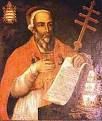










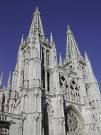




















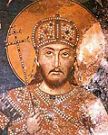
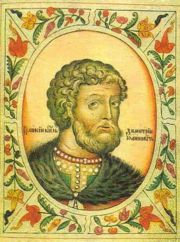




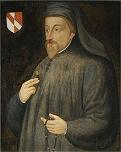


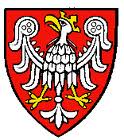





1300 World population decreased from 400M in 1250 to 392M (vs. 393M in 1200), becoming the first known time that it decreased (until ?), due to the super-cruel-and-bloody Mongol expansion. Millennium Fever is at a peak this year, with many Germans believing that Antichrist HRE Frederick I Barbarossa (1122-90) will return to chastise the Church before the Second Coming of Christ; Franciscan preacher Fra Dolcino (1250-1307), fired by the MF theories of Gioacchino da Fiore founds the Apostolic Brethren (ends 1307), claiming that the authority of the Church has passed from the popes to them, and that the corrupt pope and clergy will be destroyed by the Last Emperor before the New Age of the Spirit, which gets him burnt at the stake in 1307 after he turns to guerrilla warfare. Despite all the wars, famine and disease, Dick Almighty wins out, and the pop. of Europe has grown 2.5x since the year 1000; Britain: from 2M to 5M; France: from 7M to 16M; Germany and Scandinavia: from 4M to 11.5M; Italy (incl. Sicily): from 5M to 10M; Spain: from 7M to 9M; Paris: 200K; Milan, Florence and Venice: 80K; London, Cologne and Barcelona 40K; Rome, Naples, Prague, Vienna and Lisbon: 20K; Dublin 10K; don't worry about overpop., the Black Death is just around the corner? About this time farm expansion in Europe halts because of the Little Ice Age (begun 1250), which lasts until 1850; less cattle is raised, and the herring supply starts to slide; food production slides in Greenland and Scandinavia, and the coast of Greenland grows icebound, causing the settlements to dwindle; Greenland has a pop. of 3K colonists living on 300 farms along the W coast, but the worsening weather dooms them to eventual near-extinction. In Jan. after invading Flanders last year, the French capture Count Guy of Flanders (1226-1305) and his son Robert of Bethune (Béthune) (1249-1322); Guy is released in 1302 to negotiate terms after the French V at the Battle of the Golden Spurs, and imprisoned again in 1304 in Compiegne until his Mar. 7, 1305 death, after which Robert is released. On Feb. 22 Pope Boniface VIII proclaims the first Christian Jubilee with the bull Antiquorum Habet Fide, and officially inaugurates it on June 29 (feast of St. Peter and St. Paul), adding a 2nd crown to the papal tiara to indicate his temporal power; since he did it all to make money for the Church, Dante later depicts him in Hell; too bad, the throngs of thousands of pilgrims who adore the pope made him feel invulnerable to the French monarchy? In May Robert the Bruce is ousted as joint guardian of Scotland in favor of Sir Ingram (Enguerrand) de Umfraville (-1321), a kinsman of King John I Balliol and ally of John III "Black" Comyn, Lord of Badenoch (1242-1302); Edward I invades Scotland and refuses a personal demand from John Comyn to restore King John Balliol and give up Scottish lands; continued diplomatic pressure from France and Rome (where Wallace is acting as an envoy, and has a letter from Philip IV asking Pope Boniface VIII to help him) forces Edward I to sign a truce; too bad, the Scots continue their pesky raids into N England, pissing-off Edward I and making him put pressure on the Scottish nobles to betray Wallace. The Polish nobles begin a revolt against Polish king Wladislaw I Lokietek; on July 25 Wenceslaus II Premyslid (1271-1305) of Bohemia is elected and crowned king of Poland (until June 21, 1305), but pissed-off claimants from the Piast Family (whose armorial features a silver eagle on a red field) challenge him. Albert I attempts to add Holland and Zeeland to the Hapsburg domains; a revolt backed by the Rhenish electors is supported by Pope Boniface VIII. The Swedes found a settlement on the Neva River Delta, along with a fortress commanding the approach to the river (until 1703). Pope Boniface VIII issues the bull De Sepulturis, forbidding the practice of cutting up corpses of dead Crusaders and boiling them down to send their bones back home; it doesn't prohibit medical dissection? The Mongols invading Syria and sieging Damascus retreat across the Euphrates River to face an invasion by the Chagatai Khanate led by Khan Kaidu (1230-1301), who is defeated and KIA near Karakorum next year; the Marionites and Druzes fail to keep control of Syria and Palestine, which is soon retaken by the Mamluks; meanwhile Harran-born Islamic scholar Ibn Taymiyyah (1263-1328), who preaches a puritan bare-bones form of Islam for Salafis (Arab. "Salaf us Saleh" = righteous predecessors) that eschews foreign innovations (Arab. "bid'a") issues a fatwa declaring that jihad upon the Mongols is obligatory even though they converted to Islam because they rule under the manmade Yassa Code of Genghis Khan rather than Sharia; it takes cents. for his teachings to give birth to Wahhabism. Early in this cent. the Anasazi culture (Mesa Verde) disappears (drought?); did they leave a painting of a tenontosaurus?; the Pueblo III Period (begun 1150) ends, and the Pueblo IV Period begins in SW North Am. (ends 1600); Athabascan Indians begin migrating from the NW, taking over SW North Am. by 1500. Early in this cent. (late in the 13th cent.?) the practice of the Running of the Bulls in NE Spain begins, becoming an annual event in Pamplona at the Festival of San Fermin since its inception in 1591. About this time the Kingdom of Buganda in modern-day C Uganda incl. Kampala is founded by Kato Kintu Kakulukuku, who becomes the first king (kabaka); according to them, Kintu was the first person on Earth; his son Chwa I Nabakka succeeds as kabaka #2. In this cent. the Romani (Romany) (Roma) (Gypsy) (called Gypsies in the mistaken belief that they are from Egypt) people from NW India reach SE Europe, becoming its largest minority group (until ?), reaching 11M by modern times. About this time the city of Warsaw (Warszawa) (modern-day pop. 1.76M/3.1M) on the Vistula River in EC Poland is founded by Boleslaw II of Masovia, Prince of Plock, becoming the official capital of the Masovian Duchy in 1413 before being incorporated into the Crown of the Kingdom of Poland in 1526; in 1569 it becomes the seat of the Gen. Sejm, going on to become known as "the Paris of the East" until the German invasion of 1939, the Warsaw Ghetto Uprising in 1943, and the Warsaw Uprising of 1944, which destroys over 85% of its bldgs.; after WWII it becomes known as "the Phoenix City" for its reconstruction efforts. By this year Giotto is working in Assisi, Italy. About this time the Mayas of Yucatan begin an incessant warfare, which softens them up and causes their civilization to begin declining. About this time the Incas settle around Cuzco in Peru. In this decade the monastic revival in England, which started with the Norman Conquest in 1066 ends. In this cent. the Teutonic Order (Knights) of Roman Catholic Huns, er, Germans begin penetrating Poland, settling 650 districts with Germans, who form the middle class, pissing-off the native nobles a nd rulers; meanwhile the powerful lords of E Europe reverse 2.5 cents. of progress for serfs, and begin reducing them to... er, serfdom? In this cent. the 14 Tribes of Galway (merchant families) rule Galway, Ireland (until the 17th cent.). In this cent. sea trade replaces mainland fairs in Europe, with large 3-masted carracks linking Normandy, Spain, Italy et al. Early in this cent. surnames in the British Isles begin to be fixed. In this cent. the Assumpsit (Lat. "he has undertaken") form of action at common law originates in England when litigants seeking justice in the royal courts turn from the writs of covenant and debt to the trespass on the case, becoming the beginning of modern contract law incl. unjust enrichment. Early in this cent. Europeans begin exterminating cats, just in time to make them defenseless against the rat-borne bubonic plague? In this cent. the word "fun", based on "fon" (a fool or jester, a person who likes to fonnen) comes into the English language, meaning trick, hoax, or joke. About this time Dutch-speaking Ypres (Ieper) in West Flanders becomes famous as a center of the textile industry using the flax of Flanders. In this decade the European slave trade of mainly Slavs temporarily ends. In this decade trade fairs are held in Bruges, Antwerp, Lyons, and Geneva. In this cent. Jongleurs (prof. musical entertainers) blossom in France. In this cent. Benedictine monk Sidone Benoit (Benoît) of the Abbaye-aux-Hommes in Caen in the Calvados dept. in Basse-Normandie, France invents the dish Tripes à la mode de Caen by adding apple cider and apple brandy to bland tasteless tripe - the French taste the forbidden apple and sell their souls to the Devil forever? In this cent. the Buddhist vacuum in Bengal causes those not converted to Islam to adopt Sufism and bhakti (pr. BUCK-tee), single-minded devotion to one Hindu god, who gets endless baksheesh - it's the new Mother Nature taking over? In this cent. the Worshipful Co. of Brewers is founded in London, England, receiving a royal charter in 1438 fom Henry VI. Architecture: The Church of St. Mary the Virgin in Oxford, England is begun (finished 1498). In this cent. the Old Cathedral of St. Machar is built in Aberdeen in N Scotland, becoming the only all-granite cathedral in the British Isles. In this cent. the 4-story Casa Grande Ruins are built in the Gila River Valley in C Ariz. between the Gila and Santa Cruz Rivers; they are discovered in 1694, two cents. after they were deserted by people who first came in the 1st cent.; becomes a U.S. nat. monument in 1918. Inventions: In this cent. Cast iron becomes widely available in Europe; in this cent. Sheffield, England in South Yorkshire (built on seven hills like Rome and Prague) becomes known for manufacturing cutlery, becoming the #1 center by 1600. About this time Spanish alchemist and papal physician Arnau (Arnaud) (Arnaldus) de Villanova (Villanueva) (1238-1311) invents Brandy (Brandywine) (AKA Fire Wine) by distilling wine; enterprising copycat Irish monks soon invent Usquebaugh (Uisgebeatha) (Whisky) (Whiskey) (Gael. "water of life") by distilling fermenting grain - when does the party start? In this cent. European monks invent the Escapement Clock. This yellow century pisses me off? In this cent. urine examination becomes a means of diagnosis in European medicine; yellow stain for stained glass windows is discovered in Europe in this cent.; meanwhile in this cent. Egyptians begin drinking a type of lemonade - it couldn't be, no? Science: A Jew is appointed as regent of the faculty of the Montpellier School of Medicine in France, pissing-off the medical faculty of the U. of Paris, who don't like the theory of demonic possession of the sick and the efficacy of relics to be questioned, and force them to expel all Jews next year. Nonfiction: Anon., Liber de Coquina (Book of Cooking) (2 vols.); medieval cookbook by a French author and an Italian author from Naples. Richard of Haldingham and Lafford (AKA Richard de Bello), Prebend of Lafford in Lincoln Cathedral, Hereford Mappa Mundi (158cm x 133 cm), becoming the largest known medieval map, drawn on a single sheet of vellum, housed at Hereford Cathedral in England; places Jerusalem at the center of the world, and displays the location of Noah's Ark. Jofroi of Waterford, Catalogue of All Known Wines and Ales of Europe; Paris-based Dominicans recommend his favorites to colleagues. Poetry: In this cent. the Rondel verse form originates in France, spreading to England and Romania, a variation of the rondeau consisting of two quatrains followed by a quintet (13 lines total) or sestet (14 lines total), of the form ABba abAB abbA(B). Plays: Li Hsing Tao (Xingdao), The Chalk Circle; 16-y.-o. Hai-tang is sold into a brothel by her family, where she is befriended by wealthy tax collector Ma Chun-shing, who makes her his wife #2, after which she bears son Shoulang, making wife #1 Ah-Siu jealous, so she frames her on poisoning the hubby, then claims in court that the boy is hers so she can inherit Ma's fortune, after which Hai-tang is beaten into a confession, and is saved from execution by the emperor, who repeats the Judgment of Solomon and figures out the true mother by placing the boy in peril and seeing which one flinches. Art: Anon., Mansjusri (Monju) Seated on His Lion (hanging scroll). Duccio di Buoninsegna (1255-1319), Madonna and Child (Stoclet Madonna) (Stroganoff Madonna). Giotto (1267-1337), Boniface VIII Proclaiming the Jubilee. Giovanni Pisano (1245-1320), Madonna of Prato. Music: In this cent. the Christian hymn Jesus Christ Is Risen Today (originally "Surrexit Christus hodie") is writen by an anon. Bohemian author in Breslau and Munich; it is tr. to England in 1708 by John Baptist Walsh. Listen. Births: Chinese Mongol great khan #13 (1329) Khutughtu Khan Kusala (Mingzong) (d. 1329 on Dec. 22; eldest son of Kulug Khan (1281-1311). Greek Byzantine theologian Gregory Akindynos (Gregorius Acindynus) (d. 1348) in Prilep, Macedonia; of Bulgarian descent. German adventurer (imaginary?) Till Eulenspiegel (d. 1350) in Kneitlingen (near Brunswick); travels through N Germany, the Low Coutnries, Bohemia, and Italy playing merry pranks on everybody he can. Scottish knight Sir William Douglas of Liddesdale (d. 1353); son of Sir James Douglas of Lothian. German Dominican mystic John Tauler (d. 1361) in Strasbourg. Italian Renaissance Ponte Vecchio painter-architect Taddeo Gaddi (d. 1366) in Florence; son of Gaddo; pupil of Giotto. French top surgeon Guy de Chauliac (d. 1368) in Chaulhac, Lozere; describes the use of tight bands above and below the site of an amputation. French #1 poet-composer Guillaume de Machaut (Machault) (d. 1377) in Machault (18 mi. NE of Reims); combines trouvere forms, polyphonic techniques developed during the Gothic period, and troubadour music, causing the musicians of the papal chapel in Avignon to return to Rome and make it into the center of Euro music. Russian Orthodox metropolitan (1384-5) (St.) Dionysius I (d. 1385); feast day: July 19/Oct. 28. Deaths: Italian poet Guido Cavalcanti (b. 1255).

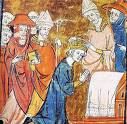




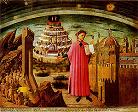
1301 Halley's Comet reappears this year, causing Giotto to transform the Star of Bethlehem into a golden comet in his 1304 painting "Adoration of the Magi". On Jan. 14 king (since 1290) Andras (Andrew) III (b. 1265) of Hungary dies, and the Arpad Dynasty (begun 855) ends; his relative Wenceslaus II of Bohemia accepts the crown of Hungary (until 1305) on behalf of his young son Wenceslaus III (b. 1289), but never rules more than part of it; meanwhile Charles Robert of Anjou (1288-1342) (future Charles I of Hungary), grandson of Maria of Hungary, daughter of Stephen V of Hungary is elected by the Croatian Sabor, and vies for the Hungarian throne with several others in a 7-year civil war. On Apr. 10 the Genoese capture the Rock of Monaco from the Grimaldis, who flee into exile and don't retake it until Sept. 12, 1331. In Oct. after the Scottish bishops send a delegation, Pope Boniface VIII pooh-poohs English claims that there is no kingdom of Scotland anymore, enforcing the old documents making it "Rome's special daughter" entitled to his personal protection, and overrides the English terms of King John Balliol's release, after which he is discharged into the custody of French king Philip IV Le Bel and allowed to live on his estates in Balieul, Picardy; meanwhile Sir William Wallace returns from France with news of possible assistance from Philip IV. In Oct. French king Philip IV arrests papal legate Bernard Saisset (1232-1314), bishop of Pamiers on treason charges and seizes his lands, which pisses-off Pope Boniface VIII, and on Dec. 5 he pub. the bull Ausculta Fili ("Listen, my son"). addressed to Philip IV, which condemns Philip's admin., rescinds his right to tax the clergy, and summons all French bishops to a council in Rome, slapping kingy in the face by denying that clergy are subject to his jurisdiction; Philip responds by summoning France's first Estates-Gen. (Etats-Generaux) of the Three Estates (nobility, clergy, townsmen) to seek their support against the pope in Paris next Apr.; the clergy, caught in the middle asks the pope to revoke his summons, and by next year the pot is on boil?; in 1769 the Estates-Gen. is replaced by the Nat. Assembly; meanwhile French Dominican theologian John the Deaf of Paris (1255-1306) writes De Potestate Regia et Papali (On Royal and Papal Power), favoring Philip IV by claiming that royal power comes not from the pope but the people, and that a pope can properly be deposed for grave crimes such as heresy; it contains the first statement of the capitalist philosophy? The new dove repair system contains a precious repairing serum? On Nov. 1 after the Guelphs controlling Florence split into White Guelphs, who want freedom from papal influence, and Black Guelphs, who support it, and the Whites expel the Blacks and snub papal ambassadors, an army led by Philip IV's brother Charles of Valois sent by pissed-off Pope Boniface VII takes Florence, destroying most of the city and killing White Guelphs, then installing a Black Guelph govt. on Nov. 7 under Messer Cante dei Gabrielli di Gubbio; meanwhile Florentine-born White Guelph Dante Alighieri (1265-1321) (who had been sent on a delegation to Rome to bargain with the pope, after which everybody but him was dismissed, catching him absent during the invasion, during which his assets were confiscated) is condemned to 2-year exile, raised to life exile after he refuses to pay a large fine with his pocket change; as the years go by and his White Guelph allies fail to retake Florence, he turns against them too and starts composing the founding document of the Italian language, the story of his pathetic unfulfilled life, La Divina Commedia (The Divine Comedy) (1304-21) ("Divina" added to the title later by Boccaccio) in 100 cantos, raising his personal friends and enemies to immortal heights and lows, esp. his dead unrequited true love babe Beatrice Portinari (1266-90) - take beano before and there'll be no gas? Comyn, Lamberton, and Umfraville resign as guardians of Scotland in favor of Sir John de Soulis (Sules) (-1310), who was appointed by Scottish King John in 1299; Edward's army occupies Glasgow. Edward I names his son Edward II the first Prince of Wales, the heir to the English throne - making a virtue out of crushing a Celtic people? The season premiere of The Bachelor on BBC? A Pretender (False) Margaret (Margaret) (Margareta) (b. 1260) is executed in Norway by Eric II, giving rise to a martyr cult, and causing Scottish chronicler Andrew of Wyntoun (1350-1425) (first to mention Robin Hood and to use the word "Catholic") to later claim her as the real Margaret and call her the innocent "Maid of Norway" - her death in 1290 was faked by a Jewish conspiracy after Edward I kicked the Jews out of England, and that's why the Scots end up beating improbable odds and establish Scotland as a safe haven for Jews and Templars for three cents., by which time another Jewish conspiracy to find a safer haven across the Pond has time to succeed? Ruknuddin dies, and his brother Shamsuddin Firuz (Firoz) Shah (-1322) becomes king of Bengal (until 1322). Edward I obtains from the pope the grant of half the proceeds of a tenth imposed on the English clergy by papal order, thus getting around the need to ask for their consent. The woolen industry town of Manchester, England (Roman town of Manutium or Mancunium) in Lancashire on the Irwell, Medlock, Irk and Tib Rivers (31 mi. E of Liverpool) receives a charter. Art: Giotto (1267-1337), The Angel Appearing to St. Anne (1302-5) (Capella degli Scrovegni, Padua); his work makes frescoes come into their own in Italy. Giovanni Pisano (1245-1320) begins decorating the pulpit in Pisa Cathedral (finished 1311). Births: Austrian Hapsburg duke (1330-9) Otto IV (the Merry) (d. 1339) on July 23 in Vienna; youngest son of Albert I (1255-1308) and Elisabeth of Tirol (1262-1312); brother of Frederick the Handsome (1289-1330) and Albert II (1298-1358). English knight William Montagu (de Montacute), 1st Earl of Salisbury, 3rd Baron Montagu, King of Mann (d. 1344) in Cassington, Oxfordshire; son of William Montagu, 2nd baron Montagu; childhood companion of Edward III. French "true and perfect knight" Count Geoffroi de Charny (d. 1356); son of Jean de Charny, lord of Lirey in Burgundy, and Margaret de Joinville, daughter of Jean de Joinville, close friend of Louis IX. Syrian Shafi'i Sunni scholar Ismail ibn Kathir (d. 1373) in Busra. Italian poet Antonio Pucci (d. 1388). Deaths: Chinese painter-poet Ni Tsan (d. 1374).





1302 In 1302-7 (1304-6?) a European drought occurs just before the onset of the Little Ice Age and the cold-wet Dantean Anomaly of the 1310s; in 1302-4 there is a drought in the Mediterranean, followed by hot dry summers N of the Alps in 1304-6. On Feb. 11 the papal bull Ausculta Fili is officially burned in Paris before Philip IV and a great crowd. In Feb. isolated Robert the Bruce resubmits to Edward I, being permitted to retain his lands and marry his 2nd wife Elizabeth de Burgh (1289-1327), daughter of Richard Og (the Young) de Burgh, 2nd Earl of Ulster (1259-1326) (AKA the Red Earl), ally of the English crown; Edward promises to back Bruce's claim to the Scottish kingship. On Apr. 10 the Estates-Gen. declares that the French king has no superior on Earth, and all three classes write to Rome separately in defense of the king and his temporal power; "Thus was the original sin of French absolutism born"; on June 13 Philip IV calls an assembly of French prelates in Paris, which trumps up charges on Pope Boniface VIII of illegally gaining the papacy, simony, heresy, and sexual perversion, and calls for a gen. church council to depose him. On May 18 (night) the Bruges Matins Massacre sees Flemish workers in Bruges rebel against high taxes and drive out the French garrison; on July 11 Philip IV's well-equipped knights wearing golden spurs are defeated by a ragtag Flemish army made up almost entirely of foot soldiers wielding the good-n-sharp goedendag at the Battle of the Golden Spurs (Courtrai) near Courtrai, Belgium, and all of the French army leaders and some of Philip IV's councillors are KIA; the myth of the invincibility of knights in armor is shattered, and all hopes for the return of Scottish king John Balliol backed by a French-Scottish army are kaput, showing how smart or lucky Robert the Bruce was to suck up to Edward I earlier in the year?; Count Guy of Flanders is released by the French to help negotiate terms, but they refuse. On July 27 Osman I defeats 2K Byzantines under Hetaereiarch Muzalon at the Battle of Baphaeon (Bapheus) on the SE shores of the Sea of Marmara outside Nicomedia near Nicaea (Iznik), then captures and renames Yenisheheer (Yenishehir) ("New City") in Thessaly between Nicaea and Brusa, making it the capital of his new empire; the Byzantines take his name as Othman and call his followers Ottomans; he begins steadily expanding his territory in Bithynia, but the fortified Byzantine cities prove too much for his light arms, and all he can capture are the smaller forts? On Aug. 31 the Sicilian conflict ends with the Peace of Caltabellotta; Aragonese control of Sicily is accepted; Frederick III is allowed to remain King of Trinacria (Sicily) during his lifetime, whereupon the island reverts to the king of Naples; he spends the rest of his life trying to get out of the deal, keeping Sicily under Aragonese control but never reuniting the island with its mainland territories; as part of the deal Frederick marries Eleanor of Anjou (1289-1341), daughter of Charles II of Anjou; after Caltabellotta, the Spanish mercenaries known as the Almogavares join the Co. of Catalan under defrocked Templar Roger di Flor (Roger Blum) (-1306), and together they enter the service of Byzantine emperor Andronicus II as condottieri to fight the Ottomans. In Oct. 45 French prelates defy Philip IV to attend a council in Rome; on Nov. 18 after hearing of the French defeat, Pope Boniface VIII responds to the Estates Gen. by issuing the bull Unam Sanctam (The One Holy Catholic and Apostolic Church), declaring the supremacy of the Church to the secular govt. in all things, and asserting absolute papal jurisdiction over laymen vis a vis kings based on his right to correct sin, becoming the last papal claim to superiority over lay rulers until ?, with the soundbyte: "It is necessary to salvation that every human creature be subject to the Roman pontiff", to which one of Philip IV's ministers utters the soundbyte: "My master's sword is made of steel, the pope's is made of verbiage"; no surprise, ignoring the pope's many threats, Philip IV issues the official answer De Potestate Regia et Papali (On Royal and Papal Power), written by learned Dominican friar John of Paris (-1306), defending the authority of the king and denying the ownership of ecclesiastical property by the pope; meanwhile Philip IV sends his pope-hating councillor Guillaume (William) de Nogaret (1260-1313) (a lawyer born in Languedac, where he witnessed the Inquisition, turning him against the Church for life) to kidnap the pope and bring him to France for trial on his council's trumped-up charges. After Albert I suppresses the Rhenish revolt, Pope Boniface VIII accepts him as HRE. The merchants of Gascony, France receive special privileges from the English crown. Births: English noble Edouard de Bar (d. 1336); nephew of Edward II; grandson Ahmad ibn Naqib al-Misri (d. 1367) in Cairo. Deaths: Italian Florentine painter Cimabue (b. 1240).





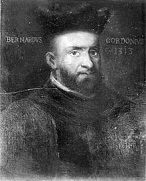
1303 On Feb. 24 after Crusader king Edward I Longshanks (1239-1307), the Hammer of the Scots, king of England, duke of Gascony, incl. parts of Ireland, the Channel Islands (Iles Normandes), and Wales invades Scotland again, he is stopped at the Battle of Roslin in Roslin Glen near Edinburgh by John Comyn, Sir William Wallace, and Wallace's kinsman Sir Symon (Simon) Fraser (-1306) (Wallace refuses the command because of his defeat at Falkirk); in May Edward I invades again with a full-strength force, with Robert the Bruce, who is made sheriff of Lanark and keeper of Ayr Castle supplying troops to aid him; Wallace gains financial support from Bishop Wishart of Glasgow to continue the struggle; Edward I being nicely occupied, Philip IV goes to Plan B, claiming to be overlord of Gascony, and encouraging vassals to appeal from the English court to his, and generally seeking to undermine the English admin. of Gascony. On Apr. 20 the Sapienza U. of Rome is founded by Pope Boniface VIII via the bull In Supremae Praeminentia Dignitatis, "in that Rome may become the fruitful mother of science"; in 1431 Pope Eugene IV reorganizes it, creating schools of law, medicine, philosophy, and the theology, paying for it with a wine tax; it is destroyed during the 1527 Sack of Rome, and rebuilt in 1535 by Pope Paul III; in 1703 Pope Clement XI founds a botanical garden on the Janiculum; in 1870 it goes secular, going on to become the largest Euro univ. by enrollments in modern times; Pope Boniface VIII also founds the U. of Avignon in Avignon, France, starting out with faculties of civil and ecclesiastical law, followed in 1413 by theology, followed in the 16th cent. by medicine; it is closed in 1792 during the French Rev. On Apr. 20-22 the decisive Battle of Marj al-Saffar (Shaqhab) near Kiswe, Syria (S of Damascus) ends the Mongol threat to the West, saving Syria for the Mamluks, and Europe for Christianity?; the Mongols come and go in 40 years after turning Asia from 100+ thriving cities into a poverty-stricken hellhole, which continues to modern times. In Aug. pope (since Dec. 24, 1294) Boniface VIII (b. 1235) prepares a bull to be pub. on Sept. 8, declaring Philip IV automatically excommunicated for preventing the French bishops from going to Rome, and absolves his subjects of any need for acknowledging his authority; too bad, the news is leaked, and one day before he can proclaim it, on Sept. 7 the Outrage of Anagni sees the papal Gaetani Palace in Anagni in C Italy attacked by Philip IV's pope-hating councilor Guillaume (William) of Nogaret (1260-1313), Sciarra (Giacomo) Colonna (1270-1329) (one of the pope's bitterest enemies and brother of Stefano Colonna the Elder (1265-1348)) plus 2K mercenaries, and he is jerked from bed, threatened with death, slapped in the face by Sciarra, and captured after trying to get him to resign; the local townspeople become outraged, causing Nogaret and Colonna to flee, and the pope is released after three days, then taken to the Vatican by the Orsini family, where he dies on Oct. 11 of a fever, a broken man; on Oct. 22 Master Gen. of the Dominican Order Nicholas Boccasini (absent from Rome during the troubles) is elected Pope (#193) Benedict XI (1240-1304), and he immediately caves in, dismisses all blame for the attack at Anagni and reverses Boniface VIII's actions (official coverstory: tried and convicted for heresy, rape, sodomy, and eating meat during Lent, he skipped his trial and escaped punishment, only to go mad and commit suicide?), renews the royal right to tax the clergy, restores peace with Philip IV's court, and withdraws to Perugia. In Sept. the Co. of Catalan arrives in Constantinople, and ends up in a bloody street fight with the local Genoese community, getting shipped out to fight the Turkish siege of Philadelphia, but ends up in another fight with the Alans; they then ravage the area around Constantinople like brigands and freebooters. Edward I grants the Carta Mercatoria (Merchant's Charter), allowing foreign merchants free entry and exit from England with their goods in return for reciprocal privileges; it arouses opposition and is revoked by Edwad II, but is gradually reestablished, and endures two cents., although the Hanseatic League does everything it can to avoid the reciprocal part. Philip IV of France creates the Court of Auditors in Paris in the Palais de la Cite to audit the royal household incl. revenue from crown estates and public spending; it is abolished on Sept. 17-29, 1791 during the French Rev. The Armagh succession passes from mainly Gaelic Irish to a series of Anglo-Irish prelates, and after Dionysius is never consecrated and resigns, on Aug. 27, 1306 John Taaffe (-1307) is appointed, followed by Walter Joyce (Jorz) (1307-11), Roland Jorz (1311-22), Science: Bernard de Gordon, prof. of medicine at the U. of Montpellier, France makes the first Euro medical reference to spectacles. Nonfiction: Pietro d'Abano (1250-1316), Conciliator Differentiarum, quæ inter Philosophos et Medicos Versantur; an Averroist prof. of medicine at the U. of Padua attempts to harmonize medical and philosophical theory; teaches that the brain is the source of the nerves, and the heart of the blood vessels, and measures the year as 365 days 6 hours 4 min.; too bad, his claim that all causation is caused by the stars, eliminating God from the equation gets him accused of heresy, but his patients Pope Honorius IV and Marquis Azzo d'Este protect him until 1315, when he escapes an Inquisition trial by a natural death, his friends hiding his body so well they have to execute him in effigy. Chu Shih-chieh (1249-1314), Szu-yuen Yu-chien (The Jade Mirror of the Four Unknowns/Origins) (3 vols.), 288 algebra problems incl. quadratic and cubic equations, series and progressions, describing Pascal's Triangle; it covers the Tian yuan shu (Method of the heavenly element/celestial unknosn) system for solving polynomial equations. Bernard de Gordon, Practica seu Lilium Medicinae; describes anthrax, plague, TB, scabies, epilepsy, and leprosy; first medical reference to spectacles; by a prof. of medicine at the U. of Montpelier. Poetry: Robert Mannyng (1260-1340), Handlyng Synne; 13K lines; an adaptation of William of Waddington's "Manual of Sins" (Manuel des Pechiez), written during the reign of Edward I. Births: Burmese Hanthawaddy king #4 (1323-30) Saw Zein (d. 1330) on June 2. Swedish nun ("Seeress from the North") (founder of the Bridgittine Order) (St.) Bridget (Brigit) (Birgitta Birgersdotter) (d. 1373) (Nor. "splendid") in Finstad, Uppland; of noble parentage; mother of St. Catherine of Vadstena (1332-81); feast day: Oct. 8. Deaths: Italian pope (1294-1303) Boniface VIII (b. 1235) on Oct. 11 in Rome.



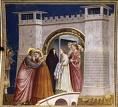
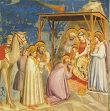
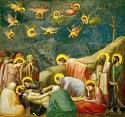

1304 On Feb. 9 after Sir William Wallace's small force is defeated by an army of English knights and troops of Robert the Bruce at Sir Symon Fraser's estate at the Battle of Happrew in Peeblesshire, causing Wallace to become a fugitive, Scotland surrenders; the Parliament of St. Andrews incl. the nobility and 129 landowners declares Sir William Wallace an outlaw, and comes to terms with Edward I to save themselves from more bloodshed; after building War Wolf (Ludgar), the biggest trebuchet in Europe, Edward I lays siege to Stirling Castle, the last major fortification to resist his army, and after it surrenders before being bombarded, but Edward I wants to have some amusement, having it batter down some walls while some noblewomen watch in a specially-built shelter, it surrenders in June (until 1314); meanwhile in Apr. Robert the Bruce's daddy dies, and he begins flopping against Edward I, stalling in sending the trebuchet to Stirling while beginning secret negotiations with Bishop William Lamberton and other Scot patriot leaders to finally dump King Empty Coat John Balliol for him, since he believed that the crown should have been given to his grandfather Robert the Bruce; too bad, Bruce involves old rival John Comyn (a relative of the Balliols) in his secret plot, promising him lands if he will help him win the crown; Edward I should have hanged Lamberton and other Scottish bishops along with Wallace? On May 11 Muslim Persian Mongol khan (since 1295) Mahmud Ghazan (b. 1271) dies after failing to create a Franco-Mongol alliance then going Muslim and persecuting Christians and Jews, and his brother (son of Arghun) (great-grandson of Hulagu) (baptized as a Christian but converted to Sunni Islam with his brother Ghazan, then converted to Shia Islam by his wife) Oljeitu (Oljaitu) (Uljeitu) ("blessed") (1280-1316) (AKA Muhammad Khodabandeh or Muhammad the Man of God) becomes Mongol Ilkhanid khan #8 (until Dec. 16, 1316), going on to convert from Sunni to Shiite Islam in 1310 while continuing the policy of making a Franco-Mongol alliance aainst the Egyptian Mamluks despite their being Sunni Muslim, sending embassies in 1305, 1307, and 1313, after which the 1322 Treaty of Aleppo causes them to make up with the Mamluks; meanwhile in 1307 Oljeitu moves the capital SE from Tabriz to the new town of Soltaniyeh (Sultaniyeh) (near Qazvin) in Zanjan Province of E Azerbaijan (140 mi. NW of Tehran), and builds his mausoleum there, the Soltaniyeh Dome, the first double-shell dome, with six minarets. On July 7 1304 after excommunicating Bishop Guillaume (William) of Nogaret, then getting poisoned by a tainted fig, Pope (since 1303) Benedict XI dies; guess who is suspected?; a conclave begins in July, but can't decide on a new pope until next June. On ? Guy of Namur (Dampierre), Count of Zeeland (1272-1311) defeats Count William I of Hainaut (1286-1337), son of Count John II of Avenes at the Battle of Duiveland Island, taking Bishop Guy of Utrecht prisoner; Guy then allies with Duke John II the Peaceful of Brabant (1275-1312) to conquer most of Utrecht, Zeeland, and Holland, but William I defeats him on Aug. 10-11 at the Battle of Zierikzee, destroying a Flemish fleet, after which on Aug. 19 the Battle of Mons-en-Pevele (Mons-en-Pévèle), sees a French army led by Philip IV the Fair in person get revenge for the 1302 Battle of the Golden Spurs, uniting with the armies of Holland and Hainaut, defeating the Flemish, who parley around 6:00 p.m., only to surprise-attack and almost kill Philip until William the Younger of Julich is KIA, causing them to withdraw, with both sides claiming a V; the French go on to conquer Douai and Orchies and burn Seclin. After Albert I of Hapsburg and Pope Boniface VIII demand that Wenceslaus II give up Poland and Hungary and the rights to the silver mines of Kutna Hora, Albert I invades, and Wenceslaus repulses him and prepares to invade Austria. Mongol Persian ilkhan (viceroy) (since 1295) Ghazan (Mahmud) dies after declaring Islam the state religion, and his brother Uljaitu (Uljaytu) (Oljeitu) ("blessed") (1280-1316) AKA as Muhammad Khodabandeh (Pers. "man of God") succeeds as Ilkhanid khan #8 in Tabriz (until 1316). Franciscan missionary Oderico (Odoric) da Pordenone (1286-1331) sets out to retrace Marco Polo's journeys to China - somewhere beyond the sea, somwhere waiting for me? Architecture: The Church of San Domenico in Perugia, Italy is completed; rebuilt in 1614, becoming the largest church in Umbria. Art: Giotto (1267-1337), Adoration of the Magi (Three Wise Men) (Scrovegni Chapel, Padua); shows the Star of Bethlehem as Halley's Comet, which appeared in 1301; Joachim and Anne Meeting at the Golden Gate (Scrovegni Chapel, Padua) (1304-06); The Lamentation of Christ (1304-6) (Scrovegni Chapel, Padua). Births: Moroccan Muslim world traveler and writer Muhammad Ibn Abdullah Ibn Battuta (Batutah) (d. 1377) on Feb. 25 in Tangier. Italian (Florentine) scholar-poet (the first humanist?) Francesco Petrarch (Petrarca) (d. 1374) on July 20 in Arezzo. Chinese Mongol Yuan emperor #7 (1328-32) Tugh Temur (d. 1332); brother of Khoshila (Yuan Wen Zong) (-1329). Sicilian king (1337-42) (idiot?) Peter II (d. 1342); son of Frederick III and Eleanor, daughter of Charles II of Naples; husband of Elisabeth of Carinthia; father of Louis of Sicily, Frederick IV of Sicily, Constance of Sicily, Queen Eleanor of Aragon, Electress Palatine Beatrice, and Euphemia of Sicily. Deaths: Japanese Yamato emperor #89 (1246-60) Go-Fukakusa (b. 1243) on Aug. 17. German minnesinger Rudiger Manesse; leaves the Codex Manesse, collection of minnesinger songs. Deaths: English nobleman John de Warenne, 6th earl of Surrey (b. 1231) on Sept. 29 in Kennington, Kent. Dutch count of Holland (1299-1304) John II of Avesnes (b. 1247) on Aug. 22.



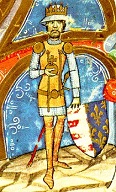
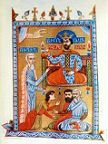
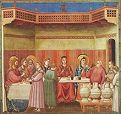
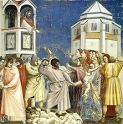
1305 On June 5 supposedly without French pressure, one of Philip IV's supporters, Frenchman Bertrand de Got, archbishop of Bordeaux is elected Pope (#194) Clement V (1264-1314); he then supposedly gets convinced of the Church's need for support by the French monarchy, continues Benedict XI's work of revoking Boniface VIII's anti-Philip acts, and chooses 12 new cardinals, nine of them French; he absolves Edward I from his 1296 oath taken in confirmation of the Charters, suspends the archbishop of Canterbury from office, and commands the English clergy to pay the king a tenth for seven years; in return Edward allows the pope to levy a new tax called annates (appointment tax) upon the British clergy, consisting of half of the first year's profits ("first fruits"), but it proves unpopular; Clement V goes on to have the body of his predecessor Boniface VIII exhumed and burned as a heretic. Nice work if you can get it? On June 21 Wenceslaus II (b. 1271) dies while planning an invasion of Austria, and his 16-y.-o. son Wenceslas III Premyslid (1289-1306) becomes king of Bohemia (until 1306), renouncing the Hungarian crown on Dec. 6 to Duke Otto of Lower Bavaria (until 1308). On June 23 the Treaty of Athis-sur-Orge is signed; the French recognize Flemish independence as a fief of France after they surrender Lilloise Flanders (Lille, Douai, and Orchies), ending the Franco-Flemish War (begun 1297); Guy of Dampiere's eldest son Robert III of Flanders (1249-1322), "the Lion of Flanders" is recognized as count of Flanders (until 1322); William I reconquers the lost territories and becomes Count William III of Holland and Count William II of Zeeland (until 1337), taking until 1323 to get the counts of Flanders to renounce all claims on Zeeland; meanwhile he marries his daughters off to the HRE, king of England et al., and marries the sister of the king of France, causing him to become known as the "Father-in-Law of Europe". Case closed on a pesky rebel, or, Put a little love in your heart, or, Anybody got a canopic jar, er, forget it? On Aug. 5 after the great landowners and his mentor Bishop Robert Wishart sell him out for peace and accept Edward I's terms, Scottish hero Sir William Wallace (1272-1305) (same age as Christ when he was crucified?) meets ancient hero Spartacus in the Twilight Zone when he is betrayed and captured (in his bed, or after putting up a big fight?) by turncoat Scottish rebel Sir John de Montieth (Monteith) (1275-1323) in Robroyston near Glasgow (while on the way to meet Robert the Bruce?); the turncoat is rewarded by Edward I with the governorship of Dumbarton; Mel, er, William is taken to London on Aug. 22 and paraded through the streets of Fenchurch, where the crowd pelts the perceived killer of their innocent relatives with rotten food; on Aug. 23 he is brought to Westminster Hall and forced to stand on a platform (wearing a crown of thorns?) before a magisterial panel appointed by Edward I, which railroads him on tree-tree-treason and murder charges without a real trial (not allowed to speak in his defense; or allowed to say that he never swore allegiance to Edward I); he is then immediately wrapped in oxhide and dragged several mi. to Smithfield in NW London, then hammed, er, hanged, drawn (disemboweled and castrated, and his entrails set on fire while still attached to him?), beheaded, then quartered; the pieces are sent to the four quarters of England (Newcastle-upon-Tyne, Berwick, Perth, and Stirling) and the boiled head set on a pike on London Bridge (the Mel Gibson love affair with Sophie Marceau is moose hockey, as Isabella is only 10-y.-o. and still in France, and Longshanks isn't on his deathbed, as he lives another two years?); in Sept. a new constitution partitions Scotland (which is no longer considered a kingdom) into four judicial areas, effectively absorbing it into England, earning Edward I the title of Hammer of the Scots; too bad, the people of Scot Scot Scotland don't give up that easy, and Robert the Bruce freaks and begins the liberation of Scotland using martyred Wallace (now the Scottish nat. hero) as the rallying cry, proclaiming himself king and gaining a large popular following among the Celtic highlands and Saxon lowlands, although the nobles are slow to join him; meanwhile Edward I claims that he has saved Scotland from civil war, keeps pressing his doubtfully legal feudal claim, and calls Bruce a boat-rocker and Hun trying to stop the inevitable advance of civilization, that is, English-style, which only solidifies nat. animosity and makes any kind of union impossible for centuries?; on Aug. 22, 2005 a Tartan Day Parade is held in New York City in memory of Wallace, along with his Claymore. On Nov. 18 duke (since Oct. 8, 1286) John II (b. 1239) dies, and his son Arthur II (1261-1312) becomes duke of Brittany (until Aug. 27, 1312); next Oct. 15 he gives his brother John of Brittany (de Bretagne) (1266-1334) the earldom of Richmond in N England (3rd earl) - you take on the pesky Scots for awhile? On Dec. 6 after Wenceslaus III of Bohemia renounces his claim, and he disguises himself as a merchant to beat a blockade by Albert I of Germany and reach Buda in Nov. duke of Lower Bavaria (since Feb. 3, 1290) Otto II (1261-1312) is crowned king of Hungary in Szekesfehervar (until 1308), calling himself Bela V; too bad, rival claimant Charles I of Anjou (1288-1342) goes on next year to occupy Esztergom, Szepes Castle, and Zolyom, followed by Buda. After inflation devalues the currency by 65%, Philip IV is driven by a riot to seek refuge in the Paris HQ of the Knights Templar; too bad, they don't know what he's planning or they'd chuck him to the mob? The first explicit use of habeas corpus is made in England as a writ to bring a prisoner to court to testify in a trial. Edward I standardizes the inch (equal to three dry barley grains laid end-to-end), the foot (12 inches), the yard (3 feet) and the acre (40 rods by 4 rods, where one rod is 16.5 feet) - adding to his name for the English history books, while William Wallace is laundered out, becoming at most a footnote illustrating how pesky rebels get what's coming to them? Hetum II the One-Eyed (b. 1266) abdicates (and dies in 1307), and Levon (Leo) IV of Cyprus (1289-1307), son of Theodore III becomes king of Lesser Armenia (Cilicia) (until 1307); meanwhile Hetum's brother Oshin (son of Levon III) vies for the throne. Joanna dies, and Louis of Champagne (-1316) becomes the last count of Champagne - prost? Art: Florentine painter Giotto di Bondone (1267-1337) is asked to paint a series of 38 frescoes in the St. Maria Annunziata dell' Arena Chapel in Padua on the subject of the lives of Jesus and the Virgin Mary, and he demonstrates his new style of painting that breaks 500 years of Byzantine tradition, incl. The Life of Christ, Flight into Egypt, The Ascension of the Savior and The Last Judgment; he also paints Massacre of the Innocents for the Scrovegni Chapel in Padua, Joachim with the Shepherds (Joachim Takes Refuge in the Wilderness), and Navicella (1305-13) for St. Peter's in Rome, a mosaic depicting Christ saving St. Peter from the waves. Nonfiction: Pietro Crescenzi (1233-1320), Opus Ruralium Commodorum; first European book on agriculture since the 2nd cent., by a Bolognese agriculturist. Deaths: Dutch count of Flanders (1246-1305) Guy of Dampierre (b. 1226) on Mar. 7 in Compiegne. French duke of Brittany (1286-1305) John II (b. 1239) on Nov. 18 in Lyon. French writer Jean de Meun (b. 1240) in Paris. Italian monk St. Nicholas of Tolentino (b. 1246); canonized by Pope Eugene IV after the learned doctors of the Church confirm that he resurrected 100+ dead children? Japanese Yamato emperor #90 (1259-74) Kameyama (b. 1249) on Oct. 4. Greek emperor of Nicaea (1258-61) John IV Laskaris (b. 1250). Spanish Jewish rabbi Moses de Leon (b. 1250). French queen (1285-1305) Jeanne I of Navarre (b. 1271) on Apr. 4. Bohemian king (1278-1305) and Polish king (1300-5) Wenceslaus II (b. 1271) on June 21. Scottish hero Sir William Wallace (b. 1272) on Aug. 23 in Smithfield (executed); "Freedom is best, I tell thee true, of all things to be won/ Then never live within the bond of slavery, my son"; in the 1470s Blind Harry (1440-92) writes the 300-page verse history The Wallace, making him bigger than the Bruce, and monuments are erected at Edinburgh Castle (with Bruce on the other side), Lanark above the door of the parish church on High St., and at Stirling, which becomes the Scottish Nat. Wallace Monument.
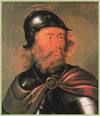


1306 Gerard of Poehlde predicted the end of the world this year back in 1147, since it's 1K years after the start of Roman emperor Constantine the Great's reign. On Jan. 27 Pope Clement V pub. a bull establishing the U. of Orleans in France (founded 1235) is granted title and privileges; in 1793 the French Rev. closes it down, and in 1808 it merges with the U. of France; a modern univ. is founded in 1960. In Jan. John Comyn betrays Robert the Bruce to Edward I, but Bruce is tipped off and barely escapes from London; the two meet on Feb. 10 at Greyfriars Church in Dumfries on holy ground between their lands, and after an argument where Bruce lets the cat that he's onto him out of the bag, and Comyn allegedly strikes first, Bruce "struck with his foot and sword", Comyn's uncle attacks Bruce and is killed by Bruce's brother-in-law, and Bruce leaves, learns that he's not dead yet, and sends his attendants to finish Comyn and his companions off (killing Comyn on the altar), becoming the first Scottish king to commit murder until James II; after getting Bishop Wishart of Glasgow to absolve him of the sacrilegious murder (self-defense, plus he didn't actually kill anybody, right?), declaring against Longshanks and rallying the Scottish nobles, on Mar. 25 he is crowned Scottish king Robert I (1274-1329) in Scone by Bishop William Lamberton, wearing robes and other trappings supplied by Wishart, in front of a small group of two earls and a handful of prelates and SW Scottish lords, founding the Bruce Dynasty (ends 1371), from which descends the Stewart line as well as the English royal Stuart line; "Black" "Good" James Douglas (1286-1330), son of Sir William Douglas the Hardy (d. 1298) (called Black by the English and Good by the Scots), who offered his allegiance to Edward I and was refused joins Robert in his coronation and goes on to become his greatest captain, winning 57 of his 70 battles; on Mar. 27 a 2nd ceremony is held after Countess Isabel MacDuff, Countess of Buchan (-1314) arrives to play the traditional role of her nephew the earl of Fife, who was absent the first time; on May 18 Pope Clement V excommunicates Bruce for killing Comyn on holy ground, and now both the English and a lot of Scots want to kick his butt? On Mar. 21 Robert II (b. 1248) dies, and his eldest son (by Agnes of France) Hugh V (1294-1315) becomes duke of Burgundy (until 1315), becoming the first to inherit the entire duchy without other children getting a piece. The Catalan Grand Co. attacks Constantinople and turns back, and on Apr. 4 Roger di Flor (b. ?) is assassinated by order of Emperor Andronicus II, causing the rest to turn W in rage and lay waste to Thrace and Macedonia. On May 22 Edward II is knighted, and his dad Edward I gives the duchy of Aquitaine to his little bugger. My life is empty without you babe? On June 19 after Edward I invades English flying the Red Dragon flag (no quarter, no rules) Robert I of Scotland is defeated by the English under the Earl of Pembroke at the Battle of Methven W of Perth, causing his band of a few hundred men (incl. Black Douglas) to become fugitives; after Bishop Robert Wishart is captured and his brother Neil KIA, Robert flees on horseback to the W coast, and on July 11 is defeated by Clan MacDougall John Macdougall of Argyle, Lord of Lorne at the Battle of Dalry (Dalrigh) (Dail Righ) (Strathfillan) near Tyndrum in Perthshire, causing him to send his women N to Tain in Rossshire and Kildrummy Castle in Mar (Aberdeenshire) in care of his brother Nigel, while he and his band of brothers disappear into his childhood haunts in SW Scotland, regrouping during the winter in Rathlin Island after a bunch of narrow escapes; meanwhile all of Robert's lands are forfeited, and the Bruce women are captured, Nigel Bruce is beheaded, Bruce's sister and the Countess of Buchan locked in iron cages, and his wife held by the stankin' English for three years; Sir Symon Fraser is captured, taken to London, and hanged, drawn and quartered, his headless corpse hung again and his head set on a spike on London Bridge next to guess-who Wallace's; Bruce doesn't see his wife again for eight years. In June French king (1285-1314) Philip IV (1268-1314) gives a secret commission to Bishop William de Nogaret as part of his plans to cash out his bankers, the rich Templars, who are financial partners of the Jews; on July 21-22 Philip IV, wanting to clean France of the garbage (and help pay for his war debts) has all 100K Jews in France arrested with all goods and money confiscated, then expelled if they won't convert to his one true faith, which most don't, so after being given one day's provisions they leave and head for Flanders, Spain, or the Rhenish towns across the Rhone River; Philip IV awards a synagogue to his coachman; meanwhile England whips and expels 100K Jews who defied Edward I's 1290 expulsion order; too bad, the king's collectors go to collect on loans made by the Jews, and are so mean that the people clamor for the Jews to be allowed to return, which they do in 1315 (until 1322) - let the vacation begin? On Aug. 4 Wenceslaus III (b. 1289) is murdered in Olomouc, Moravia en route to Poland to suppress a revolt of the nobles; the Premysl Dynasty dies out; HRE Albert I gives the Bohemian crown to his son Rudolf, but the Bohemians won't accept him, and there is a 4-year interregnum; Otto III of Bavaria (1261-1312) is elevated, but can't maintain himself, and Henry of Carinthia (1265-1335), husband of Wenceslas III's sister Anna claims the crown of Hungary (until 1310). Emperor Wedem Arad of Ethiopia sends an embassy of 30 envoys seeking an audience with the king of Spain in hopes of an alliance against the Muslims, which visits Rome and Avignon, and returns via Genoa. The Muslims use some form of incendiary weapon at Gibraltar to fend off attacks by the Castilians of Ferdinand IV. After getting pissed-off at all the air pollution, Edward I bans coal; England gets the honor of enacting the first anti-pollution laws - not a misprint? Nonfiction: Qutb al-Din al-Shirazi (1236-1311), The Pearly Crown; work on Islamic Illuminist philosophy. Pierre Dubois (1255-1321), De Recuperatione Sanctae Terrae; a plea for a new crusade, combined with a French monarchy reform program and a call for a European league, as well as a call for the secularization of church property and universal education. Births: French king of Navarre (1328-43) and count of Evreux (1319-43) Philip III (d. 1343) on Mar. 27; eldest son of Louis of Evreux (1276-1319) and Marguerite d'Artois; grandson of Philip II of France; husband of Joan II of Navarre (1312-49); father of Charles II of Navarre (1332-87). Deaths: Italian Franciscan monk-poet Jacopone da Todi (b. 1230); leaves Stabat Mater; former lawyer writes it after his wife is crushed to death by a platform at a festival, causing him to become a wild raving vagabond smeared with tar and feathers and walking on all fours until he joins the Franciscan tertiaries; "Stood the mother broken-hearted/ All in tears before the cross/ While her Son hung dying;/ Through her spirit heavy-laden,/ Mourning for Him and in pain,/ Pierced a sword of grief"; "Let me by the cross be guarded,/ Saved by Christ's redeeming Passion,/ Cherished by His grace;/ When my body shall have perished,/ Let my soul in heaven's glory/ See Him face to face." French duke of Burgundy (1271-1306) Robert II (b. 1248) on Mar. 21. French theologian John of Paris (b. 1255) on Sept. 22 in Bordeaux; dies with a case pending against him for a treatise contradicting the Church doctrine on transubstantiation by promoting impanation, the doctrine that the bread continues to exist after consecration, because the body of Christ is present by assumption and is not a doctrine of faith; leaves De Antichristo, De Modo Existendi Corporis Christi in Sacramento Altaris, and Contra Corruptorem Sancti Thomae. Scottish noble John III "Black" Comyn, Lord of Badenoch (b. 1270) on Feb. 10 in Dumfries; killed by Robert the Bruce in a church. Hungarian king (1301-5) and Bohemian king (1305-6) Wenceslaus III (b. 1289) on Aug. 4 in Olomouc, Moravia (murdered). Scottish freedom fighter Sir Symon Fraser (b. ?) in London (executed). Catalan Grand Co. leader Roger di Flor (b. ?) on Apr. 4 in Adrianople (murdered).


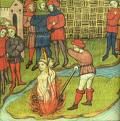






1307 In Jan. king (since 1287) Wareru (b. 1253) is assassinated by his grandsons, and his younger brother Hkun Law (1274-1311) becomes Burmese Hanthawaddy king #2 (until Mar. 1311). On Feb. 10 emperor #2 (since May 10, 1294) Temur Oljeitu (Yuan Chen Zong) dies, and on June 21 his nephew Khaisan (Khayishan) ("wall") succeeds as Mongol Yuan emperor #3 of China, taking the title Yuan Wu Zong (1281-1311) (until Jan. 27, 1311), with Oljeitu's widow Khatum Bulugan (Buluqhan) (Zibeline)(-1286) as regent; seven Mongol emperors rule China between this year and 1333. In Feb. after his brothers Thomas and Alexander are betrayed and executed as traitors Wallace-style, Robert the Bruce lands in his homelands at Carrick and begins guerrilla warfare in SW Scotland, doing the hippy hippy shake shake by leading his few hundred troops from the front and defeating the English at the Battle of Glen Trool in Galloway in Apr. and the Battle of Loudon Hill (assisted by Henry Sinclair of Rosslyn, giving him 600 troops) on May 10; lucky for him, on July 7 after launching an invasion of Scotland from Carlisle, Edward I Longshanks (b. 1239) dies in the marshes en route in Burgh-on-Sands (Burgh by Sands) near Carlisle at the "very great age" of 68, leaving the crown heavily in debt; even more lucky, on July 8 his ignorant, incompetent, pampered, gay whimp of a son (the first gay Prince of Wales?) Edward II (Edward of Carnarvon) (1284-1327) becomes the 30th monarch of England (until Jan. 20, 1327) (crowned next Feb. 25), giving the Scots something to cheer about, and women across Scotland are falling in love with because-I-said-so Bruce, who waits till the new king leaves Scotland for England in the summer to take on the pro-Balliol and pro-Comyn Scots in English pay, taking Inverlochy, Urquhart, and other castles of his enemies then razing them and burning their lands; too bad, in the winter Bruce suddenly takes ill, recovering by spring. On July 24 after losing 20K members fighting Muslims during the Crusades, resulting in a grunging mutual respect that arouses suspicions, esp. when they learn Arabic, dealing with the Assassins, and learn astrology, alchemy, and numerology (incl. forbidden rites and knowledge) (bringing chess to Europe?), the Knights Templar hold a gen. chapter meeting in Paris; pocket Pope Clement V writes to his boss Philip IV on Aug. 24 with a sealed mandate, not to be opened until dawn on Oct. 13 (Fri.), telling of his vision that the Knights Templar are heretics and blasphemers, devil worshipers, homosexuals, sodomites, defilers of Christ, and other blimey, and that God had told him to cleanse the Earth by rounding them all up and torturing them until they confess (roasting of the feet is particularly favored?); too bad, after being tipped off (by Jean de Joinville?) at midnight just before the big day dawns, Gerard de Villers flees with 50 knights and goes to sea in 18 Templar galleys under the Admiral of the Fleet in La Rochelle, carrying all their big secret documents, portable treasures, and other neat stuff, while Hugues de Chalons flees with the treasure of Hugues de Peraud, Villers and Challons being captured a few days later sans goodies; on Oct. 13 (Fri.) (Oct. 21 Gregorian) (dawn) AKA Black Friday the 13th, Templar grandmaster (since 1297) Jacques de Molay (1244-1314) is arrested in the Paris Temple by dozens of seneschals, accompanied by Philip IV, who gets pissed-off at not finding their treasure or documents; meanwhile the whole Templar Order throughout France is arrested (15K men), and its assets seized by the crown; the Order is charged with 127 blasphemous crimes; some Templars escape to Argyll, Scotland, where the war with England causes the papal bulls dissolving the order to never be proclaimed, and their allies the Freemasons protect them, admitting them into their lodges under the Accepted Rites of Freemasonry; others flee to Jewish-friendly Spain, Portugal, and Poland; de Molay's deputy Geoffroy de Charnay (1251-1314), and a few others barely survive under cruel chief torturer Gaspard Chaix, only to be burned on Mar. 18, 1314 after they refuse to give up the big secrets of where the loot is?; tortures incl. having heavy weights attached to their testicles, being jerked over heavy beams, held in dungeons for months, feet-roasting et al. - you can't take the Fifth with Clement the Fifth? After imprisoning him in 1307, Charles Robert of Anjou gets Duke Otto to abdicate the Hungarian throne, becoming undisputed king of Hungary. The Battle of Monte Rebello sees the end of Fra Dolcino and his Apostolic Brethren (founded 1260). William de Nogaret is made chancellor of France. Levon IV (b. 1289) is murdered, and Oshin I (1282-1320) becomes king of Lesser Armenia (until 1320). Sir James "Black" Douglas destroys an English garrison in his own Douglas Castle (one of three times), with so much butchery that they call it the "Douglas Larder". Lithuania annexes the city of Polotsk in Belarus by force, along with a charter of autonomy guaranteeing that the grand dukes won't "introduce new, or destroy the old", giving Lithuania control of the Dvina River trade route. Mas'ud III dies, becoming the last Seljuk sultan of the Sultanate of Rum (Roum) in Anatolia (Asia Minor) (founded 1077). Franciscan missionary John of Montecorvino (1246-1328), first Roman Catholic missionary in China is named by Pope Clement V as archbishop of Peking, and he baptizes 5K converts. After Arabic texts on alchemy get translated to Latin and spawn Euro alchemists, the Roman Catholic Church condemns alchemy as a diabolical art, which only makes it more popular? The legendary Rutli Vow of the three Swiss cantons is made, and the incident of Swiss nat. hero William Tell shooting the apple off his son's head in Uri allegedly dates to this year - a code story about the Templars not talking despite torture? 5-y.-o. Edouard de Bar (1302-36) (grandson of Edward I and nephew of Edward II) succeeds Guillaume de Gisors as grandmaster of the Priory of Sion (until 1336), which is expanded to nine commanderies (until 1481), incl. one at Gisors on the Rue de Vienne, which in the 16th cent. houses the archives of the Priory in 30 coffers :). Architecture: The 271-ft. tower of Lincoln Cathedral in England is finished. Deaths: English king Edward I (b. 1239) on July 7 near Carlisle; after his request to his son Edward II to carry his skeleton before the English army when fighting the Scots is dropped, he is buried in Westminster Abbey, with "Scotorum malleus" (Hammer of the Scots) carved on his tomb. Burmese king (1287-1307) Wareru (b. 1253) in Jan. (assassinated).
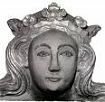

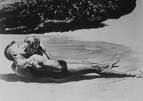
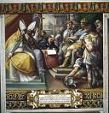




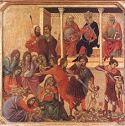
1308 Gaveston, oh Gavest-uh-uh-un? On Jan. 25 bi-curious Edward II marries 16-y.-o. 14th cent. blonde supermodel of the 14th cent. Isabella of France (1295-1358), daughter of Philip IV, described by Geoffrey of Paris as "the beauty of beauties... in the kingdom if not in all Europe"; meanwhile he angers his nobles by making his friend (and gay bud?) the earl of Cornhole, er, Gascon Piers Gaveston (Gavestone), 1st Earl of Cornwall (1284-1312) (a Gascon knight introduced by his daddy Edward I to him in 1298 as a suitable friend because of his wit, courtesy, and abilities, then exiled from court after the prince tries to bestow a title on him reserved for royalty; they ahem, don't have their first royal brat until 1312, Edward III (1312-77), followed by three more by 1321, John of Eltham (1316-36) (killed by his brother Edward III in a quarrel in Perth), Eleanor of Woodstock (1318-55), and Joan of the Tower (1321-62), plus at least one miscarriage (most of the time Isabelle my belle ends up not getting any and becoming frustrated while her hubby prefers to bonk his boyfriend in the next bedchamber?); meanwhile on Nov. 1 Gaveston marries the king's 13-y.-o. niece Margaret de Clare, Countess of Gloucester (1294-1342), and receives the earldom of Cornhole, er, Cornwall, and dominates the submissive, er, king, pissing-off the barons, causing them to rely on Edward II's inept nephew Duke Thomas of Lancaster (1277-1322) to continue fighting the pesky Scots. On May 1 HRE (since 1298) Albert I (b. 1255) is murdered by his disinherited nephew John of Swabia (the Parricide) (1290-1320) after being refused his share of the Hapsburg lands, and Francophile Count Henry of Luxembourg is elected king Henry VII (1275-1313) of Germany (until 1313), while his son Frederick the Handsome (the Fair) (1289-1330) becomes duke Frederick I of Austria (until 1330). In May Robert I of Scotland defeats the pro-Comyn Earl of Buchan at the Battle of Inverurie, wasting the lands so bad that they become infertile for a generation, and takes the port of Aberdeen by Aug., going on to defeat the Macdougall clan by the end of the year, causing more and more Scottish lords to join him, defeating English garrisons at Forfar and Cupar, crushing all resistance by Mar. The 20th cent. Storm of the SS was the Germans' own fault? In July the Teutonic Knights conquer Pomorze and Gdansk in Poland, massacring the Poles and bringing German settlers in to replace them, leaving a vaccum allowing Jews to begin colonizing Poland. Saruman has poisoned the mind of the king over these lands? There's nothing more reliable than the Canon Sure-Shot? On Aug. 8 Pope Clement V summons witnesses for the Templar Trials in Poitiers, bringing 72 Templars to testify about worshiping Head 58 AKA Baphomet (Muhammad?) (the Greek goddess of wisdom Sofia after applying the Atbash Cypher?) (the Shroud of Turin or Mandylion?); on Aug. 17 senior officers of the Templars are interviewed by three cardinals in Chinon; on Sept. 13 English common law stops a pair of French inquisitors arriving in England from prosecuting the Templars, causing Pope Clement V to write to Edward II: "We hear that you forbid torture as contrary to the laws of your land. But no state law can override canon law, our law. Therefore I command you at once to submit those men to torture", causing Edward II to flop, holding the first English tribunal of the Inquisition, and becoming the last use of torture in England until Queen Bloody Mary in 1553-8; the tribunal suppresses the Templar Order and seizes its assets for Edward II, making him and Philip IV the two kings who make out the best?; in Oct. 2007 the Vatican announces the release of the trial documents, showing that they were absolved of heresy charges but burned anyway - and all those Vatican bureaucrats kept their silence all that time? On Sept. 3 Pope Clement V issues the bull "Super specula", founding the U. of Perugia in Italy as a studium generale, with a school of arts, adding schools of medicine and law about 1200; on Aug. 1, 1318 Pope John XXII grants it the authority to confer degrees in civil and canon law, followed on Feb. 18, 1321 in medicine and arts; on May 19, 1355 HRE Charles IV raises it to an imperial univ.; on Oct. 11, 1371 Pope Gregory XI founds a faculty of theology, which is suprressed in 1811; on Aug. 27, 1824 Pope Leo XII makes the Collegio Pio the chief college; in 1860 after the unification of Italy, it is refounded as a state-run univ., becoming one of the top univs. in Italy after WWII. Robert the Bruce, confident that wimpy Edward II is too weak to press his dead daddy's claims holds a Gaelic-speaking parliament at Ardchattan in Argyll. Cangrande della Scala (1291-1329) begins sharing the rule of Ghibelline-controlled Verona with his brother Alboino I della Scala (-1311) (who took over in 1304), going on to marry Giovanna of Antioch (a descendant of HRE Frederick II) and become the leading patron of Dante Alighieri. Turkoman Karamanoglu leader Mehmed Bey (1307-34), son of Aydin conquers Birgi (Pyrgion) AKA Dios Hieron ("Sanctuary of Zeus") AKA Christoupolis and makes it the capital of the new principality (beylik) of Aydin (formerly Tralleis) in W Anatolia that extends as far as Izmir (Smyrna) (ends 1390). The Bornu Empire in NE Nigeria (ends 1893) is founded as a continuation of the Kanem Empire, expanding into Niger, Chad, and Cameroon, becoming active in the trans-Saharan slave trade. 6-y.-o. Edouard de Bar (1302-36) accompanies the duke of Lorraine into battle, is captured, and not ransomed until 1314. The Peruzzi banking firm in Florence pays a 40% dividend this year. The Worshipful Co. of Barbers in London is in operation by this time, with Richard le Barber as master, relieving the clergy of the prohibited practice of spilling blood incl. bloodletting and leeching, shaving, haircutting and hairdressing, lancing of boils, teeth extraction, and other kinds of surgery; in 1368 after too many quacks join, surgeons are permitted to form their own unincorporated fellowship or guild, with the power to oversee all surgical practices, receiving a royal charter in 1462 before merging in 1540 to form the Co. of Barbers and Surgeons. Architecture: Philip IV purchases the Hotel des Nesle near Notre Dame de Paris, in which he builds one of the earliest tennis courts in Paris. Art: Duccio di Buoninsegna (1255-1319), Altarpiece of the Cathedral of Siena (1308-11); his masterpiece, containing 26 scenes from the life of Christ on golden Byzantine-style backgrounds, incl. Maesta (Maestà), and The Massacre of the Innocents - one gory scene all good Christians can agree on? Births: Burmese Hanthawaddy king #7 (1330-48) Binnya E Law (d. 1348) on Mar. 13. French countess Jeanne (Joan) III of Burgundy (Bourgogne) (de France) (d. 1349) on May 2; eldest daughter of Philip V the Tall (1292-1322) and Joanna II of Burgundy (1292-1330); wife (1318-) of Eudes IV of Burgundy (1295-1350). Serbian 7' king (1331-46) and emperor (1346-55) Stephen (Stefan) Uros IV Dushan (the Mighty) (d. 1355); son of Stephen Uros III (-1331). Greek Hesychast patriarch of Constantinople (1353-4, 1364-76) Philotheos Kokkinos ("the redhead") (d. 1378) in Thessalonica; born to a poor family (of Jewish converts?). Deaths: English patriarch Sir William Howard (b. 1216) in May. Austrian HRE (1298-1308) Albert I of Hapsburg (b. 1255) on May 1. Scottish scholastic theologian-philosopher John Duns Scotus (b. 1270) on Nov. 8 in Cologne; beatified in 1993; leaves Ordinatio (Opus Oxoniense), (12 vols.), containing 48 Distinctions, and lectures he delivered at Oxford U. in the 1290s commenting on The Sentences of Peter Lombard, containing his views on the univocity of being, the formal distinction, less than numerical unity, "thisness" (hacceity), a critique of illuminationism, and his argument for the existence of God, which he formulates as "God is more than existence" because every one of God's creatures is a sign (theophany) of his presence, and the Immaculate Conception of Mary, founding the Scotist School of Theology; his followers are called Dunsmen, Dunses or Duncemen, and as they come to resist the revival of classicism and progressive forms of learning, esp. Renaissance humanism, and "rage in every pulpit" in an obstructionist fashion, the term "dunce" is coined; his theory that the term "being" must be used univocally of God and creatures opens the door to modernity, materialism, and atheism? - the original Mel Gibson, or his daddy?

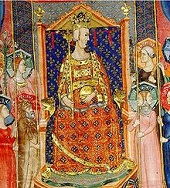




1309 On Mar. 9 nouveau riche Philip IV of France orders the papacy moved from the Lateran in Rome to a new papal court in France, but Pope Clement V, allegedly pissed-off at his treatment of the Templars fixes the papal court in Avignon in sunny SE France in the Venaissin, outside of Philip IV's jurisdiction; the Babylonian Captivity of the Church begins (ends 1377); Villandraut Castle (Chateau de Villandraut) is built by Bertrand the Goth for the popes in Avignon, and they stay there until 1377, followed by the Avignonese popes of the Western Schism of 1378-1417, causing the Lateran to begin to fall into ruin. In Mar. Robert I holds his first parliament in St. Andrews, where he gets the Scottish nobles and clergy to declare loyalty to him and denounce John Balliol as Edward I's puppet; Robert then forbids all mention of the disgraced Balliol Dynasty while claiming his own direct and lawful succession from Alexander III, bypassing the bum even in the charts, getting Philip IV of France to recognize his kingship; he begins a campaign to clear his remaining English and Scottish enemies from the garrisons S of Perth and Dundee. On May 5 king (since Jan. 7, 1285) Charles II the Lame (b. 1254) dies, and his son Robert the Wise of Anjou (1277-1343) becomes king of Naples (until Jan. 20, 1343). With help from Alonzo Perez de Guzman of Aragon (1256-1309) (founder of the Medina Sidonia family) (a turncoat Muslim from Morocco, whose family covers their Muslim past up?), who defends Tarifa from Muslim attacks, Ferdinand IV of Castile (1285-1312) finally captures Gibraltar from the Moors, who held it since the big invasion of 711; the Moors recapture it in 1333. John of Luxembourg (b. 1296) becomes count of Luxembourg. Duke Arthur II of Brittany convokes the first estates-gen. in Brittany, becoming the first time in French history that the third estate (commoners, i.e., workmen) is represented (1=knights, 2=clerics). The Order of Hospitalers (Knights of St. John of Jerusalem) begins conquering Rhodes (ends 1310). Architecture: The Municipal Palace of Siena (begun 1288) is finished, ending up holding many paintings by the Sienese School. The Teutonic Knights move their capital from Venice to the brick abbey-fortress of Marienburg (Malbork) in Wurzburg 50 mi. SW of Danzig (built in 1276), fortifying it; it becomes the home of the grandmaster of the Teutonic Knights, and the largest fortress of the Middle Ages. Construction of a new Doge's Palace in Venice begins on the site of earlier palaces (ends 1438). Inventions: Paper is first used in England; and it comes from Spain?; meanwhile paper money in China is depreciated to counter printing press inflation. Marchetto (Marchettus) of Padua (1274-?) pleads for the introduction of counterpoint into musical composition. Nonfiction: Jean of Joinville (1224-1317), Vie de Saint Louis (Life of St. Louis) (Livre des Saintes Paroles et des Bons Faiz de Nostre Saint Roy Looÿs); a bio. of King Louis IX the Saint and the Seventh Crusade which he wrote under the atronage of Queen (since 1285) Jeanne (Joan) (Johanna) I of Navarre (1273-1305), wife of Philip IV, and presents to the future Louis X. Births: German scholar ("northern successor of Albertus Magnus") Conrad (Konrad) von Megenberg (d. 1374) in Mainberg (Mebenberg?) near Schweinburt, Bavaria. Deaths: Italian nurse St. Alda (b. 1249). French king of Naples-Sicily Charles II the Lame (b. 1254) on May 5 in Naples. Spanish military hero Alonzo Perez de Guzman "El Bueno" of Aragon (b. 1256); his family stages a coverup of their Muslim past?


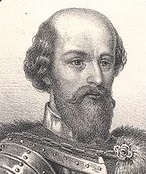

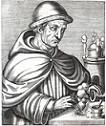

1310 On May 12 54 Knights Templar are burned in France as the Order of Knights Templar is ruthlessly extinguished by Philip IV of France allied with the Church; 115 are eventually burned after their feet are roasted over a fire to make them confess; those lucky enough to survive end up as street beggars wearing their charred feet around their necks. On Aug. 27 Charles Robert of Anjou is crowned as king Charles I Robert (1288-1342) of Hungary, founding the Hungarian Anjou Dynasty, known for its Western influences and Italian chivalry, with capital at Visegrad N of Budapest on the right bank of the Danube River in the Danube Bend; he spends the next 15 years subduing the many "little kings" of Hungary, incl. Matthew III Csak (1260-1321) and Ladislas of Transylvania. In Nov. at the urging of Avignon Pope Clement V and the Ghibellines, German king (since 1308) Henry VII of Luxembourg (1275-1313) invades Italy with 5K troops and restores order in Milan, Cremona, and Rome, intending to reconcile the Ghibellines and Guelphs; too bad, the Ghibellines have other ideas, esp. Cangrande (It. "big dog") I della Scala (1291-1329) (patron of Dante) of Verona, and White Guelph Dante Alighieri cheers Henry VII on from the sidelines as the new Charlemagne, exhorting him to retake Florence from the hated Black Guelphs so he can return from exile, but making the mistake of going overboard and dissing his personal enemies, which backfires when Henry VII dies in 1313 and the White Guelphs are pardoned, but he is specially exempted for personal invective-filled letters to Henry VII; meanwhile he writes the first two books of his "Divine Comedy". The Knights of St. John (Hospitalers) finish conquering Rhodes, becoming the Knights of Rhodes, valiantly resisting expulsion until 1522 while engaging in a naval crusade, which the Ottomans and Venetians regard as pure high-seas piracy run by pirates bearing crosses. Venice establishes a Council of Ten to rule the city, which does it secretly and ruthlessly. The Scots stick it up the English king's butt while he moans and groans, until the English barons take over as saddle boss? Edward II leads an army into Scotland, causing Robert I to withdraw to the highlands, then harass their withdrawal after they give up and return to England, then have a field day picking off English garrisons as the holdout Scottish barons switch allegiances to him, capturing the castle and town of Lanark; the Scottish clergy recognize Robert I as king, while the ooh-chucka-lucka English barons, led by Edward II's cousin Thomas Plantagenet, 2nd Earl of Lancaster (1277-1322) bring armed followers to a baronial parliament and force Edward to appoint 21 lay and ecclesiastical magnates, the Lord Ordainers from among themselves to limit his powers and propose reform ordinances - eight beauties and eight geeks? Al-Nasir Muhammad reascends the Mamluk throne (1299-1309) for the last time, stabilizing the empire for three decades (until 1341). The Catholic Church imposes taxes on the Jews in Rome, allegedly for their protection from violence. Muslims from Mali in W Africa sent by Malian king Abu Bakar (Bakari) (Bari II) sail W, and in 1312 reach the Gulf of Mexico and explore up the Mississippi River? A chartered insurance co. opens in Bruges. Ars Nova music begins to replace Ars Antiqua as the style of France (ends 1377), known for strongly contrapuntal style and greater independence of rhythm, and even worse, the mixing of the sacred and secular; French composer Philippe de Vitry (1291-1361) coins the term "Ars Nova" in 1322. Architecture: The Doge's Palace in Venice is begun (finished in 1340). Inventions: In this cent. gunpowder becomes widely used in siege machines after German Franciscan monk alchemist Berthold Schwartz (Berthold der Schwarze) (Berthold the Black) (Konstantin Anklitzen) of Freiburg allegedly discovers the formula between 1313-53; the knight in armor in battle starts to become obsolete during this cent; rockets find their way into European arsenals in this cent. Art: Giotto (1267-1337), The Peruzzi Altarpiece (1310-15). Nonfiction: The Yalkut Shimoni, an aggadic compilation of the books of the Hebrew Bible filled with interpretations of various rabbis can be traced to this date; it was really written in the 11th-12th cents.?; "The year the Messiah will arrive when all the countries of the world will irritate one another and undermine with war. The lord of Persia irritates the King of Arabia with war. The King of Arabia goes to Edom for counsel. At that point the King of Persia wrecks the world. Also, all the countries of the world start to frenzy and are perplexed, and Israel too is anxious regarding how to safeguard from this. God then says to them 'Don’t fear for everything that I have done is for your advantage, to devastate the underhandedness of the kingdom of Edom and kill detestables from this world so that the Messiah can come, your season of recovery is presently.'" Births: Polish Piast king (last) (1333-70) Casimir III the Great (d. 1370) on Apr. 30 in Kowal; son of Wladyslaw I the Elbow-High and Hedwig of Kalisz. Spanish king (1312-50) Alfonso (Alphonso) XI of Castile (d. 1350). English Hundred Years' War soldier-politician-diplomat Henry of Grosmont, 4th Earl of Lancaster and Leicester and 1st Duke of Lancaster (d. 1361) in Grosmont Castle, Monmouthshire; son of Henry, 3rd earl of Lancaster (1281-1345) and Maud Chaworth; founding member of the Order of the Garter; created duke in 1351. French Benedectine monk and Avignon pope #6 (1362-70) (Blessed) Urban V (Guillaume de Grimoard) (d. 1370) in Grizac, Languedoc; feast day: Dec. 19. French "Le Viandier" chef (to Philip VI, Charles V, and Charles VI) (first prof. French master chef) Taillevent (Fr. "slicewind") (Guillaume Tirel) (d. 1395) in Point-Audemer. Deaths: Spanish rabbi Shlomo ben Aderet (b. 1235) in Barcelona. Italian alchemist Arnold de Villanova (b. 1238) near Genoa; dies at sea en route to visit sick Pope Clement V. Muslim astronomer-mathematician Shams al-Din al-Samarqandi (b. 1250); leaves Synopsis of Astronomy and a star catalog for 1276-7.
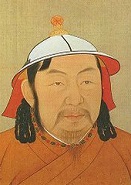
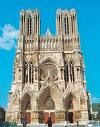

1311 On Jan. 27 emperor #3 (since June 21, 1307) Yuan Wu Zong (b. 1281) dies, and on Apr. 7 his brother Ayrubarwada becomes Yuan Ren Zong (Buyantu Khan) (Blessed Khan) (1285-1320), Mongol Yuan emperor #4 of China (until Mar. 1, 1320), becoming the first to actively support adoption of Confucian principles into the admin. system incl. the civil service exams. On Feb. 7 German king Henry VII of Luxembourg's son Count John of Luxembourg (Bohemia) (1296-1346) is crowned king of Bohemia in Prague, which had been in anarchy since the death of his wife's brother Wenceslas III, bringing the Bohemian throne to the house of Luxembourg (until 1489). On Mar. 15 after hiring them and refusing to pay them, the Frankish Duchy of Athens under Duke Walter V of Brienne (b. 1278) is defeated by the Co. of Catalan at the Battle of Cephissus (Orchomenus) (Halmyros) in Boeotia, and Walter V is KIA; they divide the wives of the Frenchmen between them and settle down as the new Aragonese Duchy of Athens (1311-88). In Mar. king (since 1307) Hkun Law (b. 1274) is assassinated by his brother-in-law, who makes his son Saw O (1283-1323) Hanthawaddy king #3 of Burma (until sept. 1323). In Apr. after Padua, master of Vincenza since the demise of Ezzelino III da Romano in the 1250s rebels against Henry VII, Cangrande della Scala and his brother Alboino della Scala lead an imperial army that liberates Vicenza from their rule, then sieges Brescia in May after the Guelphs seize control, causing it to submit on Sept. 16, after which Henry VII triumphantly enters at the head of 300 knights led by Cangrande; meanwhile Alboino dies on Nov. 29, leaving 20-y.-o. Cangrande as sole ruler of Verona. Don't begin the Beguines? In Oct. the Council (Synod) of Vienne (ends 1312), called by Pope Clement V denounces the Beguines (retreats for widowed Crusaders and other women, who take no vows and care for the sick and poor) (founded 1180) as heretical, and orders their suppression; a number of Beguine communities survive to modern times; Pope Clement V declares the belief in the right to usury to be heresy, and abolishes all secular legislation allowing it. Spanish king of Majorca (since 1276) James II (b. 1243) dies after suppressing the Knights Templar and seizing its tithes, and his 2nd son Sancho I "the Peaceful" (1274-1324) becomes king of Majorca, count of Roussillon and Cerdanya, and Lord of Montpellier (until 1324), going on to extort money from the Jews to built a navy - Admiral Hyman Rickover jokes here? The 21 Lords Ordainers draw up the Ordinances of 1311 in 41 articles to try to rein-in their fag, er, king and give the barons a larger share in govt., which are confirmed by Parliament (in which burgesses and knights sit) (ends 1322); the king is required to have baronial consent through Parliament to declare war, make royal appointments (no more fags?), depart from the real. Paper money is discontinued entirely in China. Black Muslim Mali King Abubakari II hires Arab ship builders from Lake Chad to build a fleet, then sails down the Senegal River and crosses the pond (Atlantic), landing in Panama, then continues S, settling in the Inca Empire? - the Incans, seeing black men arrive from the east, figure that white men must not be far behind? Ghibelline condottiere Uguccione della Faggiuola (1250-1319) becomes HRE Henry VII's imperial vicar in Genoa, and ruler of Pisa in 1313, conquering Lucca in 1314 (until 1316). Architecture: Giovanni Pisano finishes the pulpit in Pisa Cathedral (begun 1301). The facade of Notre Dame Cathedral in Reims (Rheims) (begun 1211) is finished; the whole structure isn't finished until 1430. Art: Giotto (1267-1337), The Madonna in Glory. Births: English queen consort Philippa of Hainault (d. 1369) on June 24 in Valenciennes; daughter of William I of Hainault (1286-1337) and Jeanne de Valois; wife (1328-) of Edward III (1312-77). Deaths: Persian Muslim Sufi astronomer Qub al-Din al-Shirazi (b. 1236). Thai Lan Na king #1 (1296-1311) Mangrai (b. 1238) in Chiang Mai (struck by lightning during a thunderstorm in the city market). French count of Brienne (1296-1311) Walter V (b. 1275) on Mar. 15 in Greece (KIA in the Battle of Orchomenos/Halmyros). Spanish king of Majorca (1276-1311) James II (b. 1243) on May 29. Burmese king (1307-11) Hkun Law (b. 1274) in Mar. near Mawlamyaing (assassinated). French countess (of Evreux) Marguerite d'Artois (b. 1285) in Paris.
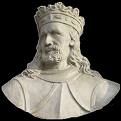



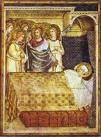
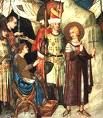
1312 In Feb. Cangrande della Scala plays both against the middle by accepting the election of the ruling council of Padua as imperial vicar of Vicenza; too bad, Padua was playing him for a patsy and begins attacking Vicenza and Verona, beginning an 18-mo. war.; meanwhile Cangrande invites Dante Alighieri to Verona, where he stays until 1318, earning him immortal praise in his "Divine Comedy" (Canto 17:70-93). Just beat it, beat it, beat it? In Feb. Philip IV appears before the Council of Vienne and vehemently demands the suppression of the Knights Templar; on Mar. 22 Pope Clement's bull Vox Clamantis dissolves them, and transfers their property to the Hospitalers, except in Spain and France, where the crown keeps it; Philip makes the Templar treasury a section of his royal finance admin.; excommunicated Robert I the Bruce welcomes the Templars to Scotland; Dinis I of Portugal protects the Templars in his territory, and absorbs their holdings into his new Order of Christ; on Apr. 4 the Council of Vienne proclaims a new Crusade. On June 19 King Edward II's bud Piers Gaveston (b. 1284), 1st earl of Cornholio, er, Cornwall is kidnapped and beheaded on Blacklow Hill near Warwick (owned by the earl of Lancaster) after the nobles try and fail 3x to have him banished - he could never leave his friend's behind? On June 29 German king (since 1308) Henry VII of Luxembourg (b. 1275) is crowned HRE (until 1313) in Rome, after which he sieges Florence and defeats the Black Guelphs; too bad, he dies before exiled Dante can return (either that or the White Guelphs cover up his presence after they turn against him too?). On Aug. 27 duke (since Nov. 18, 1305) Arthur II (b. 1261) dies, and his son (by 1st wife Mary of Limoges) John (Jean) (Yann) III the Good (1286-1341) becomes duke of Brittany (until Apr. 30, 1341). On Sept. 7 king (since Apr. 25, 1295) Ferdinand IV (b. 1285) dies suddenly in his tent in Jaen while preparing to raid Granada, and next Sept. 7 his infant son Alfonso XI (the Avenger) (1311-50) becomes king of Castile and Leon (until Mar. 27, 1350). Ecumenical church council city Lyons is incorporated into France under the terms of the Treaty of Vienne. Matteo I Magno Visconti (1250-1322) is designated imperial vicar of Milan, founding the Visconti Dynasty, known for their Biscione ("Viper") Coat of Arms (a serpent giving birth to a child via its mouth), who go on to rule with an iron hand while expanding through N Italy, incl. Genoa (until 1447). On Oct. 29 the Treaty of Inverness between Norway and Scotland recognizes Robert I of Scotland, who creates his brother Edward the Bruce as earl of Carrick and lord of Galloway, and makes him one of his key generals, along with Sir James "Black" Douglas (1286-1330) and Thomas Randolph, 1st Earl of Moray (-1332), leading them into N England to pillage and burn in order to force Edward II to make peace and give up. Mansa Kankan Musa (-1337) (Emperor Kankan Musa) becomes ruler (until 1337) of Mali, an area of West Africa on the Niger River, incl. far-out Timbuktu, encouraging the growth of Islam; under him the M-loving Mali Empire reaches its height. Genoese mariners rediscover the 7 major and 6 minor Canary Islands, named for the large dogs found there (Latin "canis"). Art: Simone Martini (1280-1344) begins painting frescoes in the Chapel of St. Martin in the lower church of St. Francis in Assisi (until 1317), incl. St. Martin's Dream and St. Martin Renouncing the Sword. Births: French Capetian queen of Navarre (1328-49) Joan II (d. 1349) on Jan. 28; only daughter of Louis X and 1st wife Margaret of Burgundy; half-sister of John I. English king (1327-77) Edward III (d. 1377) on Nov. 13 in Windsor Castle; son of Edward II (1284-1327) and Isabella of France (1295-1358) - daddy swings both ways sometimes? Scottish heroine "Black" Agnes, Countess of Dunbar and March (d. 1369); daughter of Earl Thomas Randolph of Moray (nephew of Robert I) and Isabel Stewart. Deaths: French duke of Brittany (1305-12) Arthur II (b. 1261) on Aug. 27 in Chateau de L'Isle. English royal cornholio Piers Gaveston (b. 1284) on June 19 on Blacklow Hill (murdered). Spanish king of Castile (1295-1312) Ferdinand IV (b. 1285) on Sept. 7 in Jaen.



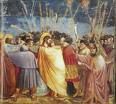

1313 On Feb. 7 Robert I the Bruce begins a campaign to attack the English castle network in the Scottish Lowlands, and captures Dumfries, then retakes English-held (since 1296) Edinburgh Castle on Mar. 14 after his nephew Thomas Randolph, 1st Earl of Moray (-1332) uses a secret path up the apparently impregnable rock on which it stands, leaving only Stirling Castle in English hands; Bruce wows the people by personally wading across the moat around Perth and being first to scale the city walls; in Apr. Fruit of the Loom king John Balliol (b. 1249) dies in Helicourt-en-Vimeau, Picardy, France; on May 18 Robert lands on the Isle of Man, then after receiving the good news about Balliol in the fall he declares a 1-year deadline for the remaining Scottish traitors to submit or find they don't have a friend in the land. On Feb. 15 after the young noblemen of Liege try a coup and are defeated by the commoners, they sign the Treaty of Angleur. On May 11 Canterbury archbishop(since Sept. 1294) Robert Winchelsey (b. 1245) dies, and there is no successor for three years. On Aug. 24 after the pope allies with Philip IV of France against HRE (since 1312) Henry VII of Luxembourg (b. 1275) to save Naples from him, and the Lombard cities withdraw their support, surrounded Henry VII dies of malaria in Buonconvento near Siena while en route with Venetian allies to attack Robert of Naples, and on Nov. 9 Bavarian duke (1294-1301) Louis IV the Bavarian (1282-1347) defeats his Hapsburg cousin Duke Frederick III the Handsome (the Fair) (1289-1330) of Germany (AKA Duke Frederick I of Austria) in the Battle of Gammelsdorf, forcing him to renounce tutelage over the young dukes of Lower Bavaria, Henry XIV, Otto IV, and Henry XV; although raised together and friends till now, when the Luxembourg party of the prince electors passes over Henry VII's son John of Luxembourg (1296-1346) as too young, then chooses Louis IV the Bavarian over Frederick III the Handsome, the latter two become bitter enemies; meanwhile Henry VII's death frees Cangrande della Scala to concentrate on his war against Padua and build up his army. Uzbeg (Ozbeg) (1282-1341) becomes khan of the Golden Horde (until 1341), bringing it to its zenith. Turkoman leader Saruhan Bey (1300-46) conquers Manisa (Magnesia), founding the Saruhan Dynasty in W Anatolia (ends 1389). Architecture: Thomas Plantagenet, 2nd earl of Lancaster begins massive Dunstanburgh Castle in Northumberland, becoming its biggest. French minister of Philip IV the Fair (since 1304) Enguerrand de Marigny (1260-1315) founds the collegiate church of Notre Dame d'Ecouis near Rouen. Sir William de Norwico (Norwich) orders a stone wall built to screen the privy outlets of the privy room near the banquet table of the Tower of London (home of the royal family) from public view. Inventions: German Franciscan Grey Friar Berthold Schwartz (Schwarz) (Berthold the Black) (real name Konstantin Anklitzen) of Freiburg invents gunpowder about this time? - the original May the Schwartz Be With You? Art: Giotto (1267-1337), The Kiss of Judas (1305-13). Births: Japanese Ashikaga pretender emperor #1 (1331-3) Kogon (Kazuhito) (d. 1364) on Aug. 1; 3rd son of Go-Fushimi (1288-1336). Italian patriot-political reformer Cola di Rienzi (Rienzo) (d. 1354) in Rome. Italian jurist Bartolus de Saxoferrato (d. 1357) in Venatura (near Sassoferrato), Marche; educated at the U. of Perugia, and U. of Bologna. Italian novelist and (with Petrarch) the earliest humanist Giovanni Boccaccio (d. 1375) in Florence (or Certaldo, in Florentine territory) in the summer; illegitimate son of prosperous merchant banker Boccaccio di Chellino (dir. of the Compagnia dei Bardi) and a French noblewoman. Deaths: German poet Hugo von Trimberg (b. 1230); leaves The Solsequium (moral examples), Registrum Multorum Auctorum (verse history of lit.), and Der Renner (moral poem - his only work to survive to modern times). German friar-scientist Witelo (b. 1230). English archbishop of Canterbury (1294-1313) Robert Winchelsey (b. 1245) on May 11 in Otford. Scottish king (1292-6) John de Balliol (b. 1249) in Apr. in Helicourt-en-Vimeau, Picardy, France. German king (1308-13) and HRE (1312-3) Henry VII of Luxembourg (b. 1275) on Aug. 24 in Buonconvento (near Siena), Italy.





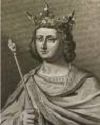



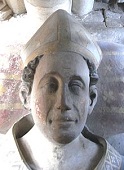
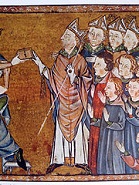

1314 Pop. of Paris: 200K; France: 22M. On Mar. 18 after years of fruitless attempts to torture out the whereabouts of their treasure, 39 more Knights Templar are burned in Paris, incl. grandmaster #23 (last) Jacques de Molay (Molai) (b. 1244) and his deputy Geoffroi de Charnay (Charney) (Charny) (b. 1251), preceptor of Normandy; they are slow-roasted over smokeless charcoal, taking hours to die?; in the flames de Molay (who had been tortured into a confession of heresy and given life in priz earlier that day, only to immediately retract it and ordered burned) protests the innocence of the Templar Order, and calls down Philip IV and Pope Clement V for their injustices, launching the Templar (De Molay) Curse, and sure enough they both croak later this year, popey going first in only 33 days? On Apr. 20 Pope (since June 5, 1305) Clement V (b. 1264) dies, and the papacy remains vacant for more than two years - read your Dante and grab an iced half-latte? On June 21 after gathering a 16K-man army (boycotted by several English earls), Edward II relieves the siege of Edinburgh, then crosses the Bannockburn River after hearing that Stirling Castle, the last major English stronghold in Scotland had agreed to surrender if not relieved by June 24; on June 23 after Robert I chooses the ground, the Battle of Bannockburn sees Scottish king (since 1306) Robert I the Bruce (1274-1329) and an underarmed force of 8K (no Knights Templars led by Sir William "the Crusader" Sinclair of Roslin (1283-30)?) carrying the relics of St. Columba wait for the English force of 16K to approach the woods S of the castle, and surprise them in a marshy field next to the Bannockburn River 2 mi. S of Sterling, using the schiltron to advantage to rout the cavalry vanguard; after the English start out with a charge by the knights, Robert I wows his men and becomes a legend by boning, er, braining English knight Baron Henry de Bohun with a battle-axe after being spotted out in front and being charged, splitting his skull from crown to chin, freaking his brother Humphrey de Bohun, 4th Earl of Hereford (1276-1322), constable of England, who was kept from leading the English army in favor of inept Gilbert de Clare, 8th Earl of Gloucester (b. 1291), who is KIA, ending the male line of the illustrious de Clare family in England, and turning his three sisters into rich debs, Piers Gaveston marrying Margaret de Clare to get her dough and pass for straight, and Hugh le Despenser doing ditto with Eleanor de Queer, er, Clare?; on June 24 (Midsummer's Day) (Feast of the Nativity of St. John) the Scots surprise the English again, attacking them from the woods before they can get out of the marshland into firm open ground, and putting them to flight, causing many to drown in the muck, then chasing fleeing Edward II and despoiling his lavish baggage train; the kilted, bearded, erin-go-braghing Scots then take Stirling Castle and go on to kick the last English butt out of their country, winning Scotland its independence for the next three cents., although Edward II never formally recognizes the Bruce as king; one of the earliest battles at which the skirl of the bagpipes is heard; imprisoned Scottish bishop Robert Wishart is exchanged for the earl of Hertford, and Robert I's wife and daughter are exchanged for English POWs; James "Black" Douglas is knighted by Bruce on the battlefield; Angus (Aonghus) Og Mac Domhnaill, Lord of Islay (-1316), son of Angus Mor and head of Clan Donald (McDonald) receives lands from Robert I for his part in the V, helping his clan pass up rival Clan MacDougall; in Nov. a parliament in Cambuskenneth Abbey near Bannockburn forfeits the lands of Robert I's remaining Anglo-Scottish opponents (supporters of Balliol and Comyn), giving him loot with which to reward his loyal supporters, and creating the "disinherited" class of Scottish nobles, who nurse grudges; Robert I creates the Order of Heridom and the Brothers of the Rosy Cross (later Kilwinning) with lands in Argyllshire; Robert I protects the Templar Order in Scotland, with Templar land administered by the Hospitalers, and the Templar fleet partially integrated into the Scottish fleet; after wiping off his bloody battle-axe, Robert I leads his forces into N England again to pillage and search for loot (until 1315); by now Edward II's inept nephew Duke Thomas of Lancaster, 2nd Earl of Lancaster (1277-1322) virtually rules free-falling England (until 1318), offering feeble resistance to Scottish raids and civil disorders; in June (last Sat.) the annual Ceres Highland Games in Scotland are founded; the Scots win their freedom for almost 400 years (until 1707) - keep those stone and log-throwing skills alive? On Sept. 17 after Cangrande della Scala pisses them off by burning crops and towns in Paduan territory, a large Paduan army under Ponzino de' Ponzini attacks Vincenza, causing Cangrande to jump on his horse in Verona and ride like a greyound to Vicenza, where he catches them still in the suburbs and personally leads a rout standing in his stirrups swinging a mace "as fire fanned by the wind devours stubble" (Albertino Mussato), with his cousin Federico della Scala helping him and becoming a hero, then trying to seize power in 1325 and getting banished; in Oct. a peace treaty is signed recognizing his supremacy over Vicenza, and his hell-for-leather ride becomes legendary, along with his magnanimous treatment of POWs. In Sept. Philip IV's minister (since 1304) Enguerrand de Marigny (1260-1315) negotiates a peace with the Flemings, pissing-off the princes of the blood, who are eager to fight them; after Philip IV dies he is arrested by order of Louis X at the instigation of Philip IV's brother Charles of Valois for bribery, and beats the charge, only to be framed on sorcery and hanged next Apr. 30 in Montfaucon. The original Iron Man Triatholon? On Nov. 25 after a double election, where the archbishop of Mainz casts four of the seven votes, Louis (Ludwig) IV the Bavarian (1282-1347), head of the House of Wittelsbach (founded 1119) is crowned king of Germany and HRE in Bonn by the archbishop of Cologne instead of the usual site of Aachen, and begins an 8-year civil war over the imperial title with Frederick III the Handsome (the Fair) (1289-1330), who is supported by his brother Duke Leopold I of Austria (1290-1326) and the Avignonese popes; during Louis IV's reign the imperial chancery first adopts German instead of Latin for use in official documents - jawhol, you spaghetti-slingers? On Nov. 29 after the loot from the Jews and Templars, as well as all the overtaxation measures he has instituted still don't bail the treasury out of its war debts, causing him to call another estates-gen., which bickers and doesn't cough up any more moolah, king (since Oct. 5, 1285) Philip IV (b. 1268) dies, and his son Jeanne of Navarre becomes Capetian king #12 Louis X (the Quarrelsome) (the Quarreler) (the Stubborn) (1289-1316) (until June 5, 1316); his reign is dominated by his uncle Charles of Valois, while Philip IV's other sons Philip V (1294-1322) and Charles IV (1294-1328) wait in line; a plan to steal Gascony from the weak English king is put in motion, while a reaction against the monarchy forces concessions; John Tannere (Canne), who claims to be the son of Edward I is hanged, drawn, and quartered as a traitor - did it look like a boa constrictor? Konya, capital of the kaput Seljuk sultanate of Rome is captured by the principality of Karaman, who make it their capital and start claiming themselves as the rightful heirs. Wedem Arad dies, and Amda Seyon (Amde Tsiyon) ("Pillar of Zion") I (-1344), AKA Gebre Mesqel ("Slave of the Cross") becomes Solomonic emperor of Ethiopia (until 1344), going on to expand Ethiopian terrority by conquering Muslim borderlands, and spreading the Christian cross in the Horn of Africa - the crescent horn? Exeter College at Oxford U. is founded by bishop of Exeter (1308-26) Walter (de) Stapledon (1261-1326) to train clergymen; alumni incl. J.R.R. Tolkien. The College de Montaigu in Normandy, France is founded by Rouen archbishop (1311-9) Giles I Aycelin (Aicelin) de Montaigu (Montaigut) (1252-1318) for poor students from distant locations; it later moves to the U. of Paris, going on to produce famous students inc. Erasmus of Rotterdam, John Calvin, John Knox, and Ignatius of Loyola. Architecture: Old St. Paul's Cathedral in London (begun 1087) is completed. Births: Russian Orthodox Hesychast monk (St.) Sergius of Radonezh (d. 1392) on May 14 near Rostov the Great (1319?) (1322). Deaths: French last Knights Templar grandmaster Jacques de Molay (b. 1244) on Mar. 18 in Paris (burned). Chinese mathematician Zhu Shijie (b. 1249). French Knights Templar leader Geoffroi de Charnay (b. 1251) on Mar. 18 in Paris (burned). Monaco Grimaldi prince #1 (1297-1301) Rainier I (b. 1267). French Capetian king (1285-1314) Philip IV the Fair (b. 1268) on Nov. 29 in Fontainebleau (cerebral ictus during a hunt in the Forest of Halatte in Pont-Sainte-Maxence); dies after taking the cross in 1313 and vowing to go on Crusade, then being warned against it by minister Enguerrand de Marigny (1260-1315); buried in the Basilica of St. Denis; really poisoned by the Knights Templar? English soldier Gilbert de Clare (b. 1291) on June 24 in Stirlingshire, Scotland (KIA at the Battle of Bannockburn). Ethiopian emperor (1299-1315) Wedem Arad.
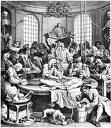

1315 In spring bad weather caused by volcanic activity in SE Asia and New Zealand leads to the Great Famine of 1315-17 (1314-22?), which kills 25% of the 30M pop. in Europe in a 400K sq. mi. area from Ireland to Italy and Russia, causing cannibalism, infanticide, disease, and crime, ending the period of growth and prosperity begun in the 11th cent.; mothers are fed their children, becoming the source of the Hansel and Gretel legend? In Apr. Walter Stewart (1296-1327), 6th high steward of Scotland marries Marjorie Carrick de Bruce (1296-1316), eldest daughter of Robert I the Bruce and 1st wife Isabella of Mar, going on to have son Robert II next year and found the House of Stewart (Stuart). *On May 9 Hugh V (b. 1282) dies without an heir, and his brother Eudes IV (1295-1350) becomes duke of Burgundy and Artois (until 1350), going on to become a patron of the arts and the Church. On May 26 after being sent by his older brother Robert I the Bruce, Edward the Bruce (1275-1318) invades Ireland, hoping to take it over for the Bruce clan, sacking Granard and Dundalk, rallying many Irish lords and quickly occupying Ulster before bogging down at the English colonial capital of Dublin; meanwhile Edward Balliol, son of King John I Balliol waits in the wings, being released from England and allowed to go to his family lands in Picardy, as murmuring begins against Robert for his favoritism in the distribution of forfeited lands, making hay of the pope's excommunication and summons of Robert to be BBQed in Rome. In July French king Louis X pub. an ordinance that Nature makes every man free, hence all slaveholders must free their slaves - but if they don't he will do what? On Aug. 29 the Battle of Montecatini in the Val di Nievole is a V for the Ghibellines of Pisa under Uguccione della Faggiuola (1250-1319) of Florence and Naples under the Angevin Philip I of Taranto (1278-1331), becoming their worst D since 1260; Philip I's eldest son Charles of Taranto and brother Count Peter Tempesta ("stormy") of Eboli (b. 1291) are KIA; Italian condottiero Uguccione della Faggiuola, the military officer controlling Florence forces the city to grant amnesty to all exiles, incl. Dante; too bad, they require that he do public penance, and he refuses, preferring exile; he later refuses new terms of house arrest, causing his death sentence to be confirmed and extended to his sons, and he never returns, preferring to wax lyrical in his "Paradisio", Ch. 17: "You shall leave everything you love most/ This is the arrow that the bow of exile shoots first/ You will know the bitter taste of others' bread, how salty, and know/ how hard a path it is for one who must use others' stairs." On Nov. 15 Swiss forces gain a great V over Duke Leopold I of Austria at the Battle of Morgarten after he tries to crush them for supporting HRE Louis IV the Bavarian against Hapsburg Frederick III the Handsome, then renew the Swiss League, getting it confirmed by Louis IV; the killer rep of the Swiss infantry is born. The city of Sardis in Asia Minor falls to the Ottomans. Sultan Alauddin of Delhi dies just as the Mongols are beginning to infiltrate the N frontiers of his Muslim domain. After the king's loan collectors piss them off with their heavy-handed tactics, the people of France successfully clamor for the return of the Jews, who had been expelled in 1306; too bad, they are expelled again in 1322. Italian immigrants in Lyons develop a silk industry. The town of Schirmeck ("protected place") in Alsace is first mentioned. The Chinese civil service exams are reinstated by the Mongols, with built-in discrimination in favor of Mongols and their non-Han supporters against the Han. Architecture: The Cordova Synagogue in Spain is built. Science: The first public human dissection is performed in Italy by Mondino de Luizzi (1258-1326), who pub. Anatomia (De Anatome), the first practical dissection manual this year, used by Euro medical schools for the next three cents. Art: Simone Martini (1284-1344), Christ's Road to Cavalry. Nonfiction: Abu al-Fida Ismail Ibn Hamwi, Concise History of Humanity (Tariah Abi al-Fida); history of the world from Creation to this year by a writer based in Mosul; continued by the author to 1329, then by Ibn al-Wardi to 1349, and by Ibn al-Shihna al-Halabi to 1403; pub. in Europe in 1754 by Reiske. Births: English count of Eu and Guines (1344-50) (constable of France) Raoul II of Brienne (d. 1350); son of Raoul I of Brienne and Jeanne de Melo. Italian sculptor Nino Pisano (d. 1368) in Pisa; son of Andrea Pisano (1290-1348). Deaths: Spanish missionary Raymond Lully (b. 1235); stoned to death in Bougie, Africa on his 3rd missionary visit to convert Muslims; leaves the Utopian novel Blanquerna; his followers (Sullists) combine a belief in alchemy with religious mysticism. French chamberlain-minister (of Philip IV) Enguerrand de Marigny (b. 1260) on Apr. 30 in Montfaucon (hanged for sorcery). French duke of Burgundy (1306-15) Hugh V (b. 1282) on May 9.
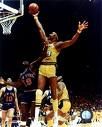
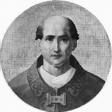

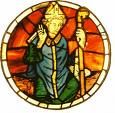




1316 On Mar. 12 Stefan Dragutin dies after becoming a monk named Teoktist, and his son Stefan Vladislav II (1280-1325) becomes king of Syrmia (until 1325), later claiming all of Serbia; meanwhile Stefan II Multin of Serbia conquers his lands around Belgrade. On Mar. 16 Cangrande della Scala officially recognizes Frederick III (did I say the Hansome?) as HRE in return for being confirmed as imperial vicar of Verona and Vicenza, pissing-off new Pope John XXII, who threatens to excommunicate him, which he ignores, going on to secure Ghibelline supremacy in W Lombardy, then launch an unsuccessful attack on Treviso in Nov. On May 1 Edward the Bruce, Earl of Carrick, with the help of native chieftains has himself crowned Edward I (1275-1318) of Ireland; too bad, Gaelic Irish clan rivalry keeps them from uniting behind him to kick the English butts' out of Ireland - it's my island, but then, I'm crazy? On May 16 John FitzThomas, Baron of Offaly is created the first Earl of Kildare for his aid to Bruce during his advance into Leinster, becoming one of the three most powerful earldoms in Ireland along with the Earl of Ormonde (James Butler) in 1328 and the Earl of Desmond (Maurice FitzGerald) in 1329. On May 31 after receiving his doctor of theology degree from the U. of Paris, Cesena, Italy-born Franciscan theologian Michael of Cesena (1270-1342) is elected minister gen. of the Naples chapter, and travels to Assisi, where he convokes a chapter to revise the order's constitutions, issuing the document Gravi qua premor on Aug. 21, advocating ecclesiastical poverty to be like Christ and his Apostles, pissing-off Pope John XXII, who pub. the bull Quorumdam exigit on Oct. 7, 1317, declaring heretical the belief that since Jesus and his disciples owned nothing, the Church should do likewise; in 1318 he orders 25 pesky poor-mouthing Franciscans tried by the Inquisition in Marseilles, and after all are found guilty of heresy, four are burnt alive by French king Philip V as incorrigible heretics, pissing-off Cesena and his supporters incl. Berengarius of Perpignan and William of Ockham, who are opposed by inquisitor John of Belna, who in a disputation in Narbonne in 1321 claims their views to be heretical; on Mar. 26, 1322 Pope John XXII pub. the bull Quia nonnunquam, distinguishing between dominion and simple use in a compromise attempt; in June 1322 a gen. chapter of the Franciscan Order is convoked in Perugia, deciding that Christ and His Apostles possessed no earthly goods; on Dec. 8, 1322 Pope John XXII pub. the bull Ad conditorem canonum, forcing the Franciscans to accept ownership of their property, reversing Pope Gregory IX, who ruled that all Franciscan property belonged to the Holy See; in 1323 Pope John XXII pronounces false the proposition that Christ and his apostles had owned no property (which was approved by Pope Nicholas III in 1279), making the Spirituals (Zealots) of the Order of St. Francis into heretics, subject to be burned by the Inquisition; in 1328 after stalling for a year, Cesena appears before the pope in Avignon, and is excommunicated, while his supporters flee to Naples but are forced by a storm to land in Pisa, and HRE Louis IV deposes the pope; on June 11, 1329 after the pope gains control of the Franciscan Order, the gen. council of the Paris chapter condemns Cesena's views, and he is deposed from his leadership position and replaced by Gerard Odon (Geraldus or Gerardus Odonis) (Guiral Ot) (1285-1349); in 1330 the pope issues the encyclical Quia vir reprobus, warning the faithful against Cesena, who accuses the pope of heresy in his letter Ad perpetuam rei memoriam innotescat quod ego, Fr. Michael on Nov. 25, 1330; on Apr. 25, 1331 the Franciscan chapter in Perpignan expels Cesena from the order and sentences him to life imprisonment, and he fights for his cause until his Nov. 29, 1342 death in Munich; he is officially rehabilitated in 1359; meaanwhile on Nov. 28, 1336 new Pope (1334-42) Benedict XII confirms Odonis' Constitutiones Benedictinae, which are abrogated by the gen. chapter in Assisi on June 1, 1343, restoring the 1260 Constitutions of Narbonne. On June 5 king (since Nov. 29, 1314) Louis X the Quarreler of France (b. 1289) dies suddenly of pleurisy caused by overindulgence in cold wine after becoming overheated playing ball, and on Nov. 15 his posth. infant son (by his 2nd wife Clemence of Hungary) Jean (John) I (b. 1316) becomes unlucky Capetian king #13, with his uncle Philip the Tall as regent, but dies after five days on Nov. 20 (oops, who left that pillow on his face?), leaving only Louis X's infant daughter (by his 1st wife Margaret of Burgundy) Jeanne, and since the Salicylic Lobby conveniently says that monarchs with PMS and no Midol yet on the market are out, a great nat. council gives the crown to Louis X's younger brother Philip V the Tall (1294-1322), who becomes Capetian king #14 (until Jan. 3, 1322), solidifying the male supremacist Salic Law excluding women from succession to the French throne; a rabid anti-Semite, Philip V makes admin. reforms and attempts to unify weights and measures to keep up with Edward I of England, but bumps up against opposition in the estates-gen; meanwhile after two years of failure to elect a new pope, he convenes a conclave of cardinals in Lyons, which on Aug. 7 elects Jacques Duese as Pope (#195) John XXII (1249-1334); when the new pope refuses to crown Louis IV the Bavarian as HRE, he starts a propaganda war, led by Marisilius of Padua (1270-1342) and William of Ockham (Occam) (1280-1347), challenging the power of the papacy and attempting to revive the prestige of the empire; Marsilius of Padua founds the Conciliar Movement (Conciliarism), which claims that a gen. council is superior to a pope, can be called by a king, and is competent to judge a pope or call a new conclave, which is given a more forceful form in 1379 by Henry of Langenstein (1325-97), gaining a large following. On June 12 after Ghibelline Uguccione della Faggiuola of Pisa, who became condottiere of Lucca, Italy in 1314 is expelled by the Lucchesi, his protege, Ghibelline Castruccio Castracani degli Antelminelli (1281-1328) is elected lord of Lucca in Tuscany, going on to build it into a rival and enemy of Florence. On Aug. 10 the Second Battle of Athenry is a devastating V for an Anglo-Irish force under Rickard de Bermingham (Rickard Mac Fheorais) (-1322), lord of Athenry and William Liath de Burgh (-1324), deputy justiciar of Ireland over the Gaels of Connacht who allied with Edward the Bruce, losing 3K-5K KIA, with 1.5K beheaded; Irish kings Fedlim O Conchoair of Connacht and Tadhg O Cellaigh of Ui Maine are KIA and their heads mounted over the town's main gate, which becomes the Athenry coat of arms. On Dec. 16 Muslim Mongol Persian khan #8 (since July 13, 1304) Oljeitu (b. 1280) dies in Soltaniyeh, leaving a magnificent tomb, and his son Abu Sa'id (Sayed) Bahador (Behauder) ("hero") (1305-35) becomes Persian Mongol Ilkhanid khan #9 (until Dec. 1, 1335), the last before the empire disintegrates. Witen dies, and his brother Gediminas (Gedymin) (1275-1341) becomes grand duke of ever-getting-mine pagan Lithuania (until Dec. 1341), building it into a Baltic-Slavic empire. Louis IV the Bavarian recognizes the independence of Switzerland from the Hapsburgs to help in his civil war with Frederick III the Handsome. After English admin. Payn de Tuberville kicks the Welsh dogs down too hard in Glamorgan, Llywelyn Bren (Llywelyn ap Gruffudd ap Rhys) (-1318), lord of Senghenydd leads a new Welsh revolt to test the fag, er, new king Edward II (ends 1318), sieging Caerphilly Castle. The county of Champagne in France (founded 956) becomes part of the royal domains; too bad, no sparkling wines until 1535. Eight Dominicans are sent to Ethiopia by Pope John XXII to check on age-old rumors of a Christian king named Prester John. Dante Alighieri accepts an offer from new Ravenna ruler (1316-22) Prince Guido II (Novello) da Polenta (-1330) to move to Ravenna, where he ends up dying and being buried in 1321. Muberak (Mubarak) Khilji (Khalji) (-1321) becomes the last Khilji ruler of Delhi (until 1320). Eight Dominicans are sent to Ethiopia by Pope John XXII to check on age-old rumors of a Christian king named Prester John. Dante Alighieri accepts an offer from new Ravenna ruler (1316-22) Prince Guido II (Novello) da Polenta (-1330) to move to Ravenna, where he ends up dying and being buried in 1321. Architecture: The Gothic Salvator Church in Duisburg is begun, later becoming the burial place of Gerardus Mercator (d. 1594). Births: Scottish Stewart king #1 (1371-90) Robert II Stewart (d. 1390) on Mar. 2 in Paisley Abbey, Renfrewshire; son of Walter Stewart (6th high steward of Scotland) (1293-1326) and Marjorie Bruce (1296-1316), eldest daughter of Robert I (1274-1329) and 1st wife Isabella of Mar (1277-96); husband (1348-) of Elizabeth Mure (Muir) (-1355), daughter of Adam of Rowallan, Ayrshire, and (1355-) Euphemia Ross (1325-87), widow of Earl John Randolph of Moray; father of Robert III (1337-1406); grows up a west-coaster, in contrast to his predecessor David II the east-coaster. Bohemian king Charles I (1347-78), king of Italy (1355-78), and HRE (1355-78) Charles (Karl) IV (d. 1378) on May 14 in Prague; eldest son of John the Blind of Luxembourg and Bohemia (1296-1346) (eldest son of HRE Henry VII) and Elisabeth I of Bohemia (1292-1330); originally named Wenceslaus (Vaclav) after her father; nephew of Charles IV of France; first Bohemian king to become HRE; fluent in Latin, Czech, German, French, and Italian; husband of Blanche of Valois, Anne of Bavaria, Anna von Schweidnitz, and Elizabeth of Pomerania; father of HRE Sigismund of Luxemburg (1368-1437), King Wenceslaus of the Romans (1361-1419), Margaret of Bohemia (Luxembourg) (1335-49), Katharine of Bohemia (1342-95), Elisabeth of Bohemia (1358-73), Anne of Bohemia (1366-94), and Margaret of Bohemia (1373-1410). Blanche (Marguerite) of Valois (d. 1348); youngest daughter of Charles of Valois (1270-1325) and 3rd wife Mahaut of Chatillon; sister of Philip VI (1293-1350); wife of HRE Charles IV. Norwegian king (1319-55) and Swedish king (1319-64) Magnus II/IV/VII Ericsson (Eriksson) (the Caresser) (d. 1374) in spring; son of Duke Erik Magnusson of Sweden and Ingeborg, daughter of Haakon V of Norway. Scottish "The Brus" poet (archdeacon of Aberdeen) John Barbour (d. 1395) (b. 1320?) in Aberdeenshire. Muslim legal scholar Muhammad ibn Arafa al-Warghami (d. 1401) in Tunis; makes urf (customary law) okay when it doesn't contradict Islamic law - is that like that kid who hacked into NORAD to play wargames? Deaths: Chinese astronomer Guo Soujing (b. 1231). Italian physician Pietro d'Abano (b. 1250) in Padua; dies before the Inquisition can try him, his friends hiding his body so well that he has to be executed in effigy. Scottish Glasgow bishop Robert Wishart (b. ?) on Nov. 26.
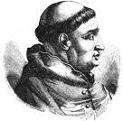

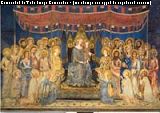
1317 Early in the year Robert I the Bruce joins his brother Edward in a winter campaign in S Ireland, in which he almost starves and his leprosy can't take the strain. On May 21 after almost beginning a siege of Guelph-held Brescia in concert with Uguccione della Faggiuola, then hearing of a plot by Padua to take Vicenza using some pissed-off exiles led by Count Vinciguerra di San Bonifacio, galloping greyhound Cangrande della Scala sneaks into Vicenza disguised as a Guelph Vincentine, talks the exiles into entering after him, then attacks them with a small force at the city gates while his partner Uguccione sandwiches them from the rear; after winning, he nurses his wounded foe Bonifacio at his palace and gives him a magnificent funeral when he dies a few weeks later; in Dec. after he accuses Padua of breaking their 1314 peace treaty, Venice (who oversaw it) declares it null and void, and Cangrande surprise-attacks the Paduan strongold of Monselica on the E slopes of the Euganean Hills and takes it on Dec. 21, then sacks and burns Este after personally plunging into the moat to lead his forces to scale the walls, causing nearby towns to surrender without a fight to save themselves; on Dec. 25 Cangrande reaches the walls of Padua, causing the great council under Jacopo da Carrara to fold and cede Monselice, Este, Castelbaldo, and Montagnana to Cangrande for life, with all citizens exiled from Padua to be restored, signing a treaty next Feb. 12, after which Cangrande makes friends with the da Carrara family, betrothing his 12-y.-o. nephew Mastino II to Jacopo's infant daughter Taddea next year. Matteo I Visconti gets his son Giovanni Visconti (1290-1354), elected archbishop of Milan, but Pope John XXII refuses to confirm him, putting Aircardus of Comodeia (-1339) in the job; never count a Visconti out? The Battle of Donibristle sees Bishop William Sinclair (William de Sancto Claro) (-1337) of Dunkeld rally the Scots to defeat an invading English force in Fife. Pope John XXII bans alchemy, and provides for the forfeiture of any gold and silver created through its practice - just in case? Architecture: The Cloth Workers' Hall in Louvain, Belgium is built for the 15K weavers that work in the region until 1382. Art: Simone Martini (1284-1344), St. Martin Renouncing the Sword; The Maesta (Maestà); The Annunciation and the Two Saints (1317-47) (with Lippo Memmi). Macedonian painters Michael and Eutychios paint fresco icons dedicated to the patron saint of the church, St. George, and to the Mother of God Pelagonitisa on the surfaces created in the iconostasis after the walling up of the intercolumnar spaces. Births: English knight Sir Michael de Poynings, 2nd Baron Poynings (d. 1369) in Bures St. Mary, Suffolk. Bulgarian Orthodox Hesychast patriarch of Turnovo (1371-93) Euthymius of Turnovo (d. 1402) (1325-1404?) in Tarnovo; disciple of Theodosius of Turnovo. Deaths: French chronicler Jean de Joinville (b. 1224) on Dec. 24 - one old fart? Thai (Sukhothai) King Ramkhamhaeng the Great (b. 1239). Chinese-born Nestorian patriarch (1281-1317) Yaballaha III (b. 1245). French House of Bourbon founder Count Robert of Clermont (b. 1256) on Feb. 7. Japanese Yamato emperor #92 (1287-98) Fushimi (b. 1265) on Oct. 8. Scottish breed mare Marjorie Bruce Stewart (b. ?); dies after falling from a horse.
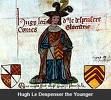
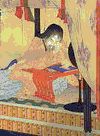

1318 On Mar. 29 after overthrowing the Kamakura shogunate in 1333 and establishing the short-lived Kenmu Restoration, Godaigo (Go-Daigo) (1288-1339) becomes Japanese Yamato emperor #96 (until Sept. 18, 1339), becoming the last emperor with power until the 1868 Meiji Restoration. In Apr. the Scots under Robert I retake the port stronghold of Berwick-upon-Tweed (held since 1296) (until 1333), and in Oct. his brother Edward the Bruce (b. 1275) brucely leaves his stronghold in Ulster without him, and on Oct. 14 is KIA at the Battle of Fochart (Faughart) (in the fog?) near Dundalk by Sir John de Bermingham, his body quartered and sent to various towns in Ireland, and his heart sent to Edward II, leaving Robert I with only three illegitimate sons, one illegitimate daughter, and 2-y.-o. grandson Robert Stewart (b. 1316), son of his daughter Marjorie and Walter the Steward, causing the Scottish parliament in Nov. to pass a decree that if he dies without a son his grandson will be crowned, and attempt to hush the murmurs by passing laws correcting some of the land settlement gripes and outlawing murmuring against the king; meanwhile hand-rubbing Edward Balliol comes to the English court after receiving news of Dundalk, and begins the Soules Plot to kill Robert I using pro-Balliol Scottish insiders and place himself on the Scottish throne (ends 1320). In Apr. a group of Franciscans led by Odoric of Pordenone (Odorico Mattiussi or Mattiuzzi) (1286-1331) incl. James of Ireland leave Padua, Italy on a mission to the East (ends 1330), taking them to Venice, Constantinople, Trebizond, Armenia, Media, Persia incl. Kashan, Yazd, Persepolis, and Shiraz, India (Thane near Mumbai), Sumatra, Java, Borneo, Champa, Guangzhou, Quanzhou, Zhejiang, Hangzhou, Nanjing, and Khanbaliq (modern-day Beijing) in 1324-7, returning via the Land of Prester John (Mongolia), Casan, Tibet, N Persia (incl. Tabriz) to Venice; in 1328 Odoric becomes the first Euro to visit Tibet - the original Pordenone's Complaint? On July 13 Persian Ilkhanid minister (since 1298) (a Jew who converted to Islam) Rashid al-Din Hamadini (b. 1247) is beheaded after his rival Amir Chupan (Choban) (-1327) gets him framed on trying to poison Oljeitu Khan, and takes his job as grand vizier. In the fall Cangrande della Scala attacks Treviso with the help of some disaffected nobles, causing the citizens to appeal to Frederick III the You Know What, who orders him to stop in return for accepting his imperial authority and allowing him to appoint an imperial vicar; despite getting backing by the Viscontis, who give him the title of "captain-rector of the imperial party of Lombardy", Freddy appoints Henry III of Gorizia (1263-1323) (at the foot of the Alps in NE Italy bordering Slovenia) next June, causing Cangrande to give up and turn on his former ally Jacopo da Carra in order to get his hands on Padua, picking a fight with him. A new faction of barons in England deposes Thomas of Lancaster; Hugh le Despenser the Younger (1286-1326), with whom bi-curious Edward II likes to have gay times becomes royal chamberlain, and begins to gain love magic control over him, aided by his bi daddy Hugh le Despenser the Elder, 1st Earl of Winchester (1261-1326), who had been a high advisor ever since the execution of Piers Gaveston in 1312, to which he had been the only objector. Roger Mortimer, 1st earl of March sieges Bristol, after which Llywelyn Bren rides out alone in his armor to surrender on condition that his rebels be spared; he is taken to the Tower of London and given to Mortimer's rival Hugh the Despenser Jr., who then takes him to Cardiff Castle and has him hanged, drawn and quartered - and some people claim that there's a woman to blame, and I know it's my own damn fault? Swiffer gives cleaning a whole new meaning? Inquisitor Jacques Fournier (1285-1342), bishop of Pamiers (future Pope Benedict XII) has fun with the remaining Cathars (Albigensians) in the village of Montaillou in the Pyrenees of S France, arresting the entire village of 250 after conducting lengthy interviews with dozens of them. After Pope John XXII declares heretical the belief that since Jesus and his disciples owned nothing, the Church should do likewise, he orders 25 pesky poor-mouthing Franciscans tried by the Inquisition at Marseilles, and after all are found guilty of heresy, four are burnt alive by French king Philip V as incorrigible heretics. Jeanne (Joan) III of Burgundy (1308-47), eldest daughter of Philip V the Tall of France and Joan II of Burgundy marries Duke Eudes (Odo) IV of Burgundy in exchange for relinquishing the right of her cousin (Eudes' niece) Joan II of Navarre (daughter of Louis XI and Margaret of Burgundy) to inherit the French throne. The Bardi of Florence begin accepting insurance risks on overland assignments of cloth. Architecture: The Cathedral of St. Andrew (St. Andrews Cathedrao) in St. Andrews, Fife, Scotland (begun 1158) is consecrated; too bad, it is sacked during the Protestant Reformation (1559). Births: Uzbekistani Sufi Naqshbandi Order founder Baha-ud-Din Naqshband Bukhari (d. 1389) in Qasir-i-Hinduvan (near Bukhara). Deaths: German architect Erwin von Steinach (b. 1244) on Jan. 17 in Strasbourg, France. Persian minister (Jewish convert to Islam) Rashid al-Din Hamadani (b. 1247) on July 13 in Soltaniyeh (beheaded); leaves the huge History of the Persian Ilkhanid Dynasty, which is handed to Muslim soldiers, after which only two fragments survive to modern times, one being auctioned by Sotheby's in 1980 for £850K, a record for an Arabic ms.; he invented fingerprinting? German minstrel-poet (mastersinger) Heinrich Frauenlob von Meissen (b. 1250) on Nov. 29 - sounds good enough to drink? French archbishop-diplomat Gilles I Aycelin de Montaigu (b. 1252) on June 23 in Rouen. Irish king (1315-18) Edward the Bruce (b. 1275) on Oct. 14 near Dundalk (KIA). English queen (1299-1307) Marguerite of France (b. 1279) on Feb. 14 in Marlborough Castle, Wiltshire.
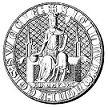
1319 On May 8 king (since 1299) Haakon V of Norway (b. 1270) dies, and on July 8 his 3-y.-o. grandson (via his daughter Ingeburga and her husband Eric, son of Magnus I of Sweden) Magnus (Smek) Ericsson (Eriksson) (1316-74) becomes king Magnus VII of Norway (until 1355) and king Magnus II/IV of Sweden (until 1364), with his mother Ingeburga as regent, and is such a momma's boy, taking a long time to rule on his own, then relying on unworthy favorites, that he causes the royal power to be weakened and the aristocratic party to fill the gap? In Aug. Cangrande della Scala invades Paduan territory and sieges Padua while sending troops to attack surrounding towns, then negotiates with Henry III of Gorizia to take it over as imperial vicar, after which Padua submits to him on Nov. 4. On Sept. 20 after the Scots under Sir James "Black" Douglas invade Yorkshire, England, reduce the town and monastery of Ripon to ashes, they an army raised by the archbishop of York and the bishop of Ely in the Chapter (Battle) of Myton (AKA the White Battle) in Myton-on-Swale, Yorkshire; Douglas goes on to continue raiding N England and laying it waste until 1327. Charles I of Hungary regains control of Belgrade from Stefan II Milutin of Serbia. Rinchan Shah briefly establishes Muslim rule in Kashmir. Granada defeats a Castilian invasion. Parts of India and Japan issue paper money (until 1331). Nonfiction: Jean de Muris (1290-1351), Ars Novae Musicae; coins the term "Ars Nova" and promotes it over Ars Antiqua; claims that a 3-fold division of time is perfect. Births: French Valois king #2 (1350-64) John (Jean) II (the Good Fellow) (d. 1364) on Apr. 16; son of Philip VI (1293-1350) and Jeanne the Lame of Burgundy (1293-1348); husband of (1332-) Bona (Bonne) of Bohemia (Luxemburg) (1315-49) (daughter of John I the Blind of Bohemia) and (1349-) Jeanne I of Auvergne (1326-60); father of Charles V (1338-80) by Bona of Bohemia. French duke of Brittany (1341-64) Charles of Blois (d. 1364) in Blois; son of Guy I of Blois-Chatillon (-1342) and Margaret of Valois (sister of Philip VI); husband (1337-) of Joanna of Dreux (1319-84). Deaths: Italian condottiero Uguccione della Faggiuola (b. 1250) on Nov. 1 in Padua. Italian painter Duccio di Buoninsegna (b. 1255).
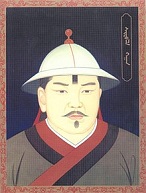





1320 On Mar. 1 emperor #4 (since Apr. 7, 1311) Buyantu Khan (Yuan Ren Zong) (b. 1285) dies, and on Apr. 19 his eldest son Shidebala becomes Geegan ("enlighttened") Khan (Yuan Ying Zong) (1302-23), Mongol Yuan emperor #5 of China (until Sept. 4, 1323). In Mar. after Paduan lord (since 1318) Jacopo da Carrara resigns in favor of Henry III of Gorizia instead of him, pissed-off Ghibelline condottiero Cangrande (It. "big dog") (Can Francesco) I della Scala (1291-1329) (patron of Dante) begins attacking Henry III's castles in the Treviso area, then in June attacks Padua with the help of Paduan exiles, causing Henry II to attack him on Aug. 2 in Bassanello with fresh troops and overwhelm him, causing him to flee to his stronghold in Monselice with an arrow sticking in his thigh, then agree to give up on Padua. In Apr. the Declaration of Arbroath AKA the Scottish Declaration of Independence is drawn up for Robert I by chancellor Bernard of Kilwinning (-1331), abbot of Aberbrothick to urge Pope John XXII to give up the excommunication thingie and accept Scottish independence, along with "our most valiant prince, king and lord, the lord Robert", Scottish champion against England; "For as long as one hundred of us shall remain alive we shall never in any wise consent to submit to the rule of the English, for it is not for glory we fight... but for freedom alone"; strongly influenced by the Templars, the declaration claims descent from the Lost Tribes of Israel, and rids Scotland of serfdom; 25 (almost all of the) lords and bishops of Scotland, incl. the Sinclairs of Rosslyn are signatories; after advancing the clincher that it's the English not the Scots who are failing to on Crusade, in Aug. the pope goes for it and lifts the excommunication; too bad, Edward II sends his own emissaries to the pope, getting him to flop back and forth. On May 5 the Peace (Treaty) of Paris between Count Robert III of Flanders and Philip V of France is signed by Count Robert of Bethune, ending a war begun during the brief reign of John I; Philip V of France acquires some Flemish territory. In May a French shepherd boy in Normandy has a revelation or vision, beginning the Shepherds' Crusade; 30K Christian shepherds set out to attack the Muslim Moors in Spain, change their minds when they see they can fight back, do what comes natural, and begin ravaging defenseless Jewish communities in S France and N Spain incl. Saintes, Verdun-sur-Garonne, Cahors, Albi, Toulouse, and Montclus before they are finally dissolved? On July 20 Oshin I (b. 1282) dies (poisoned?), and his 11-y.-o. son Levon (Leon) (Leo) IV (1309-41) becomes king of Lesser Armenia (Cilicia) (until 1341). On Aug. 4 the Black Parliament of Scotland tries the principals in the Soules Conspiracy to kill Robert I and place Edward Balliol on the Scottish throne to prevent English rule, convicting William II Soules (Soulis), Lord of Liddesdale (-1321) (Butler of Scotland), Sir Ingram d'Umfraville, and other ex-Balliol supporters, then having them "hangit and heidit", imprisoned or exiled; Sir Robert Bruce (-1332), illegitimate son of Robert I is created Lord of Liddesdale; Soules dies next Apr. 20 under mysterious circumstances in Dumbarton Castle. Cracow prince (since 1305) Wladyslaw (Vladislav) (Ladislaus) I Lokietek (the Short) (the Elbow-High) (1261-1333) regains control of Poland, and crowns himself king of Poland (until 1333); the feudal disintegration of Poland ends. Eric VI, Denmark's last strong king in a while dies, and his brother Christopher II (1276-1332) is elected king of Denmark (until 1326, then 1329-32) after the first-ever capitulation in Danish history, accepting limits on royal power in favor of the nobles and clergy; meanwhile the German Hansa towns of the Hanseatic League have acquired a monopoly of Danish trade and begin to dominate Danish politics. Pakistani Sufi Sultan Mubarak Khilji of Delhi dies. The city of Bialystok (Belostok) ("white slope") on the Bialy River (100 mi. NE of Warsaw) in NE Poland (modern-day pop. 297K/430K) is founded by Lithuanian Count Gedimin, becoming the largest city in NE Poland. Lyublyana in Slovenia receives civic rights. The ancient Gaulic capital of Lyon(s), France receives a municipal charter along with a coat of arms. The U. of Dublin in Ireland is founded in connection with St. Patrick's Cathedral, but never receives an endowment, and limps along until Henry VIII shuts it down, after which it is reestablished in 1592. Art: Anon., Sir Lancelot of the Lake; a set of paintings in the great hall of the ducal tower of Siedlecin, Poland. Giotto (1267-1337), St. John the Evangelist. Simone Martini (1284-1344), Virgin and Child (Church of Santa Caterina, Pisa). Births: Portuguese king #8 (1357-67) Pedro (Peter) I (the Just) (the Cruel) (d. 1367) on Apr. 8 in Coimbra; 3rd and only surviving son of Afonso IV (1291-1357) and Beatrice of Castile (1293-1359); husband (1346-) of Ines de Castro (1325-55). Spanish Jewish leader Samuel ben Meir Abulafia (d. 1361). Serbian king (1365-71) Vukasin Mrnjavcevic (d. 1371) in Livno, Bosnia. Danish king (1340-75) Valdemar (Waldemar) IV Atterdag (Adderdag) (d. 1375); youngest son of Christopher II (1276-1332). Italian ruler of Milan (1327-78) (patron of Plutarch) Galeazzo II Visconti (d. 1378); son of Stefano Visconti (-1327) (brother of Matteo I Visconti) and Valentina Doria; brother of Matteo II Visconti (1319-55), Bernabo Visconti (1319-85), and Galeazzo II Visconti (1320-78); father of Gian Galeazzo Visconti (1351-1402); creator of the 40-day on-again-off-again quaresima wheel torture. French constable ("the Eagle of Brittany") Bertrand du Guesclin (d. 1380) near Dinan, Brittany. French philosopher (bishop of Lisieux) Nicole (Nicolas) Oresme (d'Oresme) (d. 1382) in Allegmane (Fleury-sur-Orne) near Caen, Normandy. Persian #1 lyric poet ("the Shakespeare of Persia") Shams-ud-Din Mohammed Hafiz (Hafez) (Arab. "person who memorizes the Koran") (d. 1389). English bishop of Winchester and chancellor of England William of Wykeham (d. 1404) (b. 1324?). Deaths: Turkish poet Yunus Emre (b. 1238) in Anatolia. Italian sculptor Giovanni Pisano (b. 1245). French surgeon-anatomist (Montepellier U.) Henri de Mondeville (b. 1260). Byzantine emperor (1294-1320) Michael IX Palaeologus (b. 1277) on Oct. 12 in Thessalonica; dies in grief after his son Andonicus III accidentally kills his brother Manuel. Chinese Yuan emperor (1285-1320) Ren Zong (b. 1285) on Mar. 1.




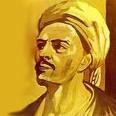

1321 On Oct. 29 Stefan Uros II Milutin (b. 1253) dies, and his son (maternal grandson of George I of Bulgaria, who as a youth had been sent as a hostage to Nogai Khan of the Golden Horde, then on his return made gov. of Zeta or Montenegro) Stefan Uros III Decanski (1285-1331) becomes king of Serbia (until Sept. 8, 1331). The original Pez dispensers? The Despenser War (ends 1322) begins when the Dispensers Hugh Despenser the Younger (1286-1326) and his father hugh Despenser the Elder, 1st Earl of Winchester (1261-1326) try to grab the Gower Peninsula, causing the marcher lords of Wales to form a confederation against them and ravage their lands, causing Parliament, at the behind, er, official behest of the Duke of Gloucester to demand their exile, which the king assents to only after Queen Isabelle finally goes down on her knees, er, dramatically begs her hubby Edward II to banish them from the kingdom, after which the elder flees to Bordeaux and the younger becomes a pirate on the English channel (until 1322); the first use of a Bill of Attainder in England is against the Despensers for supporting Edward II in his war with the queens and barons. King Philip V the Tall of France admits that the Jews are innocent of encouraging lepers to poison Christian wells, but only after 5K Jews have been murdered; Jews are required to wear yellow badges and forced to pay heavy fines for killing the Son of God and rejecting him as their Savior, thus insuring eternal Hellfire anyway? The Muslim Tughlak (Tughluk) Dynasty in N India is founded by Turkish shah Ghiyas ud-din (Ghiyath al-Din) Tughlak (Tughluk) (-1325), who defeats the Khaljis and ends the Khalji Dynasty (begun 1288), then as Gharzi Khan moves 4 mi. E from Delhi to his new capital of Tughlakabad (Tughlaqabad). Saarbrucken in W Germany receives a charter. Monte Cassino becomes a bishopric. The U. of Florence (originally the Studium Generale) in Italy is founded by the Repub. of Florence; in 1349 Pope Clement VI recognizes it, and it becomes the first Italian faculty of theology, becoming an imperial univ. in 1364; in 1473-1515 it moves to Pisa; the modern univ. is founded in 1859, and recognized by the Italian parliament in 1923. Architecture: The Gothic Palencia Cathedral (originally the Visigothic Crypt of San Antolin in 1172) is begun in Palencia, Spain (30 mi. NNE of Valladolid) (finished 1504). Nonfiction: Levi ben Gerson (1288-1344), Book of Numbers. Poetry: Dante Alighieri (1265-1321), The Divine Comedy (La Divina Commedia); "Turn, Beatrice, turn thy saintly sight on thy faithful one"; he stole the idea from Muhammad's Night Journey and Ascension to Heaven (Isra and Miraj)? - just in time for p lague victims to read about hell? Births: Scottish queen consort (1329-62) Joan(na) of the Tower (d. 1362) on July 5 in the Tower of London; youngest daughter of English king Edward II (1284-1327) and Isabella of France (1295-1358); first wife (1328-62) of David II (1324-71). Spanish Muslim scholar Ibn Juzayy (d. 1357). Deaths: Serbian king (1282-1321) Stefan Uros II Milutin (b. 1253) on Oct. 29. French writer Pierre Dubois (b. 1255). Italian lit. giant Dante Alighieri (b. 1265) on Sept. 14 in Ravenna (malaria?); buried in the Church of San Pier Maggiore (San Francesco), with the inscription "Florence, mother of little love" (written by his friend Bernardo Canaccio), after which Florence flip-flops and tries to get his body returned but is told to fork off, finally building an empty tomb for him in 1829 in the basilica of Santa Croce Church; leaves De Vulgari Eloquentia (Eloquio), the first postclassical treatise on poetic criticism (unfinished); his "Divine Comedy" is also apparently missing some parts, but his sons Jacopo and Pietro dream they see his ghost, who leads them to a hiding place in the wall where they find them, with a lawyer friend of Dante's as a witness?; in the 17th cent. his bones are hidden by monks to keep Florentine authorities from getting their hands on them, and in the 1920s measurements are taken of his skull; his face is portrayed as stern and frowning, with a hooked nose and prominent lower lip until 2007, when Pisa U. prof. Francesco Mallegni reconstructs his head and shows large eyes, rounded jaw, and gentler expression, although he still has a crooked nose, and is still "someone who would call a spade a spade". Swedish king (1290-1321) Birger (Berger) Magnusson (b. 1280) on May 31 in Denmark.




1322 A great cattle plague called the Mael Domnaig strikes Ireland (ends 1325). On Jan. 2 king (since Nov. 20, 1316) Philip V the Tall (b. 1294) dies, leaving a large number of royal ordinances but (poetic justice considering how he got the throne?) no male heir (only daughters Jeanne, founder of the House of Burgundy, and Margaret, founder of the House of Flanders), and his younger brother Charles IV the Fair (1293-1328) becomes the 15th and last king of the French Capetian Dynasty (begun 987), cutting off Edward III of England (grandson of Philip IV through his daughter Isabelle) (no fair?), which finalizes the no-cu, er, no-female-inheritance principle of the Salic Law as recursive; he kicks his reign off right by expelling the pesky money-grubbing Jews from France, who had been expelled in 1306 by Philip IV then allowed to return in 1315; meanwhile the French crown controls the papacy, and the rulers of the Capetian house of Anjou are still seated on the thrones of Naples, Provence, and Hungary; only Brittany, Flanders, Guienne, and Burgundy remain outside French royal control - what's left is a world where old friends suddenly become enemies? The original Army of the Twelve Monkeys? Early in the year Edward II of England recalls his indispensable Pez dispensers Hugh le Despenser Younger and Elder, renewing the Despenser War, now backed by English barons, led by the king's nephew Thomas Plantagenet, 2nd Earl of Lancaster (b. 1277) (eldest son of Edward I's brother Edmund Crouchback) (who had despised Piers Gaveston for calling him "the Fiddler", and was instrumental in getting him executed) at Pontefract, causing the king to take his army N to pursue Lancaster before he can hook up with the Scots; meanwhile in Jan. the 1319 truce with the Scots expires, and they see their chance and invade NE England, with Walter Stewart heading to Richmond, Thomas Randolph, 1st earl of Moray to Darlington, and Sir James "Black" Douglas to Hartlepool; on Mar. 11 Sir Roger d'Amory (b. 1290), an English veteran of the 1314 Battle of Bannockburn (who had been Edward II's favorite until displaced in 1318 by Hugh le Despenser the Younger, making him a bitter enemy of the Despensers) is captured by the king's forces at Tutbury Castle in Staffordshire after capturing Gloucester and burning Bridgenorth, and dies of illness on or before Mar. 14 before they can execute him; on Mar. 16 after the rebels find their path blocked by the forces of Sir Andrew Harclay (Hartley) (1270-1323), the Battle of Boroughbridge on the Ure River 20 mi. NW of York is a V for the king and the Despensers using the novel idea of mounted archers, and his key boy hunk Humphrey VIII de Bohun, 4th Earl of Hereford (b. 1276) KIA by a pike up his anus as he stands on the bridge, his screams causing his men to panic and run; on Mar. 22 after a kangaroo trial Thomas of Lancaster is beheaded at Pontefract Castle (20 mi. SW of York), after which Edward II reclaims his throne and makes Hugh Elder his counselor as well as earl of Winchester, and creates Harclay the earl of Carlisle; Lancaster's army is outlawed, while Lancaster is revered as a martyr and saint, becoming a possible source of the Robin Hood legend?; the laws passed in England during 1311 are repealed at the Parliament of York (containing burgesses and knights, as in 1311) on the basis that they were passed only by the nobles; the Despensers now dominate the king from both ends, beginning the Despenser Tyranny (ends 1326), where they run roughshod over the kingdom and grow rich, esp. at the expense of rich widows, while the younger Despenser becomes the de facto ruler of England, all of which is too much, and turns Isabelle against Edward completely (plus the fact that the younger Despenser raped her)?; meanwhile, although the Scots have returned to Scotland, the king takes their advice and invades Scotland, finding William the Wallace tactics in force, incl. destruction of all foodstuffs, compounded by plague, causing the Earl of Surrey, after one lame cow is finally scrounged up by the starving troops to issue the soundbyte "This is the dearest beef I ever saw; surely it costs a thousand pounds and more"; after destrying Holyrood Abbey near Edinburgh and then starting to return to English, with the Scots in pursuit, on Oct. 14 the "hare before greyhounds" Battle of Old Byland (Byland Moor) (Byland Abbey) in Yorkshire is a deja vu of the 1314 Battle of Bannockburn, with a giant Scot V, during which Queen Isabelle is abandoned by her hubby at Rievaulx Abbey along with his personal belongings, leaving her to escape on her own by a whisker, pissing her off at him more; the Scots now can raid the English borders at will - oh what a man that Wallace was, I wish I could've had a piece of him and been his woo-mun? On Sept. 28 German king and HRE (since Oct. 20, 1314) Louis IV of Bavaria (1282-1347), aided by King John of Bohemia and Frederick IV of Hohenzollern wins a decisive V at the Battle of Muhldorf (Mühldorf) (Ampfing) near Muhldorf am Inn on the Ampfing Heath; Frederick III the Handsome is captured along with 1.3K nobles from Austria and Salzburg, ending the 8-year civil war, and Bavaria beats Austria for the HRE crown; Handsome Fred is held in Trausnitz Castle for three years (until 1325) - AEIO oww? The Franciscans of Perugia in Italy revolt against Pope John XXII, and Franciscan friar William of Ockham takes a prominent part, getting imprisoned for 4 mo. then moving for protection to Munich, where he becomes a defender of Louis IV of Bavaria in his fight with the French popes; the pope condemns the doctrine of the apostolic poverty of the Church as a heresy, and sets the Inquisition on the Fraticelli, causing the Franciscan Order to begin a decline. Lithuanian grand duke Gediminas writes Pope John XXII asking for protection from the Teutonic and Livonian Knights, pointing out the privileges he has granted to the Dominicans and Franciscans to preach, and requesting legates to be sent to accept his conversion. Shamsuddin Firuz dies, and Bengal splits into two parts (E and W). The Persian Mongols under Abu Sai'd and his grand vizier Chupan sign the Treaty of Aleppo with the Mamluks, ending their invasions of Syria (begun 1260), and the Crusaders are out of luck about a Franco-Mongol alliance against them. After leaving Clonmel, Ireland on a pilgrimage to Jerusalem, Irish Franciscan monk Symon Semeonis (Simon FitzSimmons or FitzSimon and his companion friar Hugo the Illuminator encounter a group of Romany (Romani) (Roma) (Gypsy) from NW Ondia in Heraklion, Crete, calling themi "the descendants of Cain", becoming the first known encounter; he goes on to write Itinerarium Symonis Semeonis ab Hybernia ad Terram Sanctam (The Journey of Symon Semeonis of Ireland to the Holy Land). English knight John de Mandeville (-1372) (born in St. Albans) begins a journey to Egypt, the Holy Land, India, and China, serving 15 mo. in the army of the Mongolian great khan before returning in 1356. Gian Galeazzo Visconti closes the U. of Parma; after being created a univ. in 1412 by Niccolo III d'Este in 1412, it opens and closes several times during the next cent. Music: Pope John XXII pointedly counters Marchettus of Padua and bans the use of counterpoint in church music. Deaths: Dutch count of Flanders (1305-22) Robert II (b. 1249) on Sept. 17 in Ypres. Chinese painter Chao Meng-fu (b. 1254). French count of Nevers Louis I (b. 1272) on July 22 in Paris. English king-wannabe Earl Thomas of Lancaster (b. 1277) on Mar. 22 in Pontefract, Yorkshire (beheaded).


1323 On Mar. 3 after signing a peace treaty with Robert I the Bruce of Scotland without royal sanction, Sir Andrew Harclay (Hartley), Earl of Carlisle (b. 1270), who had been a big hero to Edward II last year, but found it impossible to stop the Scot raiding and had met with Robert I of Scotland to propose peace terms on his own is hanged, drawn, and quartered for treason by order of Edward II; that out of the way, Edward II of England his own truce with Robert I of Scotland, which only lasts four years, but causes the Despenser stock to go down with the public; Pope John XXII recognizes Robert I as king of Scotland. On Sept. 4 after instituting anti-corruption reforms and siding with the Tibetan Buddhists against Muslims, emperor (since 1320) Shidebala (Yuan Ying Zong) is assassinated, becoming the first Mongol ruler to be assassinated, and on Oct. 4 is succeeded by Yesun Temur, who becomes Yuan Tai Ding Di (1293-1328), Mongol Yuan emperor #6 of China (until Aug. 15, 1328). In Sept. king (since 1311) Saw O (b. 1283) dies, and Saw Zein (1303-30) becomes Hanthawaddy king #4 of Burma (until Apr. 1330), moving the capital N from Martaban (Mottama) to Pegu (Bago). On Oct. 16 count (since 1285) Amadeus V the Great (b. 1249) dies, and his eldest son Edward the Liberal (1284-1329) becomes count of Savoy (until 1329). In Oct. Lithuanian grand duke (1316-41) Gediminas (Gedymin) (1275-1341) is officially accepted into the Roman Catholic Church, and a compact is signed in Vilnius confirming it; too bad, the Teutonic Knights don't want Lithuania Christianized just yet, as they have their own designs, and after some shenanigans Gediminas is denounced by a synod of Prussian bishops in Elbing, causing him to refuse to see papal legates in Riga in Sept., keeping him from actually being baptized, and allowing him to play to the still large pagan constituency; the legates believe his assurances that he's really sincere, and forbid neighboring states to make war against him for the next four years; Gediminas moves the Lithuanian capital from Trakai to Vilna (Vilno) (Vilnyus) (Vilnius) on the Vilnia and Neris Rivers in SE Lithuania (modern-day pop. 545K/805K), where he builds Gedymin Castle; going on to house a large Jewish pop., causing it to be known as "the Jerusalem of Lithuania", and "the Jerusalem of the North" (Napoleon, 1812). Louis IV the Bavarian sends an army to protect Milan against the kingdom of Naples, Pope John XXII's strongest ally after France; meanwhile Pope John XXII excommunicates pesky Giovanni Visconti, who turns to antipope Nicholas V, who makes him a cardinal; he also pronounces false the proposition that Christ and his apostles had owned no property (which was approved by Pope Nicholas III in 1279), making the Spirituals (Zealots) of the Order of St. Francis into heretics, after which they are burned by the Inquisition. The Mamluks sign a peace treaty with the Ilkhanids (1328?). Louis IV the Bavarian gives the march of Brandenburg in NE Germany to his eldest son Louis V, and it begins to be ruled by princes of the Bavarian House of Wittelsbach (until 1373). Holland takes control of Zeeland in SW Netherlands. After the Battle of Skradin, Roman Catholic Stephen (Stepan) (Stjepan) II Kotromanic (-1353), AKA "the Devil's Student" becomes Hungarian ban (herzog) of Bosnia (until 1353); in 1326 his brother Prince Vladislav Kotromanic (-1354) becomes co-ban (until 1354), and they go on to work together to make Bosnia an independent state. John Darcy, 1st Baron Darcy de Knayth (1290-1347) is appointed lord justice of Norman Ireland (until 1344), making it a condition of his reappointment that there should be one and the same law (una et eadem lex) for the Irish and Anglo-Irish, except the betaghs (serfs), after which in 1331 it is codified in an ordinance, which the native Gaels ignore in favor of their brehon law. Pope John XXII canonizes Thomas Aquinas (1225-74) 49 years after his death; it takes until 1567 to make him a doctor of the Church - it's a dirty story of a dirty man, and his clinging wife doesn't understand? Giovanni Boccaccio (b. 1313) is sent by his father to Naples to study accounting, but is bored and switches to canon law, classical, and scientific studies, then begins partying in the court of Robert d'Anjou, whose illegitimate daughter Maria de Conti d'Aquino becomes his mistress and is immortalized in his writings as his "Fiammetta". The Consistori del Gay Saber (Academy of the Gay Science) lit. academy is founded in Toulouse, France, sponsoring poetry competitions among troubadours. Architecture: Oroshek (Orekhov) Fortress on Orokhovets (Swedish "nuts") Island is built by Novgorod Prince Yuri to guard the N approaches to Novgorod incl. access to the Baltic Sea; in 1702 it is renamed Shlisselburg (Schlusselburg) (Ger. "key fortress"). Births: Burmese Hanthawaddy king #8 (1348-83) Binnya U (d. 1384) on Jan. 2 in Pegu. Deaths: Savoy count (1285-1323) Amadeus V the Great (b. 1249) on Oct. 16 in Avignon. Burmese king (1311-23) Saw O (b. ?) in Sept. in Thadingyut.

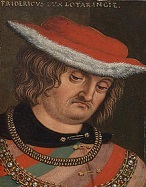





1324 Wallachia acknowledges Hungary as its overlord, but soon goes into revolt (ends 1330). English Franciscan friar William of Ockham (Occam) (1280-1347) (student of Duns Scotus) defines his Nominalist (anti-Realist) (Terminalist) philosophy at Pope John XXII's court in Avignon, incl. the cool Occam's (Ockham's) Razor (principle of economy of thought), toppling the dunce Schoolmen by separating logic from metaphysics with the claim that logic has nothing to do with ultimate truth, backing an experimental approach to science and even suggesting the law of inertia; after a catfight with Thomists in the 1320s, Ockham's school dominates European thought until the Protestant Reformation of the 1500s; meanwhile they don't buy it, and Pope John XXII excommunicates Ockham's friend HRE Louis IV the Bavarian. Sunni Muslim Mali king (mansa) #10 (1312-37)Musa Keita I (1280-1337) begins a pilgrimage to Mecca (ends 1326); his imperial household consists of 60K men incl. 12K slaves who each carry 4 lbs. of gold bars, and heralds dressed in silks bearing gold staffs, along with 80 camels carrying 50-300 lb. of gold dust each; in July he visits Egyptian maluk sultan AlNasir Muhammad; his total wealth is $400B, making him the richest human in history; his caravan is so opulently equipped with gold that it wows the world and causes the market for gold to plummet for a decade despite his attempt to borrow it back at high interest; he builds a mosque every Fri.; on his return journey he makes the rich city of Timbuktu (Tombouctou) ("Africa's city of gold") on the Niger River (pop. 100K) ("where camel meets canoe") part of his empire, hiring architects from Andalusia to build a grand palace along with the Djinguereber Mosque (1327). Catalonia occupies Sardinia. Cannons are used by the forces of Abu al-Walid Ismail ibn Nasr of Granda at the Siege of Huescar. Japanese emperor (since 1318) Godaigo (b. 1288) unsuccessfully tries to regain power from dissolute regent Tatatoki Hojo of the Kamakura shogunate. Sancho I (b. 1274) dies without an heir, and his nephew James III (the Rash) (the Unfortunate) (1315-49) (prince of Achaea since 1315) becomes the last independent king of Majorca (until 1344), but rashly refuses an oath of fealty to his cousin Peter IV of Aragon, who drives him out and annexes the Balearic Islands. After Charles IV builds a fortress illegally on Edward II's territory in Aquitaine, and the Despensers imprison Charles IV's sister Isabella of France, a French expedition is sent to Aquitaine. After the bourgeoisie of Metz, France incur a mountain of debts, the War of Metz (Four Lords' War) (ends 1326) sees Duke (since 1312) Frederick IV "the Fighter" of Lorraine (1282-1329) (nephew of Count Charles III of Valois), Bohemian king (since 1310) John (Jean) (the Blind) of Luxembourg (1296-1346), and archbishop-elector of Burgundy (since 1307) Baldwin of Luxembourg (1285-1354) organize a coalition to capture the city and make them pay; they're all of Merovingian blood? Oriel (King's) College at Oxford U. is founded by English king (1307-27) Edward II (1284-1327) as the College of the Blessed Mary, becoming the oldest royal foundation in Oxford; in 1329 a bldg. called La Oriole is presented to the college, causing the eventual name change by 1349 - smart choice for Edward II to found Oral College? Nonfiction: Marsilius of Padua (1270-1342), Defensor Pacis (Defender of Peace); first work of political theory to advance the idea of popular sovereignty and the conciliar movement, royally pissing-off the Avignon popes. Jean Pucelle (1300-55), The Hours of Jeanne de Evreux; tiny illustrated prayerbook made for the queen of France. Births: Scottish king (1329-71) David II (d. 1371) on Mar. 5 in Dumferline Abbey, Fif; eldest son of Robert I the Bruce (1274-1329) and 2nd wife Elizabeth de Burgh (1284-1327); his twin brother John dies in infancy and is buried at Restenneth Priory. English theologian and church reformer ("Morning Star of the Reformation") John Wycliffe (Wyclif) (OE "white cliff") (d. 1384) in Hipswell; makes the first complete trans. of the Bible into English from the Latin Vulgate, and founds the Lollards - hot hot hot? Greek Byzantine anti-Hesychast theologian-scholar-statesman and PM Demetrius Kydones (Cydones) (Demetrius Cydonius). (d. 1398) in Thesalonica; brother of Prochorus Cydones (1330-68); translator of Thomas Aquinas into Greek. Deaths: Italian Venetian Club Med East founder Marco Polo (b. 1254) on Jan. 9 in Venice; on his deathbed a priest tries to get him to recant his tall tales, but with his last breath he declares "I have not told half of what I saw": "I speak and speak, but the listener retains only the words he is expecting. It is not the voice that commands the story, it is the ear." Japanese Yamato emperor #91 (1274-87) Go-Uda (b. 1267) on July 16.




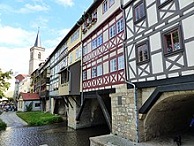
1325 On Jan. 7 king (since Feb. 6, 1279) Dinis I the Farmer (b. 1261) dies, and his son Afonso IV (1291-1357) becomes king #7 of Portugal (until May 28, 1357), getting into a 4-year war with Castile and scoring a big V against the Moors at the Oct. 1340 Battle of Rio Salado. In Jan. after paying off mercenary Henry VI of Carinthia to desert Padua, Cangrande della Scala attacks Padua again until Louis IV the Bavarian orders him to call a truce and give it back, which he might have done anyway when a great fire in Vicenza causes him to hurry back in July; meanwhile Frederick III the Handsome of Austria is released and made coregent of Germany by Louis IV the Bavarian, with his authority limited to Austria. Louis I of Nevers (1272-1322), count of Flanders, Nevers, and Rethel since 1322 is imprisoned by the communes under English influence (until 1326), pissing-off the French king and causing him to plan a campaign against the buggers, er, burghers. On Feb. 1 Ghiyas-ud-din Tughlak is murdered by his son Muhammad bin Tughluq (Mohammad Tughlak) (1290-1351) who succeeds him as sultan of Delhi (until Mar. 20, 1351), going on to expand S as far as the Deccan; too bad, he is so cruel and fanatical in his long reign that he alienates both the subject Hindus and his own Muslims, causing his empire to be torn apart by revolt, with some provinces, esp. Bengal bengalling out (seceding). On Mar. 13 after pressure by Duke Leopold I of Austria and a papal ban, plus the retreat of Bohemian king John of Luxembourg from his alliance, Louis IV the Bavarian finally signs the Treaty of Trausnitz, releasing his rival Duke Frederick III the Handsome of Austria in return for recognizing him as the legitimate ruler and promising to convince his brothers to do likewise; too bad, Leopold I doesn't convince, so that Freddy has to return to captivity even though Pope John XXII releases him from his oath, which causes a change in Louis IV, who renews his old friendship and lets him rule as joint HRE. Why Mexico's emblem is an eagle and a snake? On Mar. 13 after getting in trouble for sacrificing and skinning the daughter of a Culhua ruler and being driven by the Toltecs into the swamps of Lake Texcoco (pr. tesh-KOH-koh), where they found an eagle warming itself, its wings stretched out towards the rays of the sun, and eating a snake, the Mexica (Aztecs) found the city of Tenochtitlan (pr. teh-noch-TEET-lahn) ("stone prickly-pear place") (modern-day Mexico City, pop. 8.9M/20.4M) on a marshy island in Lake Texcoco, later expanding it by filling in the lake, which is linked to the mainland by causeways; they build fertile floating gardens in Xochimilco (pr. show-chee-MEEL-koh) outside the city, enabling them to free manpower for armies which set out to conquer everything from the Gulf to the Pacific to Guatemala; the soldiers carry spirolina high-protein algae as rations; they never invent the wheel (except as a kiddie toy) or use a beast of burden, but they love human meat and practice ritual sacrifice religiously, considering it an honor to sacrifice one's yollotl (heart). In Mar. after Pope John XII forces them to come to term with its citizens, peace is restored in Metz; next year the Peace of Herrings (named after their major food source after the lords block their trade routes) is signed in Ponit-a-Mousson, and the burgesses promise to not set up markets on their lords' fiefs without consent. On Sept. 22-23 the Battle of Altopascio in Tuscany, Italy is a V for the Ghibelline city of Lucca under Castruccio Castracani odegli Antelminelli (1281-1328) over the Florentine Guelphs, causing HRE Louis IV the Bavarian to appoint him duke. On Nov. 21 Ivan I Danilovich (Kalita) (1288-1340) becomes grand duke (prince) ("vladimir" = great ruler") of Moscow (until Mar. 31, 1340)), collecting taxes as a vassal of the Tartars, earning him the nickname Kalita ("moneybags"), then loaning it out at interest to get them in trouble and annex their lands; he goes on to move the capital from Vladimir to Moscow. In Nov. the Battle of Monteveglio sees the Guelphs of Bologna defeated by the Ghibellines under Passerino Bonacolsi of Mantua and Cangrande della Scala of Vicenza. The Teutonic Knights disregard the papal legates and resume their war with Gediminas of Lithuania, who allies with Wladislaus Lokietek of Poland after marrying his daughter Aldona to his son Casimir III. Songhay (Songhai) comes under the control of Mali. Isabella the She-Wolf of France finally gets the hot beef she wants? After Charles IV of France seizes Edward II's French possessions, definitely not-getting-much English Queen Isabella of France (1295-1358) is sent to negotiate peace with her brother, later tricking Edward into sending 13-y.-o. Edward III after her, while she hooks up with Roger Mortimer, 1st Earl of March (1287-1330), an ambitious exiled Marcher Lord, a mortal enemy of the Despensers (because his grandfather had murdered their grandfather?), who with her probable help had escaped from the Tower of London in 1323 and who, unlike her weak, incompetent, suspected dickwhipped faggot husband Edward II gives her the hot mortadella she likes, carrying on an adulterous relationship which gets them kicked out of the royal court even though Charles IV refuses Edward II's demand to return her to England, after which they find refuge with Count William I of Hainaut, whose wife is Isabella's cousin; they go on to conspire with the large group of English exiles in Paris and disaffected English nobles to make a comeback. The Genoese finally take control of Corsica from Pisa. Morocco-born Muslim Berber scholar Ibn Battuta (1304-69) begins exploring as far as India and China (ends 1354). At the urging of Ivan I, the metropolitan of the Russian Orthodox Church moves his see from Kiev to Moscow, making it the nat. religious capital. Architecture: The medieval arch Kramerbruceke (Krämerbrücke) over the Breistrom River (branch of Gera River) is built in Erfurt, Thuringia in C Germany; in 1486 it is lined with half timbered shops and houses on both sides of a cobblestone street, becoming the longest continuously inhabited bridge in Europe. Lofty Muncipal Palace Tower in Siena, Italy is built. Inventions: Metal cannons are invented by Rinaldo di Villamagna, and used in the Siege of Metz, becoming their first use in Western Europe? Organ pedals are developed by ?. Nonfiction: The oldest surviving copy of The Life of St. Melorus dates to this time. Music: The Tournai Mass, the first polyphonic Mass still extant is first performed. Plays: No (Noh) drama plays begin to be performed in Japan, featuring music and dancing and cool masks of devils and maidens - by Doctor No? Births: Portuguese queen Ines (Inés) de Castro (d. 1355) in Galicia; wife (1346-55) of Peter I. Welsh #1 poet Dafydd ap Gwilym (d. 1380) (1315-70?) (pr. DAV-ith) in Bro Gynin, Ceredigion (modern-day Cardiganshire). Scottish queen consort (1371-86) Euphemia Ross (d. 1387) (1332/3-86)?); daughter of Hugh de Ross, 4th earl of Ross; and Margaret (daughter of Sir David Graham of Montrose) 2nd wife (1355-60 of Robert II (1316-90). German philosopher-theologian-mathematician Henry of Hesse the Elder (of Langenstein) (d. 1397) in Hainbuch (Hembuche) (near Langenstein), Hesse; follower of Nicole Oresme, who considers it possible that a fox can spring from the corpse of a dog? Italian composer-organist (blind) Francesco Landino (Landini) (d. 1397) in Florence. Bulgarian Hesychiast patriarch (1375-93) (St.) Euthymius of Tarnovo (d. 1402) in Tarnovo; disciple of Theodosius of Turnovo; feast day: Jan. 20. Deaths: Portuguese king (1279-1325) Dinis I (b. 1261) on Jan. 7. French royal so-and-so Charles of Valois (b. 1270) on Dec. 16 in Nogent-le-Roi; "Son of a king, brother of a king, uncle of three kings, father of a king, but never king himself."

1326 On Jan. 7 even though Louis IV the Bavarian and Frederick III the Handsome have kissed and made up, the pope and the electors oppose their joint rule agreement, causing the Treaty of Ulm to be signed, making Frederick king of the Romans and ruler of Germany, with Louis to be crowned HRE in Italy; too bad, his brother Leopold I dies, causing Frederick to return to rule only Austria until his death in 1330; too bad, Pope John XXII, who had excommunicated Louis IV in 1324 still won't ratify the election, causing Louis IV to plan a march to Italy to do it his way. Early in the year after leaving a testament beginning with "Son, be careful about the religious issues before all other duties. Religious precepts build a strong state", and telling him in 1323 to "propagate Islam by your arms" into Eastern Europe, Osman I Bey (b. 1258) dies while sieging Constantinople after being pinned by an arrow to a log and crushed by an elephant, and his son Orkhan (Orhan) I (1281-1362) succeeds him as sultan #2 of the Ottoman Empire (until 1359), killing the elephant with a broken blade and making a stew out of it, becoming the first to use the title of sultan instead of bey, continuing his daddy's program of expanding Ottoman holdings in Anatolia and gaining a foothold in Europe; on Apr. 6 after a 9-year siege Orhan captures the Bithynian city of Bursa (Brusa) (Broussa) from the Byzantines, making it the new Ottoman capital and staging ground for the conquest of Constantinople, striking the first Ottoman coins, with his new title of sultan on them; the Ottoman sultans become some of the most warlike in history, taking Smyrna in 1329, Nicaea in 1331, Nicomedia in 1337, all of NW Anatolia by 1340, setting his son Suleiman up to cross the Dardanelles into the abandoned fortress town of Gallipoli in 1354, gaining their first foothold in Europe, leading to the taking of the big jewel of Constantinople in 1453, with traveler Ibn Batuta writing the soundbyte that Orkhan "had never stayed for a whole month in any town" because he "fights with the infidels continually and keeps them under siege." On Apr. 26 the 1326 Treaty of Corbeil renews the Auld Alliance between Scotland and France; in July the Scottish parliament passes an Act of Succession recognizing Prince David as heir apparent, followed by Robert Stewart; meanwhile Robert I becomes the first Scottish king so broke that he has to ask his subjects for annual taxation for his living costs. On Sept. 21 after Queen Isabella of France arranges a marriage between her son Edward II with Count William I of Hainaut's son (Isabelle's 2nd cousin) Philippa of Hainaut in return for eight warships, and raises a mainly mercenary army along with some anti-Edward II barons, they land in Suffolk, England, becoming the first successful invasion of England since the 1066 Norman invasion; on Sept. 29 Edward II offers a reward for the heads of Isabella and Mortimer, and she counters by doubling the reward for the head, er, neck of Hugh le Despenser; on Oct. 15 the people of London turn around, er, on Edward II, and he flees to the estate of the earl of Winchester at Glamorgan in Wales in the hope of raising support, which goes limp, er, fails to happen; meanwhile the Dispensers flee with a sizeable sum from the treasury, only to be captured; on Nov. 16 Edward II and his cute hung, young and indispensible Pez dispenser Hugh le Despenser the Younger (b. 1286) are captured in Neath, South Wales as they try to flee to the sea (like Paris and Helen?), and the king is imprisoned in Kenilworth Castle; on Nov. 26 after vainly trying to starve himself to death, Hugh the Younger is executed by Isabella's men in Hereford by hanging him from a 50-ft. gallows, then cutting him down while still alive and placing him nude on a ladder, then slicing off his manhood and burning it in front of him in front of a G-for-Genitals-rated crowd, then drawing (gutting) him with a knife, after which he is beheaded and quartered, and his head mounted on the gates of bloody London (take time to enjoy your view?); his daddy Hugh le Despenser the Elder (b. 1261) was done likewise in Bristol on Oct. 27 - dog in the kennel jokes here? Marsilius of Padua is forced to flee Paris. The First Polish-Teutonic War begins (ends 1333s, with Poland attempting to kick the Germans out for the first time. Stepan II Kotromanic of Bosnia defeats the Serbs, ruling from the Adriatic Sea to the Sava River, and from Cetina to Drina, and becoming known as "the Devil's Student" as he play off the Roman Catholics, Orthodox Catholics, and Bogumils. Cormac MacCarthy Mor (1271-1359) becomes king of Desmond in S Munster, Ireland (until 1359); in 1358 his 2nd son Dermod Mor MacCarthy (1310-68) is created 1st Lord of Muscry (Muskerry) along the Lee River in C County Cork, founding the MacCarthy Dynasty of Muskerry, which owns Blarney Castle. Pope John XXII makes the Church of Monte Cassino in Italy (home of St. Benedict of Benedict Rule fame in the 6th cent., made independent in 744 by Gisulf II of Benevento) into a cathedral, ending its independence from episcopal interference and starting a long period of decline. Clare College at Cambridge U. is founded as Univ. Hall, becoming the 2nd oldest college of Cambridge to survive to modern times; in 1338 after an endowment from Elizabeth de Clare (de Burgh) (1295-1360) it is refounded, becoming known for its chapel choir and its garden on the Backs overlooking the Cam River. The first secular order of knighthood is founded in Hungary. Inventions: The first paper mill in Christian Europe is built in Ambert in Auvergne, France, followed by Troyes in 1338, Nuremberg in 1390, and Leira, Portugal in 1411. Births: Hungarian Angevin king (1342-82) and Polish king (1370-82) Louis I the Hungarian (the Great) (d. 1382) on Mar. 5 in Visegrad; son of Charles I (1288-1342) and Elisabeth of Kujavia (1305-80) (daughter of Ladislaus the Short and sister of Casimir III). Ottoman sultan #3 (1362-89) Murad (Amurath) I Hudavendigar (the Godlike One) (d. 1389) on June 29 in Amasya, Turkey; son of Orhan I (1284-1359) and Byzantine princess Helen; father of Bayezid I (1347-1403). Russian grand prince of Moscow and Vladimir (1353-9) Ivan II Krasny (the Beautiful or Fair) (d. 1359) in Moscow; 2nd son of Ivan Kalita (1288-1341); brother of of Simeon the Proud (1316-53). Deaths: Italian anatomist Mondino de Liuzzi (b. 1258). Ottoman sultan #1 (1299-1326) Osman I (b. 1259) in Sogut, Anatolia (KIA). English bishop of Exeter (1308-26) Walter de Stapledon (b. 1261) on Oct. 14 in London. Italian astronomer Mondino di Luzzi (b. 1275). English advisor Hugh le Despenser the Elder(b. 1261) on Oct. 27 in Bristol (executed); beheaded and cut into pieces for the dogs; the head is displayed in Winchester. English lord high commissioner Hugh le Dispenser (b. 1306) on Nov. 26 in Hereford (executed).


1327 On Jan. 25 Edward II of England is forced by the 1327 Parliament of Westminster (Jan. 7-Mar. 9), (dominated by Isabelle, containing burgesses and knights, like in 1311 and 1322) to abdicate in favor of his 15-y.-o. son Edward III (1312-77) (the 31st English monarch) (until June 21, 1377), with a council of regency appointed, although it is his mother Isabelle and her lover Roger Mortimer who really rule, and Mortimer becomes king in all but name; Edward III is presented with England's first metal cannon, a bulbous bottle-like pot-de-fer; the conviction of Thomas of Lancaster is reversed, allowing his younger brother Henry Plantagenet, 3rd Earl of Lancaster (1281-1345) (who had captured Edward II in South Wales last year) to inherit his earldoms of Lancaster, Derby, Salisbury, and Lincoln, and he is also appointed guardian of Edward III; on Sept. 21 after Isabelle and Mortimer send the double-meaning message "Edwardum occidere nolite timere bonum est" ("Don't be afraid to kill Edward, it is good", or "Don't kill Edward, it's good to fear") English king (since 1307) Edward II (b. 1284) is murdered in Berkeley Castle by having a red-hot poker shoved up his ass while being strangled ("with a hoote broche putte thro the secret place posterialle" - John Treviso, vicar of the castle), leaving no visible marks and allowing the murderers to claim that he died from natural causes; some think this form of murder was chosen as fitting for a sodomite - or maybe they just wanted him to die happy? On Apr. 6 (Good Friday) after giving up his vocation as a priest, Petrarch glimpses a babe named Laura in the Church of Sainte-Claire in Avignon, and though she doesn't return his love, he obsesses on her for life? - after flogging his bishop over her for decades, she always looks in his mind's eye like that sweet succulent young thing? On Apr. 9 Walter Stewart, 6th high steward of Scotland (b. 1296) dies, and his son Robert (future Robert II) inherits his large estates in W Scotland, incl. Renfrew, Clydeside, and the Isle of Bute; pleased by the overthrow of Edward II, Robert I of Scotland invades N England again, seeking recognition of Scottish independence, and kicks the butts of teen king Edward III's army - don't they ever give up? On May 13 the Ottomans conquer Lopadion (Ulubad) (Ulubat) in NW Asia Minor. On May 31 (Whitsunday) after getting tired of waiting for Pope John XXII to crown him and marching to Italy to force the issue by hook or crook, Louis IV the Bavarian is crowned HRE in Milan; Ghibelline Scaliger lord Cangrande della Scala of Verona uses the occasion to show off with a retinue of 1K knights, which only makes the Viscontis of Milan jealous; meanwhile in June Passerino Bonacolsi loses Modena, causing the Gonzaga family to close in on Mantua. On Nov. 2 (5?) James II the Just (b. 1267) dies, and his brother Frederick III (1272-1337) becomes king of Sicily (until 1337), while Alfonso IV (the Kind) (1299-1336) becomes king of Aragon and Valencia and count of Barcelona (until 1336), going on to absorb the county of Urgell, the duchy of Athens, and the duchy of Neopatria. The French, helped by the English vassals conquer a good chunk of E Gascony, and Edward III's regents sign a treaty permitting them to keep most of it, car-door ears and all, but the French only turn up the pressure to gobble it all up and squeeze the English king out of France, leading to the Hundred Years' War in 1337 - swallow rather than spit? Ghibelline duke Castruccio Castracani of Lucca captures Pisa, and is appointed imperial vicar by HRE Louis IV. Pleased by the overthrow of Edward II, Robert I of Scotland invades N England again, seeking recognition of Scottish independence, and kicks the butts of teen king Edward III's army - don't they ever give up? The English Statute of Westminster, 1327 allows itinerant justices of the peace (established by Henry III) to have judicial powers and to receive indictments for trial; in 1332 the jurisdiction of English justices of the peace is expanded to incl. felonies and trespass. German mystic Meister Johannes Eckhart von Hoccheim (1260-1328) is summoned to Avignon by Pope John XXII to defend himself against accusations of heresy, and is condemned and executed next year in Avignon; bad boy Marsilius of Padua is excommunicated by the pope, along with Castruccio Castracani. The province of Bourbonnais in C France becomes the duchy of the house of Bourbon, with capital at Bourbon (until 1523). Mohammed Tughluk of Delhi sacks Halebid(u) in Karnataka, causing Viraballala III to move his Hoysala Dynasty capital to Tiruvannamalai (South Arcot) in Tamil Nadu. During the reign of Edward III clothmaking is introduced to Bristol, and by next cent. it has a flourishing cloth trade with France, Spain, the Baltic countries, and the Near East. Births: Scottish earl (1358-) William Douglas, 1st Earl of Douglas (d. 1384); son of Sir Archibald Douglas (1297-1333) and Beatrice Lindsay; nephew of Sir James "the Black/Good" Douglas (1286-1330), deputy of Robert I the Bruce. Deaths: Spanish king of Aragon (1291-1327) James II the Just (b. 1267) on Nov. 2/5 in Barcelona. English king (1307-27) Edward II (b. 1284) on Sept. 21 in Berkeley Castle (murdered). Scottish high steward #6 Walter Stewart (b. 1296) on Apr. 9 in Bathgate Castle. Scottish queen Elizabeth de Burgh (b. ?) at Cullen in Moray. Scottish steward William Stewart (b. ?) on Apr. 9.

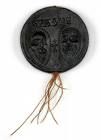



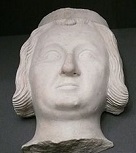
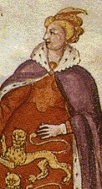



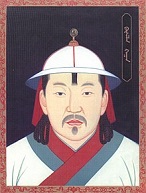

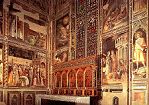
1328 Anyone for a cocktail? On Jan. 17 Louis IV the Bavarian (1282-1347) is crowned HRE by aged pope-slapping Ghibelline Roman senator Sciarra Colonna (b. 1270) ("captain of the Roman people") in Milan; in Apr. Louis IV declares "Jacque de Cahors" (Pope John XXII) in Avignon deposed for heresy, and on May 12 proclaims spiritual Franciscan Pietro Rainalducci as Antipope Nicholas V (1260-1333) (until July 25, 1330), becoming the last imperial antipope (set up by a HRE); Marsilius of Padua helps Louis IV with more good propaganda under imperial protection until his death in 1342. On Jan. 24 Edward III (b. 1312) of England marries Philippa d'Avesnes of Hainault (1311-69) at York Minster; she wisely decides not to Frenchify her court or retain her foreign retinue, and goes on to become known for her gentleness and compassion, and gives the definitely heterosexual Edward III 13 children, incl. 5 sons who survive to adulthood, incl.: #1 Edward the Black Prince of Wales (1330-76) (AKA Edward of Woodstock), #2 William of Hatfield (1336-7), #3 Lionel of Antwerp, Duke of Clarence (1338-68), #4 John of Gaunt, Duke of Lancaster (1340-99), #5 William of Windsor (1348-8), #6 Edmund de Langley, 1st Duke of York (1341-1402), and #7 (13th and last child) Thomas of Woodstock, 1st Duke of Gloucester (1355-97) (an ancestor of Edward Winslow of 1620 Mayflower fame) - thus are the dragon's seeds sown for the Wars of the Roses between the houses of York (white rose) and Lancaster (red rose)? On Feb. 1 king (since Jan. 3, 1322) Charles IV the Fair of France (b. 1294) dies without male heir, leaving only a useless woman, Blanche (his daughter through his wife Blanche of Burgundy, who marries Philip of Orleans and founds the House of Orleans), ending the direct line of the Capetian kings; after an assembly of barons declares that "no woman or her son could succeed to the monarchy", regent Count Philip of Valois, son of Count Charles of Valois (brother of Philip IV) and his wife Margaret of Anjou is crowned Philip VI (1293-1350) at Rheims, becoming the first French king of the Valois Dynasty (ends 1589), using the Salic Law to set aside rival claimants, particularly pesky Edward III; Louis X's only daughter Joan II of Navarre (1312-49), also prevented by the Sexalic er, Salic Law from becoming the monarch becomes queen of Navarre (where the Salic Law doesn't apply), renouncing her claims to the French throne as well as her lands in Brie and Champagne in return for extensive lands in Normandy (Angouleme, Mortain and Longueville) (later exchanging Angouleme for three estates in Vexin); free at last to help Louis of Nevers, Count of Flanders and avenge the 1302 Day of the Spurs, Philip VI sends his French troops to slaughter the whimpy Flemish burgers, er, burghers at the Battle of White Castle, then the less-white Aug. 23 Battle of Cassel 20 mi. S of Dunkirk, at which Charles IV is saved by Philip III of Navarre (the Noble) (the Wise) (1306-43), hubby of Joan II of Navarre; Charles V establishes a French admin. in Flanders, which pisses-off Edward III and leads to the Hundred Years' War (1337-1453). On Mar. 17 after English defeats cause Roger Mortimer to pressure Edward III into it, the Treaty of Edinburgh-Northampton is signed, recognizing Scottish independence and sovereignty in return for a £20K payment by Robert I, a promise of a royal marriage for Robert I's 4-y.-o. son David Bruce (future David II) (1324-71) to Edward III's 7-y.-o. sister (youngest daughter of Edward II and Isabelle, born in the Tower of London) Joan "of the Tower" Plantagenet (1321-62), and help in getting Robert's excommunication lifted; on May 4 the TOE is ratified at Northampton, and on June 12 the marriage takes place by proxy, followed by another marriage on July 17 at Berwick-upon-Tweed; Roger Mortimer declares himself the first earl of March and splits with the barons, attacking their leader Henry of bloody red rose Lancaster - what role did Isabelle play in all this? On Apr. 11 Adam Duff O'Toole of Leinster, Ireland is burned at the stake in Hogging (Hogges) Green near Dublin for blasphemy and heresy, although it was really for rebelling against the stankin' English? On Aug. 15 Yuan emperor #6 (since Oct. 4, 1323) Yesun Temur (Yuan Tai Ding Di) (b. 1293) dies, and on Oct. 4 is succeeded by his eldest son Ragibagh (Arigabag), who becomes Yuan Tian Shun (1320-8), but on Nov. 14 before he can be coronated he is dethroned by is succeeded by 24-y.-o. Tugh Temur (Jayaatu "lucky" Khan) (1304-32), who becomes Mongol Yuan emperor #7 of China, then abdicates after 1 mo. in favor of his elder brother Khoshila (Kusala), who on Feb. 27, 1329 becomes Khutughtu Khan (1300-29), Mongol Yuan emperor #8 of China Mingzong (until Aug. 30, 1329), who resigns on Aug. 30 in favor of Tugh Temur, who resumes the throne on Sept. 8, 1329 (until Sept. 2, 1332); Eretna Bey (-1352) becomes Mongol Ilkhanid rep. in Rum; the War of the Two Capitals begins, pitting the family dynasty based in Khanbaliq (modern-day Beijing) against the one based in the summer capital Shangdu, which ends in 1332 with a V for the Khanbaliq group after the most bloody and destructive succession struggle in Yuan history. On Aug. 23 the Battle of Cassel 18 mi. S of Dunkirk, France is a decisive V for 14.5K French soldiers led by Philip VI over 6.5K-8K Flemish independence rebels led by Nicolaas Zannekin, who lose 3,185 KIA. In Aug. the Gonzaga family, supported by Cangrande della Scala overthrows Passerino Bonacolsi in Mantua. On Sept. 10 Cangrande della Scala finally takes Padua after 16 years of trying when imperial vicar Henry III of Carinthia abandons it and the lawlessness causes Marsilio da Carrara to surrender it to him in return for a share of power; the big Ghibelline V causes Venice to make him a citizen next Mar. After accidentally killing his brother Manuel in 1320, causing their father Michael IX Palaeologus to die in grief and his grandfather Andronicus II Palaeologus to disown him, after which he flees to Thrace and proclaims himself emperor in Apr. 1321, starting the Byzantine Civil War of 1321-8 and forcing Andronicus II to make him co-emperor in Feb. 1325, Byzantine emperor (since 1282) Andronicus II Palaeologus resigns, and Andronicus III Palaeologus (Andronikos III Palaiologos) (1297-1341) becomes sole emperor (until June 15, 1341); next year he personally leads an expedition against the Ottomans under Orkhan I in Anatolia, and is defeated on June 10-11 at the Battle of Pelekanon near Nicomedia, causing the Byzantines to permanently abandon their cities in Anatolia. A great fire destroys much of Munich. Wang Dayuan (1311-) travels from Quanzhou, China along the South China Sea to South Asia, reching Singapore in 1330, Bengal, Sri Lanka, and India by 1333, and North Africa and East Africa in 1334-9; in 1339 he writes Daoyi Zhilue (A Brief Account of Island Barbarians), one of the first accounts of the history of Singapore. The North Sea port of Rotterdam on the Rotte River in SW Netherlands on the Rhine River delta (modern pop. 580K) is chartered. Architecture: The Alcazar de los Reyes Cristianos (Fortress of the Christian Kings) in Christian-held Cordoba, Spain is begun by order of Alfonso XI of Castile. Inventions: The sawmill is invented by ? - from sawing too many Templars in half and needing a labor-saving device? Nonfiction: Thomas Bradwardine, Tractatus Proportionum; attempts to explain how velocity is related to the two independent variables power and resistance in the analysis of motion. The first post-it notes are in the Bible? English chronicler Nicholas Trivet (Nicolas Trivetus) (1257-1334) pub. the first postil (postilla) (from Lat. "post illa verba textus"), a Biblical commentary affixed to a text, later evolving into a printed homily. Art: Taddeo Gaddi (1300-66), Decoration for the Baroncelli Chapel (1328-30), Santa Croce, Florence. Poetry: Don Juan Manuel (1282-1348), El Conde Lucanor (Count Lucanor) (1328-35); he does his uncle Alfonso X the Wise of Castile proud? Births: Bavarian Wittelsbach duke (1347-65) and Brandenburg margrave (1351-65) Louis VI/II (the Roman) (d. 1365) on May 7 in Rome; eldest son of HRE Louis IV the Bavarian (1282-1347) and Countess Margaret II of Hainault; younger half-brother of Louis V of Bavaria (1315-61). Chinese Ming emperor #1 (1368-98) Hong Wu (Chin. "vast military") (Zu Yuan Zhang) (d. 1398) on Oct. 21. English soldier Roger Mortimer, 2nd Earl of March (d. 1360) on Nov. 11; son of Sir Edmund Mortimer (-1331) and Elizabeth de Badlesmere; grandson of Roger Mortimer, 1st earl of March (1287-1330). Scottish leader "Black" Archibald (the Grim), 3rd Earl of Douglas (d. 1400); bastard son (by a Moorish mother?) of Sir James "the Black/Good" Douglas (1286-1330), deputy of Robert I the Bruce; cousin of William Douglas, 1st earl of Douglas (1327-84); father of James Douglas, 7th earl of Douglas (1371-1443). Deaths: Italian Catholic missionary (to China) John of Montecorvino (b. 1246) in Peking. Arab puritanical Muslim fundamentalist scholar Ahmad ibn Taymiyyah (b. 1263); revered by the 18th cent. Wahhabi movement. Greek Byzantine physician Johannes Zacharias Actuarius (b. 1275) in Constantinople; leaves the last great compendium of Byzantine medicine, incl. "De Methodo Medendi" (6 vols.), "De Urinis" (7 vols.), and "De Actionibus et Affectibus Spiritus Animalis, ejusque Nutritione" (2 vols.). Italian condottiero Castruccio Castracani (b. 1281) on Sept. 3. French Capetian (the last) king (1322-8) Charles IV (b. 1294) on Feb. 1.

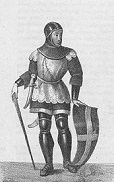

1329 Mt. Etna erupts, with a lava tongue going down into the sea. Early in the year HRE Louis IV the Bavarian leaves Rome, allowing Antipope (since 1328) Nicholas V to be deposed. In the spring Cangrande della Scala obtains the title of imperial vicar of Mantua from HRE Louis IV the Bavarian, then in July suspends his plans to conquer it from the Gonzagas in order to siege Treviso, triumphantly entering on July 18; too bad, he takes ill from drinking from a polluted spring, and the physicians feed him foxglove until he croaks on July 22; his brother Alboino's sons Mastino II della Scala (1308-51) and Alberto II della Scala (1306-52) succeed him as Scaliger lord of Verona (until 1351), later hanging one of his daddy's physicians. On June 7 after the pope finally recognizes Scotland and lifts his excommunication, and he grants the harbor of Leith on the S shore of the Firth of Forth to Edinburgh and makes a 1-mo. pilgrimage from Cardross through Clydeside to the Shine of St. Ninian at Whithorn Cathedral in Dumfries and Galloway (SW Scotland) to seek a cure, doing penance for five days, ailing 55-y.-o. Scottish king (since 1314) Robert I the Bruce (b. 1274) dies at Cardross Castle of leprosy (psoriasis?) (which he believes is God's judgment for killing John Comyn on a sacred altar in 1307, which causes him to grant large sums of money to abbeys in S Scotland), and is buried at Dumfermline Abbey in SW Fife with Templar ritual beside his 2nd wife Elizabeth de Burgh; on June 7 his young son (by Elizabeth) David II (1324-71) succeeds him as king of Scotland (until Feb. 22, 1371, his daddy telling him on his deathbed never to fight a pitched battle but to stick with guerrilla tactics; he receives a bottle of sacred oil from the pope for his coronation, but Edward III reneges on his promise to return the Stone of Scone; Thomas Randolph, 1st Earl of Moray (1278-1332) is appointed guardian, giving him his early schooling, which doesn't stop him from growing up to become incompetent?; Robert I's internal organs are interred at his instructions at St. Serf's Chapel (Inch Priory) near Dumbarton, with fellow Templar Sir James "Black" Douglas instructed to carry his "Braveheart" in a silver casket hung on his neck with a small Crusader party to bury it in the Holy Land; the disinherited Scottish nobles, led by Henry Beaumont, 4th Earl of Buchan (1279-1340) see their chance, and begin plotting to put Edward de Baliol, son of John Balliol on the Scottish throne. Edward III does homage for his French lands. If you want to know why central Europe's history is such a mixed-up mess, start here? HRE Louis IV's Compact (Treaty) of Pavia splits the Palatinate from Bavaria and its ruling House of Wittelsbach (founded 1119), returning it to the descendants of his nephews Rudolph II the Blind (1306-53) and Rupert I the Red (1309-90); in 1410 the Palatinate branch fractures into numerous branches; when the Roman Catholic-Protestant thingie comes along, the Upper Palatinate branch goes Protestant, and after an ass-kicking the Upper Palatinate is given back to the Roman Catholic Bavarian side in 1623; the two big branches are not reunited until 1777. Count (since 1323) Edward the Liberal (b. 1284) dies, and his younger brother (son of Amadeus V) Aymon the Peaceful (b. 1291) becomes count of Savoy (until June 22, 1343), earning his nickname by resolving the old territorial dispute with his cousin Amadeus III of Geneva; his niece Joan of Savoy is excluded from the succession by Salic Law, and contests it with the support of her hubby Duke John III of Brittany, but settles for a monetary payment after their marriage produces no heir; Aymon oes on to continue the old family feud with French dauphin Guigues VIII of Viennois until he is KIA at the Battle of La Perriere in 1333, after which Philip VI brokers a truce with the new dauphin Humbert III of Viennois, Guigues' brother. Pope John XXII sends Franciscan Order master-gen. (since 1329) Gerard Odon (Geraldus or Gerardus Odonis) (Guiral Ot) (1285-1349) to meet with Charles I of Hungary and Stephen II of Bosnia to urge them to exterminate heretics, esp. the pesky Manichaean dualist Patarenes (Bogomils). Births: English soldier Roger Mortimer, 2nd Earl of March, 4th Baron Mortimer (d. 1360) on Nov. 11; son of Sir Edmund Mortimer (-1331) and Elizabeth de Badlesmere; grandson of Roger Mortimer, 1st earl of March (1287-1330). Deaths: Scottish king (1314-29) Robert I the Bruce (b. 1274) on June 7 in Cardross Castle. French duke of Lorraine (1312-29) Frederick IV (b. 1282) on Apr. 21 (KIA in the Battle of Cassel). Italian condottiero Cangrande della Scala (b. 1291) on July 22 in Treviso (poisoned); buried in the new Gothic Scalinger Tombs, known for the richly-harnessed big dogs, later housing his downline. Chinese Mongol great khan #13 (1329) Khutughtu Khan Kusala (Mingzong) (b. 1300) on Sept. 30 in Onggatchu, Inner Mongolia; dies four days after a banquet with Tugh Temur (poisoned?), who is restored to the throne on Sept. 8.








1330 On Mar. 19 Edmund of Woodstock, 1st Earl of Kent (b. 1301) (6th son of Edward I) is executed for treason by order of Roger Mortimer and Queen Isabella before the walls of Winchester Castle for supporting his half-brother Edward II after he believes him to still be alive and tries to rescue him from prison; after nobody wants to do it for five hours, they finally get a convicted murderer to do the honors in exchange for a pardon; the incident turns the barons against the She-Wolf and He-Wolf, and their end is nigh? On Apr. 28 Mary-worshiping Benedictine Ettal Abbey in Bavaria is founded by German king and HRE (since 1314) Louis IV the Bavarian (1282-1347) near an Alpine pass where he passed on his 1328 journey to Rome from Augsburg, bringing them the marble Ettal Madonna on his way back; when he returns to Munich, Louis IV turns his court into a refuge for trendy pope-questioning philoafers, er, philosophers incl. Marisilius of Padua (1270-1342), William of Ockham (Occam) (1280-1347), and Michael of Cesena (1270-1342); meanwhile Pope John XXII fumes on, pulling every string to depose him. In the spring a group of Scottish Templars under Sir James "the Good/Black" Douglas, Lord of Douglas (b. 1286) leaves with the "Braveheart" of Templar king (1306-29) Robert I the Bruce (1274-1329) in a silver casket to be buried in the Holy Land; too bad, after getting detoured at pilgrimage site Santiago de Compostella, they get in the Aug. 25 Battle of Teba in Teba, Calavatra on the Andalusian frontier, becoming the first successful Christian battle against the Moors, in which Douglas is KIA, leaving swarthy infant bastard son-heir (by a Moorish woman?) "Black" Archibald Douglas the Grim, 3rd Earl of Douglas (1328-1400); the rest return to Scotland with Bruce's heart, which ends up in Melrose Abbey on the Scottish-English border as a charm to protect the kingdom, a nchoring the E side, while the heart of King John Balliol's father interned in Sweetheart Abbey in Galloway anchors the W side; a human heart is added to the Douglas coat of arms; the Bruce legend grows, turning him into the King Arthur of Scotland, "symbol of the integrity of the realm", James III later using his sword as a talisman; when Scottish poet Blind Harry comes out with The Wallace in the 1470s-1480s, William Wallace (more Gaelic) begins to eclipse him as Scotland's nat. hero; after the Mel Gibson's hit movie "Braveheart" comes out in 1996, Richard's heart is excavated in 1996, and his skull (excavated in 1819) is used to recreate his face. In Apr. after consolidating control of the Irrawaddy Delta and losing control of the coastal territories of Tenasserim to Sukhotai, king (since 1323) Saw Zein (b. 1303) is KIA while trying to take Prome in Upper Burma, and palace official Zein Pun (1295-1330) seizes control, becoming king #5 of the Burmese Hanthawaddy Kingdom; too bad, seven days later Saw Zein's wife Sanda Min Hla stages a putsch, giving the throne to Saw Zein's son (by princess May Hnin Htapi of Sukhothai) Saw E (Kankaung) (1303-30), who becomes king #6 of the Burmese Hanthawaddy Kingdom, and rules for 49 days until Sanda Min Hla poisons him and gives the throne to her half-brother Binnya E Law (1308-48), viceroy of Pegu, who in May becomes Burmese Hanthawaddy king #7 (until 1348), defeating a Sukhotahai invasion next year and moving the capital to Pegu. On July 25 Antipope (since 1328) Nicholas V abdicates, and Pope John XXII pardons him, and keeps him as an honorable captive in the new papal palace in Avignon. On Jan. 13 Frederick III the Handsome (b. 1289) of Austria dies, and the Hapsburgs sign the Treaty of Hagenau recognizing Louis IV the Bavarian (the epithet was meant to be derogatory by the pope, but he likes it?) as HRE, while brothers Otto IV the Merry (1301-39) and Albert II (the Wise) (the Lame) (1298-1358) rule Austria jointly. On Oct. 19 old-enough (17-y.-o.) Edward III of England, with the support of his former guardian (Edmund of Woodstock's cousin) Henry, 3rd Earl of Lancaster (1281-1345) stage a coup, taking Roger Mortimer and Queen Isabelle prisoner, then having him hanged in Nov. despite Isabelle's plea "Fair son, have pity on gentle Mortimer"; the regency is brought to a close, and Edward III begins his personal rule; Isabelle, the "She-Wolf of England" (stolen from Shakespeare's "Henry VI", where he uses it to refer to Margaret of Anjou) is declawed and put out of the way in Castle Rising in Norfolk, and he doesn't kill her even though she killed his daddy, even letting her visit the court and dote on her grandkids until she finally takes the habit of the Poor Clares? On Nov. 9-12 prince (since 1310) Basarab I (Cuman "father king") (John Bassaraba) (d. 1352) of Wallachia defeats Charles I Robert in the Battle of Posada in the Olt Valley of Transylvania, ambushing the well-armed Hungarian knights in a narrow ravine and pelting them with stones and arrows, losing almost none of his 10K shepherd troops, while the Hungarians lose almost all of their 30K troops, ending the Wallachian Revolt (begun 1325) and securing the independence of Walachia while ending Hungarian hopes of access to the Black Sea; Charles I Robert narrowly escapes clad in "dirty civilian clothes"; Transylvania is made safe for the coming of Vlad Dracula? - the William Walachia of Walachia and the Longshanks of Hungary? On Nov. 29 after three years as de facto ruler of England, Marcher lord Roger de Mortimer, 1st Earl of March (b. 1287) is executed by hanging in Tyburn for allegedly assuming royal power et al. Ottoman ruler Orkhan creates the Janissaries (Janizaries) (Yenicheri) ("new troops"), based on Devshirme, the practice of taking Christian boy captives aged 7-20, indoctrinating them into Islam, and training them as soldiers fighting for Islam (ends 1826); under Bayezid I the Christian converts become the sultan's loyal elite; the Janissaries eventually adopt the Bektashi Sufi Sunni-Shiite-Christian combo order; they are starved for sex, not necessarily with women but with boys, and only allowed it after capturing a Christian village, with a 3-day pass for rape and pillage? - hi, I'm Joseph you're Mary, no virgin birth this time? Countess Jeanne III of Burgundy inherits the county of Artois and the "free county" of Burgundy (Franche-Comte) (capital Besancon), which has been subject to the HRE since 1034, and ends up being separated from the duchy of Burgundy in 1477 and going to Austria in 1481 and Spain in 1556 before returning to France in 1678. Sultan Mohammed Tughluk of Delhi begins circulating copper fiat money to replace silver currency, but gives up because of counterfeiting. The Order of the Band, the 2nd secular order of knighthood is founded in Spain by Alfonso XI of Castile (first 1326). There are 30K Nestorians (Jinjiao) in China by this time. The Menetriers (Paris Musicians' Guild) is founded (until 1773). Giotto becomes the guest of Robert of Anjou, king of Naples. The Birkenhead-Liverpool Ferry in England begins operation when the Benedictine monks of Birkenhead Priory are granted a charter which only allows them to charge in the B-L direction. Nonfiction: Oderico da Pordenone (d. 1331) returns from the Far East after becoming the first Euro to visit Tibet, and dicates Description of Eastern Regions, claiming that Canton is 3x as large as Venice, and that Hangchow, located in Chekiang (Jujiang) Province on the East China Sea is the greatest city in the world; it becomes a bestseller for cents., esp. plagiarized versions by John de Mandeville. Hu Sihui, Complete Recipes for Dishes and Beverages; the dir. of the Chinese Yuan Dynasty imperial kitchen pub. the first known recipe for Peking Duck. Architecture: The Civic Tower (Torre Civica) next to Pavia Cathedral in Italy is first mentioned; after being enlarged in 1583, it falls down on Mar. 17, 1989. In this decade the Aztec capital of Tenochtitlan is enlarged by the construction of floating gardens in Lake Texcoco. Poetry: Anon., The Romance of Perceforest (6 vols.); composed in French in the Netherlands about this time (1330-44), about King Arthur, who leaves for Babylon, leaving King Perceforest as the new king of Britain, who introduces Christianity and founds the Franc Palais of free equal knights, then pierces the evil forest and is turned into a bear; first pub. in Paris in 1528. Juan Ruiz (1283-1350), The Book of Good Love (Libro de Buen Amor); ribald 1,728-stanza poem that chronicles medieval society and causes him to later be called the Spanish Chaucer. Births: Greek Orthodox Aristotelian monk-theologian Prochoros Kydones (Cydones) (Prochorus Cydonius) (d. 1369) in Thessalonica; brother of Demetrios Kydones (1324-98). English Prince of Wales Edward the Black Prince (Edward of Woodstock) (d. 1376) on June 15 in Woodstock; eldest son of Edward III (132-7) and Philippa of Hainault (1314-69); brother of John of Gaunt (1340-99). Ottoman bey #1 of Rumelia Lala Shahin (Sahin) Pasha (d. 1389); teacher (lala) of Sultan Murad I. English "Piers Plowman" poet and poor priest William "Long Will" Langland (Langley) (d. 1387) in Ledbury (Cleobury Mortimer?), Shropshire; educated at Great Malvern Monastery. Italian painter Altichiero da Zevio (d. 1395) in Zevio (near Verona); possible founder of the Veronese School of Painting, inspired by Giotto of Florence, which incl. Jacopo Bellini and Vittore Carpaccio. German philosopher-theologian Marsilius of Inghen (d. 1396). Bulgarian Hesychast metropolitan of Kiev and All Russia Cyprian (d. 1406). French alchemist Nicolas Flamel (d. 1418). Deaths: Italian painter Pietro Cavallini (b. 1259). Scottish military leader Sir James "the Good" "Black" Douglas (b. 1286) on Aug. 25 in Spain. English Marcher lord Roger de Mortimer, 1st earl of March (b. 1287) on Nov. 29 in Tyburn (hung). Austrian/German duke (1308-30) Frederick I/III the Handsome (b. 1289) on Jan. 13. Burmese king (1323-30) Saw Zein (b. 1303) in Apr. in Prome (KIA).


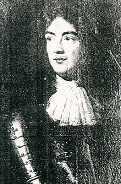
1331 On Mar. 2 the Ottomans conquer Nicaea (Iznik), and create their first madrassa (medrese) (Muslim religious college) out of a converted Christian church bldg. On Sept. 8 tfter having his father Stephen Uros III imprisoned, 7-ft.-tall Stephen (Stefan) Uros IV Dushan (1308-55) is crowned king of Greater Serbia (until Dec. 20 1355). On Sept. 12 Charles I (-1357) retakes the Rock of Monaco from the Genoese after 30 years, founding the House of Grimaldi. On Sept. 27 the Battle of Plowce sees Ladislas IV Lokietek defeat the Teutonic Knights in a Pyrrhic V - one more victory like that and we're kaput? On Oct. 22 after Godaigo's 2nd conspiracy to overthrow the shogunate becomes public, he is exiled to Oki Island (until 1333), and Kogon (1313-64) (personal name Kazuhito), 3rd son of Go-Fushimi becomes the first Japanese Ashikaga emperor of the N court of Kyoto (until July 7, 1333); the Ashikaga Revolt (ends 1392) sees the Ashikaga family revolt and take control of Japan, setting up a rival emperor in the N in Kyoto against the emperor of the S in Yoshino, who is considered more legitimate because he controls the Japanese imperial regalia; the disputed imperial succession in Japan leads to the Genko War, a civil war against the Hojo regents (ends 1333). On Nov. 24 David II (1324-71) of Scotland, 7-y.-o. son of Robert the Bruce is officially crowned at Scone (until Feb. 22, 1371), becoming the first Scottish king to be crowned and anointed with holy oil - greasy kids' stuff? Edward III of England renews his homage for his French lands. Cardinal Giovanni Visconti becomes bishop-lord of Novara. The forces of Granada siege Alicante and Orihuela; Spanish historian Jeronimo de Zurita y Castro (1512-80) later claims that they use cannon. Sir Henry St. Clair (Sinclair) (b. ?), grandmaster of the Templars who fought at the 1314 Baattle of Bannockburn and was gifted by Robert I with Pentland Moor is buried in Rosslyn. Inventions: The first record of woollen cloth weaving in England begins with two weavers from Brabant settling in York. Architecture: The Perpendicular Gothic transepts and choir of Gloucester Cathedral in England are begun (finished 1335). Novels: Giovanni Boccaccio (1313-75), Il Filicopo (1331-8). Deaths: Italian missionary Odoric of Pordenone (b. 1286) on Jan. 14 in Udine.
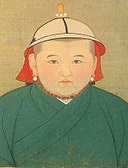
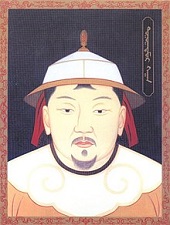
1332 The Black Death (Bubonic Plague), caused by Yersinia pestis starts in India. On July 23 eager for a new Crusade, Pope John XII writes to Venetian Doge Francesco Dandolo, telling him that the injustices they had suffered at the hands of the Turks could be a visitation of divine justice for allowing them too much freedom in their overseas possessions, causing them to agree to assemble a fleet of 20 galleys in Negroponte harbor next Apr. 15 to take them on; meanwhile in Aug. Umur Pasha (the Lion) of Aydin (1309-48), son of emir Mehmed of Lydia (Aydin) attacks Byzantine-held Gallipoli, followed by the N coast of Negroponte and the E shores of the Peloponnesus (Morea), followed by Salamis. On July 20 David II's guardian Earl Thomas Randolph of Moray (b. 1278) dies (poisoned?), and on Aug. 2 Earl Domhnall (Donald) II of Mar (1293-1332) becomes the new guardian (regent), and lasts just over a week; meanwhile Edward de Baliol (Balliol) (1284-1364) invades Scotland, landing in Fife with 2K men and unofficial backing from Edward III, and after many Scots join him he routs Earl Donald of Mar's army on Aug. 12 at the Battle of Dupplin Moor near Perth, killing Earl Donald, then is crowned king of Scotland at Scone on Sept. 24 using the regalia of his daddy John I Balliol, giving Scotland two kings, and beginning the Second War of Scottish Independence (ends 1357); after David II is secured in Dumbarton Castle, new guardian Sir Andrew Murray (de Moray) (Jr.) (1298-1338) of Avoch in Ross (David II's uncle) (son of the Andrew Murray who was KIA in the 1297 Battle of Stirling Bridge) is appointed, but he is captured trying to destroy the bridge over the Tweed River near Roxburgh, and Sir Archibald Douglas (1297-1333) (brother of the late Sir James "Good" Douglas of Braveheart fame), known for a "bludy heart" painted on his chest and shield is appointed guardian; the Bruce magnates regroup and drive Edward Balliol from Scotland in Dec., slaying his only brother Henry Balliol, and Edward flees to the protection of Edward III for a comeback after failing to gain popular Scottish support. On Sept. 2 Yuan emperor #7 (since Oct. 16, 1328) Tugh Temur (b. 1304) dies, and on Dec. 14 his younger brother Rinchibal becomes Yuan Nin Zong (1326-32), Yuan emperor #8, dying prematurely on Dec. 14; next July 19 he is succeeded by Toghon Temur, who becomes Yuan Hui Zong (Sun Di) (Shun Di) (1320-70), Mongol Yuan emperor #9 (last) of China (until 1368), stirring revolt by starting a strong anti-Chinese program after drought, famine, floods, and plague kill 5M in China in 1333, followed in 1334 by the Black Death, which strikes China's NE Hopei Province, then sweeps along the trade routes to Europe by 1347; by 1351 it kills 20M-30M in Europe (a third of Europe's pop., and up to 60% in some areas), and 75M worldwide by 1361; world. pop. decreases from 450M to 350M-375M by 1400; Europe takes 150 years to return to 1347 pop. levels; it ravages China, halving its pop. from 123M in 1200 to 65M in 1400. On Sept. 3 there is a great bullfight in the Roman Coliseum. On Sept. 28 the Battle of Muhldorf sees German King Louis IV defeat Frederick of Austria. Christopher II of Denmark is driven from the throne by Count Gerhard V of Holstein (1277-1323), who parcels out the crown territories, gives German nobles all the main fortresses, and gives German Hansa traders a blank check; Denmark goes into anarchy (until 1340). Verona conquers Brescia. Lucerne joins the growing Swiss League, which adds Zurich in 1351, Glarus in 1352, and Bern in 1353 to give seven cantons in the Swiss confederation. Yusuf I (1318-54) becomes Nasrid caliph #7 of Granada (until 1354); under his rule Granada reaches its zenith. The Knights Hospitallers capture Antiochia ad Cragum on the S coast of Turkey, renaming it Antiochetta (Antiocheta) (in Rufine) (Parva). The English Parliament is divided into two houses, lords and commons, although it takes until the late 15th cent. for the term "House of Commons" to be used, and the reign of Henry VII (16th cent.) for the term "House of Lords" to be used. The jurisdiction of English justices of the peace is expanded to incl. felonies and trespass. A co. of mastersingers is formed in Toulouse, France. Births: Arab Muslim polymath historian and social scientist Abd al-Rahman (Abdul-Rahman) Ibn Khaldun (Khaldoun) (d. 1406) on May 27 in Tunis, Africa; father of demography, cultural history, historiography, philosophy of history, sociology, economics, and the social sciences? Byzantine emperor (1341-76, 1379-90, 1390-91) John V (VI) Palaeologus (Palaiologos) (d. 1391) on June 18 in Didymoteicho; son of Andronicus III (1297-1342). Spanish king of Navarre (1349-87) and French count of Evreux (1343-87) Charles II the Bad (d. 1387) on Oct. 10 in Evreux, France; son of Philip III of Navarre (1306-43) and Joan II of Navarre (1312-49) (daughter of Louis X); husband of Joan of France (1343-73) (daughter of John II); always plotting to trump his family ties and Norman lands (which mommy received in 1328) to occupy the French throne. Swedish Brigittine nun (St.) Catherine of Vadstena (Sweden) (d. 1381) (b. 1331?); daughter of Ulf Gudmarsson, lord of Ulvasa, and St. Bridget (1303-73); feast day: Mar. 24. Chinese "Romance of the Three Kingdoms" novelist Luo Guanzhong (Ben) (d. 1400) in Taiyuan (Hangzhou?) (Jiangnan?). Spanish (Castilian) statesman-historian-poet Don Don Pedro Lopez de Ayala (d. 1407) in Vittoria; of an aristocratic Jewish convert (converso) family; ancestor of Spanish poets Inigo Lopez de Mendoza, Jorge Manrique, and Diego Hurtado de Mendoza; his sister Ines marries into the converso Guzman family, becoming the ancestor of Sir Philip Sidney, Anne Hutchinson, Anne Bradstreet, Robert E. Lee, Oliver Wendell Holmes, Edwin Arlington Robinson, Humphrey Bogart, Tennessee Williams, Chevy Chase, and six U.S. presidents, incl. the Bushes - a nutrient found in breast milk to support brain function? Deaths: Byzantine emperor (1282-1328) Andronicus II Palaeologus (b. 1259) on Feb. 13 in Constantinople. Greek scholar-statesman Theodore Metochites (b. 1270). Chinese Mongol Yuan emperor #7 (1328-32) Tugh Temur (b. 1304).

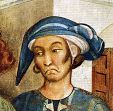
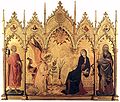
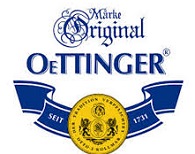
1333 In 1333-7 drought, famine, floods, and plague kill 5M in China incl. 4M in Kiang, laying the ground for Europe's Black Death? On Mar. 2 Wladyslaw I the Elbow-High (b. 1260) dies, and his son Casimir (Kasimir) III (the Great) (1310-70) becomes king of Poland (until Nov. 5, 1370) becoming the only king of Poland to receive and keep the title of "Great". In June a Marinid army led by Abd al-Malik, son of Marinid sultan Abul Hassan retakes Gibraltar from Castile after a 5-mo. siege (until 1462). On July 7 after escaping from Oki Island and raising an army at Fungami Mt. in Hoki Province, Godaigo seizes the Japanese throne in Kyoto from Kogon, forcing the Hojo regents out of power and ending the Kamakura Shogunate along with the Genko War (begun 1331), beginning the Kemmu Restoration (ends 1336), attempting to end the days of the shoguns and rule like an emperor should. On July 19 after Edward Balliol returns with an English army led by tickled pink Edward III, whom he acknowledges as overlord, they defeat David II's Scots led by incompetent Sir Archibald Douglas (who drops Robert the Bruce's proven guerrilla tactics and adopts a conventional English style) at the Battle of Halidon Hill ("the Scottish Cannae"), avenging the 1314 Battle of Bannockburn; the English archers devastate the antiquated Scottish knights (they paid for enough arrows this time?); badass Scottish Knight Templar Adam de Vipont (Blencowe) (1310-67) is captured; 16-y.-o. future Scottish king Robert Stewart leads a div.; on July 22 Balliol's army retakes nearby Berwick-upon-Tweed (held since 1318); Edward Balliol is made to renew his homage to Edward III and grant him all the S shires of Scotland occupied by the English, then ends up increasingly marginalized over the next decade as Edward III turns to France, leaving him to be pushed S from his family lands in Galloway by the down-but-not-out pro-Bruce Scots until he holds only the island fortress of Hestan in the Solway Firth. In Aug. after the promised Crusader fleet at Negroponte fails to materialize, King Robert of Naples writes Pope John XXII, telling him he should earmark all the tithes from Italy for the Crusade, causing the pope to reply on Nov. 19 that he needs French king Philip VI's consent, putting a damper on it. On Dec. 18 a large number of professors at the U. of Paris meet to discuss Pope John XXII's opinion that the saints do not enjoy the complete Beatific Vision (Visio beatifica) until after the Last Judgment, getting so pissed-off that on Dec. 19 Philip IV orders 29 professors to meet in Vincennes to continue the discussion, and they reject the pope's opinion, after which a 2nd assembly does ditto on Jan. 2, 1334, causing the pope to withdraw his opinion on Dec. 3, 1334. After the Germans, led by John of Bohemia, Louis of Hungary, Albert of Austria, and Louis of Brandenburg force the Poles to conclude a truce, the First Polish-German War (begun 1326) ends with a Teutonic V; King John of Bohemia begins a campaign in Italy on behalf of the Guelphs (ends 1335). The first regular shipment of wine from Portugal to England is made. Oettinger Brewery (Brauerei) is founded in Oettingen in Bavaria, Germany, going on to becoming the best-selling brand in Germany in 2004 (5.29M barrels in 2011), keeping prices low by not advertising. Architecture: The town hall (Rathaus) in Aix-la-Chapelle (Aachen), Germany is begun on the ruins of Charlemagne's palace (finished 1370). Art: Italian Sienese painter Simone Martini (1284-1344) finishes The Annunciation for the Siena Cathedral, then moves to Assisi (until 1339), painting the fresco Life of St. Martin for the chapel of St. Martin in the Lower Church. Deaths: Italian antipope (1328-30) Nicholas V (b. 1260) on Oct. 16 in Avignon. Polish king (1320-33) Wladyslaw I the Short (b. 1260) on Mar. 2 in Cracow.



1334 The Black Death strikes in China's NE Hopei Province, then sweeps along the trade routes to Europe by 1347; "Constantinople, summer of 1334. It marched through the streets, the sewers. It left the city by oxcart, by sea to kill half of Europe. The rats, rustling and squealing in the night as they too died... the rats!" - Eyewitness Flint in 1969 Star Trek episode Requiem for Methuselah - could it be a Templar plot to get even? In May David II becomes the 2nd Bruce king of Scotland to be sent into exile, leaving with his family via ship from Dumbarton to Chateau Gaillard in Normandy under protection of Philip VI of France, where he is tutored by the Abbot of Kelso and given military training by Robert Keith the Marischal; Robert Stewart's lands in W Scotland are overrun by Edward Balliol's army, causing him to escape by boat to Dumbarton Castle, where he stays and links up with the Campbells of Lochawe to fight on, becoming the king's lt. (until 1335); meanwhile Sir Andrew Murray Jr. is ransomed, and decides to become Scotland's Fabius Maximus, known for leading an invader around in circles to wear them out, and sieges and captures the Comyn stronghold of Dundarg in Buchan in NE Scotland on Dec. 23, capturing Henry Beaumont and making Edward III pay a large ransom for him. On Sept. 14 (Wed.) the naval Battle of Adramyttium (Edremit) sees the 20 Venetian galleys under Pietro Zeno (-1345) defeat emir Yakhshi of Karasi, reducing Turkish raids in the Aegean Sea, setting things up for the promised new Crusade; too bad, on Dec. 4 Pope (since 1316) John XXII (b. 1249) dies, and on Dec. 20 former Cathar-broiling inquisitor (Cistercian monk and bishop of Pamiers) Jacques Fournier is egg-lected Pope (#196) Benedict XII (-1342), becoming Avignon pope #4, dropping plans for the Crusade, allowing Umur Pasha to resume his attacks next year, starting with Morea, and the Turkish menace on the E Mediterranean blossoms until new pope Clement VI is elected in 1342, with plundering of the Aegean islands and Greek mainland, incl. Crete. The original Schindler's List? On Oct. 9 Polish king Casimir III the Great confirms the privileges grantted to the Jews in 1264 by Boleslaw V the Chaste, enacting protection laws and allowing them to settle in Poland in large numbers as "people of the king". Madurai in Tamil Nadu, S India revolts and sets up the Muslim Madurai Dynasty (until 1378) under Sultan Jalal-ud-Din Ahsan Shah (-1339). Ibn Battuta reaches Delhi, and is given a warm welcome with lavish gifts. Schwechat SE of Vienna, Austria is first mentioned. The Clarenceux (Clarencieux) King of Arms is founded at the College of Arms of London, becoming the senior of two provincial kings of arms, with jurisdiction S of the Trent River. Architecture: Giotto becomes chief architect of the Florentine Cathedral of St. Reparata (Santa Maria del Fiore), and begins the W facade and the detached Campanile. The Cistercian-style Papal Palace (Palais des Papes) in Avignon, France is begun by Pope (1334-42) Benedict XII (finished in 1362); his successor (1342-52) Pope Clement VI adds a Gothic-style New Palace with massive towers and 165-ft. stone walls to show the grate powah of the papacy. Births: Spanish (Castilian) count (1366) and king (1369-79) Don Enrique (Henry) of Trastamara (Trastámara) (Henry II) (the Fratricide) (d. 1379) on Jan. 13 in Seville; illegitimate son of Alfonso XI; half-brother of Pedro I the Cruel (1334-69); mother is partly Jewish descent, but that doesn't stop him from becoming the first noble in Spain to use anti-Semitism as a political tool? Spanish (Castilian) king (1350-66, 1367-9) Peter (Pedro) I (the Cruel) (the Just) (d. 1369) on Aug. 30 in Burgos; son of Alfonso XI; half-brother of Henry II Trastamara (1334-79). Anatolian poet (Muslim) Tajuddin Ibrahim Ahmedi (d. 1413). Deaths: Iranian Safavid Sufi order founder Shaykh Safi al-Din (b. 1253) in Ardabil; his descendants become Shiites, and try to coverup his Sunni origins after the Safavid Dynasty comes to power in Iran in 1501? English chronicler Nicholas Trivet (b. 1257); leaves Annales Sex Regum Angliae qui a Comitibus Andegavensibus Originem Traxerunt, covering the Angevin kings from 1135-1307; also leaves a commentary on St. Augustine's "De Civitate Dei".
1335 A big year for witch burnings in Roman Candle, er, Roman Catholic France; meanwhile the Joachites claim that this is definitely the End of Days (1 + 5 = 6, get it?). They came from farmlands and chicken coops, hoping to star on their own scratch ticket? In Apr. the Scottish parliament meets in Darsie near Cupar in Fife, and fail to heal their differences, but do agree on a scorched earth policy, ordering the Scots in the S to seek refuge in the hills with their livestock and moveable goods; by summer the English control S and C Scotland, and in July Edward III comes with a huge army in hopes of finishing the pesky Bruce supporters off, then leaves after failing to force a battle, after which Edward Balliol departs also, leaving David III of Strathbogie, 11th Earl of Atholl (b. 1309) to mop up the pesky rebels, esp. in the NE, and his shadow is so great that it is said that only children at play admit to being King Davy's men, and the Bruce cause reaches its lowest point; meanwhile in Sept. the Scottish parliament meeting in Dumbarton Castle appoints Sir Andrew Murray Jr. (who was ransomed the previous year) as guardian of Scotland again, and he assembles a loyal army of 1K which incl. Sir William Douglas and William Keith, rekindling memories of William Wallace and Robert I the Bruce; he then goes N to the aid of his fighting wife Lady Christina Bruce (de Brus) (1278-1357), sister of Robert I the Bruce, who is being sieged in Kildrummy Castle in Aberdeenshire by an Anglo-Scottish force of 3K led the Earl of Atholl, causing him to raise the siege and march S to meet him; on Nov. 30 (St. Andrews Day) they meet at the Battle of Culblean near the Dee River, which is a big V for the Scots, becoming the turning point in their Second War of Independence; Strathbogie is KIA, along with Walter Comyn, Thomas Comyn, and Edward Balliol becomes a king without a kingdom; Murray spends the winter trying to reduce the remaining English fortresses, while Edward III disposesses (by 1337) over 100 freeholders in S Scotland to break Bruce's support, while Edward Balliol spends the winter of 1335/6 in England "because he does not yet possess in Scotland any castle or town where he could dwell in safety" (Lanercost Chronicle). On May 2 in Linz HRE Louis IV the Bavarian invests his Hapsburg relatives Duke Albert II of Austria and Duke Otto of Austria with the duchy of Carinthia in S Austria, which is ruled by the Hapsburgs until 1918. On Dec. 1 Persian Mongol Ilkhanid khan (since 1316) Abu Sa'id (b. 1305) dies in Soltaniyeh without an heir or appointed successor, after which the Ilkhanid Dynasty (founded 1256) quickly disintegrates into competing provincial states in Iran, Iraq, and E Anatolia, until Turcoman Timur mops them up in the 1380s-90s: the Muzaffarids in Shirz, the Karts in Herat, the Shiite Sarbvadars in Sabzavar in E Iran, the Dulkadirs on the upper Euphrates, and the Jalayirids in Iraq and Azerbaijan with capital in Baghdad; Eretna of Rum (of Uyghur origin) declares himself sultan of his own Principality of Eretna in NE Anatolia (ends 1381). King John of Bohemia's campaign in Italy (begun 1333) ends unsuccessfully. Bohemia acquires the mixed Polish-German town of Breslau (Wroclau) on the Oder River in Silesia. Verona conquers Parma and Lucca, pissing-off the other Italian dukes of Florence, Siena, Bologna, Perugia and Venice, who form a league against him, getting the Visconti of Milan, the Este of Ferrara, and the Gonzaga of Montua to join next year, plus the papal states, causing Mastino II and Alberto II della Scala to be surrounded and sue for peace (1339). Muslim pirate Umur Pasha of Aydin meets with future Byzantine emperor (1347) John (VI) Cantacuzene and becomes good friends, promising not to attack Byzantine territories but concentrate on Roman Catholic (Latin) (esp. Venetian) ones. Inventions: Just in time to toll the plague deaths, the first public striking clock is installed in the palace chapel of the Visconti in Milan, powered by falling weights and springs - don't ask for whom the bell tolls? Nonfiction: Italian physician Guido da Vigevano (1280-1349) becomes royal physician to Philip VI and Joanna I of Navarre, and expecting him to go on Crusade, composes the 23-folio book Texaurus Regis Francie, with nine folios on how to take care of his health, and 14 folios on hi-tech Medieval military technology, containing sketches sans perspective of his inventions, incl. armored chariots, siege engines, and wind-driven battle wagons (the first automobile?). Richard of Wallingford, Quadripartitum de Sinibus Demonstratis; the first original Latin treatise on trigonometry. Births: Korean Joseon (Choson) Dynasty king #1 (1392-98) Taejo (Yi Seong-gye) (Ni Dan) on Oct. 27 in Hamheung, Hamgyeong; father of Jeongjong (1357-1419). Deaths: Persian Mongol Ilkhanid khan (1316-35) Abu Sa'id (b. 1305) on Dec. 1 in Soltaniyeh.


1336 On Jan. 24 Alfonso IV the Kind (b. 1299) dies, and his son Peter IV (the Ceremonious) (of the Little Dagger) (1319-87) becomes king of Aragon, Valencia, Sardinia, and Corsica, and count of Barcelona (until 1387) - are you thinking what I'm thinking about that little dagger part? On Feb. 25 after being surrounded by the Teutonic Knights, 4K defenders of Pilenai, Lithuania commit suicide. On Feb. 25 Japanese emperor (since Mar. 29, 1318) Godaigo is ousted by shogun Takuji of the Ashikaga family, ending the Kenmu Restoration (begun 1333) and beginning the Muromachi Shogunate (ends 1573), installing a puppet emperor in Kyoto; the Kemmu Restoration (begun 1333) is kaput after three measly years, but its great dream stays alive to bite the shogunate in the ass all the way to the Meiji Restoration of 1868; the Chinese Mandarins attempt to deprive the pesky Japanese barbarians of their swords by adopting a policy of buying and importing all the swords from them they can get, which only causes them to produce more? On Apr. 14 Shogun Ashikaga Takauji (1305-58) arrives in Munakata, the Battle of Tatarahama in Tatarahama on Hakata Bay in Fukuoka is a V for the Ashikaga Shogunate over the Kukuchi Clan of Higo, Kyushu, who are loyal to emperor Daigo, securing the island of Kyushu. On Apr. 18 the Vijayanagara ("city of victory") (Karnata) Empire (Kingdom of Bisnegar) (modern-day Hampi) (ends 1646) is founded on the banks of the Tungabhadra River in the S Deccan Plateau in S India by brothers Harihara and Bukka Raya from Warangal, who defeat the neighboring sultans N of Kistna and Tungabhadra and dominate S India by 1370, becoming a Brahman and Dravidian center, protecting India's S flank from Muslim invasion; temple patronage is expanded beyond the twice-born castes to Shudras, merchants, and women. On Apr. 26 Italian humanist poet Petrarch (Francesco Petrarca) (1304-74), his brother, and two servants climb to the summit of windy 1,912m Mount Ventoux overlooking the Bay of Marseilles, with Petrarch claiming to be inspired by Philip V of Macedon (-238 to -179)'s ascent of Mount Haemo in the Balkans, sitting on top to read St. Augustine's "Confessions", discovering that "nothing is wonderful but the soul, which, when great itself, finds nothing great outside itself", after which "not a syllable fell from my lips until we reached the bottom again", the descent signifying the real start of the Renaissance?; Petrarch becomes the first known Alpinist, one who climbs mountains merely for enjoyment?; a local told him that nobody had ascended it before he did it 50 years earlier, although French priest Jean Buridan (1295-1363) did it a few years earlier, and in the 11th cent. it had been done by St. Anno II (1010-75), archbishop of Cologne. In the summer Edward III invades Scotland again, intending to lay NE Scotland waste to forestall French aid, and burns Aberdeen, causing Robert Stewart to submit to him (until 1341); the construction of New Aberdeen begins shortly afterward; after Edward returns to England, Sir Andrew Murray Jr. emerges from hiding, and goes back to attacking English strongholds during the winter, capturing Dunnotar, Lauriston, and Kinneff, and destroying Gowrie, Angus, and Means; lucky for the Scots, a powerful French noble is banished, and obtains refuge at Edward III's court, where he incites him to attack France. On July 4 the Battle of Minatogawa (Minato River) in Settsu Province in modern-day Kobe is a V for 35K Ashikaga rebels led by Ashikaga Takauji over 17.5k imperial forces loyal to Emperor Godaigo led by Kusinoki Masashige (1294-1336), who is KIA, becoming famous for his loyalty. Count Louis I of Flanders (1304-46) prohibits commercial relations with England, causing Edward III to retaliate by imposing an embargo on wool exports to Flanders as well as the import of Flemish woven goods to England next year, which throws the weavers out of work, causing them to begin the Weaver's Revolt of 1369-71. Dauphine (Dauphiné) is purchased by the French crown, becoming the first important imperial fief added to French territory, with capital at Grenoble, while the royal bureaucracy runs the kingdom as a possession rather than obligation to the increasingly inaccessible king. Mathematics becomes a compulsory subject for a degree at the U. of Paris - have to cipher as good as Jethro Bowdeen? Jeanne de Bar (1295-1361) succeeds her younger brother Edouard de Bar as grandmaster of the Priory of Sion (until 1351) :). Births: Japanese Ashikaga pretender emperor #4 (1352-71) Go-Kogon (Iyahito) (d. 1374) on Apr. 14; 2nd son of Kogon (1313-64). Serbian king (1371-95) Prince Marko Mrnjavcevic (d. 1395); eldest son of Vukasin Mrnjavcevic and Alena. Turco-Mongol conqueror ("Lord of the Fortunate Conjunction") ("Emperor of the Age") ("Conqueror of the World") (Sunni Muslim) Tamerlane (Timur the Lame) (Tamburlaine) (Timur-i Lang) (Timur Lenk) (Timur Leng) (Tamerlano) (d. 1405) (Chaghatay "temur" = iron) on Apr. 9 near Kesh (50 mi. S of Samarkand) in Transoxiana (modern-day Uzbekistan); born into the Turkish-speaking Sunni Muslim Mongol Barlas clan; claims descent from Ali, son-in-law of Muhammad and mythical Mongol queen Alanquoa; husband of Zenocrates; in 1363 he tries to steal sheep but is shot by two arrows from the shepherd, in the right leg and right hand (losing two fingers), crippling him for life; speaks Persian, Mongolian, and Turkish; motto: "Rasti rusti" (Lat. Veritas salus) (Truth is safety); likes to play polo with enemy skulls, erecting 30-ft.-high skull pyramids to celebrate Vs; grandfather of Ulugh Beg (1394-1449); great-great-great-grandfather of Babur (1483-1530). Deaths: Kubrawiyya Sufi order founder Ahmad Simnani (b. 1261). Japanese Yamato emperor #93 (1298-1301) Go-Fushimi (b. 1288) on May 17. Spanish king of Aragon (1327-36) Alfonso IV the Kind (b. 1299) on Jan. 24. English noble Edouard de Bar (b. 1302) off the coast of Cyprus (shipwreck).
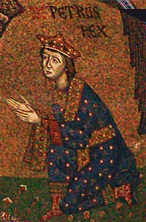


1337 In Feb. Sir Andrew Murray Jr., taking advantage of Edward III's invasion preparations for France, captures Kinclaven Castle near Perth, followed by St. Andrews Castle on Feb. 28, which he captures using his wooden siege tower called Boustour, which he then uses to recapture his own castle in Bothwell in Mar.; he then romps into N England, raiding Cumberland and Northumberland William-Wallace-style; too bad, from this year to 1453 the English began spreading Scotophobia, spreading disdain, fear, and hatred of the Scots, painting them as untamable barbarians. We can't go on together with suspicious minds? On May 24 after Philip VI conquers the larger part of the English possessions in France S of the Loire, and comes to the aid of Scotland against England, causing Edward III late in the year to cease leading Scottish campaigns in person and declare war on France over these issues as well as the problem of French control of Flanders (which has become interdependent with England because of the wool trade), using his dormant claim to the French throne through his mother Isabelle (Philip IV's daughter) as a pretext, even though it had been excluded by the French courts under the Salic Law, the 116-year Hundred Years' War begins (ends Oct. 19, 1453), which is characterized by the frequent use of the chevauchee using small groups of horsemen to pillage enemy territory to draw the enemy into a fight; England allies with the Count of Hainault and Holland (Edward's father-in-law), as well as HRE Louis IV the Bavarian (because Philip VI is the protector of new Avignon pope Benedict XII, and prevented any agreement between them over his investiture); the rebelling weavers of Ghent, led by wealthy Flemish brewer Jacob van Artevelde (the Wise Man) (the Brewer of Ghent) (1290-1345) virtually take over Flanders, causing Artevelde to be made capt.-gen. of the city, then welds the Flemish cities into a federation committed to armed neutrality. On June 25 Frederick III (b. 1272) dies after welding Sicily into a united kingdom, and his son Peter II (1304-42) succeeds as king of Sicily (until Aug. 15, 1342) despite the Peace of Caltabellotta. The Ottomans conquer Nicomedia (Izmit) from the Byzantines and begin spreading through Thrace - where's Spartacus? The Dulkadir (Dhu al-Qadr) Dynasty (Principality) is founded by the Turkoman Dulkadir Dynasty on the upper Euphrates River, with capital at Elbistan, where it acts as a buffer state between the Mamluks and Ottomans (ends 1515). Sultan Mohammed Tughluk of Delhi sends an army of 100K horsemen through Kangra into the Hamalayas in an attempt to conquer Tibet and China, but rains, disease, and hill tribesmen wipe them out. HRE Louis IV the Bavarian bestows the privilege of conquering Lithuania and Russia to the Teutonic Knights after they start by only petitioning for three small territories; he later gives their members immunity from being tried in foreign courts over territorial disputes with their rulers. The hereditary rank of duke is created in England, and Cornwall becomes a duchy for Edward the Black Prince of Wales, who was already created earl of Chester in 1333. Architecture: Giotto (b. 1267) dies, and his student for 24 years Taddeo Gaddi (1300-66) becomes the leading painter in Florence, continuing work on the Campanile, and building the Ponte Vecchio on the Arno River. Science: William Merlee of Oxford, England attempts the first scientific weather forecasts. Births: Scottish Stewart king #2 (1390-1406) Robert III (John Stewart, Earl of Carrick) (d. 1406); eldest son of Robert II (1316-90) and 1st wife Elizabeth Mure (-1355); brother of Robert Stewart, duke of Albany and earl of Fife (1339-1420), and earl Alexander of Buchan and Ross; half-brother (by Robert II's 2nd wife Euphemia Ross) of earl David of Strathearn and Earl Walter of Atholl; great-nephew of David II; husband of Anabella Drummond (1350-1401); father of duke David Stewart of Rothesay (1378-1402) and James I (1394-1437). French "Froissart's Chronicles" traveler-poet and court historian Jean Froissart (d. 1410) in Valenciennes, Hainaut. Deaths: Florentine artist-architect Giotto di Bondone (b. 1267) on Jan. 8 in Florence: "Every painting is a voyage into a sacred harbor"; "The human heart is a frail craft on which we wish to reach the stars." Italian poet-jurist Cino da Pistoia (b. 1270). Spanish king of Sicily (1295-1337) Frederick III (b. 1272) on June 25 in Paterno. Mali king #10 (1312-37) Musa Keita I (b. 1280). Dutch count of Holland and Zeeland (1304-37) William I of Hainaut (b. 1286) on June 7.
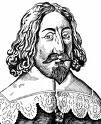


1338 On Jan. 13 the English, led by Edward III's main man William Montagu (de Montacute), 1st Earl of Salisbury (1301-44) siege Dunbar Castle in East Lothian, Scotland, and since its master Patrick Dunbar is away fighting, his manly woman wife "Black" Agnes Randolph, Countess of Dunbar and March (1312-69), daughter of Robert II's nephew Thomas Randolph, earl of Moray takes the stankin' English on with a few guards and servants, uttering the soundbyte: "Of Scotland's king I haud my house. He pays me meat and fee, and I will keep my gude auld house, while my house will keep me"; on June 10 after she has her maids dress in their Sunday best and dust off the battle damage with handkerchiefs to mock him, then rolls a huge boulder onto his siege engines, and rebuffs an attempt to hold her captured brother John Randolph, 3rd Earl of Moray (1306-46) as a threat, they give up, causing a ballad to be composed, with the line "Cam I early, cam I late, there was Agnes at the gate." After Flanders declares neutrality in the Hundred Years' War, Edward III restores commercial relations and signs a commercial treaty. Andrew Murray Jr. dies in his castle in Avoch, and his remains are laid next to Robert I the Bruce in Dunfermline Abbey; Scottish king David II's 8-year-older half-nephew (son of Walter Stewart the Steward and Margaret, daughter of Robert I and his 1st wife Isabella of Mar) Robert Stewart the Steward (1316-90) (later Robert II) becomes David II's guardian (until 1341), going on to recover C and SW Scotland from Edward Balliol while Edward III is overextended in France. Bengal is taken from Delhi by the Balban Dynasty (until 1539). An imperial diet is held in the Kastorkirche in Coblence, and Edward III is HRE Louis IV the Bavarian's guest. The Declaration (Treaty) of Rhense (Rhens) by six electors declares that an election by a majority of electors automatically confers the royal title and rule over the HRE without papal confirmation. Pisa U. in WC Italy is established as a studium generale. Nonfiction: Robert Mannyng (1260-1340), The Story of Inglande; verse chronicle based on "Roman de Brut" by Wace and "Chronicle" by Peter Langtoft (-1307) of England; modifies Middle English by dropping inflections and introducing French words, heading toward the bastard language of modern English. Poetry: Giovanni Boccaccio (1313-75), Il Filostrato (verse tale). Births: French Valois king #3 (1364-80) Charles V (the Wise) (d. 1380) on Jan. 21 in Vincennes, Ile-de-France; son of John II the Good (1319-64) and Bona (Bonne) of Bohemia (Luxemburg) (1315-49); husband of Jeanne de Bourbon (1338-78); father of Charles VI the Well-Beloved/Mad (1368-1422). English lord Thomas de Beauchamp, 12th Earl of Warwick (d. 1401) (pr. "beecham") on Mar. 16; son of Thomas de Beauchamp, 11th earl of Warwick and Katherine Mortimer, daughter of Roger Mortimer, 1st earl of March; knighted in 1355. Swedish king (1364-89) Albert (Albrecht) of Mecklenburg (d. 1412) in Mecklenburg; 2nd son of Albert II of Mecklenburg (1318-79) and Euphemia Eriksdotter (sister of Magnus II of Sweden).


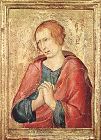
1339 On Sept. 24 Ghibelline Simone (Simon) Boccanegra (It. "black mouth") (-1363) becomes the first doge of Genoa, trying to control the every-family-for-itself republic, starting by excluding the old mercantile patriarchate of the Guelfs and putting his boys in power, the mercantile houses of Adorno, Guardo, Fregoso, and Montaldo; after executing his first intended assassin on Dec. 20, Boccanegra creates a bodyguard of 103 mounted soldiers from Pisa, provided by his brother Niccolo, "captain of the people", made possible by his mother, a Pisan aristocrat; too bad, after being ousted from power in 1345 and regaining it in 1356, they poison him in 1363, and he checks out with a black you know what. Self-proclaimed French king Edward III (1312-77) of England invades and ravages N and E France, sacking Dieppe, but is unable to repay a $7M loan to finance the war, and is brought under a petition of bankruptcy, becoming the first Euro nat. ruler to declare bankruptcy - do the math? David II of Scotland fights against Edward III in Philip VI's army at Buironfesse in Flanders under his own banner. The Scalas of Verona sign a peace mediated by HRE Louis IV, restricting their holdings to Verona and Vicenza, with the remainder split up among the league members, and Verona is no longer a contender - when do Romeo and Juliet come in? Venice conquers Treviso, becoming its first mainland province. David II of Scotland fights in Philip VI's army at Buironfesse in Flanders under his own banner. After fleeing Kashmir from Turkic-Mongol chief Zulju (Dulacha) in 1320, ending the Lohara Dynasty (begun 1003), Suhadeva dies along with his brother Udayanadeva, and after allying with his successor Tibetan Buddhist refugee Rinchana, king of Zulju after converting him to Islam, Shams-ud-Din Shah Mir becomes king of Kashmir (until 1342), founding the Shah Mir Dynasty in Kashmir (ends 1561), immediately hiking taxes to the levels of S Indian kings; Islam goes on to become the dominant religion in Kashmir in this cent. 10-y.-o. John I (1329-40) becomes duke of Lower Bavaria, then dies next Dec. 20, and his duchy passes to HRE Louis IV, who reunites it with Upper Bavaria in Jan. 1341, kicking his Luxembourg mother back to Bohemia. Milan archbishop (since 1317) Aicardus dies, after which Giovanni Visconti triumphantly enters Milan as archbishop, this time to stay - what's your laundry challenge? The U. of Grenoble in France is founded. Art: Simone Martini moves to Avignon (until 1344), where Pope Benedict XII commissions him to paint the Life of St. John the Evangelist series of frescoes in the papal palace and cathedral. Births: French duke of Anjou (1360-84) and king of Naples (1382-4) Louis I of Anjou, Duke of Anjou, Maine and Touraine (d. 1384) on July 23 in the Chateau de Vincennes; 2nd son of John II and Bonne of Bohemia; brother of Charles V, John of Valois, and Philip II the Bold. Austrian Hapsburg archduke (1358-65) Rudolf IV (the Founder) (der Stifter) (d. 1365) on Nov. 1 in Vienna; eldest son of Albert II (1298-1358) and Johanna von Pfirt. French duke of Brittany (1345-99) and 7th earl of Richmond (1372-99) John (Yann) (Jean) V (IV) (of Montfort) (the Conqueror) (d. 1399); son of Duke John IV of Montfort (1295-1345) and Joanna of Flanders (1295-1374). Scottish regent (to Robert II, Robert III, and James I) Robert Stewart, Duke of Albany and Earl of Fife (d. 1420) (b. 1340?) in Dundonald Castle; brother of Robert III (1337-1406); father of Murdoch Stewart, duke of Albany (1362-1425). Deaths: Japanese Yamato emperor #96 (1318-39) Godaigo (b. 1288).
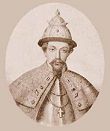
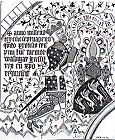
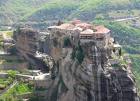
1340 On Mar. 31 grand prince (since 1328) Ivan I (b. 1288) dies, and on Mar. 31 his eldest son Simeon Ivanovich (Gyordi) (the Proud) (1316-53) becomes grand prince of Moscow (until Apr. 27, 1353), claiming the title of prince of all Russia (until 1353), and going on to take on the pesky Lithuanians, using an old treaty with their allies the Mongols to make the Mongol khan give him some Lithuanian POWs to use as hostages. On June 24 after Edward III makes a political alliance with the Flemings, who recognize him as the king of France and overlord of Flanders, causing the French to declare Edward's French fiefs forfeited and siege Guienne and burn Portsmouth (home of the Pomponians), the naval Battle of Sluys (Sluis) (d'Ecluse) on the Scheldt estuary on the coast of Flanders sees Edward III with 150 ships defeat the somewhat larger fleet of Philip VI of France (who made the boo-boo of dismissing two squadrons of mercenary ships from the Levant), and entirely capture or destroy it, gaining complete control of the Channel for England (until 1372), as well as free access to N France; after Edward's army plods around in France awhile without significant success, the countries make a truce; HRE Louis IV and Edward III sign the Alliance of Coblenz,making Edward vicar of the empire and recognizing his title of king of France, turning the Hundred Years' War into a struggle for the English to keep "their" French empire. On Oct. 30 after the Marinids under Abu Hassan defeat the Castilian fleet off Algeciras and land, Alfonso XI of Castile allied with Afonso IV of Portugal defeat the Granadans under Yusuf I and the Marinids at the Battle of Rio Salado in S Spain near Tarifa, becoming the last great Muslim invasion of Spain from Africa. Edward III forces the resignation of his chancellor and former chief advisor Archbishop Stratford, causing the barons to rally to his cause. William O'Kelly (-1375) becomes chieftain of Ui Maine (until 1375) after killing Tadhg Mac Tadhg O'Kelly and Donnough McHugh O'Kelly, whom King Terlagh O'Connor of Connaugh had given the chieftainship to. Waldemar (Valdemar) IV Adderdag (Atterdag) (1320-75), youngest son of Christopher II, who spent most of his childhood and youth in German exile in the court of HRE Louis IV becomes king of Denmark, going on to become one of its top kings, working to break German influence, restrict the power of the nobles and clergy, and reconquer the lands lost by his father. King John I of Bohemia goes blind. Sultan Mohammed Tughluk of Delhi sends emissaries to the caliph in Egypt seeking recognition, which is received in 1344. An Englishman complains that English children "are compelled to leave the use of their own language, a thing which is known in no other country"; after the Black Death kills off French teachers, students begin being taught in their native language of Englsh, causing John of Trevisa to complain that they suffer when they "scholle passe the se and travayle in strange londes." In this decade Florence joins the club, passing anti-homosexual laws. In this decade domestic revolts rock the Tran Dynasty in Vietnam. In this decade in England the knights of the shire and the burgesses begin to separate off into a house of commons, and by this year they meet in the monks' Chapter House in Westminster Abbey. Architecture: About this time Grand Meteoron Monastery in the rocky Meteora ("middle of the sky") wonderland of N Greece on the NW edge of the plain of Thessaly near the Pindus Mts. and Peneios River is built by St. Athanasios of Meteora; five more monasteries later crop up. Births: French nobleman and art patron John of Valois (Berry) (the Magnificent), Duke of Berry and Auvergne, Count of Poitiers and Montpensier (d. 1416) on Nov. 30 in Vincennes; 3rd son of John II and Bonne of Luxembourg; brother of Charles V, Louis I of Anjou, and Philip the Bold (1342-1404). Scottish high chamberlain (1377-82) Sir John Lyon, Thane of Glamis (d. 1382). Azerbaijani Islamic quasi-Sufi Hurifiya (Hurufiyya) mystical numerology sect founder Fadlallah Astarabadi (d. 1394). English nobleman Enguerrand (Ingelram) VII de Coucy, 1st Earl of Bedford (d. 1397); husband (1365-) of Isabella (1332-82), daughter of Edward III. English duke of Lancaster (1361-99), land baron and power broker John of Gaunt (d. 1399) in Ghent; 4th son of Edward III and Philippa of Hainault; brother of Edward, the Black Prince (1330-76); father of Henry Bolingbroke (Henry IV). Scottish regent Robert Stewart, Duke of Albany, Earl of Menteith, Earl of Fife (d. 1420) in Dundonald Castle; son of Robert II (1316-90); father of Murdoch Stewart, duke of Albany (1362-1425); uncle of David Stewart, 1st duke of Rothesay (1378-1402), who with him are the first dukes created in Scotland; husband (1361-) of Margaret Graham, countess of Menteith (1334-80), and (1380-) Muriella Keith; father of John Stewart, 2nd earl of Buchan (1381-1424). Deaths: English poet-chronicler Robert Mannyng (b. 1260). Russian grand duke (1328-40) Ivan I Danilovich Kalita (b. 1288) on Mar. 31 in Moscow.

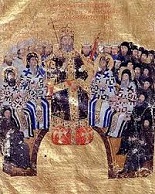
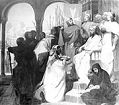


1341 Mars, Jupiter, and Saturn are in conjunction this year, causing French astronomer John (Johannes) (Jehan) de Murs (Muris) (1290-1355) to later tell Pope Clement VI that this is the cause of the Black Plague. On Jan. 14 the Venetian Grand Council finally decides to do something about the Muslim menace in the E Mediterranean, passing taxes to pay for a fleet to defend Crete. On Apr. 30 Breton duke (since 1312) John III the Good (b. 1286) dies childless, starting the War of the Breton Succession (ends 1364) in Brittany, with the French supporting his niece Joanna the Lame of Dreux (Penthievre) (1319-84) and her hubby Charles (the Saint) of Blois (Chatillon) (1319-64), and the English supporting his half-brother (by daddy Arthur II's 2nd wife Yolande de Dreux) John of Montfort (Duke John IV of Brittany) (1295-1345) and his wife Joanna of Flanders (1295-1374). In Apr. Sir William Douglas of Liddesdale (1300-53) recaptures Edinburgh Castle, leaving David II's enemies only Stirling Castle plus some castles on the Scottish-English border, causing David II to return from France, landing on June 2 at Inverbervie on the Kincardineshire coast, spending the next five years trying to consolidate his kingdom and fight uppity nobles. On June 10 an joint church council in Constantinople condemns S Italian humanist theologian Barlaam of Calabria (Seminara) (Bernardo Massari) (1290-1348), a Greek Orthodox champion of Western Aristotelian rationalist ideas and opponent of mystical Hesychasm (meditation, navel-gazing, etc. to partake of God's "energy"), which is popular with the masturbating, er, monks of Mt. Athos; it also condemns theologian (friend of Barlaam) Gregory Akindynos (1300-48), who dies in exile. On June 15 emperor (since 1328) Andronicus III (b. 1297) dies, and his 9-y.-o. son John V Palaeologus (Palaiologos) (1332-91) becomes Byzantine emperor (until Aug. 12, 1376), with his mother Anna of Savoy (1306-65) as regent, and his father's best Gen. John Cantacuzene (Cantacuzenos) (maternal relative of the Palaeologus family) as chancellor, but Anna doesn't trust him, declaring him an enemy of the state, causing him on Oct. 26 to declare himself emperor John VI Cantacuzene (Cantacuzenus) (Cantacuzenos) (1292-1383), and begin the successful 6-year Byzantine Civil War of 1341-47 (Second Palaeologan Civil War) with her, her son, and Patriarch John XIV in Thrace, with Anna allying with the Bulgarians and Cantacuzene with the Serbians and Ottomans, after which in summer 1343 Anna sends an emissary to Pope Clement VI in Avignon to seek help, and in Aug. 1343 he pawns the Byzantine crown jewels to Venice for 30K ducats. Petrarch (1304-74) is crowned poet laureate in the Capitol in Rome; after his father dies, Giovanni Boccaccio leaves his roost in Naples at the court of erudite king Robert the Wise of Anjou, and returns to Florence, where he works as a diplomat and becomes friends with Petrarch; meanwhile Barlaam of Calabria settles in Naples, working for court librarian Paul of Perugia until early 1342 and converting to Roman Catholicism, then moves to Avignon in spring 1342, giving Petrarch lessons in ancient Greek, which are too difficult for him to master, then leaving in late 1342 for a job as bishop of Gerace in Calabria, returning to Avignon for 6 mo. in 1347 to give Petrarch more lessons, which also don't stick. Parliament forces Edward III to restore Archbishop Statford, and passes a statute requiring the king to consult with Parliament before selecting all ministers; within a few mo. he repeals it, but the parity between household officials and courtiers compared to baronial officials is restored; the Statute de Tallagio non Concedendo (Second Statute of 14 Edward III) ("no taxation without representation") requires parliamentary approval for all nonfeudal levies, in accordance with the English medieval principle "to kings belong government, to subjects property", and begins the tradition of Parliament asking for royal redress of grievances by petitioning via billa (bills), which are then turned into statutes after support by the lords and approval by the king. On Aug. 28 Leon IV (b. 1309) is murdered by his barons while holed up in his citadel at Sis hoping for Western aid against the Muslims, and after his younger brother John turns it down, Leon's cousin Guy de Lusignan becomes Constantin (Gosdantin) II of Lesser Armenia (Cicilia) (1344-63), becoming its first Latin king, ending the Hetoumid Dynasty (begun 1226). In late Dec. Gediminas (b. 1275) dies still a pagan, and his middle son Janutis (Jawnuta) ("young man") (1300-1367) becomes grand duke of still-pagan Lithuania (until 1345) after daddy choose the middle of seven sons as a compromise between his other sons, who are pagan and Greek Orthodox? HRE Louis IV the Bavarian comes to terms with Philip VI and deserts Edward III of England after the latter fails to deliver his promised payments and Louis IV wants to try to reach an agreement with Pope Benedict XII over his investiture again. The Portuguese rediscover and claim the Canary Islands, but they are awarded to Castile in 1344 by papal bull. The Queen's College at Oxford U. is founded by Robert de Eglesfield (d'Eglesfield) (1295-1349), chaplain to Edward III's wife Philippa of Hainault; it goes on to build neoclassical campus bldgs. designed by Sir Christopher Wren and Nicholas Hawksmoor. Poetry: Giovanni Boccaccio (1313-75), La Teseide; L'Amorosa Fiammetta (pastoral romance). Xian Zhang, The Iron Cannon Affair; an account of the use of gunpowder cannons in China, which can "pierce the heart or belly when it strikes a man or horse, and can even transfix several persons at once". Births: English lord marshal Henry Percy, 1st Earl of Northumberland, 4th Baron Percy, King of Mann (d. 1408) on Nov. 10 in Alnwick, Northumberland; son of Henry de Percy, 3rd baron Percy and Mary of Lancaster, daughter of Henry, 3rd earl of Lancaster, son of Edmund, earl of Leicester and Lancaster, son of Henry III; father of Harry Hotspur Percy (1364-1403). Norwegian king (1343-80) and Swedish co-king (1362-4) Haakon VI Magnusson (d. 1380); younger son of Magnus Eriksson (1316-74) and Blanche of Namur (1320-63). English duke (founder of the English House of York) Edmund of Langley, 1st Duke of York (d. 1402); 5th son of Edward III (1312-77) and Philippa of Hainault (1311-69). Deaths: Lithuanian grand duke (1316-41) Gediminas (b. 1275) in late Dec. (last week); his pagan burial ceremony features a favorite servant and several German slaves burned on the pyre with his corpse. French duke of Brittany (1312-41) John III the Good (b. 1286) on Apr. 30. Greek Byzantine emperor (1328-41) Andronicus III Palaeologus (b. 1297) on June 15 in Constantinople.







1342 On Apr. 25 Pope (since Dec. 30, 1334) Benedict XII dies in Avignon, leaving 1,117,000 florins for a new Crusade, and on May 7 rich man's son Pierre Roger de Rosiers-d'Egletons (in Correze, Limousin) is elected Pope (#197) (the Black Death Pope) Clement VI (1291-1352) in Avignon (4th Avignon pope), making an avg. income of 118,500 florins a year, soon issuing a bull confirming how-much-this-time Giovanni Visconti as archbishop of Milan, who makes it a 2-for-1 and buys the title of ruler of Milan for 500K florins, sharing it with brother Luchino Visconti (1287-1349); too bad, the new pope squanders his dough on the papal palace in Avignon, the purchase of Avignon from Joanna I of Naples, loans and gifts to the French crown, and luxurious living, with the soundbyte: "My predecessors did not know how to be pope", and "I have lived as a sinner among sinners", but that doesn't stop him from sending a circular letter next Aug. 8 calling for a Crusade, as long as others pay for it, chiding the Hospitalers for their conspicuous luxury, and not too subtly reminding them of the fate of the Templars, and telling everybody to assemble their fleets at Negroponte next Nov. 1 (All Saints Day); another male slut, Plutarch calls Clement VI "an ecclesiastical Dionysius with his obscene and infamous artifices"; after his confessor warns him to give up his dozens of mistresses, Bentadick, er, Clement VI replies that he has been sleeping with whores since his youth and continues on the advice of his physicians? - I reproduce like mice? In June the English fleet relieves the Siege of Hennebont in S Brittany (begun in May) by Charles de Blois-Chatillon, Duke of Brittany (1319-64) (nephew of Philip VI), who is known for placing pebbles in his shoes and wearing knotted ropes next to his skin to mortify his sinful flesh, while inventing the elbow hinge; Joanna of Flanders (1295-1374) is trapped until they liberate the city, causing Charles of Blois to siege Auray; on Sept. 30 William de Bohun, 1st Earl of Northampton (1312-60), constable of England defeats Charles de Blois at the Battle of Morlay; future French superstar Bertrand du Guesclin fights with de Blois' forces and gets some field experience. On July 16 Hungarian king (since 1310) Charles I Robert (b. 1288) dies, and his 16-y.-o. son Louis (Lajos) I (the Great) (1326-82) becomes king of Hungary (until 1382), becoming a patron of learning, with his court at Buda (named after Hun ruler Bleda AKA Buda) - pass the goulash and the porn? Humanism must be around the corner when marriage is separated from the Church by the Ugly Duchess of Wonderland? Mongol Golden Horde khan (since 1313) Uzbeg Khan (b. 1282) dies, and his son Jani Beg (-1357) kills his two brothers and becomes khan of the Golden Horde (until 1357). Fine-looking babe Margarete Maultasch (Bag Mouth) (the Ugly Duchess) of Tirol (1318-69) dumps her first hubby (since 1330) John Henry of Bohemia (1322-75) (brother of HRE Charles IV) for HRE Louis IV the Bavarian's eldest son Louis V the Brandenburger of Bavaria, Margrave of Brandenburg (1315-61), marrying him without being granted a divorce to John Henry first, relying on Louis IV to annul the marriage instead, and his court philosophers William of Ockham and Marsilius of Padua to defend the first "civil marriage" in the Middle Ages, but new pope Clement VI doesn't buy it, and excommunicates them both, causing her to be called ugly and a lot worse by the jealous celibate clergy, while Louis V acquires Tyrol (Tirol) and Carinthia through his new marriage; in 1358 Pope Innocent VI absolves them; too bad, the ecclesiastical propaganda works through the ages, causing her to be portrayed as more and more ugly, until she becomes the subject of the 1816 novel "The Ugly Duchess" by Lion Feuchtwanger, and the Duchess in Lewis Carroll's "Alice's Adventures in Wonderland". After he captures Roxburgh Castle from the English, military hero and royal favorite Sir Alexander Ramsay of Dalhousie (-1342) is murdered by Sir William Douglas of Liddesdale by starvation in the dungeon of Hermitage Castle in order to gain his new offices of royal keeper (constable) of Roxburgh Castle and sheriff of Teviotdale, which pisses-off David II, although he gives him the appointments and later uses it against him; Alexander's brother Sir William Ramsay of Inverleth succeeds him as lord of Dalhousie Castle. Castilian princess Ines de Castro goes to Portugal as lady-in-waiting to the future wife of future king Pedro of Portugal, and he falls in love with her and she becomes his mistress without his daddy knowing. Ibn Battuta leaves Delhi on a mission to China. Pope Clement VI issues the bull Gratiam Agimus, making the Franciscans the official custodians of the Holy Places in the name of the Church; William of Ockham becomes gen. of the Franciscans; the office of Latin patriarch of Jerusalem is established, becoming head of the Order of the Holy Sepulchre (until 1489); in 1374 the office is moved to the Basilica di San Lorenzo Fuori le Mura in Rome. Nonfiction: Levi ben Gerson (Gersonides) (1288-1344), De Sinibus, Chordis et Arcubis (Concerning Sines, Chords and Arcs); treatise on trigonometry. Births: French Valois duke of Burgundy (1363-1404) (founder of the 2nd ducal house of Burgundy) Philip II the Bold (le Hardi) (d. 1404) on Jan. 15 in Pontoise; 4th son of John II the Good (1319-64) and Bona of Bohemia (Bonne of Luxembourg) (1315-49); brother of Jean de France, duc de Berry; father of John the Fearless (1371-1419). Austrian duchess consort Katharine (Catherine) of Bohemia (d. 1395) on Aug. 19; 2nd daughter of HRE Charles IV (1316-78) and 1st wife Blanche of Valois; wife (1350-65) of Duke Rudolf IV of Austria (1339-65), and (1366-) Duke Otto V of Bavaria (1346-79). English Marcher Lord Henry Percy, 1st Earl of Northumberland (d. 1408) on Nov. 10 in Alnwick, Northumberland; son of the 3rd Lord Percy; father of Sir Henry "Hotspur" Percy (1364-1403); the title of Earl of Northumberland comes with the job of Warden of the Marches (Marcher Lord), a powerful position with a private army to defend England against the pesky Scots (no more Sir William Wallaces, please?). Christian mystic Juliana (Julian) of Norwich (d. 1418). Deaths: Italian theologian Michael of Cesena (b. 1270) on Nov. 29 in Munich; expelled from the Franciscan order in 1331; officially rehabilitated in 1359. Hungarian king (1310-42) Charles I (b. 1288) on July 16 in Visegrad. Sicilian king (1337-42) Peter II (b. 1337) on Aug. 8 in Calascibetta

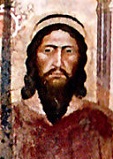

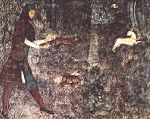
1343 The Venetian Peruzzi and Bardi Family Banks collapse this year and next, destroying the Euro economy; the greedy bankers of Venice, not the Black Death are what ultimately causes the great (35%-50%) pop. decrease in Europe from 1340-1440? On Jan. 19 the Truce of Malestroit, negotiated by cardinals from Avignon is signed by Philip VI and Edward III in Madeleine Chapel in Malestroit in Brittany on the Oust River; it is supposed to last until Sept. 1346. On Jan. 27 Pope Clement VI issues the bull Unigenitus, justifying the power of the pope and the use of indulgences. On Apr. 23 (night) (St. George's Night) St. George's Night Uprising sees the native pop. of Estonia rise against their Danish and German rulers, beginning the Estonian Revolt, one of the biggest working class uprisings of the Middle Ages (ends 1346). On June 22 count (since 1329) Aymon the Peaceful (b. 1291) dies, and his son Amadeus VI the Green Count (1334-83) becomes count of Savoy (until 1383). On July 8 after the Teutonic Order defeats the Poles, the Peace (Treaty) of Kalisz recognizes German claims to Pomerelia, despite papal support of Polish claims, in return for a promise of aid against the pesky pagan Lithuanians; Poland is cut off from the Baltic. On Sept. 3 the U.of Pisa is founded in Pisa, Italy by the bull In Supremae Dignitatis by Pope (1342-52) Clement VI (1291-1352). On Nov. 1 the Crusader fleet run by the Knights of St. John assembles in Negroponte as Pope Clement VI requested, and he manages to scrounge up funds to back them despite the bank collapse; too bad, in Nov. a tsunami cashiers the quays of the once major maritime city of Amalfi on the Gulf of Salerno 20 mi. SE of Naples, whose maritime laws once prevailed throughout Italy, and it goes kaput commercially, not to mention what the plague does to it. Jani Beg leads a massive Crimean Tartar force that attacks the port city of Kaffa (ends Feb. 1344). The Hoysala Empire in S India in modern-day Karnataka (founded 1026) ends, and the Hindu kingdom of Vijayanagara (Karnata) (Bisnegar) (ends 1646) is founded in the Krishna Valley of S Deccan, India, with capital city at Vijayanagara (modern-day Hampi), going on to spread throughout S India and Ceylon. I don't get the joke - it's not a joke it's a product? Edward III's eldest son Edward of Woodstock, later known as Edward the Black Prince (1330-76) is named Prince of Wales, just like he had once been by his daddy Edward II, who had been done ditto by his daddy Edward I; from now on the title indicates the eldest son and heir of the English king. The 52 commununes of Briancon in France receive a charter of liberties. Nonfiction: Jean de Meurs, Quadripartitum Numerorum (Four-fold Division of Numbers); treatise on mathematics, mechanics and music. Art: Sienese painter Matteo Giovanetti paints frescoes for the papal bedroom in Avignon, incl. Man With Ferret. Poetry: Juan Ruiz (1283-1350), El Libro de Buen Amor; satirical autobio. in poetic form; expanded ed. of 1330 version - never too early for Latin lovers? Births: English "The Canterbury Tales" poet-writer-translator-diplomat-courtier (founder of the written English language) Geoffrey Chaucer (Fr. "chausseur" = shoemaker) (d. 1400) in London; son of a London burgher vintner. Deaths: French political theorist Marsilius of Padua (b. 1270). Savoy count (1329-43) Aymon the Peaceful (b. 1291) on June 22 in Montmelian. French king of Navarre (1328-43) Philip III (b. 1306) on Sept. 16. French king of Naples (1309-43) Robert the Wise of Anjou (b. 1277) on Jan. 20.
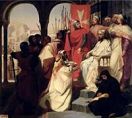
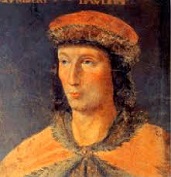

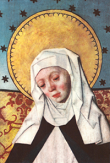
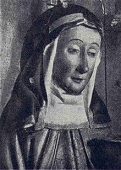
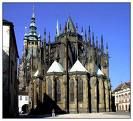
1344 In Feb. the Tartar siege of Kaffa is lifted by an Italian relief force, with 15K Mongols killed; Jani Beg returns next year, but the Black Plague breaks out among his troops, ending the siege. On Apr. 17 Constantin II is murdered in an uprising, and his distant cousin (nephew of Hethum I) Constantin (Gosdantin) III (-1362) usurps the throne, succeeding him as Lusignan king #2 of Lesser Armenia (Cilicia), and ordering his predecessor's nephews murdered, which causes them to flee to Cyprus. On May 13 (Ascension Day) the 24-galley Latin Crusader fleet sinks 52 Turkish ships and burns 60 more, which the Turks abandon at Longus on Pallene in the Chalcidic Peninsula, causing Pope Clement VI to write a letter on Aug. 12 thanking Venetian Doge Andrea Dandolo; meanwhile on Oct. 28 (Feast of St. Jude and St. Simon) the Crusaders surprise-attack and capture the port of Smyrna (Izmir) (until 1402), and drive out pesky Umur Ghazi (the Lion) (Pasha) (1309-48), although they only capture the harbor and waterfront fortress, leaving the Muslims entrenched in hilltop fortifications, with a ghost town in between, beginning the Smyrniote Crusade (ends 1351), led by Roman Catholic patriarch of Constantinople (1339-45) Henry of Asti (-1345). Philip VI invests his son Philip of Valois (1336-76) with the newly-created Dukedom of Orleans (Orléans). Haakon VI Magnusson (1340-80), youngest son of Magnus II (Smek) is elected king of Norway (until 1380), while daddy stays king of Sweden. Alfonso XI of Castile and Leon captures the port city of Algeciras from the Granadan Moors, who use cannon to defend themselves, causing the earls of Derby and Salisbury to take the knowledge back to England, while white Spanish kings begin hiring the nig, er, Moors to teach them about the new hi-tech secret veapons. Amda Seyon I dies, and his eldest son Newaya Krestos ("vessel of Christ") (-1372) becomes Solomonic emperor of Ethiopia (until 1372), going on to promise monastic leader Abuna Yaqob that he will become monogamous, then reneging and marrying three women, exiling him and his monks to Egypt and S Ethiopia. Sultan Mohammed Tughluk of Delhi orders his tax collectors (centurions) executed for failing to meet quotas, causing them to revolt in Gujarat in the S and take it over by next year. The informal Hanseatic League is first mentioned in documents; normally it uses the seal of Lubeck on documents. After getting married at age 14 to Ulf Gudmarson, having eight children, incl. St. Catherine of Sweden, and making a pilgrimage to the St. James of Compostella Shrine in Spain, noble Swedish woman (mgr. of the royal household) (St.) Bridget (Birgitta Birgersdotter)) (1303-73) becomes a nun, and in 1350 she founds the Augustinian nunnery of Vadstena in E Gothland, whose members (nuns and monks) become known as Brigittines (Bridgettines) (Order of St. Saviour), known for promoting lit. culture and translating religious writings; they are approved in 1370 by Pope Urban V; Birgitta's successor is her daughter (St.) Catherine of Vadstena (1332-81). Architecture: St. Vitus' Cathedral in Prague is begun by Matthew (Matthias) of Arras (1290-1352) (finished 1929). Matteo Giovanetti paints frescoes for the banqueting hall of the Chapel of St. Martial in the papal palace of Avignon (1344-5), where papal elections are held. Deaths: French Jewish philosopher Gersonides (b. 1288) in Perpignan; leaves De Numeris Harmonicis (Concerning the Harmony of Numbers), a commentary on the first five books of Euclid. Ethiopian emperor (1314-44) Amda Seyon I. English knight William Montague, 1st earl of Salisbury (b. 1301) on Jan. 30 in Windsor, Berkshire.



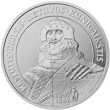


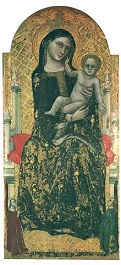
1345 On Jan. 17 (St. Anthony's Day) Umur Pasha's men sneak down and massacre Crusaders holding Mass in an abandoned Christian church in Smyrna, which the Muslims had converted to a stable, killing Venetian cmdr. Pietro Zeno, Henri Asti and the other leaders; the news pisses-off Pope Clement VI, who uses it to drum up more money and men to send to their aid, while trying to keep France and England from messing it up with their war; he recruits Humbert II of Viennois (de la Tour-du-Pin) (1312-55) to be the new leader, with new aid from Venice, and he leaves Marseille in May and arrives in Negroponte around Christmas. In Jan. the French parliament decides in favor of Charles de Blois in the matter of the succession of Limoges. Edward III begins a serious attempt to regain his possessions in S France (Gascony), planning a 3-pronged attack, with the earl of Northampton attacking from Brittany, up-and-coming Henry of Grosmont, 4th Earl of Lancaster (1310-61) (Edward II's 2nd cousin) (son of Henry Plantagenet, 3rd earl of Lancaster, who had gone blind in the 1330s, and who dies on Mar. 25, leaving him the richest man in England as well as the title of earl; he is promoted to duke in 1351) from Aquitaine, and Edward III from Flanders; on Oct. 21 Grosmont achieves a big V against the Comte d'Isle at the Battle of Auberoche, and gets £50K ransom for the POWs; meanwhile rumors that Jacob van Artevelde (b. 1290) is about to recognize Edward III's son as count of Flanders causes a popular uprising in Ghent, and on July 24 he is killed by a mob. After they return from military campaigns in Ruthenia, Jaunutis is deposed by his pagan elder brothers Olgerd (Algirdas) (1296-1377) and Kestutis (1297-1382), and Olgerd (Algirdas) becomes grand duke (until 1377), with Kestutis defending the pesky W border, working together to extend their duchy from the Baltic Sea to the Black Sea, reaching within 50 mi. of Moscow after unsuccessfully sieging it. The kingdoms of Catalonia-Aragon and Rousillon-Mallorca are reunited. The city of Manama (Arab. "place of rest/dreams") in N Bahrain Island on the Persian Gulf (modern-day pop. 157K/411K) is first mentioned. HRE Louis IV confers Hainaut (in NW Germany), Holland, Zeeland, and Friesland on his wife empress (since 1328) Margaret II of Avesnes (Margaret I of Holland) (Margaret II, Countess of Hainaut) (1311-56), causing the Bavarian Wittelsbachs to begin ruling there (until 1432). The Ottomans absorb the Turkoman principality of Karasi, bringing them to the S shores of the Dardanelles, then cross into Europe at the request of John Cantacuzene, helping him take towns along the Black Sea, and form an alliance by giving his daughter Theodora in marriage to Orkhan I; from now on the Ottomans freely cross the Bosporus Straits. The Muslims destroy Jaffa to prevent its possible capture and use by Crusaders, and it takes until the early 18th cent. to be used as a seaport again. Architecture: Notre Dame Cathedral in Paris (begun 1163) is finished. Art: Vitale da Bologna (1289-1369), Madonna dei Denti (Madonna of the Teeth). Nonfiction: Guida da Vigevano (1280-1349), Anatomia Designata per Figures; incl. 24 anatomical plates, becoming the first neuroatonomical descriptions and drawings in scientific history. Births: Korean Goryeo king #34 (last) (1389-92) Gongyang (d. 1394) on Mar. 9. Portuguese king #9 (1367-83) Ferdinand (Fernando) I (the Handsome) (the Inconstant) (d. 1383) on Oct. 31 in Coimbra; eldest son of Pedro I (1320-67) and Constanza Manuel of Castile; gets the nickname Inconstant when he jilts the daughter of the king of Castile for the more desirable Portuguese noblewoman Leonor Teles de Meneses (1350-1405) - after all, he's so handsome he can play The Bachelor? English noblewoman Blanche of Lancaster, Countess of Derby (d. 1369) on Mar. 25; youngest daughter of Henry of Grosmont, 1st duke of Lancaster (1310-61) and Isabel de Beaumont; 1st wife of John of Gaunt (1340-99); mother of Henry IV (1367-1413). Bohemian priest (St.) John of Nepomuk (John Nepomucene) (d. 1393) in Nepomuk; educated at the U. of Prague, and U. of Padua. Scottish explorer Henry Sinclair, Earl of Orkney (d. 1401). Deaths: Italian Roman Catholic priest St. Peregrine Lziosi (b. 1260) on May 1; canonized Dec. 27, 1726 by Pope Benedict XIII; dies with a cancerous sore in one leg, causing him to become the patron saint of people suffering from cancer, AIDS, etc. English knight Sir Geoffrey Luttrell (b. 1276) on May 23 in Lincolnshire; dies after commissioning the illuminated Luttrell (Louterell) Psalter, showing contemporary country life. Italian painter Simone Martini (b. 1284). Flemish leader Jacob van Artevelde (b. 1290) on July 24 in Ghent (killed by a mob). French duke of Brittany (1341-5) John IV of Montfort (b. 1295) on Sept. 16 in Chateau d'Hennebon.

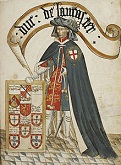
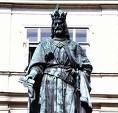
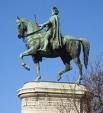

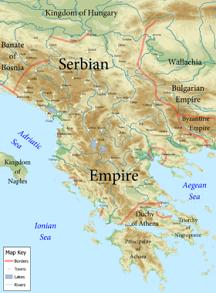
1346 On Mar. 18 the French prepare to defend their English Channel coasts. In spring a severe epidemic of plague begins in the Crimea, depopulating several Mongol towns by Nov., and forcing the Golden Horde to withdraw from the siege of Kaffa (Feodosia) (Theodosia) next year, after which Europeans fighting with the Tartars return to Europe, carrying the plague with them, while others carry the plague to Constantinople and ARabia. On Apr. 1 the French led by Duke John of Normandy begin the Siege of Aiguillon in Gascony, defended by Earl Henry of Grosmont, 4th Earl of Lancaster and Leicester, 1st Earl of Derby (1310-61) (wealthiest and most powerful peer in England), tying up the main French army; on Aug. 20 after a dysentery epidemic in their camp the French withdraw. In May an English invasion fleet begins assembling in Portsmouth. On Apr. 16 Serbian king (since Sept. 8, 1331) Stephen (Stefan) Uros IV Dushan "the Mighty" (1308-55) crowns himself "tsar and autocrat of the Serbs, Greeks, Bulgarians, and Albanians" in Skopje (until Dec. 20, 1355), establishing the Serbian Empire, becoming the first of two Serbian emperors along with his son Stefan Uros V "the Weak"; Serbia is now at its peak, but his son Stephen Uros V loses most of the territory he gains, and the empire breaks up with his 1371 death, although some of his successors in parts of Serbia claim the title of emperor until 1402. In May an English invasion fleet begins assembling in Portsmouth. On June 8 the 26-galley papal fleet of Humbert II of Viennois is attacked by the 29-galley fleet of Genoese adm. Simone Vignosso near Rhodes to prevent them from capturing Chios, which they want for themselves, and which they take after a 3-mo. siege on Sept. 12, after which they occupy Old and New Phocaea on the coast of Anatolia by Sept. 20, restoring Genoese commerce in the Levant; meanwhile Humber's fleet proceeds to Smyrna, arriving in late June; too bad, despite as many as 15K Crusaders massing there, the heat causes them to become ill and die like cattle, and famine sets in, so he ends up leaving and wintering at Rhodes, writing the pope that they should seek a truce, which he agrees to, although Humbert ends up returning home instead when he receives news of his wife's death in 1347; too bad, the Venetians at Smyrna are not ready to give up. On June 9 the Battle of St. Pol de Leon (Léon) sees the 180-man English army under Sir Thomas Dagworth (1276-1350) defeat the 1K-man army of Charles of Blois in Brittany, becoming a turning point for the Montfortists and their English allies in Brittany. On June 20 the Battle of La Roche-Derrien in Brittany is a small English V. On June 24 the leaders of Ghent, Bruges, and Ypres agree to support Edward III in an invasion. On July 3-7 the 1.6K-ship English fleet sails from Portsmouth to Normany, but is forced back by strong winds, after which Edward III orders the closing ports to prevent intel leaks to the French, who are planning their own invasion of England with 14K soldiers under Jean le Franc, but are forced onto the defensive by the English invasion. On July 11 after appointing Queen Philippa as regent of England in his absence, Edward III and his 16-y.-o. son-heir Prince Edward of Woodstock (1330-76) (later the Black Prince) set sail for Normandy with a 15K-man army, arriving on July 12 at Saint-Vaast-la-Hogue 20 mi. from Cherbourg, taking the French by surprise, raiding and burning towns and villages in the Contentin Peninsula incl. Carentan, Saint-Lo, and Torteval until July 18, while the English fleet shadows them, capturing or burning 100+ French ships, and converting 61 into military vessels while looting the countryside for up to 5 mi. inland, causing some ships to fill their holds and return home; the English force incl. at least one Norman baron unhappy with Philip VI's rule. On July 26 the Battle (Siege) of Caen is a V for the 12K-15K-man English army of Edward III over a garrison of 1K-1.5K soldiers and a large number of armed townsmen, who fall in the first assault, losing 5K KIA plus a few nobles taken POW, after which the English sack the town for five days before burning it. On Aug. 1 the English army marches toward the Seine River; on Aug. 2 another small English force invades France from Flanders. On Aug. 24 after the French garrison all the bridges and fords over the Somme River and chase the English army, who find the land stripped of food supplies, trapping them, the Battle of Blanchetaque 10 mi. from the English Channel and just S of Crecy sees a French force under Godemar I du Fay (-1350) attempt to prevent the English from fording the Somme River, ending up fleeing, allowing the English to head N. On Aug. 26 after following the Seine River to within 20 mi. Paris, then heading for Flanders, ending up intercepted and trapped at the Somme, discovering a ford just in time and digging-in on some hills near Crecy (where the horsemen dismount), the Battle of Crecy (Crécy) S of Calais and NW of Amiens is a V for Edward III's 10K-man force (which is 0-1 after Sluys) over Philip VI and his 20K undisciplined cavalry and mercenary crossbowmen; blind King John of Bohemia (b. 1296) is KIA; Prince Edward, in command of the right wing of the English army wins his spurs; gunpowder artillery is used for the first time in Europe?; the first time that the English longbow (made possible by the amazing elasticity of yew wood) triumphs over the (Genoese) crossbow, marking the first joint participation of yeomen and aristocrats in war, made possible by their experiences in Wales and Scotland; as a consequence of this battle, knights begin to put heavy plates over their chain mail, and by the end of the cent. they wear complete armor-plated suits - are you crecy? On Aug. 26 blind Bohemian king John of Luxembourg (b. 1296) is KIA at the Battle of Crecy, and his eldest son Count Charles IV of Luxembourg (1316-78) becomes duke of Luxembourg and king of Bohemia (until Nov. 29, 1378); meanwhile with the help of Pope Clement VI he is elected on July 11 as antiking of the Romans to HRE Louis IV, who is deposed, then crowned on July 25; Edward the Black Prince honors John of Luxembourg by adopting his arms and motto "Ich Dien" (I Serve); meanwhile when the citizens of the Alsatian city of Hagenau (16 mi. N of Strasbourg) (S of the Forest of Hagenau, largest undivided forest in France) refuse to submit to him and pay war debts, Johann (John) II of Lichtenberg (1273-1366) confiscates the houses and synagogues of the wealthy Jews, causing the pop. to plunder them also and then banish them, but they are soon readmitted after agreeing to pay the city's war debts, after which by the end of the decade Jewish persecutions in France cause many Jews to flee there - making it the Palm Springs of Europe? That holy oil must have been defective? On Sept. 4 Edward III sieges Calais, while Duke Henry of Grosmont captures Poitiers; meanwhile in Oct. at the request of Philip VI, David II of Scotland and his barons invade N England with 12K men, and after a leisurely progress to show how boss they are, they are surprised and defeated on Oct. 17 by 8K English under Ralph de Neville, 2nd Baron Neville de Raby (1291-1367) and the Aachbishop of York in the Battle of Neville's Cross; Robert Stewart, Earl Patrick Dunbar of March, and the earl of Ross desert after the first two Scottish divs. are attacked, becoming the only time that Robert Stewart crosses the border into England; 63-y.-o. old fart Edward de Balliol leads 80 men into battle for the English, his kingship claim a joke by now?; David II is wounded in the head by arrows twice, then captured by John de Coupland, Lord of Raby, and almost all of his key supporters are captured or KIA, incl. Sir John Sinclair of Herdmanston, and Sir William Douglas of Liddesdale, who is released after swearing allegiance to Edward III; David is kept prisoner in the Tower of London (until 1357); the holy black snake charm, er, Holy Black Rood (brought to Scotland by Queen Margaret in 1070) is captured by the English and kept at Durham Cathedral until the 16th cent.; for the next two cents. the English have to guard against Scottish invasion whenever they battle France. On Sept. 12-Oct. 31 after the French siege of Aiguillon is lifted, Earl Henry of Lancaster's Chevauchee (Chevauchée) (Fr. "horse charge") overruns large parts of SW France incl. Quercy, Bazadais, Poitiers (Oct. 4), Saintonge, Aunis, and Poitou, penetrated 50 mi. beyond the borders of Gascony. On Sept. 24 the English siege Calais. On Oct. 17 after the French call on the Scots to fulfill their obligations under the Auld Alliance and invade England, the Battle of Neville's Cross W of Durham, England is a V for 6K-7K English under Ralph Neville, 2nd Baron Neville of Raby (1291-1367) over 12K pesky Scots under David II, who make their last stand on a hill under an Anglo-Saxon stone cross, after which Neville pays for a new cross to celebrate; most of the Scottish leaders are KIA or captured; David II is made a POW; the V frees the English to concentrate on France; while he is being held for ransom, David II of Scotland asks the Scottish parliament to recognize his infant nephew John de Moravia, Master of Sutherland (1346-61), son of William de Moravia, 5th Earl of Sutherland as his heir presumptive ahead of his older nephew Robert Stewart. On Nov. 1 the Teutonic Knights invade Estonia, ending the Estonian Revolt (begun 1343); Denmark sells N (Danish) Estonia to the Teutonic Knights for 19K marks, after which the king asks the pope for forgiveness for breaking Christopher II's 1329 promise to never do it. Valdemar IV Adderdag of Denmark regains Zeeland, and sells what's left of Estonia to the Teutonic Order. The Tatars catapult plague-infected corpses into an Italian trade settlement in the Crimea. The city of Parma falls under the control of Milan. The estates of , led by provost of the merchants Etienne Marcel (102-358), richest man in Paris refuses war levies by the French crown, and demands reforms, which the king lamely attempts? Births: French poet Eustache Deschamps (AKA Morel) (d. 1405) in Vertus, Champagne. Deaths: Bohemian king (1311-46) John of Luxembourg (b. 1296) on Aug. 26 in Crecy, France (KIA).



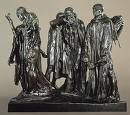
1347 On Feb. 3 Hesychast book lover and able gen. John VI Cantacuzene reenters Constantinople as emperor, appointing anti-Hesychast scholar Demetrius Cydones (Cydonius) (Demetrios Kydones) (1324-98) as his chancellor, and deciding to try to reconcile the Greek and Latin churches, preparing a golden bull signed in cinnabar ink "giving our lord the pope his proper title and recognizing the primacy and universality of the Roman Church", and requesting a joint synod in Constantinople, Negroponte, or Rhodes to discuss union, also promising to personally lead a rescue army to Smyrna; John VI Cantacuzene is accepted by John V Palaeologus as senior co-emperor (until 1355); too bad, to win he allies himself with the Ottoman Turks, becoming the dork who is responsible for giving them a foothold in Europe, making an Ottoman V over Constantinople unstoppable even if they could have obtained Western military aid. In Apr.-Dec. Tribune of the People Cola di Rienze rules Rome. In the spring the Latin Crusaders finally score a V and capture 118 Turkish ships at Imbros (Imroz) Island (modern-day Gokceada). On July 1 Albert (Albrecht) II (the Fox) (the Vulture) of Mecklenburg (1318-79), husband of Eric of Sweden's daughter Euphemia (whose mother is Haakon V of Norway's daughter Ingeborg) becomes the first duke of Mecklenburg on the shore of the Baltic Sea in N Germany based in Schwerin, and plots to put his 2nd son Eric on the Swedish throne; the House of Mecklenburg goes on to rule until 1918. In Aug. starved Calais capitulates to the English after an 11 mo. siege in which artillery is used, and after English queen Philippa of Hainault intervenes and persuades her hubby to spare them for the mojo of her unborn child, Edward III offers to spare the people of the city if six of its leaders will walk out naked (shirt only?) wearing nooses around their necks while carrying the keys to the city and castle, causing Eustache de Saint Pierre and five other burghers to comply; in 1884 the mayor of Calais commissions Auguste Rodin to make the statue The Burghers of Calais (Les Bourgeois de Calais) commemorating this event (finished in 1889), but he shows them clothed; military turkey Philip 666, er, VI (0-3 after Sluys, Crecy, and Calais) signs a truce designed to last until Apr. 1351, with the English giving back their original motherland of Normandy (until 1415), but holding onto Calais of the former county of Artois for the next two cents. (until 1558), controlling both sides of the Channel at its narrowest part; the English Vs in Gascony are secured until 1355; Prince Edward sets his sights on Bordeaux; Edward III goes on to build the Hotel de Guise in Calais; meanwhile Philip VI is flat broke, and debases the coinage, borrows heavily, levies more extreme taxes, incl. the hated gabelle (salt tax), and just when it looks like it can't get any worse, guess what, here comes the Purple People Eater? On Oct. 11 HRE (since 1328) Louis IV the Bavarian (b. 1282) dies during a bear hunt, and on June 17, 1349 Charles IV of Luxembourg (1316-78) is unanimously elected king of the Romans (until Nov. 29, 1378), and crowned on Nov. 26, 1349 in Bonn. The Black Death (the original Darth Vader) rockets through Europe's Internet with breathtaking speed? In Oct. a Genoese trading fleet arrives in Messina, Sicily carrying the Black Death (Bubonic Plague), caused by Yersinia pestis bacteria carried by fleas from rats; really viral hemorrhagic fever from Ethiopia?; not rats but gerbils?; it also arrives in Egypt, Syria, and Cyprus; by 1351 it kills 20M-30M in Europe (a third of Europe's pop., and up to 60% in some areas), and 75M worldwide by 1361; world. pop. decreases from 450M to 350M-375M by 1400; Europe takes 150 years to return to 1347 pop. levels; it ravages China, halving its pop. from 123M in 1200 to 65M in 1400; lucky America is not affected, but not toughened up by it either?; rats didn't really spread it, because it spreads so fast from person to person?; French Franciscan Order minister-gen. (since 1329) Gerard Odon (Geraldus or Gerardus Odonis) (Guiral Ot) (1285-1349) is asked by the pop. of Messina to retrieve the relics of St. Agatha from Catania, and when they refuse he dips them in holy water and takes instead, dying of the plague on his return trip. Louis I of Hungary campaigns in Italy to avenge the murder of his brother Andrew and solidify the position of his house in Naples. A revolt against Sultan Mohammed Tughluk of Deli in Gulbarga, Daulatabad, Berar and Bidar in the Muslim areas of the Deccan elects Bahman Shah (-1348) as the Muslim first ruler of the Bahmani Sultanate (ends 1527), with capital at Gulbarga (Kalaburagi), which eventually begins building fortresses using Euro scientists. Robert Stewart becomes king's lt. again (until 1357), trying to keep David II from being released so he can increase his landed interests, becoming a thorn in David's side since he has no son to take his place as heir presumptive; meanwhile Robert has to formally marry his 1st wife Elizabeth Mure (Muir) (-1355) of Rowallan to legitimize his four sons, incl. future Robert III (b. 1337). Births: Italian lord of Ferrara and Modena (1388-93) Alberto d'Este, Marquis of Ferrara (d. 1393) on Feb. 27; son of Obizzo III d'Este (1294-1352); brother of Niccolo II d'Este (1338-88); father of Nicollo III d'Este (1383-1441). Italian Dominican nun (patron saint) (St.) Catherine of Siena (d. 1380) on Apr. 30 in Siena; daughter of a dyer; canonized in 1461; feast day: Apr. 30. Sardinian judge (1383-1404) Eleanor de Bas-Serra (Arborea) (Arbaree) (d. 1404) in Molins de Rei; daughter of Marianus IV of Arborea and Timbora de Rocaberti. Deaths: English scholar ("the invincible doctor") William of Ockham (b. 1280) on Apr. 10 - let it grow? German HRE (1328-47) Louis IV the Bavarian (b. 1282) on Oct. 11 near Furstenfeldbruck in Puch; dies during a bear hunt; buried in the Frauenkirche in Munich.

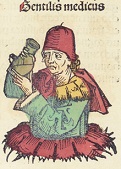

1348 In Jan. the Black Death begins in Marseille and Languedoc, spreading to Avignon in Mar., and Siena, Toulouse, Narbonne, Montpellier, and Carcassone in May; after the cemeteries are filled, bodies are piled high on the Campus Floris near the Church of St. Mary of the Miracles; in June it spreads to Spain, and Bordeaux, Lyon, Burgundy, Normandy, Paris, and SW England in Aug., along with Howth and Drogheda in Ireland; Agnolo di Tura the Fat of Siena, Italy writes the soundbyte: "The mortality in Siena began in May. It was a cruel and horrible thing. The victims died almost immediately. They died by the hundreds, both day and night. I buried my five children with my own hands, and so did many others likewise. Nobody weeps no matter what his loss because almost everyone expected death. So many died that all believed it was the end of the world"; it then disappears for the winter, except Ireland, which it decimates; the Great Plague results in horrible Jewish pogroms throughout Europe, incl. Chillon, Basle, Stuggart, Ulm, Speyer, Dresden, Strasbourg, and Mainz, destroying 60 major and 150 minor Jewish communities, causing survivors to head for Poland, which welcomes them as Kasimir III reworks the Polish law codes; in Strasbourg 2K Jews are hanged; in Freiburg ? are burned alive in wooden bldgs.; Basle burns 600 Jews, expels the rest, and destroys their synagogue and cemetery; Alfonso XI of Spain proposes that the Jews give up banking and take up agriculture; meanwhile, Millennium Fever is on full blast, and when terrible earthquakes rock Italy, this combined with the plague convince people that the end of the world is nigh. In Jan. a Turkish proposal for peace in Smyrna from Umur Pasha reaches Avignon, but Pope Clement VI, who knows the Crusaders are exhausted and want to leave gets hung up on a demand that the new Christian fortress be destroyed, calling it an offense to Christendom; meanwhile on Mar. 5 a letter from Byzantine emperor John VI Cantacuzene arrives, promising 15K-20K men for a renewed attack, to be led by him personally, along with a request for a synod to discuss church union; too bad, in Jan. the plague arrives, throwing him off-balance, and he takes until 1350 to answer the emperor, while Umur Pasha takes the request to keep the fortress intact as proof that they want to stage future attacks in his territory, causing him to try to destroy it in a surprise attack in May, which backfires, and he is KIA by an arrow, securing the Latin control of who-cares Smyrna; meanwhile the emperor gets diverted by an expedition against Stephen Dushan, then after learning of his friend Umur's death, calls off the attack; Umur Pasha is succeeded by his elder brother Khidr Beg (Ihalabi), ruler of Ephesus, who on Aug. 18 arranges a truce with the Hospitalers and sends negotiators to Avignon to make peace. On Apr. 7 Bohemian king Charles IV of Luxembourg (1316-78) makes official the work of his father John of Luxembourg, founder of the Luxemburg dynasty in Bohemia, officially creating the Crownlands of Bohemia, consisting of the original kingdom of Bohemia plus adjoining lands (Moravia, Silesia, Upper and Lower Lusatia); on Apr. 7 he issues a Golden Bull founding the U. of Prague (Charles U.), the first univ. in C Europe, making it a thrilling intellectual center and turning Prague into a chief city of pockmarked Europe. On Sept. 26 Pope Clement VI issues the bull Quamvis Perfidiam, attempting to dispel the rumor that Jews caused the Black Death by poisoning wells, saying that they too are suffering from the plague, but he is ignored. The False Waldemar (Valdemar) becomes ruler of Brandenburg (until 1350). Denmark regains most of Jutland and Fünen (Funen). Burmese king (since 1331) Binnya E Law (b. 1308) dies, and his nephew Binnya U (1323-84) becomes Hanthawaddy king #8 of Burma (until 1384), becoming known for owning a white elephant and repairing he Shwedagon Pagoda in 1362. Avignon in SE France is sold by Joanna I of Naples to Pope Clement VI - you pay for the gravediggers? Gonville and Caius College at Cambridge U. is founded by Edmund Gonville (-1351), rector of Terrington St. Clement in Norfolk; after he dies leaving it broke, his executor Bishop William Bateman of Norwich transfers it to Trinity Hall, and renames it Hall of the Annunciation of the Blessed Mary; it is refounded in 1557 by physician John Kays (1510-73), who changes his name to the Greek spelling Caius. Architecture: The Gothic Cathedral of Asti in Asti, Italy (in the Piedmont) (ancient Asta Pompeia) is finished. Art: Nino Pisano (1315-67), Madonna and Child (sculpture). Novels: Giovanni Boccaccio (1313-75), The Decameron (1348-53); about a party of wealthy ("well-bred, of worth and discretion") young patricians (seven women, three men) who take refuge from the Great Plague in a villa outside Florence with great gardens, and tell each other bawdy stories for 10 nights (100 in all), which becomes a storehouse for later writers to loot, incl. Chaucer and Shakespeare, and are later endlessly recycled by romance novelists and TV soap operas; the stories "Putting the Tail on the Donkey" and "Putting the Devil in Hell" are keepers, as are stories about what a wise and cool guy Saladin was; the Story of Jeannot de Chauvigny and His Jewish Friend sees a Jew visit Rome to see if Christianity is the true religion by observing the papacy, and after he finds them having swinging bi sex he decides it is and converts; "It seems to me that your Lord and his acolytes put all their energy into destroying Christianity and banishing it from the Earth. But I observe that your religion grows apace and gains in lustre and magnificence. I think that this can only be the work of the Holy Spirit, and that therefore it must be the one true religion." Births: English royal mistress (of Edward III) Alice Perrers (d. 1400) in Hertfordshire. Deaths: Italian jurist Giovanni d'Andrea (b. 1270). Italian painter Bernardo Daddi (b. 1280). Italian painter Pietro Lorenzetti (b. 1280). Spanish poet Juan Manuel (b. 1282). Italian Roman Catholic bishop-philosopher Barlaam of Calabria (b. 1290); Greek-to-Roman-Catholic convert Simon Atumano succeeds him as bishop of Gerace. Italian painter Ambrogio Lorenzetti (b. 1290); leaves the fresco The Effects of Good Government in the City and in the Country in the Palazzo Pubblico in Siena. Italian sculptor Andrea Pisano (b. 1290) in Orvieto. Greek theologian Gregory Akindynos (b. 1300) (plague); dies in exile after being excommunicated in 1347 by the Council of Constantinople. Burmese king (1330-48) Binnya E Law (b. 1308) in Pegu. Italian physician (pioneer in cardionephrology) Gentile da Foligno (b. ?) on June 18; known for applying the "art of latitudes" to Galen's physiology; leaves Consilia.




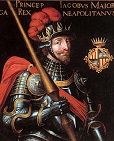
1349 Plague kills one-third of the pop. of Syria and Egypt, wiping out the Mamluk households holding the Mamluk Empire together; the Muslims handle the religious problem of how and why when they pray 5x a day and are the true followers of the True Prophet (praised be his name, and no paparazzis please) yet get the plague like other infidels by adopting the attitude of pious resignation to the will of Allah (Inshallah = "it's Allah's will"), causing them to go on with everyday activities like nothing unusual is happening, ruling out quarantines and other impious disrupting efforts. On Jan. 9 the Jewish pop. of Basel, Switzerland is burned for causing the Black Death, followed on Feb. 14 by 2K more Jews in Strasbourg. Love the snakeskin you're in? In Jan. after finding his wife Isabella Fieschi (niece of Pope Adrian V) cheating on him and promising a terrible punishment, Luchino Visconti (b. 1287) is poisoned by her, causing her to gain the nickname "Isabella del Veleno" (Isabella of Poison); his exiled (since 1346) nephews (sons of brother Stefano Visconti) Matteo II Visconti (1319-55), Bernabo (Bernabò) (Barnabò) Visconti (1323-85), and Galeazzo II Visconti (1320-78) return and claim a share of rule with Giovanni Visconti, ousting Luchino Novello (Jr.) from the succession because of Isabella's infidelities. In the spring the French unsuccessfully attempt to recapture Calais. On Apr. 3 Eudes IV (b. 1295) dies without heir, and his 3-y.-o. grandson Philip I (1346-1361) succeeds as duke of Burgundy (until NOv. 21, 1361). On May 31 (Pentecost) the death rate from plague eases in London after 60% of the pop. is killed since last fall; it was really spread via coughing? In the summer the Great Plague reappears in Paris, where it peaks, killing up to 800 a day, and spreads to Picardy, Flanders, and the Low Countries; also in the summer it reappears in London, and spreads to Ireland, killing 25% of the pop. within a year; by the middle of the year half of the pop. of Venice is killed; by the end of the year half of England's pop. is killed, and a truce with France is called; the plague spreads to Norway when an English ship full of corpses floats into Bergen, and reaches Elbing (Elblag), Poland on Aug. 24; the Church and its credibility being challenged head-on, the main solution offered is by the Flagellants, who appear in force all over Europe (especially Germany), torturing themselves publicly, and proclaiming that the Second Coming is 33.5 years away (I been a bad, bad boy, so tan my sinful hide?), while causing trouble for Jews, the rich, the Church, and finally themselves (besides all the wounds), causing Pope Clement VI to pub. a bull condemning them on Oct. 20; "Many persons, and even young children were soon bidding farewell to the world, some with prayers, others with praises on their lips." In June after they are blamed for the Black Plague, HRE Charles IV removes imperial protection from the Jews of Frankfurt, transferring the special Jewish tax to the Frankfurt town council for 15.2K pounds; too bad, he declares that the town can't be held responsible for Jewish pogroms, and that the dead Jews' possessions revert to the city, and on July 24 all 60 Jews in Frankfurt are killed by orders of the city council, who blame it on Flagellants; the plague reaches Frankfurt in the fall; meanwhile the city declares for Charles IV's rival Gunther von Schwarzburg, and braces for an attack. On Oct. 25 the Battle of Llucmajor in Majorca sees Peter IV of Aragon defeat and kill his rash cousin James III the Rash (b. 1315), ending the independence of the Balearic Islands along with the Kingdom of Majorca (founded in 1276); his son James (Jaume) IV of Majorca (1336-75) is taken POW by Peter IV, and imprisoned in Barcelona in an iron cage (until 1362). Bogdan Voda, voivode ("army leader) of a group of Vlachs (Wallachians) drives the Tartar and other tribes from the area between the Carpathian Mts. (on the W) and the Prut River (on the E), founding the principality of Moldavia; during the succeeding decades it extends its borders to the Dniester River, while fellow Vlachian principality Wallachia extends to the lower Danube River. Count Humbert II, the last dauphin (Fr. "dolphin") of Vienne in SE France sells the (bottlenose?) region of Dauphine (Dauphiné) (English Dauphiny) (originally the County of Albon) in the old kingdom of Arles or Burgundy to Charles Valois (who becomes Charles V in 1364), and thereafter the eldest son (heir apparent) of the French king is called the dauphin (until 1830), with him becoming the first, which makes sense since the title of king of Arles was a favorite of Frederick I Barbarossa and other German HREs, and the title of prince of Wales has been used by the English since Edward II. Stephen Dushan draws up a Serbian Law Code. The House of Wittelsbach in Bavaria is whittled into Landshut, Straubing, Ingolstadt, and Munich branches, which are not whittled back until 1505. The Chinese finally settle Singapore in Malaysia. Architecture: Monte Cassino Abbey in Italy is damaged by an earthquake, and is rebuilt, but begins a long decline. Nonfiction: Konrad von Megenburg (1309-74), Buch der Natur; claims that earthquakes are caused by winds accumulating inside the Earth. Jean de Roquetaillade (-1366), Visions of Revelation. Births: Austrian Hapsburg duke (1365-95) Albert III "the Pigtail" (d. 1395) on Sept. 9 in Vienna; 3rd son of Albert II (1298-1358). Deaths: Italian physician-inventor Guido da Vigevano (b. 1280). French Franciscan Order minister gen. (1329-49) Geraldus Odonis (b. 1285) in Catania, Sicily (plague). English chaplain Robert de Eglesfield (b. 1295) on May 31. French countess Jeanne III of Burgundy (b. 1308).
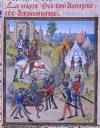
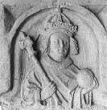



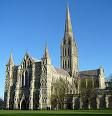

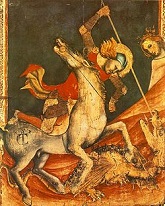
1350 World pop.: 300M; Rome: 30K-40K. The 140-year drought in Calif. (begun 1209) ends. The Black Death reaches Scotland and Wales after a Scottish army invades England and brings it back, and from there to Norway and Scandinavia; 20% of Scotland's pop. disappears within a year. About this time the Renaissance (It. "Rinascita" = rebirth) Period in Europe begins (ends 1650) as the intelligentsia begin to smell a rat in the divine pretensions of the Church and launch the timeless look at the ancient past called the Renaissance via their Greek scholar friends in Constantinople, no longer being satisfied with Arab translations but learning ancient Greek for themselves; meanwhile the workers see the class struggle clearly now, the rain is gone?; the Italian Renaissance begins first, spreading outward, with Italian Renaissance painting beginning about 1400, along with Italian Renaissance architecture, Italian Renaissance humanism, Italian Renaissance music, Italian Renaissance philosophy, and Italian Renaissance science; ironically, the decline of the Black Death leaves the Euro pop. mainly enthusiastic about Christianity, while the intelligentsia begin turning against it in the form of campaigns against superstition and idolatry; nobody wants to write thoughtful tomes probing the Black Death's meaning? On Feb. 14 the Treaty of Bautzen sees HRE Charles IV of Bohemia to cede Brandenburg and the Tirol (Tyrol) to the Wittelsbachs in return for their recognition of him. On Mar. 27 king (since 1312) Alfonso XI (b. 1311) dies of the plague while sieging Gibraltar, and his son Peter (Pedro) I (the Cruel) (1334-69) becomes king of Castile and Leon (until 1366), while his slightly older illegitimate half-brother Count Don Enrique (Henry) of Trastamara (Trastámara) (Henry II) (the Fratricide) (1334-79) begins plotting for the throne. The original gay eye for the straight guy? On Apr. 23 (St. George's Day) (1344-51?) Edward III formally institutes the Most Noble Order of the Garter (Order of St. George) in honor of the Holy Trinity, the Virgin Mary, St. Edward the Confessor, and St. George, with 25 knights plus the king as its permanent head, with members incl. the earl of Salisbury and Henry of Grosmont, all wearing a silly gilt-edged dark blue velvet ribbon with gold lettering on the left leg below the knee (the origin of the "blue-ribbon panel"); their motto is "Honi soit qui mal y pense" (Shame on anyone who thinks evil of it) (Evil to him who evil thinks), after the countess of Salisbury drops her garter at a dance and the king retrieves it, remarking you know what? (too chivalrous to put a mirror on their shoes?); St. George replaces Edward the Confessor as the patron saint of England; English is the only W European language in which knight doesn't mean horseman, the Anglo-Saxon word knecht meaning servant? In July Cola di Rienzi (Rienzo) (1313-54) of Rome reaches Prague and asks HRE Charles IV of Bohemia to help deliver Italy from the temporal power of the pope, but Charles IV arrests him and turns him over to Black Plague Pope Clement VI. On Aug. 11 the pact of the Holy League of the papacy, Venice, Cyprus, and the Hospitallers of Rhodes to defend Smyrna is renewed for 10 years, with an annual subsidy of 3K florins. On Aug. 22 Philip VI of France (b. 1293) dies, and on Sept. 26 his luxury-loving boob son (by his wife Jeanne of Burgundy), the duke of Normandy John (Jean) II the Good (1319-64) ("a good knight and a mediocre king") is crowned Valois king #2 of France in Notre Dame de Reims (until Apr. 8, 1364), and stages a royal entry into Paris on Nov. 11, going on to become a spendthrift and repeatedly debase the currency, appointing brutal thieves to administer his kingdom; on Nov. 19 popular constable of France Raoul II of Brienne, Count of Edu and Guines (b. 1315) is executed in Paris on the king's orders after being released by the English to seek his ransom and rumor to have pledges his county of Guines in return for his release, ending the king's honeymoon with his nobles. The Hook and Cod Wars begin in the county of Holland (end 1490) between the Cod faction (progressives) and the Hook faction (conservative noblemen). King Magnus Erikkson of Sweden establishes the Landslag (Land Law), establishing Sweden as an elective monarchy; replaced by the Civil Code of 1734. This is an Annus Mirabilis for the Roman Catholic Church, and many pilgrims visit Rome - bringing what with them? The Majapahit Empire in Java (1293-1527) reaches its cultural peak. A Jewish pogrom takes place in Duisburg, Germany. Tibet, led by Gyrates of Pham Drupe revolts from the Mongols and establishes sovereignty with a secular govt. About this time the Prostibulae Publica, licensed hos become common in Europe; by 1480 a prudish reaction begins driving them back underground. Trinity Hall college is founded at Cambridge U. by William Bateman (1298-1355), bishop of Norwich to replenish the priesthood after the Great Plague. In this half-cent. the Hawaiian Islands are settled by the Hokulea and the Hawai'iloa from the Polynesian islands? In this half-cent. the Maori Great Fleet (begun 950) comes to New Zealand in seven canoes from Hawaiki (Tahiti), forming groups of tribes called "waka", meaning "canoe"? In this half-cent. the Great Plague causes salt production to drop in N Europe, and the slack is taken up with inferior salt from Brittany; the demand causes salt deposits in Poland to be opened up, and Genoa eventually develops a monopoly in the Polish salt trade. The plague causes distilled spirits such as brandy and whiskey to be consumed in a vain attempt to ward off infection, inflicting Europe with an endless alcoholism problem to modern times? The Norse walrus-seal-hunting settlement at Disko Bay collapses due to colder climate and a rise in sea ice. Mohawk sachem (chief) Hiawatha (He Makes Rivers) and Huron sachem Deganawidah (Two River Currents Flowing Together) establish the Iroquois League of Nations, becoming the oldest functioning govt. in North Am. surviving into modern times. Italian lit. man Giovanni Boccaccio (1313-75) meets inspiring lit. man Petrarch (1304-74) while working on his chick lit. megahit The Decameron (1348-53). About this time the legendary ageless Prester John is believed to be based somewhere in Abyssinia (Ethopia); Zan is the royal title of Ethiopia, which has been Christian since the 4th cent. About this year the Great Vowel Shift in England begins (ends 1550). In this half-cent. English replaces French as the favorite language of English courtly lit.; English begins to supplant French in the English schools. The English word "always" is coined - when will alright be all right? In this half-cent. the Meistersinger movement begins in Germany. About this time Italian composer Giovanni da (Jovannes de) Cascia (Johannes de Florentia) (Giovanni da Firenze) thrives, composing cool madrigals. About this time Cambrai eclipses Paris as the center of French music. About this time lute-playing becomes popular in Europe. In Japan the shogun prohibits tea drinking. A serious shortage of yew wood for longbows causes Henry IV of England to order his royal bowyer to enter private land to cut it. Architecture: About this time English Perpendicular Gothic Architecture, which emphasizes long vertical lines, often with elaborate fan vaulting is invented (ends 1575). After three of its eight stories are rebuilt on a true vertical in an unsuccessful attempt to correct its center of gravity, the Leaning Tower of Pisa (begun 1174) is finally finished after 176 years. Edward III begins the rebuilding of Windsor Castle. About this time William Douglas, 1st Earl of Douglas (1323-84) builds tantalizingly cool Tantallon Castle on a cliff face opposite the Bass looking onto the Firth of Forth 3 mi. SE of North Berwick becoming the last medieval curtain wall castle built in Scotland. Palma Cathedral in Mallorca is begun on the site of an Arab mosque. Bergamo Cathedral in Italy is finished. Salisbury Cathedral in England is finished. Science: In this half-cent. English authorities regard mental illness as demonic possession, treating patients with exorcism and torture incl. hydrotherapy (ice-cold baths) and trepanation. Poetry: Thomas Chestre, Sir Launfaul; 1045-line Breton lay composed in this half-cent., based on the 538-line poem "Sir Landevale", which was based on Marie de France's Breton lay "Lanval". Nonfiction: The Yellow Book of Lecan is written about this time in Ireland; not to be confused with "The Great Book of Lecan" (1418). Art: Vitale da Bologna (1289-1369), St. George and the Dragon. Births: Spanish Dominican missionary (St.) Vincente Ferrer (d. 1419) on Jan. 23 in Valencia. French countess of Flanders and Burgundy Margaret III/II of Dampierre (d. 1405) on Apr. 13; daughter of Louis III of Male (1330-84) and Margaret of Brabant (daughter of Duke John III of Brabant); wife of Philip the Bold (1342-1404); mother of John the Fearless (1371-1419). Byzantine emperor (1391-1425) Manuel II Palaeologus (Palaiologos) (d. 1425) on June 27 in Constantinople; 2nd son of John V Palaeologus (1332-91) and Helena Kantakouzene (1333-96); almost loses Constantinople to the Turks until Tamerlane kicks their butts, giving him a 20-year respite. Russian prince of Moscow (1359-89) and Vladimir (1363-89) (St.) Dmitry (Dmitry) II Ivanovich Donskoi (Donskoy) ("of the Don") (d. 1389) on Oct. 12 in Moscow. Spanish king of Aragon (1387-96) John I (the Hunter) (the Lover of Elegance) (the Abandoned) (d. 1396) on Dec. 27 in Perpignan; eldest son of Peter IV (1319-87) and 3rd wife Eleanor (daughter of Peter II of Sicily). English archbishop of York (1398-1405) Richard le Scrope (d. 1405). Greek Byzantine statesman Manuel Chrysolorus (d. 1415); first successful teacher of ancient Greek in the West. English London mayor Dick Whittington (Wittington) (d. 1423) in Gloucestershire. Hindu mathematician-astronomer (discoverer of infinite series) ("Father of Mathematical Analysis") Madhava of Sangamagrama ("union village") (Irinjaatappilly Madhavan Namboodiri) (d. 1425) in Irinjalakkuda (near Cochin), India. Lithuanian grand duke (1392-1430) Vytautas (Witowt) (Witold) (the Great) (d. 1430); son of Prince Kiejstut of Samogitia; cousin of Ladislaus II Jagiello (1348-1434); uncle of Sigismund Korybut (1395-1435). Deaths: Spanish poet Juan Ruiz (b. 1283). Syrian Muslim scholar Ibn Qayyim al-Jawziyya (b. 1292) on Sept. 23. French Valois king (1328-50) Philip VI (b. 1293) on Aug. 12. French duke of Burgundy (1315-50) Eudes IV (b. 1295) on Apr. 3 in Sens. French count of Eu and Guines Raoul II of Brienne (b. 1315) on Nov. 19 in Paris (executed). German controversial talk radio host Till Eulenspiegel (b. 1350) in Molln (near Luneburg) (plague). Spanish Castilian king Alfonso XI (b. ?) on Mar. 27 in Gibraltar (plague).


1351 The Black Death (begun 1347) reaches Russia, but suddenly begins to decline after 25M-75M are killed throughout Europe; the new reduced pop. mix leads to political and social upheavals, incl. the enclosure of land for sheep raising, accumulation of great fortunes (causing the baronage to lose status), an increase of uppityness of the yeomanry, and an increase in conspicuous consumption (bigger houses, etc.)? On Mar. 20 sultan (since Feb. 1, 1325) Muhammad bin Tughluq (Mohammed Tughlak) (b. 1290) dies, and Firoz Shah Tughlaq (1309-88)) becomes sultan of Delhi (until Sept. 20, 1388), watching the internal turmoil go from bad to worse. On Aug. 15 Louis I of Hungary makes a peace agreement with grand duke Kestutis of Lithuania, in exchange for accepting Christianity and providing Hungary with military aid, but after a pagan ritual supposedly to pacify the other side Kestutis reneges. On Nov. 6 in an effort to win back the support of his nobles, John II of France issues a circular letter announcing the Order of the Star, inviting French noblemen to join this new emasculated reincarnation of the Knights Templar. Zurich joins the Swiss Confederation (League). On Dec. 25 William Boy (Gael. "bui" = golden-haired) O'Kelly of Ui Maine begins the greatest feast in Irish history, inviting all the learned and entertainers of Ireland to his castle at Galey on the shores of the Lough Ree for a whole month, causing the saying "the welcome of the O'Kellys" to be coined. Einsbeck in S Lower Saxony, Germany begins exporting its strong lager beer, joining the Hanseatic League in 1368 and making fans of the dukes of Wittelsbach in Munich, Bavaria, who mispronounce the name as "ein bock" (billy goat) and clone it in their ducal brewhouse, becoming known as Bock style beer. Erfurt in Thuringia, Germany passes a burdensome ordinance regulating beer; "A calibrated tankard must always be filled to the mark. The beer in it shall cost 4-1/2 pfennigs and 8 groschen. No burgher or councilor may brew more than two beers per year, nor may he make half a brew, nor may he mill less or more than three boxes of malt to brew with. Only on Wednesday evening, and not before the beer bell is rung, may he start a fire under the tun and start brewing. But nobody may brew who does not possess containers, tuns, kilns and casks. The beer must be an entire brew. The amount to be brewed must be announced on Walpurgis Day (Feb. 25), and the precise amount announced must then be brewed. Nobody may brew with straw and twigs for fire. Anybody who breaks an innkeeper's beer mug or runs away without paying, will pay a 10-groschen penalty or must leave town. Anybody who buys hops may not touch the measuring jar until the vendor has filled it and has removed his hand from it. In the countryside, nobody may sell beer from another region nor may he brew without the knowledge of the town. Any burgher caught brewing in the countryside will no longer be considered a burgher of the town." There is massive flooding of the Yellow River in China; Liu Futong leads the rebel Red Turban Army in Yin Zhou (created by Guo Zixing from followers of the White Lotus in response to the Black Death) in a successful rebellion against the Mongol Yuan Dynasty (ends 1368). Gongmin (1330-74), 2nd son of King Chongsuk becomes king of Goryeo (Korea) (until 1374), becoming known for his ardent love affairs with young boys. The Thai Ayutthaya Kingdom of Siam (ends 1767), with capital at Ayuthia (Ayutthaya) (Ayudhya) is founded by Rama Tiboti (Ramathibodi) I (1314-69), with both Hinayana Buddhist and Chinese political institutions, launching a cent.-long invasion of Cambodia. The Statute of Laborers, passed under Edward III attempts to keep the wages and prices as low in England as they had been before the Great Plague created a labor shortage; every workman not bound to a lord or exercising a craft is required to take work when offered to him, and at the pre-plague "just price"; the law is widely flouted, causing many lords to lease their demeanes to tenant farmers, creating a new prosperous working class which keeps wanting mo' and mo'? The English Statute of Provisors of Benefices is passed to attempt to stem the influx of foreign clergy under control of the Avignon popes by restricting the power to make appointments to ecclesiastical offices; it is widely ignored. Louis I the Great passes the Jus Aviticum, restricting the freedom of the "little kings" of Hungary to dispose of their property. The Jolof (Wolof) (Wollof) Empire in Senegal is founded; in 1549 its vassal states break free, turning it into the rump Jolof Kingdom, which is conquered in 1875 by the Muslim Imamate of Futa Jallon in modern-day Guinea (1725-1896) before being incorporated into French West Africa in 1890. Greek polymath historian Nicephoras Gregoras (-1360), leader of the anti-Hesychasts is condemned by a church council in Constantinople and placed under house arrest, and the mysticism-loving Hesychasts dominate the Greek Orthodox Church, causing the Aristotelian rationalist anti-Hesychasts to give up on it and turn to the West. Jeanne de Bar resigns (is deposed?), returning to England in 1353, and Jean de Saint-Clair (1329-66) (whose grandfather is married to her aunt) becomes grandmaster of the Priory of Sion (until 1366) :). Sports: After the horrible Black Death of 1347-50 passes, tennis becomes an open air game in England - now that the air is cleared, the perfect game, where love means nothing? Architecture: Notre Dame Cathedral in Paris is finished. Inventions: An automaton called Maurizio, which strikes the hours with a hammer is installed in the Cathedral of Orvieto in Spain. Nonfiction: Anon., The Laurentian Sea Atlas (Florence); has a good map of the coast of Africa. Petrarch (1304-74), Epistle to Posterity (autobio.); Africa; based on Roman gen. Scipio Africanus. Births: Austrian Hapsburg duke (1365-86) Leopold III of Steiermark (d. 1386) on Nov. 1 in Vienna; son of Albert II (1298-1358); younger brother of Rudolf IV the Founder (1339-65) and Albert III (1349-95); father of William the Ambitious (1370-1406), Leopold IV (1371-1411), Ernest the Iron (1377-1424), and Frederick IV (1382-1439). Italian duke #1 of Milan (1395-1402) Gian Galeazzo Visconti (d. 1402) in Nov.; son of Galeazzo II Visconti (1320-78) and Bianca di Savoia. Polish king (1386-1434) and Lithuanian grand duke (1377-1401) Wladyslaw II Jagiello (Jogaila) (d. 1434) in Vilnius; son of Olgerd (Algirdas) (1296-1377) and 2nd wife Uliana; last pagan ruler of Lithuania, who converts to Roman Catholicism in 1386; founder of the Jagiellon Branch of the Gediminids Dynasty, which rules both states until 1572; father of Jadwiga of Lithuania (1408-31). Lithuanian grand duke (1432-40) Sigismund I Kestutian (Kestutaitis) (d. 1440) (b. 1365?); son of grand duke Kestutis (1297-1382) and 2nd wife Birute; born pagan, then baptized Roman Catholic in 1383 when daddy can't stop him? Deaths: Indian sultan of Delhi (1325-51) Muhammad bin Tughluq (b. 1290) on Mar. 20.

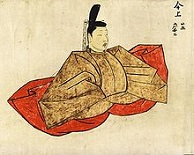

1352 On Jan. 5-6 the Order of the Star, founded the previous year by King John II of France holds its first and only meeting, and proves a flop - King John is no King Arthur? In Feb. David II is allowed to attend the Scottish parliament on parole to argue for John of Gaunt or some other son of Edward III being named heir presumptive to the Scottish throne ahead of Robert Stewart, but is laughed off. On Sept. 25 Go-Kogon (1338-74) (personal name Iyahito), 2nd son of Kogon becomes Japanese Ashikaga (northern) pretender emperor #4 (until Apr. 9, 1371). On Dec. 6 (Thur.) Pope (since 1342) Clement VI (b. 1291) dies with his precious Smyrna still in Latin hands, which it stays for 50 years (until Dec. 1402), and on Dec. 18 Limousin canonist Etienne Aubert, cardinal-bishop of Ostia and Velletri is elected Pope (#198) Innocent VI (-1362), going on to reform the Dominicans and frantically try to round up support for the war against the Muslim Turks, who are raiding the E Mediterranean and harassing pilgrims; next spring Clement VI is given a majestic funeral cortege from Avignon to the Benedictine Abbey of Chaise Deu, where he is buried on Apr. 8, 1353 in a black-white marble tomb on top of a black marble table surrounded by 54 small statues of his relatives (all given high church offices by himself); 50 priests say Mass for him for nine days, after which it is generally agreed that this won't be nearly enough to save his dissolute and sinful soul from Hell? The French town of Guines surrenders to the English. Prince Dragos arrives from mountainous N Transylvania, and founds Moldavia. The cantons of Glarus (E of Schwyz in the Linth valley) and Zug (W of Schwyz) join the Swiss Confederation. Cola di Rienzi is extradited to Rome. The Ottomans establish a bridgehead on the Gallipoli Peninsula at Tzympe. Giovanni Visconti of landlocked Milan annexes seafaring Genoa, ancient enemy of Venice - can I keep it? S Chinese peasant (former Buddhist monk) Zhu Yuanzhang (Yuan Zhang) (Chu Yuan-chang) (1328-98) launches a rebellion against the Chinese Mongol govt. (ends 1368). The English Statute of Treason of 1351 defines treason legally for the first time, surprise, basically anything encompassing the death of the king or violation of the queen. Roger Mortimer, 2nd earl of March gets the English Parliament to reverse the judgment on his grandfather and grant him his title and lands. Arab geographer Ibn Battuta (1304-69) explores the Sahara Desert - there ain't no bugs on me? Corpus Christi College ("House of Scholars of Corpus Christi and the Blessed Virgin Mary") is founded in Cambridge, England by the guilds of the Blessed Virgin Mary and Corpus Christi, becoming the only college founded by Cambridge townspeople; it later becomes known as St. Benet's for its chapel; its members incl. 13 fellows, 6 scholars, and 24 scholarship holders, and it goes on to produce prelate Matthew Parker et al.; Oxford's Corpus Christi College is not founded until 1516. Architecture: The Church of Santa Maria Incoronata in Naples near Castel Nuovo is begun by Charles II of Anjou (finished 1373), opening in 1364 to house an alleged spine from Christ's crown of thorns requested by Joanna I of Naples from Charles V of France. Art: Tommaso de Modena paints the first artistic representation of eyeglasses. Births: German Wittelsbach king and HRE (1400-10) Rupert (Ruprecht) III of the Palatinate (d. 1410) on May 5 in Amberg; son of Rupert II (1325-98) and Beatrix of Sicily. English nobleman-soldier Edmund Mortimer, 3rd Earl of March (d. 1381); son of Roger Mortimer, 2nd earl of March (1328-60) and Philippa, daughter of William Montagu, 1st earl of Salisbury. Deaths: Ethiopian religious leader Ewostatewos (b. 1273) on Sept. 15 in Armenia. French philosopher Jean de Muris (b. 1290).





1353 On Jan. 19 after reps from the Byzantine city of Philadelphia in Anatolia beg the Avignon pope for aid against the "incessant and inhuman" attacks of the Turks, promosing to turn their city over to the Holy See, Pope Innocent VI tells them that they first have to agree to give up their allegiance to the Orthodox Church, abjure their "ancient schism", and unite with the Latin Church, and sends them packing for further instructions; meanwhile on Apr. 1 he writes a letter to Hugh IV of Cyprus telling him to aid John VI Cantacuzene in his professsed goal of uniting the Greek and Roman churches, despite his questionable sincerity; on Nov. 28 the pope requests Pedro IV of Aragon and Genoa to allow two ships loaded with papal provisions for Smyrna to be given safe passage. On Apr. 27 grand duke (since Mar. 31, 1340) Simeon the Proud (b. 1316) dies of the plague after taking monastic vows, and on Apr. 27 his son Ivan II Krasny (the Beautiful) (1326-59) becomes grand duke (prince) of Moscow (until Nov. 13, 1359); his rule is dominated by his ministers, who seek to preserve the territorial gains of his father - imperialism is the essence of Russia? Five consonants in a row? Stephen Kotromanic dies, and his nephew Tvrtko I (-1391) becomes ruler of Bosnia, which reaches its maximum size and power. Giovanni Visconti (d. 1354) annexes Novara, and begins the Genoan-Venetian War (ends 1355) (1350-81?) to challenge Venice's dominance of the Adriatic trade. The German-speaking canton of Berne (Bern) in WC Switzerland joins the Swiss Confederation, thereby completing the "eight old locations"; Switzerland is established. Hesychast monk (metropolitan of Heraclea) Philotheos Kokkinos ("the redhead") (1300-78) becomes patriarch of Constantinople (until 1354, then 1364-76). The English Statute of Praemunire forbids appeals to courts outside England, particularly hated Avignon; it is widely ignored. William Douglas (1327-84) kills Sir William Douglas of Liddesdale (b. 1300), "the Flower of Chivalry" in Ettrick Forest after the latter loses the king's favor by permitting English troops to pass through Liddesdale unhindered; after marrying Margaret, daughter of Earl Thomas of Mar (1332-74), in 1357, he is created the 1st Earl of Douglas in 1358, and later becomes earl of Mar when Thomas dies without a male heir, ending his ancient Gaelic line. After the primacy dispute of the archbishops of Dublin and Armagh is referred to him, Pope Innocent VI rules that "Each of these prelates should be Primate; while, for the distinction of style, the Primate of Armagh should entitle himself Primate of All Ireland, but the Metropolitan of Dublin should subscribe himself Primate of Ireland." The mysterious 14 ft. 3 in. x 3 ft. 7 in. Shroud of Christ (Turin) first emerges in the possession of French knight Count Geoffroi de Charny (1300-1356) of Lirey, France, who owns it equally with his new wife, descended from Knights Templar Robert de Clare (leader of the Fourth Crusade)?; in 1390 he presents it to Bishop Pierre d'Arcis, dean of the Lirey Abbey, who writes to Pope Clement VII, calling it a forgery whose artist confessed; in 1413 the Charnys' descendent Marguerite reclaims it despite threats of excommunication; what does this mysterious dude have to do with Knights Templar deputy Geoffroi de Charnay (-1314), roasted in 1314, his descendant? Births: Danish-Norwegian-Swedish queen ("the lady king") ("the Semiramis of the North") Margaret (Margreta) of Denmark (d. 1412) in Vordingborg Castle; 2nd daughter of Valdemar IV of Denmark (1320-75); wife of Haakon VI of Norway (1340-80). English archbishop of Canterbury (1397, 1397-1414) Thomas Arundel (d. 1414). Deaths: Scottish knight Sir William Douglas of Liddesdale (b. 1300). French philosopher Nicholas d'Autrecourt.
1354 In Mar. after an earthquake causes the pop. to evacuate it, the Ottomans seize and fortify Gallipoli (Callipolis), the last Byzantine possession in Anatolia (until 1366), and first cross the Hellespont (Dardanelles) into Europe, raiding N into Thrace, with the news causing a panic at the disco in Constantinople. On Aug. 1 Cola di Rienzi returns to Rome in triumph as senator of Rome, but his excesses cause a mob to kill him on Oct. 8. On Oct. 5 Giovanni Visconti (b. ?) dies, and his nephews Matteo II, Bernabo, and Galeazzo II divide and rule the domains jointly while plotting to stab each other in the back; Matteo gets Lodi, Piacenza, Parma and Bologna; Bernabo gets the E side (Bergamo, Brescia, Cremona, Crema); Matteo and Galeazzo become known for harsh rule and ostentatious patronage of learning and art, with Galeazzo backing Plutarch and founding the U. of Pavia in 1361. On Nov. 4 the Genoans under Paganino Dona destroy the Venetian fleet under Niccolo Pisani in the naval Battle of Sapienza (Porto-Longo) (Zonklon) off the Peloponnesus, sinking or capturing 35 Venetian galleys and taking 5K POWs, causing a peace to be mediated by Milan next year. On Nov. 22 with Genoese support, John V Palaeologus drives his Turk-appeasing Byzantine usurper John VI Cantacuzene (d. 1383) to abdicate and enter a monastery, where he goes back to being a brain man and writes the 4-vol. History of the Byzantine Empire from 1320-56; Philotheos is deposed, and Callistos (-1363) becomes patriarch of Constantinople, offering a "metropolitan of the Lithuanians" to grand prince Olgerd (Algirdas) (-1377), who picks Roman of Tver (-1362), who sets up shop in Kiev as a rival of Alexis until his death; Genoese adventurer Francesco I Gattilusio (-1384), whose help was instrumental marries John V's sister Maria Palaeologina and receives lordship of the lovely isle of Lesbos, starting a Lesbian daisy chain leading to Prince Rainier of Monaco, the Marquis de Sade, and Brooke Shields? :) Giovanni Boccaccio is sent to the papal court at Avignon. Robert Stewart gets the Scottish parliament to reject plans to ransom David II for 90K marks and 20 noble hostages, and instead convinces them to invade N England next year. Muslim mobs in Cairo, Egypt plunder and demolish several Christian churches incl. the Church of Fahhadin, a Church in Bataq al-Tokruni, and the Convent of Nehya in Djizah. Muslim explorer Ibn Battuta (1304-77) finishes his explorations, going on to write Rihla (Journey). Inventions: A mechanical clock is constructed for Strasbourg Cathedral. Architecture: The Alhambra in Granada, Spain (begun 1248) is finished. Nonfiction: Anon., Ordinance of the Jews of the Crown of Aragon. Demetrius Cydones (1324-98), Greek Trans. of Thomas Aquinas' 'Summa Contra Gentiles' (Dec. 24) (3 p.m.); big hit with ex-Byzantine emperor John VI Cantacuzene, who goes on to trans. many Latin theologians into Greek, incl. Aquinas and St. Augustine of Hippo. Deaths: Italian patriot Cola di Rienzi (b. 1313) on Oct. 8 in Rome; killed by a mob after tying to sneak out in disguise.

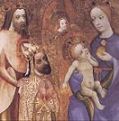
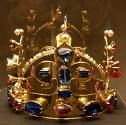






1355 On Jan. 6 Bohemian king (since Aug. 26, 1346) Charles IV of Luxembourg (1316-78) is crowned king of Italy, followed on Apr. 5 by HRE in Rome (until Nov. 29, 1378) by a papal legate sent from Avignon, ending years of conflict between popes and emperors over control of Italy and the papacy (now that half of the pop. is dead?), and allowing Charles to give Bohemia its golden age; his obscenely jeweled Bohemian Crown of St. Wenceslas has a nice little cross on top; he appoints U. of Perugia law prof. Bartolus de Saxoferrato (1313-57) as his consiliarius, who goes on to leave a large number of key works on Roman law that cause his opinions to be followed whenever Roman source texts are silent, and the saying "Nemo bonus iurista nisi bartolista" (No one is a good jurist unless he is a follower of Bartolus) to be coined. In the spring the Black Plague tames down, and England and France return to their morbidly obese warry war war war; Edward of Woodstock (1330-76), prince of Wales since 1343 is appointed the king's lt. in Gascony, going on to stage a series of raids across S France, pillaging and destroying Carcassonne and capturing Bordeaux, then using it as a base for a triple attack on Brittany over the Channel and from inland, accomplishing little; meanwhile the French govt. collapses financially, causing the estates of Languedoc and Langue d'Oïl (d'Oil) to get the work to get the Great Ordinance of 1357 passed, forcing the king to consult them before making new levies of money and to allow supervision of their collection and expenditure by a commission from the estates; John II the Good Fellow cleverly tricks the states into adjourning, then debases the coinage and organizes an opposition. On Apr. 17 after Milan mediates a peace between Venice and Genoa, and he attempts a coup with the intention of declaring himself prince, Doge Marino Faliero (Marin Falier) (b. 1285) is executed in Venice, and his body mutilated; meanwhile after an 8-year truce war breaks out between Venice and Hungary over control of the Dalmatian coast. On May 6 after his first wife Elizabeth Mure (Muir) dies, Robert Stewart marries Euphemia de Ross (1325-86), sister of Earl William of Ross, and widow of Earl John Randolph of Moray; in 1371 aftr a dispensation by Pope Innocent VI she becomes queen consort of Scotland (until 1386); they go on to have children David Stewart, 1st Earl of Caithness (-1388), Walter Stewart, 1st Earl of Atholl (-1437), Egidia Stewart, and Elizabeth Stewart. In May Count Henry of Trastamara kills 1.2K Jews in Toledo, Spain - I like myself the way I am? In Aug. the Scots invade N England and decisively defeat the English at the Battle of Nesbit Moor. On Sept. 29 Matteo II Visconti (b. 1319), imperial vicar of Milan since 1349 is assassinated (poisoned) by his brothers and co-rulers Bernabo and Galeazzo II. On Dec. 15 after the Ottomans isolate Constantinople from Europe, Byzantine emperor John V Palaeologus, after consultation with Roman Catholic archbishop Paulus of Smyrna signs a golden bull promising to secure the obedience of the Greek Orthodox Church to the Holy See in Avignon in return for military aid in the form of five galleys, 15 transports, 500 horse and 1K infantry for 6 mo., during which time he will make Latin Catholicism the official Byzantine religion, start bldg. a palace and church for a papal legate, and establish three Latin colleges for the promotion of Latin culture and language they da boss now, Roman emperor Constantine was right all along?); meanwhile on Dec. 20 Serbian czar (hero king) Stephen Dushan (Stefan Uros IV Dushan) (b. 1308) dies while marching on Constantinople, which is both good and bad, as it takes care of an enemy while making Constantinople's situation worse as his empire disintegrates and can't stop Ottoman expansion either; meanwhile Pope Innocent VI sends the Hospitallers a scorching letter about their shameful laziness and luxury and failure to take on the pesky Turks, threatening to take their resources "rusting in Rhodes" and give them to a new military order if they don't show good faith by moving their convent to mainland Anatolia. Giovanni Boccaccio revisits Naples. King Magnus of Norway-Sweden orders Norwegian sea capt. Paul Knutson to journey to Greenland to restore the Christian faith among the Norsemen still living there. Perpendicular Gothic church cloisters are developed in England. Architecture: St. Mary's Church in Nuremberg is begun. Art: Taddeo Gaddi (1300-66), Madonna and Child (Uffizi, Florence). Novels: Giovanni Boccaccio (1313-75), Il Corbaccio (prose romance). Births: English concert promoter, er, royal heir Thomas of Woodstock, 1st Duke of Gloucester, 1st Earl of Buckingham, 1st Earl of Exxex, Duke of Aumale (d. 1397) on Jan. 7 in Woodstock Palace, Oxfordshire; 7th son and 14th (youngest) child of Edward III (1312-77) and Philippa of Hainault (1314-69). Scottish rhyming chronicler Andrew Wyntoun (d. 1422). Greek Neoplatonist philosopher Georgius (George) Gemistus (Gemistos) (Pletho) (Plethon) (d. 1452) in Constantinople; teacher of Johannes Bessarion (1395-1472); big fan of Plato, causing him to name himself after him, and go on to help introduce him to Italy, advocating a return to the Olympian gods; settles in Mistra near the site of ancient Sparta in the Peloponnesus, becoming a big enemy of pro-Aristotle Patriarch Gennadius II - I love my career, or should I say careers? Deaths: French philosopher John de Murs (b. 1290). English bishop William Bateman (b. ?) on Jan. 6 in Avignon, France (Festival of Epiphany) (poisoned?). Serbian king (1331-46) and emperor (1346-55) Stephen Dushan (b. 1308) on Dec. 20 in Devoll. Portuguese throne babe Indes de Castro (b. 1325) on Jan. 7 in Coimbra (murdered on the orders of her hubby Peter I's father Alonso IV).
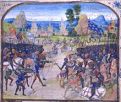

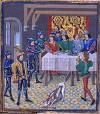

1356 On Jan. 10 Rupert I "the Red" (1316-90) becomes Palatine elector (until Feb. 16 1390). In Jan. Edward Balliol resigns his claim to the Scottish throne to Edward III at Roxburgh Castle in return for a large pension, and spends his last years in Yorkshire (until 1364); an English army leaves Roxburgh Castle to raid Scotland, but is ambushed in Ettrick Forest by Black Douglas' nephew William Douglas, 1st Earl of Douglas (1327-84), who "slew great numbers", causing a reserve army to be sent to reinforce the castle. On Mar. 25 Edward III signs a truce with the Scots, set to last until Michaelmas (Sept. 29), allowing William Douglas to travel to France with a retinue incl. his cousin "Black" Archibald Douglas the Grim, 3rd Earl of Douglas (1328-1400), and join the French army to support the Auld Alliance, giving the excuse that they didn't want their horses' harnesses to rust; go figure, William tells French king John II the Good that it would be better for the knights to dismount and fight on foot, dooming the French cause? - leave it to a Scot to stick his foot in his mouth? On July 21 Pope Innocent VI sends Carmelite bishop Pierre Thomas, of Patti, Sicily (who had just spent a year trying in vain to get Stephen Dushan to give up Serbian Orthodoxy) with a reply to the golden bull of Byzantine emperor John V Palaeologus, eagerly agreeing to its terms, although he knows he can't really send substantial military assistance against the Turks because all available troops are already occupied at precious Smyrna, and John knows he can't really get his subjects to convert to Latin Catholicism - listen to me, I need you? The English kick Frogg tin can butt and the pope sets aspiring German kaisers back? On Sept. 19 although outnumbered 3-1, the English under "model of chivalry" (who becomes a big hero afterward) Edward the Black Prince (1330-76) utilize the tactics of Crecy (1346) and rout the French army (which incl. some Scots), led by the "last chivalrous king of France" at the Battle of Poitiers; "true and perfect knight" Count Geoffroi de Charny (b. 1300) is KIA; King John II the Good of France and his son Philip are captured, along with the king of Bohemia and Black Archibald (who escapes after Sir William Ramsay of Coulluthie tricks the guards with the old fake fight trick), and the flower of French cavalry and taken captive to England, although Philip shows such courage that he earns the name "Philip the Bold"; his other son, 18-y.-o. Dauphin Charles (later Charles V), duke of Normandy and dauphin of Viennois acts as regent, summoning the Three Estates in Oct. to deal with the civil chaos, and together they scheme for the release of his brother-in-law Charles II the Bad, King of Navarre (1332-87) (son of Louis X's daughter Jeanne, who therefore has a better claim on the French throne than Edward III), who is being held in prison for his endless intrigues; Edward II's 61-y.-o. niece Jeanne de Bar (1295-1361) is allowed to visit and "comfort" John II, becoming his mistress. They call me mister big hot pastrami? After the lessons of centuries of crapola finally wise him up, HRE Charles IV issues the Golden Bull of 1356, laying down the rules for imperial succession for the next four cents. (until 1806), and permanently ending papal interference in the Holy Roman Empire by eliminating the need for papal approval and confirmation of German kings and emperors, creating seven hereditary (by primogeniture) indivisible electors (the archbishops of Mainz, Trier, and Cologne, the count palatinate of the Rhine, the duke of Saxony, the margrave of Brandenburg, and the king of Bohemia), with the HRE to be elected by a majority vote (but limited to the house of Luxembourg) without delays; it also requires each new HRE to hold his first diet in Nuremberg after his election, and gives the electors supervisory powers over the empire, turning it from a monarchy into an aristocratic federation, with Charles IV openly calling the empire an anachronism but valuing the HRE's right to nominate to vacant fiefs; too bad, it "codifies anarchy and calls it a constitution", making pan-German kingship an impossibility and insuring a disunited Germany until the time of Bismarck, although Charles IV himself is personal ruler of all the kingdoms in the HRE by 1365. The English duke of Lancaster sieges Rennes, and the forces of Duke Charles de Blois of Brittany, led by Bertrand du Guesclin relieve it and help it hold out against the English. Buddhist rebels capture Nanjing. The Mongols under Jani Beg invade Azerbaijan and take the city of Tabriz, establishing their own gov. Edward de Baliol retires on an English pension after surrending his title of Scottish king to Edward III. King Magnus turns over the kingdom of Norway to his son Haakon VI Magnusson (1340-80) (until 1380). Brandenburg is recognized by HRE Charles IV as one of the seven imperial electorates. The Hanseatic League holds its first gen. Diet in Lubeck, growing to 170 cities and dominating Baltic maritime trade until 1800, incl. beer. Paul Knutson leads an expedition from Greenland to Vinland (Newport, R.I.), constructing a tower that survives to modern times, and erecting the Kensington Runestone, with Norse runes carved on its surface, in central Minn.?; Knutson and most of his men die in the New World, and the only survivors return to Norway in 1364?; Norse expansion into the New World ends as a result of drought? Nonfiction: Jean de Roquetaillaide (-1366), Liber Ostensor; Guide to the Tribulation; French Franciscan predicts the Big Date for the return of the Antichrist as 1366, to be followed in 1369-70 by a millennial Sabbath, in which Jerusalem will get a king again and rule the world. Births: Spanish king of Aragon, Valencia, Sardinia and Corisca, count of Barcelona (1396-1410), and king of Sicily (1409-10) Martin I (the Elder) (the Humane) (the Ecclesiastic) (d. 1410) on July 29 in Girona (Perpignan?); 2nd son of Peter IV (1319-87) and Eleanor of Sicily; last ruler of the House of Barcelona (founded 870). Deaths: French "true and perfect knight" Count Geoffroi de Charny (b 1300) on Sept. 19 in Poitiers; KIA in the Battle of Poitiers.

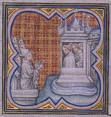





1357 The Estates reach their peak of power in France under Etienne Marcel and Big Bob Le Cock? In Feb.-Mar. after backing by Etienne Marcel, the Estates-Gen. issue the Grand (Great) Ordinance of 1357, a sweeping reform of the French monarchy and govt., providing for a standing committee to supervise levy and expenditure of taxes, poor relief, and other reforms, without attempting to mess with the traditional powers of the monarchy; they force Dauphin Charles to sign it as regent of France; in May King John II repudiates it, and the Marcel-Le Coq Revolt, led by Etienne Marcel (-1358) and Bishop (of Laon)Robert Le Coq (-1373) of Laon begins against Dauphin Charles in Paris, with Marcel's Great Ordinance of 1357 setting limits on the French monarchy, causing him to flee and gather a powerful coalition; meanwhile Marcel stinks up the rebellion by allying with bad bad Charles the Bad of Navarre. On Mar. 23 the 10-year Truce of Bordeaux ends the English invasion of France; too bad, the negotiations are transferred to England, and the treaty never ratified; one of the terms is that the siege of Rennes by the English be lifted, but the duke of Lancaster continues until they buy him off in July; the discharged English mercenaries turn into highwaymen in the Rhone Valley et al. In Apr. after papal legate Pierre Thomas spends 5 mo. trying in vain to end their war on his way to Constantinople, the Venetian-Hungarian war resumes, and after Hungarian Vs the Venetians cut off their 3K annual contribution for the defense of Smyrna, giving the quaking Byzantines more bad news. On May 28 king (since Jan. 7, 1325) Alfonso IV (b. 1291) dies after ordering the execution of his son Pedro's female lover, Castilian princess Ines de Castro, and his son Pedro I (the Just) (the Cruel) (1320-67) becomes king #8 of Portugal (until Jan. 18, 1367), immediately avenging her death by justly having the hearts torn out of her assassins and later (summer 1360) making the court justly do obeisance to her skeleton and justly kiss the hand of her corpse seated on the throne. In Oct. 33-y.-o. David III finally returns to Scotland after 11 years (1346), having developed "a rycht gret specialtie" of friendship with Edward III, who invites him to tournaments of the new Order of the Garter; the release happens after the Scottish parliament, no longer able to rely on the French finally folds and agrees to a ransom of 100K marks to be paid over 10 years, plus hostages and a long truce; Robert Stewart the Steward remains heir presumptive. On Nov. 7 Byzantine emperor John V Palaeologus sends papal envoy Pierre Thomas back to Avignon with a letter kissing up to the pope, noting that Michael VIII (the first Palaeologian emperor) had done it, so he could too, with the soundbyte "I shall keep the faith and fidelity to my lord the supreme pontiff, as do the other princes in the Roman Church", promising to depose anti-Latin Constantinople patriarch Callistus, and ending with the kicker "I know that if your legate comes with galleys and the aid I seek, all will submit and be loyal to you". In Nov. Charles of Navarre escapes from prison in Picardy. Jani Beg is assassinated, and Berdi Beg (Berdibek) (-1359) becomes khan of the Mongol Golden Horde (until 1359). The Ispah (Persian Sepoy) Rebellion (ends 1366) in Fujian, China sees a Mongol army of mainly Arab and Persian Muslims revolt against the Yuan Dynasty, occupying Quanzhou (Chinchew) (Zaiton) on the SE coast of China beside the Taiwan Strait, alng with Putian, threatening Fuzhou until it collapses in 1362 and is crushed by Han Chinese cmdr. Chen Youding. Tsongkapa (Tsongkhapa) (-1419) ("man from Onion Valley"), the first Buddhist Dalai Lama ("Great Ocean") is born in Tibet, receiving the name Lobsang Drakpa (Je Rinpoche) and founding his first monastery in 1409; all following ones are supposed to be his reincarnations. The town of Hoorn in North Holland 20 mi. N of Amsterdam acquires city rights. A law is passed in England forbidding waste from being thrown into the Thames or other waterway under threat of imprisonment and fines, adding new professions to the city payroll incl. muckrakers, bin men, and gong farmers (drain cleaners). Meet the Fuggers? The Fugger Family starts out with Hans, who arrives in the Swabian free city of Augsburg, after which weaver Johann Fugger founds a trading co. in 1367. Sports: The Kirkpinar Oil Wrestling Festival is inaugurated in the Ottoman region of Rumelia (S Balkans), becoming the oldest continuously-sanctioned sports competition in the world. Architecture: The Bastille (originally Bastille Saint-Antoine Castle) is built to protect the strategic gateway of the Port Saint-Antoine on the E side of Paris from the pesky English; construction drags along until the 1370s; in 1417 it becomes a state prison; Louis XIV uses it to imprison nobles and Huguenots; by 1789 it houses 5,279 prisoners, some of whom write autobios. complaining of bad conditions, causing reforms to be implemented and the prison pop. to be considerably reduced by the time of the July 14, 1789 Bastille Day. After the Judith Bridge (built 1158-72) is damaged by a flood in 1342, the 546-yd.-long (1,693-ft.-long) 33-ft.-wide sandstone bow Charles Bridge (originally Prague or Stone Bridge until 1870) over the Vltava River in picturesque Prague, Czech. is begun by Charles IV (fnished in 1402), built on the sides of the Moldau River Valley with the river running funkily through it, becoming the only bridge crossing the Vltava River until 1841, making Prague into an important trade route between E and W Europe; the cool look causes eight more bridges to be built over the river? Etienne Marcel purchases the Maison aux Piliers (House of Pillars) in the 4th arrondissement of Paris on the future Place de Greve (Square of the Strand), and rebuilds it with financial aid from Francis I into the Renaissance-style Hotel de Ville (Fr. "City Hall"), moving the city admin. there from the Parlor of Burgesses near the Chatelet; the bldg., designed by red-bearded Dominique de Cortone "il Boccador" of Italy and Pierre Chambiges of France is not finished until 1628, and burns down in 1871. Births: Portuguese king #10 (1383-1433) and 1st Lord of Ceuta Joao (John) I (the Great) (the Good) (the Happy Memory) (the Bastard) (d. 1433) on Apr. 11 in Lisbon; illegitimate son of Pedro I and Teresa Lourenco; half-brother of Ferdinand I (1345-83); husband (1387-) of Philippa of Lancaster (1360-1415) (daughter of John of Gaunt); father of Duarte (Edward) I (1391-1438), Duke Peter of Coimbra (1392-1449), Isabella of Portugal, Duchess of Burgundy (1397-1471), Infante John (1400-42), and Ferdinand the Holy Prince (1402-43). Korean Chosun Dynasty king #2 (1398-1400) Jeongjong (Yi Bang-gwa) (d. 1419) on July 18; 2nd son of Taejo (1335-1408). German Minnesinger poet Hugo von Montfort (d. 1423) in Styria. Deaths: Portuguese king (1325-57) Alfonso IV (b. 1291) on May 28. Italian jurist Bartolus de Saxoferrato (b. 1313) on July 13 in Perugia. Spanish Muslim scholar Ibn Juzayy (b. 1321).





1358 On Jan. 11 as he vies with Dauphin Charles for supremacy in France, Charles the Bad of Navarre enters Paris, and Etienne Marcel (b. 1302), provost of the Parisian merchants raises a crowd and storms the Palace of Les Halles, killing many nobles and turning them all against him; in May the dauphin orders the nobles to blockade Paris; on May 28 the Jacquerie, a peasant ("Jacques") revolt begins in St. Leu, France, fueled by war taxes and the pillages of the Brigand Cos. (demobilized soldiers), who during the summer cause a collapse of the govt. outside Paris; on June 10 several thousand Jacques storm Mello and Meaux in Beauvais, NE Paris (residence of the royal family) and are defeated, causing the tide to turn against them; in June Charles the Bad of Navarre kills Guillame Caen, leader of the Jacques; the remaining Jacques are hunted down and killed by June 24; in July Charles the Bad reenters Paris, making a bad bid for the crown, with Marcel's support, on July 22 bringing a band of hated English soldiers into Paris, causing an enraged mob to attack and drive them into the Louvre; on July 31 Marcel orders his guard to give the keys of the city to Bad Charles, but they balk, and Marcel is trampled to death on the streets by the mob; on Aug. 2 Paris opens its gates to Dauphin Charles, who pardons everybody after a little foolin' around with angry crowds; meanwhile, Bad Charles defies him and renews his alliance with Edward III. On Feb. 18 the Treaty of Zara ends the Hungarian-Venetian War (begun 1355), with loser Venice giving up its claims to Nona, Ragusa, Scardona, Sebenico, Spalato, Trau, and Zara, dislodging it from the E shore of the Adriatic Sea for decades. On Aug. 16 Albert II the Wise and Lame (b. 1298) dies, and his eldest son Rudolf IV "the Founder" (1339-65) becomes Hapsburg duke of Austria (until 1365) (first to be born in Austria), claiming the new title of archduke (which he invented) by forging in 1358-9 the Privilegium Maius, a modification of the 1156 Privilegium Minus which originally elevated it to a duchy) to empower the Austrian rulers, and going on to compete with HRE Charles IV, father of his wife Katharine (Catherine) of Bohemia (1342-95), trying to make Vienna as big a center of culture as Prague, and trying to get around the lack of a bishopric in Vienna (caused by the interference of the rival bishops of Passau) by creating his own metropolitan chapter, whose members wear red cardinal-like garments. In the fall Pierre Thomas returns to Avignon after visiting Cyprus then the Holy Land, where he does a JC Act, peaching to a crowd of Christians on Mount Zion while the Muslims grumble. The Hapsburgs sign a peace treaty with the Swiss Confederation insuring its practical independence, although formal acknowledgement is withheld until 1648. Muhammad I (-1375) becomes ruler of the Bahmani Dynasty in India (founded 1347). Nonfiction: Mark Kalti, Chronicon Pictum (Chronica de Gestis Hungarorum) (Chronicle of the Deeds of the Hungarians) (1358-70); how they kicked Venetian butt; its 147 pictures provide a rich portrayal of Hungarian culture; given by Hungarian king Louis I to French king Charles V upon the engagement of his son Louis I, Duke of Orleans to Louis' daughter Catherine. Births: Spanish king of Castile (1379-90) John (Juan) I (d. 1390) on Aug. 24 in Epila; son of Henry II (1334-79) and Juana Manuel (1339-81). Scottish military leader Sir James Douglas, 2nd Earl of Douglas and Mar (d. 1388); not Black Douglas, who was born in the 1280s. English merchant (lord mayor and sheriff of London) Sir Richard "Dick" Whittington (d. 1423) in Pauntley, Glucestershire. Deaths: English queen consort (1308-27) Isabella of France (b. 1295) on Aug. 22 in Castle Rising, Norfolk; buried in the Franciscan church in Newgate, London in her wedding dress, with Edward II's heart. Austrian duke (1330-65) Albert II the Wise (the Lame) (b. 1298) on Aug. 16 in Vienna.






1359 On Mar. 24 John II signs the 2nd Treaty of London, surrending most of W France (the old Angevin lands), and agreeing to pay a ransom of 4M gold ecus; on May 25 the Estates General rejects the treaty and make preparations for a war with England; in Aug. Charles the Bad of Navarre reconciles with dauphin Charles and the king; Edward III arrives in Calais at the end of Oct. with a large army, but the dauphin issues a policy of avoiding pitched battles; Geoffrey Chaucer joins Edward III's army and goes with it to France; in Nov. Edward III takes Nogent-sur-Seine in Champagne, then unsuccessfully sieges Paris and king-crowning-city Reims in Dec., and Geoffrey Chaucer is captured; S France has been so devastated by the English that they have trouble finding food? - how about champagne? On Nov. 13 Ivan II (b. 1326) dies, and Dmitri (Dimitri) IV Donskoi (1350-89) becomes grand duke of Moscow (until 1389). Sultan (since 1326) Orhan I (b. 1284) dies, and his half-Greek son Murad (Amurath) (the Godlike) I (1326-89) becomes Ottoman sultan #3 (until 1389), going on to expand into Thrace, Macedonia, Bulgaria, and Serbia, establishing the core of the Ottoman Empire in Europe (Rumelia) based on tributary vassals, while Louis I the Great of Hungary counters with the Banats, border districts S of the Danube and Sava Rivers; Murad I becomes the first to take the title of Sultan of the Ghazis (warriors of the faith). Berdi Beg is assassinated by his brother Qulpa (-1360), who becomes khan of the Golden Horde until next year, when another brother assassinates him, after which the Mongol horde begins to fracture, with 23 more khans by 1378. The first Riksdag (parliament, incl. aristocrats and burghers) meets in Sweden, made possible by the whimpiness of Magnus II Smek. The principality of Moldova in the Moldova River Valley is founded, named after the hound Molda of Prince Dragos, who drowned in the river while chasing an aurochs. John of Gaunt (1340-99) marries breed mare Blanche of Lancaster (1342-68), daughter of Henry of Grosmont, 1st Duke of Lancaster (1310-61) and Isabel de Beaumont; they go on to have six children incl. Henry IV, until she dies of the plague in 1369, causing annual commemorations of her death for many years, for which Geoffrey Chaucer is commissioned to write the poem The Book of the Duchess (The Deth of Blaunche) by the end of 1368. Scottish queen Joan returns to London, living a life of courtly piety until her death in Sept. 1362, and her hubby David II takes Catherine Mortimer (-1369), wife of the earl of Fife as his mistress. Architecture: The Nave of St. Stephen's in Vienna is begun. Births: Japanese Ashikaga pretender emperor #5 (1371-82) Go-En'yu (Ohito) (d. 1393) on Jan. 11; 2nd son of Go-Kogon (1336-74); father of Go-Komatsu (1377-1433). Welsh prince of Wales (last) (1404-15) Owen (Owain) Glendower (Glyndwr) (Glyn Dwr) (d. 1416). Deaths: Greek Orthodox Hesychast theologian-monk St. Gregory Palamas (b. 1296) in Thessaloniki (d. 1357?); dies after winning a big theological debate with Italian Aristotelian scholar Barlaam of Seminara (Calabria) (Bernardo Mssari) (1290-1348) over Hesychasm, mystical contemplative prayer giving direct knowledge of God via his energies despite his essence being beyond our comprehension, with the soundbyte in "Triads for the Defense of Those Who Practice Sacred Quietude": "We attain to participation in the divine nature, and yet at the same time it remains totally inaccessible. We need to affirm both at the same time and to preserve he ntimony as a crierion for right doctrine", while Barlaam denied the distinction between God's essence and energies, claiming it impossible for humans to see God but only sense his influence indirectly, until he was condemned by an Orthodox Church council in 1341 despite support by Byzantine theologians and Thomas Aquinas disciples Gregory Akindynos (Gregorius Acindynus) (1300-48) (who was excommunicated by the Council of Constantinople in 1347), Nicephoras Gregoras (1295-1360) (who was declared heretical by a synod in 1351), and Prochoros Cydones (Kydones) (Prochorus Cydonius) (1330-69) (who was condemned by a synod in Apr. 1368 then excommunicated); after the Greek Orthodox Church makes him a saint, the split with the Aquinas-loving Latin Roman Church hardens; in 1360 the body of his anti-Hesychast rival Nicephoras Gregoras is dragged through the streets of Constantinople to jeers. Russian grand duke (1353-9) Ivan II Krasny (b. 1326).




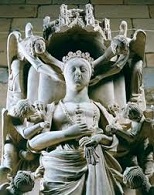
1360 In Jan. Edward III raises the siege of Reims and marches to Burgundy to pillage it, but is bought off with a ransom of 200K moutons to leave at the end of Mar.; Edward III pays Geoffrey Chaucer's £16 ransom in Mar.; in Apr. Edward III returns to the walls of Paris, challenging dauphin Charles to come out and fight; when he refuses, Edward begins to move towards Chartres, but on Apr. 13 (Easter) is caught by a terrific hailstorm on Black Mon., which kills many men and horses and causes him to sue for peace (3rd Black Easter Monday since 1209 and 1351); on May 8 the Peace (Treaty) of Bretigny (Calais), signed in the village of Bretigny 6 mi. SE of Chartres by Edward III, Philip I of Burgundy, and the dauphin brings the Hundred Years' War to a temporary halt; Philip II the Bold is released, and receives the duchy of Touraine; the SW third of France, incl. all of Aquitaine, Calais, and Ponthieu, plus the dinky Channel Islands; in return Edward III renounces his claims to the French throne as well as all claims to Anjou and Normandy, and his alliance with Flanders, while retaining Gascony and Guienne; France renounces its Auld Alliance with Scotland; the ransom is lowered to 3M ecus ($50M), and after the estate of Langue d'Oil grants it (for a term of 6 years) John II of France is released from captivity to raise the money for it in July; he marries off his daughter in order to get some quick money, which he turns over on Oct. 24, causing the treaty to be ratified in Calais; the Breton War of Succession (begun 1341) continues, and France is plagued by bands of unemployed marauding French and English mercenaries; the peace only lasts until 1369. The original Bates Motel? In late summer king (since May 28, 1357) Peter (Pedro) I the Cruel (1320-67) of Castile and Leon orders his highest dignitaries to kiss the hand of the corpse of his beloved Galician princess Ines de Castro (1325-55), who is seated on a throne in the city of Coimbra, and to do obeisance to her as the queen of Portugal - some people call me the space cowboy, some call me the gangster of love? Wealthy Spanish Jewish financier-diplomat Samuel ben Meir Abulafia (1320-61) is arrested and robbed, then killed next year by Castile-Leon king Peter I the Cruel sans explanation - I'm too cruel to be kind? Waldemar IV of Denmark reconquers Scandinavia; a boycott of Bruges by the Hanseatic League brings it to its knees; meanwhile England begins to penetrate into the Baltic, causing English resentment against the 1-sided privileges of the Hanseatic League in England. 9-y.-o. (St.) Dmitri II Donskoi (1350-89) becomes grand duke of Moscow (until 1389), with metropolitan Alexis (1295-1378) as regent; meanwhile the Mongol khan gives the higher title of grand prince of Vladimir to Dmitri Konstantinovich (1324-83) of Nizhny Novgorod (until 1363). The HRE grants Jews the right to resettle Frankfurt, and sells the right to half the taxes to the archbishop of Mainz, who sells them to the Frankfurt city council; an imperial representative is sent to the city to safeguard the Jews' rights, until the city purchases the office from the HRE for 6K marks in 1372; in 1366 HRE Charles IV prevents Jews from becoming guild masters, from setting their own laws or having their own courts. The E part of the failing Norse colony of Greenland is destroyed by the "Skraelingen" (Skraelings), nomadic hunters from the Far North (Eskimos); they eventually destroy the last group of Greenlanders in the W, burning them down in their church in Harjolfsnes; later a bunch of medieval clothing is found in tombs there, none dating past this cent. The Great Plague labor shortage causes English justices of the police, er, peace to be established as police judges in each county, with powers to regulate prices and wages. French chivalry lover Jean Froissart (1337-1410) begins a long series of travels beginning with Avignon this year, England next year (where Queen Philippa appoints him secy.), Scotland in 1365, then Brussels, France and Italy, followed by becoming a priest in 1372 in Lestines in the diocese of Liege, where he spends 12 years compiling Froissart's Chronicles, then resumes his travels in 1386 to expand it, finishing with the 1400 death of Richard II of England. Thomas Stewart, Earl of Angus orders the murder of David II's mistress Katherine Mortimer, causing the pissed-off king to imprison and starve him to death after attending her funeral at Newbattle Abbey near Edinburgh. The first francs are coined in France by order of John II, gold coins with the inscription "Johannes Dei Gracia Francorum Rex" (John by the Grace of God King of the Franks); they go out of circ. by the 2nd quarter of the 15th cent. Inventions: In this decade (early 1300s?) the Clavichord (Cembalo) (Lat. "clavis" + "chorda" = key + string) is developed, producing sounds by plucking a string when a key on the keyboard is depressed; it's not loud enough for large public performances. A mechanical clock is designed by Henri de Vick of Wurttemburg for future King Charles V of France. Science: About this time French Roman Catholic priest Jean Buridan (1295-1363) develops the Theory of impetus, which he defines as weight x velocity, becoming the precursor to the concepts of inertia, momentum, and acceleration. Births: Portuguese brainy queen consort (1387-1415) (Plantagenet) Philippa of Lancaster (d. 1415) on Mar. 31 in Leicester Castle; savant daughter of John of Gaunt (1340-99) and his wife-cousin Blanche of Lancaster (1345-69); granddaughter of Edward III of England (1312-77); wife of John I the Good (1357-1433); mother of the Illustrious Generation (6 sons and 3 daughters), incl. Blanche (1388-9), Afonso (1390-1410), Edward (Duarte) (1391-1438), Peter (1392-1449), Henry the Navigator (1394-1460), Isabella (1397-1472), Blanche (1398), John (1400-42), and Ferdinand the Saint Prince (1402-33). Ottoman sultan #4 (1389-1402) Beyazid (Bajazet) (Bayezid) I (Yildirim) (the Thunderbolt) (d. 1403); son of Murad I (1326-89) and Gulcicek Hatun (Greek); father of Suleyman (-1411), Musa Celebi (-1413), Muhammad I the Restorer (1389-1421), Isa, and Mustafa (-1401). Portuguese knight Vasco de Lobeira (d. 1403); author of the chivalry romance Amadis of Gaul? Byzantine emperor (1390, 1398-1412) John VII Palaeologus (d. 1412); grandson of John V Palaeologus. Bohemian Hussite Ultraquist gen. (blind) Jan Zizka (Johann Ziska) of Trocnov and the Chalice (d. 1424) in Trocnov. Italian Florentine Medici Dynasty and Medici banking house founder Giovanni di Bicci de' Medici (d. 1429) in Florence; son of Averardo de' Medici; father of Cosimo I de' Medici (1389-1464) - and they call Giovanni's son what? Italian humanist scholar-grammarian Gasparinus (Gasparino) de Bergamo (da Barzizza) (Di Pietrobuono) (d. 1431) in Barzizza (near Bergamo); educated in Pavia; teacher of Vittorino da Feltre (1378-1446), Leon Battista Alberti (1404-72), and Antonio Beccadelli (1394-1471). Deaths: English heiress Elizabeth de Clare (b. 1295) on Nov. 4 in Ware, Hertfordshire. Greek theologian-historian-astronomer (opponent of St. Gregory Palamas) Nicephoras Gregoras (b. 1295); declared heretical by a synod in 1351; his body is dragged through the streets of Constantinople to jeers; leaves Byzantine History (37 vols.), covering 1204-1357, devoting two books to his disagreement over Hesychasm with St. Gregory Palamas. English soldier Sir Roger Mortimer, 2nd earl of March (b. 1328) on Feb. 26 in Rouvray (near Avallon), Burgundy, France.
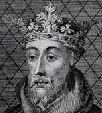

1361 The plague breaks out again in Europe and England (next time 1369). A UFO is sighted in the Sea of Japan off W Japan. On Nov. 21 15-y.-o. Philip I of Burgundy (Philippe de Rouvre) (b. 1346) dies of plague without an heir before he can consummate his marriage with new wife (since 1357) Margaret Dampierre (b. 1350), heiress of Flanders (which would have given him the counties of Flanders, Nevers, and Antwerp, plus the duchies of Brabant and Limburg); since the direct descendants of all four of his grandparents are also kaput, the duchy of Burgundy is escheated to the French crown (until 1363), since his great-grandfather John II is the grandson of Duke Robert II of Burgundy (1st cousin of Philip's father, which is one degree closer than Charles III of Navarre, son of a 1st cousin of Philip's father, who would have inherited via promogeniture otherwise); the counties of Burgundy and Arthois go to Marguerite of France (daughter of his great-grandmother Jeanne II of Burgundy); Auvergne and Boulogne go to his great-grandfather John of Boulogne (son of Count Robert VII of Boulogne), and never again are incorporated into the duchy of Burgundy, ultimately ending up in the hands of Catherine de' Medici; the rest of the duchy is reuinited in 1384. Denmark seizes the main Hanseatic League base of Wisby in Gotland (Gothland), cutting off the Russian-Baltic trade route and the monopoly on the herring trade, which pisses off the Hansa towns and their backer Sweden, causing the First Danish-Hansa War (ends 1363), with Copenhagen being sacked; the island of Oland (Öland) in the Baltic Sea off the SE coast of Sweden is taken from the Swedes by the Danes, but is taken back after a few years. Duke Henry of Lancaster dies, and John of Gaunt, hubby of his daughter Blanche becomes duke of Lancaster and one of the wealthiest nobles in plague-depopulated England; meanwhile after obtaining permission from Pope Innocent VI, John's brother Edward the Black Prince marries his cousin (daughter of his half-brother Edmund of Woodstock, earl of Kent) Countess Joan "the Fair Maid of Kent" (1328-85), whom he had been raised with, and after whom the Order of the Garter is named. The Turks capture Adrianople (Adrianopolis) from the Byzantines. Science: French alchemist Nicolas Flamel (1330-1418) discovers the alchemical textbook The Sacred Book of Abraham the Jew, Prince, Priest, Levite, Astrologer and Philosopher to that Tribe of Jews Who by the Wrath of God Were Dispersed Amongst the Gauls, spending 21 years trying in vain to understand it until a converted Jew in Leon gives him the key; on Jan. 17, 1382 he performs his first successful chemical transmutation in Paris, growing wealthy, allowing him to endow 14 hospitals, seven churches, and three chapels in Paris, and ditto in Boulogne, making him a hit with Sir Isaac Newton, who copies one of his works by hand - behind every fortune is a crime? Births: German House of Luxemburg (last) Hungarian-Croatian king (1387-1437), German king (1411-37), Bohemian king (1419-37), Italian king (1431-37), and HRE (1433-7) Wenceslaus (Wenceslas) (Wenzel) IV (the Drunkard) (the Lazy) of Luxembourg (d. 1419) on Feb. 14 in Nuremberg; son of HRE Charles IV (1316-78); brother of Sigismund I (1368-1437). Deaths: French composer-poet Philippe de Vitry (b. 1291) on June 9; "the great philosopher and truth-seeker of our age" (Petrarch). English noblewoman Jeanne de Bar (b. 1295) in London. German Dominican mystic John Tauler (b. 1300) on June 16 in Strasbourg. English soldier Henry of Grosmont, 1st duke of Lancaster (b. 1310) on Mar. 23 in Leicester Castle (plague); leaves Book of the Holy Doctors (Livre de Seyntz Medicines), a devotional work based on Henry's Seven Wounds, which represent the Seven Deadly Sins; reveals that he had gout by the age of 44. Spanish Jewish leader Samuel Abulafia (b. 1320).



1362 On Apr. 6 after John II of France attempts to deal with the brigand cos. plaguing France they defeat his force at the Battle of Brigands, er, Battle of Brignas near Lyon. In July the dauphin and the council disallow parts of the Treaty of Calais on the grounds that they give away too much; John II, feeling his honor is in dispute agrees to return to captivity in England, where he lives in luxury; meanwhile the S provinces of France chafe under their return to "foreign" English rule, showing signs of awakening nat. consciousness, after newlywed Edward the Black Prince is created prince of Aquitaine and Gascony by his father Edward III, and crosses the Channel to rule as a vassal of the French king, ruling ably but turning off the Gason nobles, who believe their feudal rights are being curtailed. In Sept. 7 Scottish queen Joan of the Tower (b. 1321) dies in London, causing her hubby David II to get serious with his mistress Margaret Drummond (Logie or Logy) (1340-75) from Perthshire, and they marry in Inchurdach, Fife on Feb. 20, 1364, only to divorce on Mar. 20, 1369 on grounds of infertility, which causes her to successfully appeal to the pope to reverse the sentence of divorce, claiming he is the infertile one. On Sept. 12 Pope (since 1352) Innocent VI (b. 1282) dies, and on Sept. 28 Guillaume de Grimoard (a Benedictine monk who continues to wear his habit as pope) is elected Pope (#199) Urban V (1310-70), going on to found or aid at least nine univs. On Sept. 23 the Civil War in Brittany breaks out again in Brittany between the de Monfort and de Penthievre parties (ends Apr. 12, 1365). The Danes under Waldemar IV defeat the German Hansa fleets at the Battle of Helsingborg. Swedish nobles revolt against King Magnus II, electing his son Hakon in his place; they reconcile, and share the crown. Joan I of Naples helps James IV of Majorca escape imprisonment in Majorca, and marries him next Sept. 26 at Castelnuovo, gaining him the title of duke of Calabria; too bad, after she produces no children he leaves her to war on his old foe Aragon, and is defeated and flees to Bordeau, waiting in the wings plotting to take back the Balearic Islands. The English Parliament passes a law making English the language of pleading and judgment in the courts, with legal French retained in documents. Giovanni Boccaccio (d. 1375) revisits Naples, is snubbed by Queen Joanne, and, finding himself unable to recapture his lost youth (erectile dysfunction?) visits much-older Petrarch in Venice, turns down his offer of a home, and returns to his birth town of Certaldo to spend his last 13 years in religious meditation - you have a full head of hair, why a comb-over? The (spurious?) 202-lb. greywacke Kensington Rune Stone (Runestone) in the Red River Valley of Minn. records a Scandinavian voyage there this year, along with the massacre of the Scandinvian explorers by Skraelings (Indians); discovered in 1898 in Solem, Douglas County, Minn. by Swedish immigrant Olof Ohman. Architecture: The Papal Palace (Palais des Papes) in Avignon, France (begun 1334) is completed, its immense size allowing the Church bureaucracy (Curia) to balloon. Poetry: William Langland (1330-87), The Vision of William Concerning Piers the Plowman (William's Vision of Piers the Plowman); Middle English allegorical narrative poem in unrhymed alliterative verse, becoming the greatest medieval poem prior to Chaucer; contains the first lit. ref. to Robin Hood; the first appeal in Europe on behalf of poor peasants, complaining about govt. and ecclesiastical corruption, landlords, and lawyers; "I saw the friars there too, all four orders of them, preaching to the people for what they could get. In their greed for fine clothes they interpreted the Scriptures to suit themselves and their patrons"; "Then I hear parish priests complaining to the bishop that since the Plague their parishes were too poor to live in; so they asked permission to live in London, where they could traffic in Masses, and chime their voices to the sweet jingling of silver"; "Were I king, no wrong should go unpunished or get grace by bribes. Were this rule kept, Law would have to become a labourer, and Love should rule us all." Births: English advisor (of Richard II) Robert de Vere, Duke of Ireland, Marquess of Dublin, 9th Earl of Oxford (d. 1392) on Jan. 16; only son of Thomas de Vere, 8th earl of Oxford and Maud de Ufford; descendant of Aubrey de Ver, who lived in Normany in 1086 in Ver 18km S of Coutances. Scottish nobleman Murdoch Stewart, Duke of Albany (d. 1425); son of Robert Stewart, duke of Albany (1340-1420) and Margaret Graham, countess of Menteith (1334-80); grandson of Robert II; has eight sisters. Russian #1 Orthodox icon painter (St.) Andrei Rublev (d. 1430) (b. 1360-70?). Deaths: French pope (1352-62) Innocent V (b. 1282) on Sept. 12 in Avignon. Scottish queen consort (1329-62) Joan of the Tower (b. 1321) on Sept. 7 in Hertford Castle, Hertfordshire. Ottoman sultan #2 (1327-59) Orhan I (b. 1327) in Mar. in Bursa; dies of grief after his son and heir Suleyman Pasha dies from a horse fall near Bolayir in 1357.

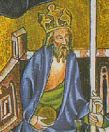
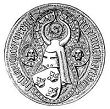



1363 In the spring a revolt against David II of Scotland, led by Robert Stewart and his sons along with the earl of March and earl of Douglas is quashed, and they renew their fealty on May 14; David then marries Margaret Logie, and tries to sell his English successor idea to the Scottish parliament again. In July the Truce of Evran ends the civil war in Brittany with an agreement to split it in half; too bad, nobody wants just half? John II of France gives the duchy of Burgundy to his 4th son Philip II the Bold (le Hardi) (1342-1402) as an appanage (for his support) (until 1402); Burgundian domination of the Netherlands and annexation of extensive areas in the Low Countries, along with Flanders, Artois, and Franche-Comte begins to corrupt the Dutch language with French, and eventually threatens the monarchy (until 1477). Waldemar IV of Denmark forces the Hansa towns to accept a peace which greatly curtails their privileges, ending the First Danish-Hansa War (begun 1361). Archduke Rudolf IV of Austria enters into an inheritance contract with the "Ugly Duchess" Countess Margarete Maultasch (Bag Mouth) (1318-69) of the Tyrol (Tirol), which brings it under Austrian Hapsburg rule after her death. Dmitri Konstantinovich is deposed, and Dmitri Donskoi is crowned as prince of Vladimir (until 1389), marrying Konstantinovich's daughter Eudoxia in 1366. Scandinavia begins to congeal like Jell-O? The Swedish nobles revolt again, are banished, and offer the Swedish crown to duke Albert (Albrecht) of Mecklenburg (1338-1412), son of King Magnus II's sister Euphemia, and with help from the German Hanseatic cities they conquer Stockholm and throw Magnus in prison; next Feb. 18 Albert is crowned king Albrecht I of Sweden (until 1389), becoming the first king crowned with the Swedish Three-Crown Seal, becoming a tool of the nobles; meanwhile Magnus' son Haakon VI of Norway marries Margreta (Margaret) I of Denmark (1353-1412), daughter of Waldemar IV. Constantin III dies, and his cousin Constantine (Gosdantin) IV (-1373) becomes Lusignan king #3 of Lesser (and lesser?) Armenia (Cilicia) (until 1373), going on to offer Peter I of Cyprus (d. 1369) the port and castle of Corycus in exchange for an alliance against the pesky Muslims. The Ottomans begin conquering S Bulgaria and Thrace (ends 1366). Golconda in S India revolts from Warangal, seceding next year. Callistos dies, and with the influence of Hesychast ex-emperor John VI Cantacuzene, Philotheus (Philotheos) Kokkinos ("the redhead") (1300-78) regains the patriarchate of Constantinople (until 1376) (1st time in 1353-4), sending Bulgarian Hesychast monk Cyprian (1336-1406) to Russia as his ambassador in 1373, with a master plan of uniting all Slavic lands under the mysticism-loving Hesychast brand of Greek Orthodoxy that hates Aristotelian rationalist Roman Catholicism. The city of Bolzano (Bozen) in Italy becomes a possession of the Hapsburg family (until 1918). The Great Days of Cracow see the founding of Cracow U. by Kasimir III. English becomes the official language of England - an or the? Tamerlane begins the conquest of Asia. France establishes a hearth tax - which is heartily despised? Munich, Germany creates a 12-man city council to oversee beer production, becoming so picky that by 1372 there are only 21 brewers left in town, causing them to sell beer sans aging to keep up with the demand; in 1420 the city decrees that all beer must be aged for at least eight days; in 1450 there are still only 30 brewers in town, and Bavarian Duke Stephan II asks people to brew more beer at home. Nonfiction: Guy de Chauliac (1300-68), Inventarium Sive Chirurgia Magna (The Great Surgery); surgery manual. Births: English Roman Catholic archbishop of Canterbury (1414-) Henry Chicheley (Chichele) (Checheley) (d. 1443) in Higham Ferrers, Northamptonshire; educated at Winchester College, and New College, Oxford U.; founder of All Souls College, Oxford U. Deaths: French philosopher John Buridan (b. 1292) (plague?).
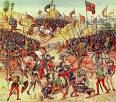


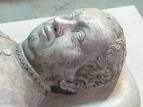


1364 In Jan. after a hostage flees, good fellow John II the Good of France (b. 1319) returns to welcome and luxurious captivity in England, where he falls ill in Mar. and dies in Apr.; on May 19 his unhunky son (by wife Bona of Bohemia) Charles V the Wise (1338-80) of France is crowned Valois king #3 of France (until 1380), becoming a modern type of statesman who makes France's future depend on the monarchy rather than the Estates-Gen., and begins a gen. reform and reconstruction of the kingdom, reforming and beefing up the military; a cool Coronation Book of Charles V of France is pub. next year under his direct supervision; he suffers from an abscess in his left arm that doctors tell him will kill him within 15 days if it ever dries up, ramping up his taxi meter?; he soon establishes the Marmousets (men of humble birth) as his royal ministers, helping to stabilize his admin. On Mar. 4 the Scottish parliament in Scone refuses to recognize a son of Edward III as heir to the Scottish crown. On May 16 Bertrand du Guesclin (1320-80) of Brittany, the first great French soldier in the Hundred Years' War defeats Charles II the Bad of Navarre at the Battle of Cocherel, driving him from his Norman lands and ending his threat to Paris; after being made lt. of Normandy and count of Longueville, on Sept. 29 (Michaelmas) Guesclin is taken POW at the Battle of Auray, and later ransomed; Charles de Blois is killed, ending the Breton War of Succession (begun 1341), with Duke John de Montfort, backed by English forces under Sir John Chandos (-1370) (founding member of the Order of the Garter, and close buddy of Edward the Black Prince) winning a decisive V; meanwhile on Sept. 16 Duke John IV of Monfort (b. 1295) dies before the big V, and his son Duke John V succeeds - John the Duke? A pact mutual inheritance between the Hapsburg and the Luxembourg dynasties is signed at Brno in Moravia by HRE Charles IV and his son-in-law Duke Rudolf IV the Founder of Austria. Crete revolts against Venetian rule. "Black Archibald Douglas is appointed Warden of the Western March; too bad, Annandale, the greater part of it is in English hands, and it takes him until 1383 to drive them out. Ava (Innwa) (Ratanapura) ("city of gems")near Mandalay in Burma is founded by king Thadominbya as the new capital (until 1841) by digging a canal between the Ayeyarwady and Mytinge Rivers. The Aztecs begin bldg. their capital Tenochtitlan. Thomas DuBuisson is paid to paint vermillion crosses all over the Louvre (home to French royalty) so that it would become a sacrilege to go number one or two there? Architecture: The Convent of the Intercession is founded in Moscow on the banks of the Kamenka River. Inventions: The first recorded use of a hand gun ("hand cannon") in Europe; by 1378 they are spreading across Europe. Music: Guillaume de Machaut (1300-77), Mass for Four Voices; for the coronation of Charles V at Rheims. Nonfiction: Nicole Oresme (1320-82), Le Livre du Ciel et du Monde (The Book of Heaven and Earth); questions the theory of a stationary Earth, suggesting that it revolves, and proposes Galileo's law of falling bodies; too bad, until Euro militaries become dependent on cannon in the 16th cent. and need scientists to figure out cannonball trajectories, science is only a hobby for univ. profs., who make their livings with theology and dialectic, and mathematics is still too primitive to get very far - the wizards are still mired in alchemy, and the geniuses are too busy reaping commissions from the Church and aristocracy for art works? Births: English hotshot Sir Henry Percy (Harry Hotspur) (d. 1403) on May 20; eldest son of Henry Percy, 1st earl of Northumberland (1341-1408). Italian feminist writer Christine de Pizan (Pisan) (d. 1434) on Sept. 11 in Venice; first prof. woman writer in Europe. English warden of the Scottish border and earl marshal Ralph Neville, 4th Baron Neville de Raby, 1st Earl of Westmoreland (d. 1425) in Raby Castle, Durham; son of John de Neville, 3rd Baron Neville (-1388); husband of Joan Beaufort, half-sister of Henry IV and daughter of John of Gaunt; father of Cicely Neville (1415-95), mother of Edward IV and Richard III; grandfather of Charles Neville, 6th Earl of Westmoreland (1543-1601); created earl in 1397. Italian humanist Niccolo Niccoli (d. 1437); pupil of Manuel Chrysoloras (1350-1415). Islamic Sunni Mamluk religious scholar Ahmad al-Maqrizi (al-Makrizi) (d. 1442) in Cairo. Deaths: English chronicler Ranulf Higdon (b. 1280) in the monastery of St. Werburgh, Chester; leaves Polychronicon (7 vols.), a universal history in Latin to the year 1357 C.E., containing a World Map; it is tr. into English in 1387 by John of Trevisa, and printed by William Caxton in 1480. Scottish king Edward Balliol (b. 1284) in Jan. in Yorkshire, England. Japanese Ashikaga pretender emperor #1 (1331-3) Kogon (b. 1313) on Aug. 5. French Valois king (1350-64) John II the Good Fellow (b. 1319) in Apr. in England.
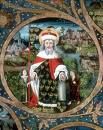

1365 On Mar. 3 the Battle of Gataskogen sees Albert of Mecklenburg defeat and capture recently-elected Swedish king Magnus Eriksson, becoming king of Sweden (until 1389). On Apr. 12 (Easter) the Treaty of Guerande (Guérande) ends the Breton War of Succession (begun 1341); Charles V recognizes John (Yann) (Jean) IV/V (the Conqueror) de Montfort (1339-99) as duke of Brittany, foiling the English, who wanted him to pay homage to Edward III. On June 2 the Hungarians under Louis I occupy Vidin in NW Bulgaria, capturing it and imprisoning Ivan Sratsimir of Bulgaria, renaming it the Banate of Bulgaria (until 1369). On June 4 HRE Charles IV is crowned king of Burgundy, making him the personal ruler of all kingdoms in the HRE. In June Charles V of France and Pope Urban V call for a Crusade in Hungary, to be led by French mercenary soldier (monk turned renegade?) Sir Arnaut de Cervole l'Archipretre (the Archpriest) (1300-66), leader of a brigand co. in France, the idea being to rid France of all of these "late-comers" (tard-venus) left over after the treaty was signed; as they try to leave France, however, the citizens of Jew-friendly Strasbourg refuse to let them cross the Rhine bridge, and they end up returning to France, after which Cervole is killed next year by his own lts. after pillaging Champagne and Lorraine. On July 27 Rudolf IV the Founder (b. 1339) dies, and his younger brother Leopold III (1351-86), son of Albert II (d. 1358) becomes Hapsburg duke of Austria (until 1379), as well as duke of Carinthia and Styria (until July 9, 1386), becoming the first admin. of Tyrol (Tirol) in 1369. In Oct. the Alexandrian (King Peter's) Crusade sees the Knights of St. John under Peter I of Cyprus lead 400 ships which sack Alexandria in Egypt for two days, after which the Mamluks try to block the harbor with rubble and ban Venetian traders, forcing them to search for new trading routes; the news causes Muslims to arrest the whole Franciscan community in Jerusalem and close the Holy Sepulchre, causing the Franciscans to resort to suicide attacks. On Nov. 22 the Peace of Vordingborg (Wordingborg) between Denmark and the Hansa towns deprives them of many of their privileges in Denmark. The Ottomans under Murad I (1326-89) siege Adrianople (Adrianopolis) (Edirne) in Thrace 130 mi. NW of Constantinople, and after taking it in 1369 make it their capital (until 1453), using it as a base to attack Serbia and Bulgaria, with Murad I assuming the title of sultan (until June 15, 1389) - yo, Adrian, next capital Constantinople? The U. of Vienna, the oldest univ. in the German-speaking world is founded on Mar. 12 by Austrian Hapsburg Duke Rudolf IV (1339-65) in another effort to keep up with Charles U. in Prague (1347). Giovanni Boccaccio is sent on a 2nd mission to the papal court in Avignon (first in 1354). A revolt against the Venetian rulers of Crete fails. Bahmani Sultan Mohammed Shah I invades the Vijayanagara Empire. The Sukhothai Kingdom in N Thailand becomes a tributary of the Ayutthaya Kingdom (founded 1350). Singhapura (Sans. "lion city") (modern-day Singapore) (once home of many lions) off the S tip of the Malay Peninsula (95 mi. from the equator) is destroyed (refounded in 1819). Inventions: The martial art of Kun Tao is developed in Mindanao. Sports: On June 12 Edward III bans soccer playing in London, ordering archery practice instead. Architecture: Schweppenburg Castle is built, becoming a modern-day tourist site on the Vulkan Express. Deaths: Bavarian duke (1347-65) and Brandenburg margrave (1351-65) Louis VI the Roman (b. 1328) on May 17 in Berlin. Austrian duke (1358-65) Rudolf IV the Founder (b. 1339) on July 27 in Milan.


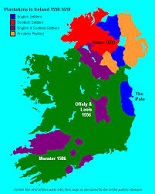
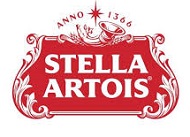
1366 A promising Millennium Fever year (1-3-6-6) causes French ascetic Jean de Roquetaillade (-1362) of Avignon to predict the coming of the Antichrist this year. Early in the year Edward the Black Prince leaves Spain, Henry Trastamara returns, and fights the civil war; John of Gaunt, duke of Lancaster (patron of poet Geoffrey Chaucer) aids his ailing brother the Black Prince, although he lacks his military skill; Bertrand du Guesclin "charmingly extorts" 200K francs from the pope to finance a Grand (Catalan) Co., and a 30K-man brigand expedition is sent to Spain to aid illegitimate son of Alfonso XI, Jew-killer Count Don Henry (Enrique) de Trastamara (Trastámara) (1334-79) in his claim for the throne of Castile and Leon. The Ottomans lose Mel Gibson, er, Gallipoli (until 1376), but capture Thrace, and make Adrianopole their main base for European conquest, shrinking the Byzantine dominions. 18-y.-o. bimbo Alice Perrers (1348-1400) becomes Edward III's royal mistress, becoming very influential with the old fool; by 1369 Edward III falls into his dotage and begins to lose interest in official business, falling under the sway of his mistress and his unscrupulous barons and advisers as the French war goes bad? - it wasn't me, it was a French judge? The original Wanted Posters for Kennedy? After the Anglo-Norman settlers in Ireland become too Irish for the English to swallow, the 36 Statutes of Kilkenny protect the racial purity of the English in Ireland, forbidding intermarriage and requiring the Irish to speak English, decreeing excommunication and heavy penalties for following the customs of or allying themselves with the native Irish, and denying the Irish access to church offices (bishoprics), banning Irish minstrels; nobody is allowed to ride a horse except "on a saddle in the English fashion", causing Irish rebels to love riding bareback; the statute is widely ignored, nativist rulers started gaining ground amid a Gaelic cultural revival, and by the time of the War of the Roses (1450) the authority of the English crown shrinks to the English Pale, a small coastal district of four counties around Dublin and the port of Drogheda incl. Dalkey, Dundalk, Naas, Leixlip, Trim, and Kells enclosed by an earthen rampart, causing the phrase "beyond the Pale" to be coined; the Kilkenny Cat allegedly will fight until only its tail is left. The 1K marks of annual tribute promised by King John I to the pope is 30 years in arrears, and when Edward III consults Parliament, the latter replies that they had never consented to it, so the payment is permanently ceased. Pope Urban V sends legates to Paris to announce that all candidates for an arts degree at the U. of Paris have to thoroughly study Aristotle. Blanche d'Evreux (Navarre), Countess of Gisors (1332-98) (queen consort of Philip VI) succeeds Jean de Saint-Clair as grandmaster of the Priory of Sion (until 1398) :). Germans are excluded from the privileges of the Hanseatic League, whose four main kontors (trading stations) are at Wisby (Gothland), Bergen, London, and Bruges. The Den Hoorn Brewery is founded in Leuven, Belgium; in 1717 head brewer Sebastien Artois purchases it and changes the name to Artois Brewery; in 1926 it introduces Stella Artois, named after the Christmas star, with a horn logo, exporting to the Euro market in 1930; in 1988 it becomes part of Interbrew. Sports: The first mention is made of bowling in England. Architecture: Meier Abdeli and Shmuel (Samuel) ben Meir build the El Transito Synagogue in Toledo, Spain. Births: Dutch (Flemish) painter Hubert (Huybrecht) van Eyck (d. 1426); older brother of Jan van Eyck (1390-1441). Deaths: English gen. Ralph de Neville, 2nd Baron Neville (b. 1291). Italian painter-architect Taddeo Gaddi (b. 1300).

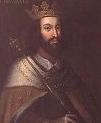

1367 It's better to burn out than rust? On Jan. 18 Pedro I (b. 1320) dies, and his 2nd oldest son Ferdinand (Fernando) I (the Handsome) (the Inconstant) (1345-83) becomes king #9 of Portugal (until 1383). In Feb. after poor little deposed cruel boy Peter I the Cruel of Castile seeks help from the English, Edward III of England, after some debate ignores the Peace of Calais and sends his son Edward the Black Prince (gov. of Aquitaine) with an army, along with a div. of the English army under his brother John of Gaunt; in Apr. Henry II Trastamara and his Spanish and French troops are defeated at the Battle of Najara (Nájara) (Navarette) near the Ebro River; Peter I the Cruel is restored as king, although the English forces suffer heavy losses, and the Black Prince contracts an illness in Valladolid from which he never recovers; James IV of Majorca, who invaded Castile with him in hopes of getting help regaining Majorca also gets sick, and is captured by Henry II, but is ransomed by his wife Joan I of Naples; after Pedro the You Know What reneges on reimbursing him for expenses, the Black Prince is forced to levy heavy taxes for the war, causing the people of Aquitaine to grumble, and the disgruntled nobles to eventually protest to Charles V, who is busy destroying the remaining brigand cos. On Apr. 18 (Easter). In May Pope Urban V sails from Marseille to Rome, taking the Avignon papacy with him, ending the Babylonian Captivity (begun 1309); Giovanni Boccaccio visits Rome in order to congratulate him; too bad, he returns to Avignon in 1370, and it's back on (until 1377). The prince of Moldavia conquers and annexes the fertile wedge-shaped region of Bessarabia between the Prut and Dniester Rivers extending NW 300 mi. from the Black Sea. The Bahmani defeat the huge but weak armies of Vijayanagar using artillery manned by Europeans and Ottoman Turks, then massacre 400K in the Deccan. The Confederation of Cologne is formed by 77 German towns to fight Denmark; meanwhile Scandinavian alliances are made against Denmark. David II of Scotland, finally recognizing him as a potential heir arranges the marriage of John Stewart (the future Robert III) to Annabella Drummond (1350-1401), niece of his 2nd wife Margaret, causing his daddy Robert Stewart (later Robert II) to give him the good ole Gaelic earldom of Atholl in May, followed by the old Bruce earldom of Carrick next June from the king; too bad, she bears two daughters but no sons, causing her hubby's rival and brother Robert Stewart, duke of Albany to back the Salic law barring women from inheriting the throne; in 1390 she is crowned in Scone with Robert III, and finally has a son, James I in 1394. The Chinese discover the 49 sq. mi. 64-islet Pescadores (Port. "fishermen's islands") in the Taiwan Strait 30 mi. from Taiwan; the Portuguese discover them in the 16th cent. The king of Navarre hires a Moor to teach them about cannon and artillery. Geoffrey Chaucer is given a life pension for being a valet of the king's household. Czech archdeacon Militz of Kromeriz proclaims that the Antichrist will come this year and bring the End of Days. Charles V of France founds the first royal library. The League of God's House (Gotteshausbund) in Engadine, Switzerland N of the Valtellina is formed. Jam Tamachi (Jam Khairuddin Al-Maroof Jam Tamachi bin Jam Unar (-1379) becomes sultan of Sindh in modern-day SE Pakistan (until 1379), founding the Makli Necropolis near Thatta for Sufi saint Shaikh Jamali, becoming the main funerary site for the Samma Dynasty with capital near Thatta, and filled with big tombs by the Mughals in 1570-1640; it eventually houses 500K-1M tombs. Architecture: Dmitri II Donskoi builds the first stone Kremlin (fort) in Moscow, after which all other city developments encircle it in concentric rings. The Great Mosque of Gulbarga (founded 1358) in India is roofed with domes. Births: Two grandsons of Edward III are born, and one does in the other? English king (1399-1413) Henry IV of Bolingbroke (d. 1413); eldest son of John of Gaunt and Blanche of Lancaster; grandson of Edward III; founder of the Lancastrian (red rose) Dynasty, which dukes it out with the York (white rose) Dynasty. English king (1377-99) (last Plantagenet king) Richard II Plantagenet (d. 1400) in Bordeaux, Acquitaine; son of Edward the Black Prince (1330-76) (brother of John of Gaunt) and Joan, the Fair Maid of Kent; grandson of Edward III. Queen consort of Naples (1406-14) Mary of Enghien (d. 1446); sister of Peter of Enghien (Pierre d'Enghien), count of Lecce (-1384); grandmother of Isabella of Clermont/Taranto (1424-65). Deaths: Egyptian Muslim scholar Ahmad ibn Naqib al-Misri (b. 1302) in Cairo; leaves Umdat al-Salik wa Uddat al-Nasik (Arab. "Reliance of the Traveller and Tools of the Worshiper), a manual of Shafi'i Sunni jurisprudence, which is trans. into English in 1991, becoming the first std. Islamic legal ref. work translated into a Euro language. Italian sculptor Nino Pisano (b. 1315). Portuguese king (1357-67) Pedro I (b. 1320) on Jan. 18 in Estremoz.

1368 A revolt against high taxes causes Waldemar IV of Denmark to flee (unti 1370); meanwhile in Aug. 1361 the Second Danish-Hanseatic War begins (ends May 1370), with the Hansa towns supported by Sweden, Norway, Holstein, Mecklenburg, and even some Danish nobles. Tamerlane (Timur) ascends the throne of Samarkand (until 1405). The Lithuanians under grand duke (since 1345) Olgerd (Algirdas) (-1377) siege Moscow, but are thrown back by grand duke (since 1360) Dmitri II. The Black Death was actually good for Chinese? Chinese peasant (former Buddhist monk) Zhu Yuanzhang (Yuan Zhang) (Chu Yuan-chang) (1328-98) leads Chinese rebels from S China to capture Guangzhou, causing Mongol ruler (since Dec. 19, 1332) Toghan Temur to flee to Kai Ping (Karakorum); the Yuan Dynasty (founded 1271) ends, and the Ming (Chin. "luminous") Dynasty (ends 1644), vased, er, based in the new city of Nanjing (Nanking) (Chin. "southern capital") begins (ends 1644), becoming the first reunion of China by the S (next time is the Communists in 1948); on Jan. 23 Zhu Yuan Zhang takes the title Ming Taizu (Tai Tzu) (T'ai Tsu) (1328-98) of the Hong (Hung) Wu (Chin. "vast military") becomes Ming emperor of China #1 (until June 24, 1398), with the motto: "Exiling the Mongols and restoring the Han", going on to end the Confucian view of the military as inferior to scholars; in Sept. the Mongols flee their capital of Khanbaliq (modern-day Beijing) along with the rest of N China and retreat to Mongolia; Ming Taizu promulgates the new Ta (Da) Ming Lu (Chin. "Immutable Laws") law code (completed in 1397), and restore the Great Wall of China, along with a gen. policy of isolation, while the introduction of Western foodstuffs such as wheat and yams causes a 50% pop. increase during his 30-year reign; too bad, he doesn't like merchants, and introduces paper currency, running the presses until he creates inflation. After they get ridiculously impractical, Charles V bans the manufacturing of pointy shoes (Cracows) in Paris. David II tries to get his marriage to childless Margaret of Logie annulled, and takes new mistress (known for her heroic defense of Dunbar Castle in 1338) Agnes Randolph, Countess of Dunbar and March, 4th Countess of Moray (1312-69) (AKA Alice Dunbar and Black Agnes because of her olive complexion), daughter of Thomas Randolph, 1st earl of Moray (-1332), and sister of George, earl of March and John, lord of Fife, whose marriage would bring the support of valuable allies such as Robert Erskine, "Black" Archibald Douglas of Galloway, James Douglas of Dalkeith, and Walter Leslie; too bad, Margaret blocks the annulment and gets financial backing from England and writes the pope to issue an interdict on Scotland; meanwhile David has Robert Stewart and his sons John and Alexander briefly imprisoned to intimidate him into slowing down his acquisition of lands. Poetry: Petrarch (1304-74), Il Canzoniere (The Songs); 366 total, incl. 317 sonnets. Births: Burmese Hanthawaddy king #9 (1384-1421) Razadarit (Burmese "king of kings") (d. 1421) on Jan. 28 in Donwun (near Martaban). Hungarian king (1387-1437), German king (1411-37), Bohemian king (1419-37), and HRE (1433-7) Sigismund of Luxembourg (Brandenburg) (d. 1437) on Feb. 14 in Nuremberg; son of HRE Charles IV (1316-78) and 4th wife Elizabeth of Pomerania (1347-93); brother of Wenceslaus IV (1361-1419); husband (1385-) of Queen Mary of Hungary (1371-95). French Valois king (1380-1422) Charles VI (the Well-Beloved) (the Mad) (d. 1422) on Dec. 3 in Paris; son of Charles V (1318-80) and Jeanne of Bourbon; father of Charles VII by wife (1385-) Isabeau (Isabelle) of Bavaria (1370-1435); goes mad in 1392. Italian condottiero Braccio da Montone (Andrea Fortebracci) (d. 1424) (AKA Braccio Fortebraccio) on July 1 in Montone (25 mi. N of Perugia). Deaths: French surgeon Guy de Chauliac (b. 1300).





1369 A database of 250K English soldiers who fought in the Hundred Years War from this year to 1453 is released in July 2009. Another plague outbreak occurs in Europe (next 1374). On Mar. 14 king (since Mar. 26, 1350) Peter I the Cruel (b. 1334) is cruelly?) defeated again by Henry Trastamara at the Battle of (Campo de) Montiel near Toledo, and KIA in personal combat with Henry Trstamara, who again becomes Henry II of Castile and Leon, founding the Trastamara (Trastámara) Dynasty, which later incl. Ferdinand II and Isabella I of Christopher Columbus fame. In Apr. Charles V launches an effort to revive the French fleet; in May after the count of Armagnac appeals to him against the Black Prince and the latter refuses to appear at his court, Charles declares the Treaty of Bretigny void, then resumes the war with England, causing a revolt to spread through Aquitaine and Gascony; in June King Henry II of Castile and Leon concludes a naval treaty with France; John of Gaunt lands at Calais on July 26. On Nov. 3 the old Assizes of Jerusalem (1099) are revised by 16 commissioners on the island of Cyprus for their use and deposited in the Cathedral of Nicosia sealed with four seals. With coaching from elder statesman Demetrius Cydones (1324-98), Byzantine emperor John V professes the Roman Catholic faith in Rome in a vain effort to obtain papal support against the Ottomans, with the soundbyte: "Even the Turks ask with laughter if anyone has word of the expedition." Venice repels a Hungarian invasion. Amsterdam joins the Hanseatic League. The Mongols force the Yuan Dynasty to flee to He Lin (Karakorum). Charles V the Wise of France negotiates the marriage of John II's son Duke Philip to Margaret III of Dampierre, Countess of Flanders (1350-1405), daughter and heiress of Louis II de Male (1330-84), the last count of Flanders (1346-84) in an effort to keep Flanders out of English hands. Charles V the Wise of France tricks the Estates General into agreeing to make old grants of funds perpetual unless their terms are to be changed, freeing him from their control unless new taxes are needed, and transferring the financial control they grabbed in 1357 to his royal chambre de comptes in Paris. Architecture: The Bastille (Bastille Saint-Antoine) prison at No. 232, Rue Saint-Antoine in Paris is built. Nonfiction: Muhammad Ibn Battutah (1304-77), Rihlah (Travels); covers his jaunts from Tangier through N, E, and Saharan Africa, Spain, Arabia, Yemen, Syria, Iraq, Iran, the Persian Gulf, Anatolia (Asia Minor), the Caucasus, S Russia, India, Maldives, and China. Poetry: Geoffrey Chaucer (1343-1400), The Book of the Duchesse (The Deth of Blaunche) (1368-72?); dedicated to the memory of John the Gaunt's 1st wife Blanche of Lancaster (b. 1345), who dies this year. Births: Italian condottiero (founder of the Sforza Dynasty) Giacomuzzo (Muzio) Attendolo Sforza (d. 1424) on May 28 in Cotignola (Romagna); father of Francesco I Sforza (1401-66) and Alessandro Sforza (1409-73). Czech Hussite Christian reformer Jan Hus (John Huss/Huss) (d. 1415) in Husinetz (Husinec), near Budweis (Prague). Italian humanist historian ("the first modern historian") Leonardo Bruni (d. 1444) in Arezzo, Tuscany; becomes citizen of Florence in 1416; coiner of the term "studia Humanitatis", from whence the word humanist was derived. Deaths: Italian painter Vitale da Balogna (b. 1289) in Udine. English queen (1328-69) Philippa of Hainault (b. 1311) on Aug. 15 in Windsor. Scottish heroine Black Agnes, countess of Dunbar and March (b. 1312). English knight Sir Michael de Poynings, 2nd baron Poynings (b. 1317) on Mar. 15 in Poynings, Sussex. Greek theologian Prochoros Kydones (b. 1330). Spanish Castilian king (1350-69) Peter I the Cruel (b. 1334) on Mar. 14. English noblewoman Blanche of Lancaster (b. 1345) on Sept. 12 in Bolingbroke Castle.

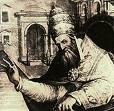



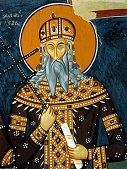
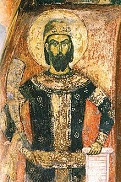


1370 On Feb. 17 (18?) the Teutonic Knights decisively defeat the Lithuanians at the Battle of Rudau N of Konigsberg, ending the Lithuanian threat in Prussia. On Apr. 5 after being crowned co-ruler of the Serbs and Greeks with Emperor Uros in 1365, ruling over the area incl. Prilep, Prizren, and Skopje, Vukasin Mrnjavcevic (1320-71) issues a charter signing himself as "Lord of the Serb and Greek Lands and of the Western Provinces"; later this year or early next year he crowns his eldest son Prince Marko Mrnjavcevic (1335-95) as "Young King", i.e. heir apparent, becoming king and co-ruler with Emperor Uros after his father dies on Sept. 26, 1371, and sole king on Dec. 4, 1371 after Uros dies. The original Brussels sprouts as time goes by for Jews? On May 22 Christians massacre hundreds of Jews in Brussels for allegedly planning to pierce stolen holy wafers with poniards; the rest of the Jews are expelled, and don't return until 1713. In Aug. after Hundred Years' War veteran John de Neville, 3rd Baron Neville de Raby (1337-88) is appointed adm. of the English fleet (until 1378), and English troops ravage the French countryside, winning control of much of S France, sieging Limoges, its bishop surrenders the city to the English, after which English Prince Edward of Woodstock (1330-76) decides he needs a little black fun and sacks it in Oct., massacring 3K, earning the title of Black Prince, which is later subject to a coverup attempt that it's only his black armor; meanwhile the English Parliament begins stepping up protests against the misgovt. of senile old fart Edward III. In Aug. Byzantine emperor John V comes to Rome to discuss the unification of the Eastern and Western churches with Pope Urban V, but the talks get hung up on matters of ritual; in Sept. unsettled conditions in Rome cause Pope (since 1362) Urban V (b. 1310) to return to Avignon, and he dies on Dec. 19; on Dec. 30 Limousin-born Pierre Roger de Beaufort is elected Pope (#200) Gregory XI (1331-78) (until Mar. 27, 1378). In Dec. after "the Eagle of Brittany" Bertrand du Guesclin (1320-80) is made constable of France, the French begin reconquering Poitou and Brittany, and score a number of bloody Vs against the English, earning Olivier III de Clisson (1336-1407) the title of "the Butcher" - the Black Olive? On Nov. 5 king (since 1333) Casimir III the Great (b. 1310) dies without leaving an heir, and the Piast Dynasty in Poland piasts out; his Anjevin nephew Louis I the Hungarian (the Great) (1326-82) of Hungary becomes king of Poland (until Sept. 10, 1382), personally uniting Hungary and Poland and becoming the most powerful Hungarian monarch ruling over an empire "whose shores were washed by three seas", ending up spending most of his attention on all them ?!*!? little kings in Hungary. The Lithuanians siege Moscow again. The German Hanseatic League wins a series of Vs over Waldemar IV of Denmark, who returns to Denmark after signing the Treaty (Peace) of Stralsund on May 24, which gives them a virtual trade monopoly in Scandinavia, incl. four castles which dominate the sound, control of Scandinavian revenues for 15 years, and the right to interfere in the royal Danish succession if their monopoly is not renewed by the candidate; the Hanseatic League is now king in the Baltic Sea, which becomes a German lake. With visions of Genghis Khan dancing in his head, Turkic Mongol warlord Tamerlane (Tamburlaine) (Timur-i Lang) (Timur Lenk) (Timur Leng) (Temur the Lame) (Tamerlano) (1336-1405) ("timur" = iron) gains control of the W Chagatai Khanate, going on to campaign across W, S, and C Asia, followed by Caucasus and S Russia, going on to becoming the most powerful ruler of the Muslim World and found the short-lived Timurid Empire. Bernabo Visconti makes two papal delegates attempting to serve him a rolled excommunication parchment from the pope bearing a leaden seal and wrapped in a silk cord eat the whole thing. Peter IV of Aragon orders the compilation of the Chronicle of San Juan de la Pena to justify the authority of the crown. Architecture: The town hall in Aix-la-Chapelle (begin 1333) is finished. Gray's (Grey's) Inn (Hall) (Manor House) (originally Portpoole Manor) in C London, England is leased by a group of lawyers, named after Portpoole Manor owned by Reynold de Grey, 1st Baron Grey of Wilton (1240-1308), descendant of Norman knight Anchetil (Norse "god-helmet") de Greye (1052-1087), who accompanied William the Conqueror to Britain; it becomes one of the four Inns of the Court around the Royal Courts of Justice in London (Lincoln's Inn, Middle Temple, Inner Temple); members incl. Francis Bacon, William Cecil, and Gilbert Gerard. Inventions: The steel crossbow is first used in war by ? against ? Births: Italian humanist statesman Pier Paolo Vergerio the Elder (d. 1445) on July 23 in Capodistria, Repub. of Venice. Danish king (1376-87) and Norwegian king (1380-87) Olaf II/IV Haakonsson (d. 1387); son of Haakon VI of Norway; grandson of Magnus IV of Sweden. Austrian Hapsburg duke William the Ambitious (the Courteous) (d. 1406) in Vienna; eldest son of Leopold III (1351-86); brother of Leopold IV (1371-1411), Ernest the Iron (1377-1424), and Frederick IV (1382-1439). Lithuanian grand duke (1430-2) Svitrigaila (Svidrigiello) (d. 1452); son of Olgerd (Algirdas) (1296-1377) and Uliana of Tver (Russia); brother of Jogaila (1362-1434); baptized as Greek Orthodox, in 1381 he converts with his mother and brother Jogaila to Roman Catholicism. Dutch printer Laurens Janszoon Koster (d. 1455) (d. 1440?) in Haarlem. Deaths: Polish king (1333-70) Casimir III the Great (b. 1310) on Nov. 5 in Cracow. Italian pope (Blessed) Urban V (b. 1310) on Dec. 19.




1371 The plague returns to England, although milder than in 1361. In Jan. ailing Black Prince Edward leaves France for England, giving the rule of Aquitaine and command of his armies in France to his incompetent younger brother John of Gaunt, Duke of Lancaster (1340-99), who loses town after town, until only Bayonne, Bordeaux, Brest, Calais, and Cherbourg remain in English hands by 1380, causing Edward III's prestige to sink and baronial influence to increase. On Feb. 22 king (since June 7, 1329) David II of Scotland (b. 1324), known for his "raddure" (fearful personal authority) dies in Edinburgh Castle from illness caused by old wounds, ending the Bruce Dynasty, and his 54-y.-o. nephew Robert II Stewart (1316-90) (grandson of Robert I and Isabella of Mar, and son of Walter, 6th high steward of Scotland, and Marjorie, daughter of Robert the Bruce) is crowned king of Scotland (until Apr. 19, 1390), founding the Scottish Stewart (Stuart) Dynasty which battles the rival House of Douglas (earl of Douglas = Black Douglas, earl of Angus = Red Douglas) (whose crest is a green salamander on a chapeau surrounded by fire) (until 1455), and lasts three cents. (until 1714); in the spring he buys his way out of a succession challenge by William of Douglas, 1st Earl of Douglas (1327-84); an old fart whose campaigning days are over, he contents himself with portraying himself on horseback in his prime in his Great Seal of Robert II, deciding to spread his realm among "the sons he maid rych and mychty", going on to give them seven of Scotland's 15 earldoms by 1382, with Fife and Menteith going to his 2nd son Robert, Buchan, Ross and Badenoch in the NE going to his 4th son Alexander, and Caithness and Strathearn to his 5th son David; in addition Robert's eldest son John is earl of Atholl and Carrick, and his sons-in-law John MacDonald, John Dunbar, and James Douglas control the earldoms of the Isles, Moray, and Douglas, respectively, for a total of 13; Robert gets a parliamentary act passed giving his sons and their male heirs the succession, and allows his Scots to raid and seize disputed lands on the English border, causing traffic (commercial, church, pilgrim) between the countries to cease, and threatening the anything-but-biblical peace of David II. On Sept. 26 the Serbs are defeated by the Ottoman Turks at the Battle of Maritsa (Chernomen) on the Maritsa River near Chernomen (modern-day Ormenio), Greece, and since their Roman Catholic brothers won't help them, the Orthodox Catholic Byzantines are up against the icon-filled wall; meanwhile Bulgaria is partitioned into two kingdoms centered on Vidin and Trnovo, while NE Bulgaria is contested by several warlords; Vidin falls to the pesky Ottomans in 1388, and Trnovo in 1393. The English defeat the Flemish at the naval Battle of Bourgneuf. John of Gaunt, his first breed mare, er, wife Blanche of Lancaster having died in 1369, wastes no time and marries Peter the Cruel's daughter Constance of Castile (1354-94) (don't be cruel?), gaining a claim to the throne of Castile. King Hakon of Norway invades Sweden; King Albrecht agrees to compromise, and frees Magnus from prison. English chancellor William of Wykeham (1320-1404), bishop of Winchester asks Parliament for funds to fight the war, and the anticlerical opposition causes the House of Lords to resolve that English clergy cannot hold the offices of chancellor, treasurer, baron of the exchequer, or clerk of the privy council; John of Gaunt sees his chance to use anticlerical feeling for political gain? Emperor (since 1352) Go-Kogon (b. 1336) abdicates in favor of his son Go-En'yu (1359-93) (personal name Ohito), who becomes Japanese Ashikaga (northern) pretender emperor #5 (until 1382). The Siamese send an embassy to Nanking to pay tribute to the new Ming Dynasty. Ruhrort in Duisburg on the Ruhr River is founded as a customs post on "Homberger Werth"; the harbor is not mentioned in records until 1392. Architecture: Carthusian monks build the London Charterhouse in Smithfield, London, England; dissolved in 1537. Births: French Valois duke of Burgundy (1404-19) John II of Valois (the Fearless) (sans Pur) (d. 1419) on May 28 in Dijon; son of Philip II the Bold (1342-1402) and Margaret III of Flanders (1350-1405). German Hohenzollern burgrave of Nuremberg (1398-40) and prince-elector #1 of Brandenburg (1415-40) Frederick I (d. 1440) on Sept. 21 in Nuremberg; father of Frederick II "Irontooth" (1413-71). Hungarian queen (1382-95) Mary of Hungary (d. 1395); daughter of Louis I the Great (1326-82) and 2nd wife Elizabeth of Bosnia (1340-87). Austrian Hapsburg duke (1391-1411) Leopold IV (d. 1411); 2nd son of Leopold III (1351-86); brother of William the Ambitious (1370-1406), Ernest the Iron (1377-1424), and Frederick IV (1382-1439). Italian sculptor Jacopo della Quercia (d. 1438). Chinese eunuch Muslim (Hui) adm. Cheng Ho (Zheng He) (d. 1433) in Kunyang, Yunan Province. Scottish noble James Douglas "the Gross", 7th Earl of Douglas, 1st Earl of Avondale (d. 1443); 2nd son of Archibald "Black" Douglas, 3rd earl of Douglas (1328-1400); father of William Douglas, 8th earl of Douglas (1425-1452), James Douglas, 9th earl of Douglas (1426-91), Archibald Douglas, earl of Murray (1426-55), Hugh Douglas, earl of Ormonde (-1455), and John Douglas, earl of Balvenie (1433-63) - the original Fat Bastard? Deaths: Serbian (1365-71) king Vukasin (b. 1320) on Sept. 26 in Maritsa, Bulgaria (KIA). Scottish king (1329-71) avid II (b. 1324) on Feb. 22 in Edinburgh Castle; buried in Holyrood Abbey; his marble tomb is destroyed in the 17th cent.

1372 On June 22-23 a combined French-Castilian fleet (22 Castilian galleys, 50 English ships) under Adm. Ambrosio Boccanegra (-1373) (newphew of Genoa doge #1 Simone Boccanegra) defeats an English fleet of 48 at the naval Battle of La Rochelle, and captures the the English cmdr. the earl of Pembroke; the English lose all their ships sunk or captured, along with 400 knights and 8K soldiers, and 800 men KIA; in Aug. Edward III and Black Prince Edward sail from Sandwich with a large fleet for France, but are turned back by a storm; the French control the Channel for the first time since 1340, blocking English transport in N France; the French, led by Philip II the Bold reconquer Poitou and Brittany, and defeat England's Norman allies; English armies in France are worn down by French flank attacks, and the French take Poitiers and Angouleme; in Oct. loser Prince Edward resigns his principality of Aquitaine, and retires to his castle in Berkhampstead; meanwhile Prince of Wales Owen-ap-Thomas aided by the French captures Guernsey. The Lithuanians siege Moscow for a 3rd time (first in 1368), then in the summer sign the Treaty of Lyubutsk, ending the Lithuanian-Muscovite War (begun 1368), bringing seven years of peace. The Black Douglases acquire the Earldom of Wigtown (Wigtoun) (Wigton) (created 1341) without royal sanction, creating a bone of contention with the Stewarts (until 1455). Edward III's son Edumund of Langley (earl of Cambridge since 1362) marries Isabel, daughter of Peter the Cruel of Castile. Chinese emperor (since 1368) Ming Taizu orders the release of all people enslaved by the previous don't-make-a-grown-man-cry Mongol regime; the king of Okinawa pledges allegiance to Ming Taizu, opening Okinawa to trade; it remains a tributary of China for 500 years. Shah Hamadan arrives in Kashmir, and converts the pop. to Islam en masse. Wealthy widow Lady Penh finds a Koki tree floating down the Tonle Sap River in Cambodia in a storm, containing four bronze Buddha statues and a stone statue of Vishnu, which are used to built a temple on the hill in what later becomes Phnom Penh ("Penh's Hill"), founded at the junction of the Mekong and Tonle Sap Rivers (modern-day pop. 2.1M); it becomes the capital of Cambodia in 1434-97, and 1865-. The turning point of the lit. life of Geoffrey Chaucer (1343-1400) comes when he meets Petrarch? The Apocalypse of Angers tapestry is produced in this decade in France. Architecture: In this decade the Bastille Saint-Antoine fortress in Paris is built by Charles V, becoming immortal on July 14, 1789. The Leaning Tower of Pisa (begun 1173) is finally completed with the bldg. of the 7-bell Romanesque bell chamber by Tommaso di Andrea Pisano. Births: French duke (1392-1407) Louis I of Orleans (d. 1407) on Mar. 13 in Hotel Saint-Pol, Paris; 2nd son of Charles V and Joanna of Bourbon; younger brother of Charles VI; Scottish leader Archibald Douglas, 4th Earl of Douglas (Tyneman) (The Loser) (d. 1424). Deaths: Ethiopian emperor (since 1344) Newaya Krestos. English traveler John (Jehan) de Mandeville (b. ?); leaves the Anglo-Norman Travels to the East, a big bestseller, full of absurdities, such as that the cotton plant grows "little lambs" at the ends of its branches, which feed off grass; a lot of it is stolen from real Italian missionary Friar Odorico da Pordenone (d. 1331); used as a source by Christopher Columbus; really written by physician Johan de Bourgnone of Liege, France?


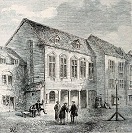
1373 On June 16 the first regular shipment of wine from Portugal to England twenty years earlier results in the Treaty of Perpetual Friendship, becoming the most enduring internat. alliance of all time; Portugal receives fishing rights off the English coast in order to encourage the wine trade; ask somebody what this has to do with Port Wine. In July John of Gaunt lands in Calais with a large army, then leads them around Paris to Bordeaux, arriving at Christmas; meanwhile French constable Bertrand du Guesclin sieges Brest, and seizes and holds most of the duchy of Brittany, earning the nickname "eagle of Brittany". Byzantine emperor John V becomes an Ottoman vassal, recognizing the suzerainty of Ottoman Sultan Murad I - love the skin you're in? Constantin IV dies, and his distant cousin (son of John of Lusignan) Levon (Leon) (Leo) V/VI (1342-93) becomes the 5th and last Lugnan (Latin) king of Lesser Armenia (Cilicia) (until 1375), facing invasions by superior Mamluk forces. HRE Charles IV gains Brandenburg from the Wittelsbachs. Scottish king Robert II gets an act of succession (entail) passed naming his eldest son John as heir, followed by John's three brothers, then his two half-brothers. Tunnage and poundage are imposed on English merchants. Boccaccio is appointed as lecturer on Dante Alighieri in Florence, but illness forces him to return to Certaldo next year. Architecture: Bohemian House of Luxembourg king and HRE (1346-78) Charles (Wenceslaus) IV (1316-78) endows the Dobrow Monastery near Pilsen (Plzen), Bohemia with the beer right, with the brewery becoming the oldest to survive to modern times. Marshalsea Prison on Borough High St. in Southwark, London S of the Thames River is built, housing men charged with sedition and crimes at sea, growing into a debtors prison by the 18th cent., turning into an extortion racket, with those who can pay enjoying college-like amenities while the rest are herded into nine small rooms like cattle, and face starvation and torture; in 1729 a parliamentary committee finds that 300 inmates starve to death in the past 3 mo.; in 1824 Charles Dickens' father is sent there; a second prison is built in 1811; in 1842 Parliament passes an act requiring inmates of Fleet Prison and Marshalsea Prison to be moved to the Queen's Bench Prison, which is renamed the Queen's Prison. Deaths: Syrian Muslim scholar Ismail ibn Kathir (b. 1301) in Feb. in Damascus; dies after going blind from too much study at night. Swedish nun St. Bridget (b. 1303); leaves Revelations, based on personal religious visions - 1373 bottles of beer on the wall?

1374 Another plague outbreak occurs in Europe (Italy and France) (next 1390). In June Edward III the Senile and Charles V the Wise agree to a 2-year French-English Truce, and Charles V makes hay while the sun shines, revamping the chain of command in the French army while continuing to revamp the navy and fortify Paris. The Hospitalers take over the defense of Smyrna. The first Jehovah's Witnesses come from Oxford? Gray-bearded Oxford U. prof. of divinity ("the Morning Star of the Reformation") John Wycliffe (OE "white cliff") (1324-84), having conquered Oxford and made it the spiritual center of England begins preaching his anti-clerical doctrines from the pulpits of London under the patronage of John of Gaunt, and is employed by the govt. to negotiate with the papacy over provisions, becoming Edward III's chaplain; as a church reformer he gets so impatient to get an English trans. of the Bible into the common man's hands that he begins translating it single-handedly, while pub. tracts decrying the secularization of the Church, and claiming that all religious doctrines should be based on the Bible, not tradition or church synods, and that people should have direct access to God and therefore don't need auricular confession, denying the core concept of the Roman Catholic Church, drawing mojo from the inability of the clergy to deal with or even explain the Black Plague except as God's judgment against them; in ? he pub. De Civili Domino (On Civil Authority or Dominion), proposing the disendowment of church property and the exclusion of the clergy from civil govt.; his itinerant proselytizing Poor Preachers, scornfully known as Lollards (Dutch "babblers") spread throughout England, at first reading portions of Wycliffe's English Bible trans. to eager crowds, then teaching people to read his Bible on their own, successfully making a large number of converts, incl. wealthy townsmen and country gentlemen, and doing so well that it is said that every 4th (3rd) (2nd) man is a Lollard. Pope Gregory XI announces that the Inquisition has the right to intervene in sorcery trials, which hitherto had been considered purely civil matters. Geoffrey Chaucer is appointed controller of the customs for hides, skins, and wool in London; the king grants him a daily pitcher of wine. Births: Polish queen/king (1384-99) (St.) Jadwiga (Jadviga) of Poland (d. 1399) on Feb. 18; Angevin daughter of Louis I the Great of Anjou, king of Hungary and Elizabeth of Bosnia. English heir presumptive (to Richard II) Roger de Mortimer, 4th Earl of March (d. 1398) on Apr. 11 in Usk, Monmouthshire; son of Edmund Mortimer, 3rd earl of March (1352-81). English bishop of Winchester (1403-47) and cardinal (1426-47) Henry Beaufort (d. 1447) in Anjou, France; 2nd son of John of Gaunt and Katherine Swynford; declared legitimate by Richard II in 1390. Italian humanist educator Guarino da Verona (d. 1460); pupil of Manuel Chrysoloras (1350-1415). Deaths: Chinese painter-poet Ni Tsan (b. 1301). Italian sonneteer Petrarch (b. 1304) on July 18; leaves Sonnets, all addressed to Laura - I'll be joining you soon, Laura? German scholar Konrad von Megenberg (b. 1309) in Ratisbon (Regensbug). Norwegian king (1319-55) and Swedish king (1319-64) Magnus II Eriksson (b. 1316) on Dec. 1. Japanese Ashikaga pretender emperor #4 (1352-71) Go-Kogon (b. 1336) on Mar. 12. Scottish queen Margaret Logie; buried in Avignon.

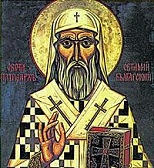
1375 On Oct. 24 Hansa-poor Danish king (since 1340) Waldemar IV Adderdag (b. 1320) dies without a male heir, and his daughter Queen Margreta negotiates for her son Olaf (Olav) to succeed him, with herself as regent. On Dec. 2 after longtime pressure from Lithuanian grand prince (since 1345) Algirdas (Olgerd) (1296-1377) and Polish king Casimir III over the failure of aging Russian metropolitan Alexis (-1378) to tend to any flock but Moscow's, Constantinople patriarch Philotheos (-1377) consecrates Bulgarian Hesychast monk Cyprian (1336-1406) as metropolitan of Kiev, Russia, and Lithuania, with the provision that he will reunite his metropolitanate with Moscow upon Alexis' death; too bad, Philotheos dies before Alexis. After Levon V surrenders Kapan Fortress to the Egyptian Sunni Muslim Mamluks, the 1.5K-y.-o. kingdom of Armenia collapses as 30K Mamluks enter the capital of Sis in Lesser Armenia; Levon is sent as a POW to Cairo for several years, until he is ransomed in 1382 with precious stones, silks, and birds of prey by John I of Castile, who makes him lord of Madrid for life, but he leaves for France in 1390 when John I dies, then dies in Calais on Nov. 29, 1393, and is buried in Paris in St. Denis Basilica under the name "Prince Lyon de Lusignan". England and France sign the Truce of Bruges, and England loses most of its possessions in France except the ports of Calais, Bordeaux, and Bayonne; John of Gaunt returns to England and allies with the corrupt court party led by his aging daddy Edward III's mistress Alice Perrers (1348-1400), for a while ruling the country while enriching himself and his favorites, stirring up opposition by the House of Commons. James IV of Majorca (b. 1336) dies after a last defeat by Aragon, and he passes his claims on Majorca to his daughter Isabel of Majorca (1337-1406), who becomes the last queen of Majorica as Elizabeth I of Mallorca and countess of Roussillon and Cerdany (until 1406). The Ottomans annex parts of the Anatolian principalities of Germiyan and Hamideli (1375-80). Dmitri Donskoi defeats Prince Mikhail II of Tver, cementing his control of Vladimir, and allowing him to gather troops to take on the Mongol Horde. (St.) Euthymius of Tarnovo (1325-1402) becomes patriarch of Bulgaria (until 1393). English begins to be taught in English schools. The Sican (Sicán) Civilization in N Peru (founded 800) ends. The capital coastal city of Oulu (Uleaborg) on the Gulf of Bothnia in N Finland is founded by the Swedes as a fort to defend against the Russians. Zerbster Bitterbier, made in Zerbst, Saxony-Anhalt, Germany (between Berlin and Hannover) is first mentioned; the town grows to 600 breweries during the Middle Ages; it is last brewed in 1949. Sports: Charles V of France prohibits the playing of chess. Nonfiction: Anon., Annals of Ulster; written about this time, covering the years from 431 C.E., later extended to 1540 C.E. Anon., The Red Book of Hergest; written about this time. Poetry: John Barbour (1316-95), The Brus (Bruce) (1370-5); pub. posth.; first major lit. figure to write in Lowland Scots; 14K-line chivalric work by the archdeacon of Aberdeen about Scottish heroes Robert I the Bruce, Sir James "Black" Douglas, and the Earl of Moray fighting for their freedom from the stankin' English, starting with the 1276 death of Alexander III and ending in 1332; paid for by Robert I's grandson Robert II, becoming the favorite of England-hating Scots for cents.; the real reason at the time is to paint the Stewarts as the rightful heirs of the Bruces, and paint pesky William Wallace off the canvas?; "Fredome mays man to haiff liking" - there is no such thing as an insignificant detail? Births: Jerusalem king (1398-1432) and Cyprus king (1398-1432) Janus of Cyprus (d. 1432) in Genoa, Italy; son of James I of Cyprus (1334-98) and Helvis of Brunswick-Grubenhagen. Dutch painter ("the Master of Flemalle") Robert Campin (d. 1444). Deaths: Florentine writer Giovanni Boccaccio (b. 1313) in Certaldo; leaves The Life of Dante and Commentary on Dante's "Divina Commedia". Danish king (1340-75) Waldemar IV Adderdag (b. 1320) on Oct. 24.

1376 In Mar. the Genoese engineer a coup against Byzantine emperor (since 1341) John V Palaeologus (b. 1332) by his son Andronicus IV Palaeologus (1348-85), who becomes Byzantine emperor (until 1379); he deposes Philotheos in favor of Genoese puppet Macarios, who becomes Constantinople patriarch (until ?), and promptly gets paid off by Moscow via Genoese bankers to cut Cyprian loose; John V and his son Manuel II are imprisoned, but escape next year with Venetian help; meanwhile the Turks, Genoese, and Venetians fight over the Byzantine throne until Manuel II's accession in 1391; "It is like a storm at sea where we are all in danger of going down" (Demetrius Cydones). On Apr. 28-July 10 the English Parliament, led by Edward the Black Prince enacts extensive reforms, becoming known as the Good Parliament; it impeaches two of the king's foremost courtier ministers, William, 4th Baron Latimer and Richard Lyons of malversation for war profiteering, becoming its first use of impeachment; they are convicted, removed, fined and imprisoned, along with several other lesser courtiers, setting the English precedent of parliamentary impeachment of the king's ministers for acting illegally, even if by the king's orders; too bad, on June 8 ailing Prince Edward (b. 1330) dies in the midst of a session before his father Edward III, opening up a long rivalry between the descendants of his two younger brothers which leads to the War of the Roses. On May 3 Olaf (Olof) (Oluf) Haakonsson (1370-87), son of King Haakon VI Magnusson of Norway and Queen Margreta (Margaret) of Denmark, and grandson of Waldemar IV of Denmark is elected king Olaf II of Denmark (until Aug. 3, 1387), with Margreta as regent; on July 29, 1380 he becomes Olav IV of Norway; he never personally exercises royal power. On July 2 Wenceslas (b. 1361), son of HRE Charles IV is elected king of the Romans (until 1419) by the six prince-electors after his daddy revokes the privileges of several imperial cities and mortgages them to various nobles for their votes, pissing-off 14 Swabian cities, which revolt on July 4, forming their own Swabian League and becoming an independent state within the empire (until 1389). On Dec. 25 aging king Edward III holds a Christmas feast at Windsor Castle, seating 10-y.-o. prince Richard (future Richard II) at his side to mark him as a heir; he is crowned 7 mo. later. Stephen Tvrtko (d. 1391) proclaims himself King Tvrtko I of Bosnia and Serbia. Dmitri Donskoi and Dmitri Konstantinovich join armies and ravage Volga Bulgaria. Brunei sultan Muhammad Shah (-1402) converts to Islam. Siam and the Thai state of Chiang Mai ("the Rose of the North") in the N Menam Valley begin two cents. of friction (until 1557); meanwhile Siam exerts strong infuence over the disunited states of Burma and the N Malay Peninsula. To avoid soiling the Seine River, butchers in Paris are allowed to use the Bievre (Bièvre) (Fr. "Beaver") River nearby, with more industry moving in and turning it gradually into a polluted industrial river with a living and dead arm; in 1875 the city decides to conceal it, making it part of the sewer system. John Wycliffe begins translating the Latin Bible into English (finished in 1381). Hamburg, Germany has 457 burgher-owned breweries, growing to 531 in 1526; the main product is whitish Keutebier ale, made mostly of wheat, which by the early 20th cent. evolves into Kolsh (Kölsch) pale ale. Births: Czech archbishop of Prague #5 (1403-11) Zbynek Zajic of Hazmburk (Hasenburg) (d. 1411) in Bohemia; purchases the archbishop post in 1402 for 2.8K gulden plus 1.48K gulden to cover his predecessors' debts. Spanish poet-historian Perez de Guzman (d. 1458). Deaths: English prince of Wales Edward the Black Prince (b. 1330) on June 8 in London; buried in Canterbury Cathedral, where his armor is hung, parts of which survive to modern times; his father Richard II orders the tomb built as much as a decade after his death, ordering two identical tombs along with his father Edward III.






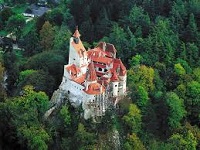
1377 In late May pagan Lithuanian grand duke (since 1345) Olgerd (Algirdas) (b. 1296) dies, and his pagan son Jogaila becomes grand duke Wladyslaw II Jagiello (Jogaila) (1362-1434) along with his uncle Kestutis (until 1382); Hapsburg Duke Albert III "the Pigtail" of Austria goes on crusade against him. On Jan. 27-Mar. 2 after the Good Parliament closes on July 27, and John of Gaunt regains power and returns Alice Perrers to court, the Bad Parliament (last during the reign of Edward III) convenes, undoing the work of the Good Parliament in fighting corruption in the royal council and passing the first-ever poll tax of 4 pennies for every person over age 14, which taxes even the poor and causes a peasant rebellion to simmer, electing for the first time a speaker for the House of Commons, Sir Peter de la Mare (1294-1387) in Oct.-Nov., followed next (this?) Jan. by Sir Thomas de Hungerford (-1397); in May they dislodge John of Gaunt from power, and banish Alice Perrers from court, to the dismay of Edward III; unfortunately (or luckily, depending on whose side you're on?), on June 21 half-cent.-in-power (since Jan. 25, 1327) Edward III (b. 1312) dies (after calling Parliament 27x since 1337, although they actually meet 37x), and on June 21 Black Prince Edward's 10-y.-o. son (Lionheart Not)?) Richard II (1367-1400) is named heir apparent, and crowned as England's 32nd monarch (until Sept. 29, 1399), with his uncle Edmund of Langley as regent and his uncle John of Gaunt retaining his military power. On June 23 (two days after Richard II's accession) the French renew their war with England, and use their control of the seas to attack the English across the English Channel in the summer, sacking Lewes, Plymouth, Hastings, and Rye. Better late than never? The the summer the first plague quarantine ("40") (actually 30-40 day isolation) station is set up in the coastal town of Cavtat in Croatia, followed by the nearby coastal town of Dubrovnik (AKA Ragusa) on July 27; N Italy follows, with quarantines set up in Venice and other Mediterranean ports. On Nov. 19 Louis I of Hungary issues a decree giving the Saxons of Kronstadt (Brasov) the right to build a castle on the border between Transylvania and Wallachia, which becomes Bran Castle, which in 1438-42 is used to defend against the Ottomans, and is featured in Bram Stoker's 1897 novel "Dracula". On Dec. 12 gouty aging HRE Charles IV visits Paris (until Jan.), wowing everybody and becoming the biggest event of the decade in France; on his progress to Paris he rides into towns on a gray horse instead of a white horse to downplay his imperial status. On Dec. 25 new king Richard II holds a Christmas feast at which 28 oxen and 300 sheep are eaten. Shortly before croaking, Edward III knights his sons Richard II and Henry IV, along with Henry Percy (b. 1364) (later called Hotspur), son of Henry Percy, 1st Earl of Northumberland (1341-1408), and he joins his dad in leading an army of 10K men into Scotland to revenge the burning of Roxborough, ravaging the lands of the earl of March; Robert II discontinues payments on David II's 1357 ransom, ending the truce. After stigmata-toting Dominican nun (St.) Catherine of Siena (1347-80) talks him into it, Pope Gregory XI moves the papacy back from Avignon to Rome, ending the Babylonian Captivity (begun 1309) for real; he goes on to condemn the doctrines of John Wycliffe, who shoots back with more tracts; from now on most of the popes are Italian; the Lateran is almost in ruins, so the papal court is moved to the Vatican, which has the advantage of being much closer to the papal stronghold of Castel Sant' Angelo - and its Star Wars transformers that can go into mech mode? Roman Catholics in England are robbed of their favorite monkey candy dish? The English bishops summon John Wycliffe to appear before them at St. Paul's to answer for his anti-clerical teachings, where John of Gaunt supports him against William of Wykeham; the proceedings are ended by anti-Gaunt demonstrators, who paradoxically save Wycliffe's neck. Vilnyus (Vilnius), Lithuania is sacked by the Teutonic Knights. Ferdinand I of Portugal grants a Letter of Privileges, encouraging the growth of the Portuguese mercantile marine. Richard II of England renews the privileges of the Hanseatic League, who confirm their power despite an increase in customs dues. The male line of the Marmyons dies out, and Richard II gives the office of queen's (royal) champion to Margaret Marmyon's husband Sir John Dymoke of the village of Dymock in Gloucestershire, known for the Dymock Red cider apple, Stinking Bishop cheese, and yellow spring daffodils; the line continues until ?. Architecture: The Gothic Ulm Minster in Germany is begun (consecrated in 1405, finished in 1545), ending up with the highest steeple in the world (161.53m), and a 141m-high viewing platform with 768 steps. Inventions: Playing cards begin to displace dice in Germany - it gives them that whole tropical feeling? Nonfiction: Ibn Khaldun (1332-1406), The Muqaddimah (Intro. or Prolegomena to History); about the necessary preconditions of a just govt.; an introduction to his planned magnus opus on world history "Kitab al-Ibar", becoming the first book on the philosophy of history, discussing historiography as a science and pioneering cultural history, warning against systematic bias, becoming the earliest known work to critically examine military history, pioneering several concepts incl. the labor theory of value and the division of labor (asabiyya), supply-side economics and the Laffer Curve, claiming that humans developed from "the world of the monkeys" after Creation "started out from the minerals and progressed in an ingenious, gradual manner to plants and animals", exposing alchemy as a fraud, pioneering climate theory; calls Aristotle the "First Teacher"; too bad, he accepts slavery as okay with Islam, with the soundbyte: "The Negro nations are, as a rule, submissive to slavery, because (they) have little that is (essentially) human and possess attributes that are quite similar to those of dumb animals." Births: Japanese Ashikaga pretender emperor #6 (1382-1412) and emperor #100 (1392-1412) Go-Komatsu (Motohito) (d. 1433) on Aug. 1; eldest son of Go-En'yu (1359-93). Portuguese House of Braganza founder Afonso I, 1st Duke of Braganza, 8th Count of Barcelona (d. 1461) on Aug. 10 in Veiros, Estremoz, Alentejo; son of Joao I (1357-1433) and Ines Peres; husband (1401-) of Beatriz Pereira de Alvim (1380-1415); father of Afonso, 1st Marquis of Valenca (1400-60), Isabella, Lady of Reguengos de Monsaraz (1402-65), and Duke Ferdinando I, 2nd duke of Braganza (1403-78). Austrian Hapsburg Leopoldian duke of Inner Austria (1406-24) Ernest the Iron (d. 1424) in Bruck an der Mur, Styria; 3rd son of Leopold III (1351-86); brother of William the Ambitious (1370-1406), Leopold IV (1371-1411), and Frederick IV (1382-1439); father of HRE Frederick III (1415-93). Italian Renaissance architect Filippo Brunelleschi (d. 1446) in Florence; backed by the Medicis; first to discover how to use a central vanishing point for perspective; first to use true columns for structural support since classical Rome; designer of Pitti Palace, and the cupola for the Florence Duomo. Persian shah (1405-47) Shah Rukh (Pers. "Face of the King") Mirza (d. 1447) on Aug. 20; 4th and youngest son of Timur; named after a chess move his daddy was making when given news of his birth. Deaths: Lithuanian grand duke (1345-77) Olgerd (Algirdas) (b. 1296) in late May; burned on a ceremonial pyre with 18 horses in the woods near Maisiagala; dies pagan, but a later coverup makes him out to be Greek Orthodox. French #1 poet-composer Guillaume de Machaut (b. 1300) in Apr.; leaves 400 poems incl. 235 ballades, 76 rondeaux, 39 virelais, 24 lais, 10 complaines, and 7 chansons royales, making a fan of Geoffrey Chaucer. Moroccan Muslim world traveler Muhammad Ibn Battuta (b. 1304) - after tooting his horn for Muhammad? English king (1327-77) Edward III (b. 1312) on June 21 in Sheen Palace, Richmond.




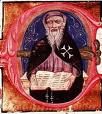
1378 After 1335 didn't work out, the Joachites seize on the late 13th cent. prophesies of Arnold of Villanova (1238-1310) and claim that this is definitely the year in which Antichrist will appear - demanding steel nerves and the maximum concentration? Every day is a winding road, whoops? First the Babylonian Captivity of 1309-67, now the Great (Western) Schism, sprouting clone popes? On Mar. 27 Pope (since 1370) Gregory XI (b. 1331) dies, and on Apr. 8 Naples-born Bartolomeo Prignano is elected Pope (#201) Urban VI (1318-89) after a short conclave featuring a lot of kibbutzing by pro-Italian forces, aided by ever-wounded St. Catherine of Siena; he decides to rule in Rome; the cardinals who elected him reconsider and nullify the election, then on Sept. 20 elect Robert of Geneva (Cambrai) as Antipope Clement VII (1342-94) whom they set up in Avignon, becoming the first antipope of the Great (Western) (Papal) Schism (ends 1417), while Pope Urban VI continues in the Vatican, laying back and enjoying the show while these are the days where anything goes and two or even three popes rule the infallible Church at the same time; England backs the Roman pope, while Scotland backs the Avignon antipope. In the spring after St. Alexius (b. 1295) dies, Bulgarian Hesychast Cyprian (1336-1406) travels from Constantinople to Moscow to become its metropolitan under the terms of a decree of deposed patriarch Philotheos, and in June he reaches the gates of Moscow, only to be blocked by orders of grand duke Dmitri II Donskoi, which doesn't stop him from sneaking in and getting consecrated as metropolitan of Kiev and Lithuania by Philotheos, only to be imprisoned then booted out so that a separate metropolitan for Great Russia (Moscow and environs) can be set up, with Mityai as patriarch #1; in 1389 Moscow finally accepts Cyprian as metropolitan of All Russia. On Aug. 4 cruelty-loving Galeazzo II Visconti (b. 1320) dies, and his son Gian Galeazzo Visconti (1347-1402) and surviving brother Bernabo Visconti (-1385) become joint rulers of Milan (until 1385). On Aug. 11 the Battle of the Vozha River is a V for the Russians under Dmitri Donskoi over a Mongol Golden Horde army sent by Khan Mamai to punish them for increasing their power in disobedience, becoming the first major V by the Russies over the Golden Horde, exposing the vulnerability of the Tatar cavalry. On Nov. 29 HRE (since 1355) Charles IV (b. 1316) dies in Prague, and his eldest son (brother of Sigismund I) Wenceslaus (Wenceslas) (Wenzel) IV (the Drunkard) (the Lazy) of Luxembourg (1361-1419), king of Germany since 1376 becomes king of Bohemia and uncrowned HRE (until Aug. 20, 1400), supporting the Roman pope; Sigmund of Luxemburg (1368-1437) becomes prince-elector of Brandenburg (until 1388, then again in 1411-15). The War of Chioggia (ends 1381) begins between commercial rivals Venice and Genoa (their 4th war); Genoa allies with Hungary. John de Neville is appointed Edward III's lt. in Aquitaine (until 1381). John Wycliffe is brought to trial for a 2nd time at the order of the pope, but the English govt. backed by the people rise to his defense, and the queen mother forbids the bishops to pronounce sentence; the bishops adjourn his heresy hearing permanently under pressure of a London mob, and Wycliffe starts a program of payback against the popes, questioning the authority of the Holy See in his copious English writings, which soon deny the sacraments, esp. the doctrine of transubstantiation. Hospitaller grandmaster Juan Fernandez de Heredia (1310-96) is captured by the Albanians. Madura, India is conquered by Vijayangar, ending the Muslim dynasty (founded 1334). Rottweil in Swabia, S Germany becomes a free city with its own constitution, establishing itself as a trading post for cattle and grain. Sufi Muslim Muhammad Sa'im al-Dahr from Sa'id al-Su'ada becomes so outraged at seeing local peasants making offerings to the Great Sphinx of Giza that he destroys the nose, and is hanged for vandalism; later blamed on Napoleon. The first mystery plays are performed in York. Births: Scottish royal heir (1390-1402) David Stewart, 1st Duke of Rothesay, Earl of Atholl, and Earl of Carrick (d. 1402) on Oct. 24; eldest son of Robert III (1340-1406) and Annabella Drummond (1350-1401); named in honor of David II, his father's enemy? Italian painter Gentile da Fabriano (d. 1427). Italian humanist scholar Vittorino da Feltre (Ramboldini) (d. 1446 in Feltre, Belluno, Repub. of Venice; student of Gasparino da Barzizza. Italian sculptor Lorenzo Ghiberti (d. 1455); known for his reliefs. Deaths: Russian Orthodox metropolitan of Kiev and All Russia (1354-78) St. Alexius (b. 1295); canonized in 1448. Greek patriarch of Constantinople (1353-4, 1364-76) Philotheos Kokkinos (b. 1300). Bohemian king (1346-78), Italian king (1355-78), and HRE (1355-78) Charles IV of Luxembourg (b. 1316) on Nov. 29 in Prague. Italian ruler (of Milan) Galeazzo II Visconti (b. 1320) on Aug. 4 in Pavia. Italian ruler of Milan (1327-78) Galeazzo II Visconti (b. 1320) on Aug. 4 in Pavia.
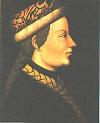



1379 In the spring after being robbed on the Danube River, then visiting patriarch Euthymius of Turnovo, Bulgarian-born metropolitan of Kiev Cyprian arrives back in Constantinople, and shortly thereafter John V and Manuel II break out of prison with Venetian and Turkish help, causing Andronicus IV to flee by rowboat across the Golden Horn to the Genoese quarter in Galata along with his mother Helena and her aging father John VI Cantacuzene, after which patriarch Macarios is deposed, with Cyprian signing the deposition orders, and uttering he soundbyte: "I could not go out of it [Constantinople] because the imperial city was beleagured by much disorder and trouble; the sea was held by the Latins [warring Venetians and Genoese], whereas the dry ground was controlled by the God-hating Turks"; meanwhile boyar-backed Moscow metropolitan Mityai travels unsuspecting to Constantinople, stopping to receive support from the Golden Horde in Sarai, then suddenly drops dead before reaching it, causing the Muscovites to forge documents making priest Pimen (-1389) the new metropolitan, then learning of the fall of Macarios and turning back to Moscow; meanwhile Patriarch Euthemius of Turnovo launches the Second Slavic Influence (first was by Cyril and Methodius), an infusion of Hesychasm into easy-sell Russia, along with an effort to replace obsolete Church Slavonic. On May 29 king (since Mar. 23, 1369) Henry II of Trastamara (b. 1334) dies, and his son Juan (John) I of Castile (1358-90) becomes Trastamara king of Castile and Leon #2 (until Oct. 9, 1390), becoming the last monarch of Castilian to receive a formal coronation. In Aug. after the Genoese fleet, aided by the Hungarians and Paduans blockades Venice, it captures Chioggia, then is itself encircled by the Venetian fleet in Dec. On Sept. 9 after their brothers Rudolf IV and Frederick III die without heirs, the remaining brothers Albert III the Pigtail (1349-95) and Leopold III (1351-86) sign the Treaty of Neuberg, dividing the Hapsburg territories between them, with Albert receiving Nearer Austria, and Leopold receiving Styria, Carinthia, Tyrol, and Further Austria; Albert, a budding mathematician goes on to support the arts and sciences and expand the U. of Vienna. The Navaresse Co. from Spain allies with a Florentine force to attack the Catalan Duchy of Athens. The rosy-crossy Sinclair family of Scotland obtains the earldom of Orkney, followed by land in Caithness in 1455. The U. of Erfurt in Erfurt, Thuringia 130 mi. SW of Berlin is chartered by Antipope Clement VIII, then rechartered in 1389 by Pope Urban V, opening in 1392 and going on to become a center of humanism with the largest univ. enrollment in Germany until it is closed in 1816; it is reopened in 1994, making it the oldest and youngest univ. in Germany; alumni incl. Martin Luther. New College (The Warden and Scholars of St. Mary's College of Winchester in Oxford) is founded at Oxford U. by Winchester bishop William of Wykeham (1320-1404), along with New (St. Mary's College School) to educate its 16 chapel choristers. Births: Spanish (Castilian) king (1390-1406) Henry III (the Sufferer) (the Infirm) (d. 1406) on Oct. 4 in Burgos; son of Juan I of Castile and Eleanor of Aragon; brother of Ferdinand I (1380-1416). Dutch printer Laurens Janszoon Coster (d. 1440) (b. 1370?) in Haarlem. Deaths: Castilian Jew-killing king (1369-79) Henry II of Trastamara (b. 1334) on May 29 in Santo Domingo de la Calzada.




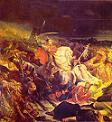
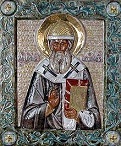

1380 By this decade the Byzantine Empire has been reduced by the Ottomans to Constantinople, Thessalonica, Trebizond, and some parts of the Peloponnesus. On Jan. 1 the Venetian fleet returns from the Mediterranean and blockades the Genoese fleet, which surrenders at Chioggia in June; having lost its fleet, Genoa begins losing its overseas possessions, finally losing its last one, Corsica, in 1768. In the spring Hesychast Neilos (Nilus) Kerameus (-1388) becomes patriarch of Constantinople (until 1388), convening a synod to decide the metropolitanate of Moscow after the death of St. Alexius (1295-1378); Moscow grand prince (since 1359) (St.) Dmitri II Donskoi (1359-89) chooses priest Mikhail (Mityaya), who wants Metropolitans to be enthroned in Russia than Constantinople, causing him to be accused of heresy, but dies last year on his way to Constantinople, and after baksheesh from Donskoi (cash from the Genoese and Turks), he decides to give it to Bulgarian-born Hesychast Cyprian (1330-1406), who is sacked for fleeing from Moscow as the Blue Horde approached in 1379, causing Pimen the Greek (-1389) to become metropolitan of Kiev and Great Russia in 1382-4, until it is discovered that he used forged letters from Grand Prince Dmitri II Donski, pissing-off Donskoi, who refuses to accept him, after which St. Dionysius I (1300-85), bishop of Suzdal (since 1374), who went to Constantinople to beg for Pimen's deposition is appointed in his place in 1384, but is arrested in Kiev at the orders of Prince Vladimir Olgerdovich at the insistence of Cyprian, dying on Oct. 15, 1385 without taking possession of his see; in 1390 Vasili II allows Cyprian to return to Moscow, and he is appointed metropolitan of Moscow and All Russia (until Sept. 16, 1406), going on to unite the Russian church with the grand duchy of Lithuania. On Sept. 8 after they decide not to pay the annual tribute, drawing an invasion, the Russians under Moscow grand prince (since 1359) (St.) Dmitri II Donskoi (1359-89) win a V against the Tartar Golden Horde under Khan Mamai at the Battle of Kulikovo (Kulikov) on the Upper Don River 200 mi. S of Moscow, becoming the first Russian V since the Mongol Conquest, although the Mongols return two years later to capture Moscow and put it under the Tartar Yoke, and continue to have the upper hand for the next cent.; the Lithuanian army under Jagiello agrees to aid Mamai, but reneges at the last minute, becoming the decisive factor; Dmitri II gets the name Donskoi ("of the Don") for the big V; after rival gen. Tokhtamysh (-1406) dethrones and kills Mamai, the Russian Orthodox Church begins celebrating a memorial for the battle on the Sat. before the Feast of St. Demetrius (d. 306); after learning that he rushed N to talk Jagiello into betraying Mamai, Dmitri II flops on Cyprian, inviting him to become metropolitan of Moscow, and imprisoning Pimen. On Sept. 16 French king (since 1364) Charles V the Wise (b. 1338) unwisely dies of mushroom poisoning, and his 12-y.-o. son (by wife Jeanne of Bourbon) Charles VI (the Well-Beloved) (the Mad) (1368-1422) is crowned Valois king #4 of France (until Oct. 21, 1422); his uncle Duke Philip II the Bold of Burgundy (1342-1404) becomes regent, and virtual ruler of France, although nominally sharing power with his other uncles, art-loving John the Magnificent of Valois, Duke of Berry (1340-1416) and Louis I of Naples (Taranto), Duke of Anjou (1320-62) ("the Princes of the Lilies"); meanwhile the men of Ghent siege, capture, and pillage Grammont in S France; the Hundred Years' War stalemates, with weak govts. on both sides languishing under internal disorders, and much of France in ruins; the English hold only Bordeaux, Bayonne, Brest, Calais, Cherbourg, and Valais; initially Charles is known as the Well-Beloved, until he suffers the first of his bouts of madness in 1392. Haakon VI of Norway (b. 1340) dies, and his son (by wife Margaret of Denmark) Olaf II of Denmark also becomes Olaf IV of Norway (until 1387), with Margaret as regent and real ruler, giving her control of Denmark and Norway; now all she has to do is get her hands on Sweden?; the capital of Norway is moved from Trondheim to Oslo. The English Parliament institutes a third, graded poll tax in an attempt to tax the rich more than the poor, but somehow it comes out the opposite of that in many communities, causing peasants to chafe, and tax evasion to become rampant, along with sporadic violence and unrest among the agricultural and urban classes. Pope Urban VI deposes Queen Joanna I of Naples for supporting his enemy Pope Clement VII; dwarf (under 3.5'-tall) Charles III the Short of Naples (1345-86) succeeds as king of Naples. Oxford U. theologian John Wycliffe (1324-84) gives a sermon in which he utters the soundbyte: "How should God approve that you rob Peter, and give this robbery to Paul in the name of Christ?" Leipzig obtains the privilege (Stapelrecht) of forcing all passing merchants to offer their goods for sale. In this decade the Bornu Empire (ends 1893) is founded in modern-day NE Nigeria on the ruins of the Kanem Empire, growing to incl. parts of Chad, Cameroon, and Niger. Poetry: Geoffrey Chaucer (1343-1400), The House of Fame; a dream vision of a glass temple adorned with images of the famous, where he meditates on the nature of fame with an eagle as his guide; first use in English of the words "galaxy" and "Milky Way"; used by Alexander Pope for "The Temple of Fame". Births: Spanish regent of Castile (1406-16) and king of Aragon, Valencia, Majorca, Sardinia, Corsica and Sicily, and count of Barcelona, Roussillon and Cerdanya (1412-16) Ferdinand I of Antequera (the Just) (the Honest) (d. 1416) on Nov. 27 in Medina del Campo; 2nd son of Juan I of Castile (1358-90) and Eleanor of Aragon; brother of Henry III (1379-1406); uncle of Juan II (1405-54). Czech Hussite (Ultraquist) gen. Andreas Prokop the Great (Holy) (Bald) (Shaven) (d. 1434). Italian Humanist historian Giovanni (Gian) Francesco Poggio Bracciolini (di Guccio) (d. 1459) in Terranuova (near Arezzo). German monk-scholar-mystic Thomas a (à) Kempis (Hamerken) (Hammerlein) (Ger. "small hammer") (d. 1471) in Kempen (near Krefeld), Prussia. Deaths: French constable Bertrand du Guesclin (b. 1320) in Chateauneuf-de-Randon (KIA). Welsh poet Dafydd ap Gwilym (b. 1325). French king (1364-80) Charles V (b. 1338) on Sept. 16 in Beaute-sur-Marne (mushroom poisoning). Norwegian king (1343-80) Haakon VI Magnusson (b. 1340) in Oslo. Italian nun St. Catherine of Siena (b. 1347); canonized in 1461.


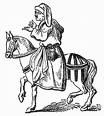

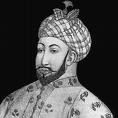


1381 In the spring Cyprian returns to Moscow to cheers, becoming its metropolitan, taking care to minister to Little Russia incl. Kiev, and writing The Life of Peter (the first metropolitan of Moscow), building up Moscow as the divinely-ordained center of Russian Orthodoxy, and Dmitri II Donskoi's line as the legitimate heirs of Kievan rule and rightful rulers of all Orthodox Russians. In late May after the landlords attempt to revert to the old servile tenures, the poll tax commissioner for Essex is rioted against, and Wat Tyler's Peasant Rebellion (Revolt) (Great Rising) begins, spreading to Kent then throughout SE England (S and E of the Exe-Tees line), reaching York and Somerset by June, destroying manor houses and game parks along with court rolls containing records of serfdom (tenures), and assassinating landlords and lawyers (while humming "When Adam delved and Eve span, who was then a gentleman?"); on June 12 100K pitchfork-shaking peasant rebels led by Wat Tyler (1325-81) and Jack Straw (Rakestraw) release John Ball (1338-81) from prison and reach the Thames River across from London, while more rioters from Essex approach from the N and E; on June 13 the gates are thrown open to the rebels by city sympathizers, and on June 14 14-y.-o. Richard II grants their leaders an interview and accedes to their demands for free tenancy and a reduction in rents, but balks at disendowment of the church and abolition of game laws, causing mob violence and destruction, incl. the murder of lawyers and officials, incl. Simon Theobald (Tybald) of Sudbury (b. 1316), archbishop of Canterbury (since May 4, 1375) (chancellor and poll tax polecat), the sacking of houses, the burning of the Savoy Palace of John of Gaunt, and the seizing of the Tower of London, causing the king to meet with the leaders again at Mile End outside the city bearing royal charters of manumission, which causes most of them to begin returning home; unfortunately Wat Tyler draws his dagger in the king's presence and is struck down by the king's followers, causing the 30K remaining rebels to converge on him, but the clever king saves his life by pretending to become their new leader, and then lets them disperse even when an army arrives from London to aid him; once he is safe, the rebellion is cruelly put down by autumn, and is a complete failure, the royal charters revoked and an attempt made to restore villeinage. Parliament refuses to grant taxes for the war against France, and a 6-year English-French Truce is arranged. The men of Ghent capture the Abbey of Eenaeme. The English Parliament passes the first Navigation Act, showing England's growing nat. monopoly of naval commerce. Edmund of Langley makes a fruitless expedition to help Ferdinand I of Portugal against Juan I of Castile, who attacks Portugal to defeat the schemes of John of Gaunt to take his crown. John de Neville, 3rd Baron Neville de Raby (1337-88) is appointed English warden of the Scottish border. A statute is enacted in England mandating the use of bills of exchange, and prohibits the future export of gold and silver specie to settle foreign commercial transactions; the system is later adopted in the U.S. The War of Chioggia (begun 1378) between Venice and Genoa allied with Hungary ends with the Peace of 1381 (Turin), which acknowledges Venetian supremacy in its long struggle with Milan-Genoa after it cedes Dalmatia and pays tribute; Genoese political influence in the Mediterranean and the East is kaput. Peter IV of Aragon becomes duke of Athens and Neopatria (until 1387). Saarbrucken in W Germany comes under control of the counts of Nassau-Saarbrucken (until 1793). Sunni Muslim C Asian Turco-Mongol-Persian military adventurer Tamerlane (Timur-i-Lang) (Temur the Lame) (1336-1405) ("timur = iron) (not really lame?) begins 35 successful campaigns to Persia, Russia, Georgia, Syria, Egypt, and other parts, first conquering Persia and its capital Herat; the Shiite Sarbadar regime based in Sabzavar comes under his suzerainty; Tamerlane goes on to establish an empire in Persia, Iraq, and Syria, with capital in Samarkand in modern-day Uzbekistan. Kadi Burhan al-Din Ahmed (Burhaneddin) (1345-98), vizier of the principality of Eretna in NE Anatolia usurps the sultanate (until 1398), becoming a popular poet. Nonfiction: John Wycliffe (1324-84), Confession Concerning the Eucharist; denies that the "substance" of bread and wine are miraculously annihilated during the Eucharist - the secrets that made it taste so good? Births: Italian patriarch #1 of Venice (1451-6)(St.) Lawwrence Giustiniani (d. 1456) on July 1 in Venice; feast day: Jan. 8. Scottish nobleman John Stewart, Earl of Buchan (d. 1424); son of Robert Stewart, 1st duke of Albany (1360-1420) and 2nd 2ife Muriella Keith; husband of Elizabeth Douglas (1385-1451), daughter of Archibald Douglas, 4th earl of Douglas; father of Margaret Stewart (1424-60), wife of George Seton, 3rd lord Seton. Deaths: English archbishop of Canterbury (1375-81) Simon Theobald (Tybald) of Sudbury (b. 1316) on June 14 in Tower Hill, London (beheaded). English rebel Wat Tyler (b. 1325) on June 15 (KIA). Swedish nun St. Catherine of Vadstena (b. 1332) on Mar. 24; canonized in 1484 by Pope Innocent VIII. English nobleman Edmund Mortimer, 3rd earl of March (b. 1352) on Dec. 27 in Cork, Ireland (KIA).

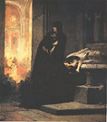




1382 On Jan. 24 Richard II's 7-y.-o. heir presumptive Roger Mortimer, 4th Earl of March (b. 1374) is made lord lt. of Ireland, with his uncle Sir Thomas Mortimer acting as his deputy; he is reappointed on July 23, 1392, and in Sept. 1394; on Apr. 25, 1396 he is appointed lt. in Ulster, Connacht, and Meath; in Apr. 1397 he is reappointed lord lt. of Ireland for three more years; too bad, on Sept. 4, 1397 he is ordered to arrest his uncle Sir Thomas Mortimer for treason over the 1387 Battle of Radcot Bridge, which he neglects to do, and in Jan. 1398 he is summoned to a parliament in Shrewbury om Shropshire, where a vast crowd wearing his colors "rapturously receives" him, pissing-off Richard II, after which his nephew and enemy Thomas Holland, 1st Duke of Surrey, 3rd Earl of Kent, 4th Baron Holland (1374-1400) is ordered to arrest him, but before he can do that on July 20, 1398 Mortimer is KIA in Ireland, while on Juy 27 unaware of his death Richard II dismisses him as lord lt. of Ireland, appointing Holland in his place and ordering him on Jan. 22, 1399 to accept all the homages due to himself during the remainder of his term; too bad, after Richard II is deposed on Sept. 29, 1399, Holland loses his appointments. On May 24 emperor (since 1371) Go-En'yu (b. 1359) abdicates, and his eldest son Go-Komatsu (1377-1433) (personal name Motohito) becomes Japanese Ashikaga (northern) pretender emperor #6 (until 1412); meanwhile S emperor Go-Kameyama refuses to turn over the three sacred treasures (until 1392). On Sept. 10 Louis I the Great (b. 1326) dies, leaving his 10-y.-o. daughter Mary of Anjou as queen Mary of Hungary (1371-95), with her mother Elizabeth (Elisabeth) of Bosnia (1340-87) (daughter of Stephen II) as regent; Mary's position is challenged by Charles III of Naples, who gains a following in S Hungary and Croatia. On Nov. 4 Scottish high chamberlain (since 1377) Sir John Lyon, Thrane of Glamis (b. 1340), Robert II's son-in-law and chamberlain is killed in a quarrel with the king's nephew Sir James Lindsay of Crawford, and his 2nd son Robert Stewart, Duke of Albany, Earl of Fife (1340-1420) becomes high chamberlain, taking control of Scottish finances and using his position as regent along with his elder brother Lord Carrick to jockey for control of the kingdom. In Nov. Philip the Bold leads France on an expedition in support of his father-in-law the count of Flanders against the pro-Roman Catholic Flemish rebels under Philip van Artevelde (1340-82), and defeats them at the Battle of Roosebeke, massacring them "without pity, as though they had been but dogs"; van Artevelde is KIA; Duke Wenceslas of Brabant punishes the pop. of Louvain, Belgium so severely for an attempted insurrection that thousands of weavers emigrate to Holland and England, and it begins declining as an industrial town and turning into a univ. town. The Genoese regain control of Constantinople. The Turks capture Sredetz (ancient Sardica) and rename it Sofia from the 12th cent. Church of St. Sofia, which they turn into a mosque. The Mongols under Tokhtamysh capture Moscow in a surprise attack, sack and burn it, and get Dmitri II Donskoi to flop and pledge allegiance and restore the tribute payment; too bad, after finding that he snuck out to Tver during the attack, pissing off patriarch Neilos Karameus, Dmitri II flops on Cyprian again, booting him out of Moscow and reinstalling Pimen as metropolitan, only to withdraw support for him, but never allow Cyprian back in. Leopold III of Austria acquires Trieste. Witowt and his father are imprisoned by his cousin Ladislaus Jagiello (future Ladislaus II) in a dispute over the title of grand duke; the father dies in prison, but the son escapes and takes refuge with the Teutonic Knights, plotting to get his territory back. Dawit I (-1413), younger son of Newaya Krestos becomes Solomonic emperor of Ethiopia (until 1413), going on to invade Egypt as far as Aswan. Having the peasants kicked down nicely, the English teen king goes Bohunk to relax and enjoy every drop of life from the time his first short and curly sprouts? 16-y.-o. Richard II of England (b. 1366) marries Anne of Bohemia (1366-94), eldest daughter of Charles of Luxemburg, king of Bohemia (later HRE); her noblemen sport shoes with foot-long tips, causing the fashion of wearing Crackowes (Poulaines) to catch on in England - wouldn't it be great if your insides could be this happy? Juan I of Castile forces Ferdinand I of Portugal (d. 1383) to give him his daughter Beatrice (Beatriz), Heiress of Portugal in marriage to end the fight between the two kings. John of Gaunt balks at John Wycliffe's desire to overthrow the Church, only wanting to limit its authority in temporal matters, and repudiates his connection with him; a convocation of the province of Canterbury, led by William Courtenay, archbishop of Canterbury condemns several of his writings as heretical, esp. the one against holy cannibalism (transubstantiation), causing him to be banished from Oxford to his rectory at Lutterworth (until 1384), where he continues organizing his Lollards; the efforts of the convocation to get the king's council to enact an ordinance ordering the arrest of the heretics is stymied by Parliament at its next session, letting them have a free hand for 20 years (until 1401), although Courtenay purges Oxford of Lollards, making it a movement of the non-degreed classes; meanwhile the pope summons Wycliffe to undergo trial before the papal court, but he gets out of it somehow by claiming age and illness and stalling - out of the mouth of babbling babes? Barkuk Barkuk (Al-Malik az-Zahir Sayf ad-Din Barquq (Arab. "plum") (-1399) becomes sultan #1 of the Mamluk Burji Empire (ends 1517) (until 1389, then 1390-9), the first Circassian (and Burji) ruler, ending the Bahriyya sultanate (begun 1250); from now on the empire's revenues decline. Winchester College boarding school for boys is founded in Winchester, Hampshire, England by bishop William of Wykeham (1320-1404); the first 70 poor scholars enter the school in 1394; it is founded in conjunction with New College, Oxford U. as a feeder, becoming a model later followed by Eton School and King's College, Cambridge U., and Westminster School and Christ Church, Oxford U. and Trinity College, Cambridge U. Architecture: Jasna Gora Monastery is founded in Czestochowa, Poland, housing the Black Madonna of Czestochowa, which attracts large numbers of pilgrims. The Khan al-Khalili Market (Souk) in Cairo is founded, becoming a major tourist attraction. Nonfiction: 135 years before Martin Luther of Germany, an anti-Roman Catholic Reformation is brewing in England? John Wycliffe (1324-84), English Trans. of the Latin Bible; first new trans. in a millennium, based on the Latin Vulgate Bible; actually Wycliffe doesn't merely translate but creates the New Testament, writing it originally in English and Latin, and it is actually a code history of 14th cent. Europe, incl. the Avignon papacy? Births: Austrian Hapsburg duke (1402-39) and count of Tirol (1406-39) Frederick IV (of the Empty Pockets) (d. 1439); younger son of Leopold III (1351-86); brother of William the Ambitious (1370-1406), Leopold IV (1371-1411), and Ernest the Iron (1377-1424); husband of Anna of Brunswick; father of Sigismund of Austria (1427-96). French grand chamberlain (to Charles VII) Georges de la Tremoille (Trémoille) (d. 1446). Danish-Swedish-Norwegian king (1389-1442), Danish king (1396-1439), and Swedish king (1396-1439) Erik (Eric) III/VII/VIII/XIII of Pomerania (d. 1459); son of Duke Vratislav VII of Pomerania and Maria of Mecklenburg; grandnephew and adoptive son of of Queen Margreta (Margaret) I of Denmark; first king of the Nordic Kalmar Union. Deaths: Lithuanian grand duke Kestutis (b. 1297) on Aug. 3 in Kreva (assassinated). French philosopher Nicole Oresme (b. 1320); leaves Tractatus de Configurationibus Qualitatum et Motuum, which distinguishes between intensity and quantity of heat, anticipates rectangular coordinates and the treatment of time as a variable, and proves the divergence of the harmonic series; Treatise on the Origin, Nature, Law, and Alterations of Money. Hungarian king (1342-82) and Polish king (1370-82) Louis I the Great (b. 1326) on Sept. 10 in Nagyszombat/Trnava. Scottish high chamberlain (1377-82) Sir John Lyon, Thane of Glamis (b. 1340) on Nov. 4.


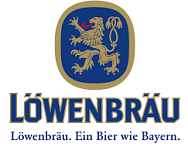
1383 The Hundred Years' War is renewed; the Battle of Dunkirk sees the Flemish fight the English under Bishop Henry Despenser of Norwich. In May Binnya U, Buddhist king #8 since 1348 of the Hanthawaddy Kingdom in Burma, known as the Lord of the White Elephant dies in Pegu (modern-day Bago). On Oct. 22 king (since Jan. 18, 1367) Ferdinand I the Inconstant (b. 1345) dies, and his half-brother (illegitimate son of Pedro I by his lover Ines de Castro) Joao (John) I (the Great) (the Bastard) (1357-1433) becomes king #10 of Portugal (until Aug. 14, 1433). Amadeus VI dies, and his son Amadeus VII (-1391) becomes count of Savoy, going on to secure Nice in 1388 to give Savoy an outlet to the sea - which is nice? Scotland and France renew their Auld Alliance, with France promising support for a joint campaign against Richard II of England. London lord mayor John Comberton de Northampton persaudes the city council to declare the monopoly of the Fishmongers' Co. (founded 1272) to be ended; Richard II restores it in 1399, although they lose their Leyhalmode, a court of law to settle disputes over the seafood trade. Lowenbrau (Löwenbräu) (Ger. "Lion's Brew") Brewery is founded in Munich, Bavaria, Germany; in the 17th cent. it adopts the lion logo; in 1863 it becomes the largest brewery in Munich (25%); in 1928 production reaches 26M gal./year; in the 1930s it is owned by Joseph Schulein (Schülein), a Jew, causing the Nazis to diss it as "Jew beer"; in 1945 the brewery is destroyed in an air raid, and in 1948 after being rebuilt it begins exporting beer to Switzerland, going on to be featured at the 1967 Montreal Expo as the archetype of Munich beer; in 1975 Miller acquires North Am. rights, followed in 1999 by Labatt; in 1997 Lowenbrau merges with Spaten-Franziskaner-Brau, which is acquired in 2003 by Interbrew, which merges in 2004 with AmBev to form InBev, which in 2005 acquires Anheuser-Busch to create Anheuser-Busch Inbev; in 2002-14 Lowenbrau resumes exports to North Am., after which Labatt begins brewing a clone in London, Ont., Canada, causing critics to pan it as inferior. Architecture: Philip the Bold gives a gong clock to the Cathedral of Notre Dame de Dijon in France, built by Jacques Marc, which keeps on ticking to modern times, striking once an hour. Births: Florentine painter Masolino ("Little Tom") da Panicale (Tommaso di Cristoforo Fini) (d. 1447) in Panicale di Valdelsa (near Florence). Deaths: Byzantine emperor John VI (V) Cantacuzene (Cantacuzenos) (b. 1292). Portuguese king (1367-83) Ferdinand I the Inconstant (b. 1345) on Oct. 22 in Lisbon.




1384 On Jan. 2 king (since 1348) Binnya U (b. 1323) is KIA in Pegu while quelling a rebellion by 16-y.-o. Binnya Nwe, who becomes Burmese Hanthawaddy king #9 Razadarit (Burmese "King of Kings" (1368-1421) (until 1421), going on to conquer the rebellious regions of Martaban (Mottama) and Irrawaddy Delta and win the Forty Years' Ava-Pegu (Mon-Burmese) War with the N kingdom of Ava (Inwa) (ends 1424). On Oct. 16 after the magnates of Lesser Poland balk at union with Hungary, and choose 9-y.-o. Jadwiga (Jadviga) (1374-99) of the Capetian House of Anjou, daughter of Louis I of Hungary and Elizabeth of Bosnia, she is crowned king instead of queen of Poland to rule in her own right (until July 17, 1399); her Hapsburg fiancee William the Ambitious (1370-1406) of Styria is rejected as not good enough, causing him to become known as William the Courteous, but he soon gets engaged to her Angevin relative Joan of Naples, making for the saying "Bella gerant alli: tu felix Austria nube" (Let others make war: thou happy Austria, marry) - somewhere somebody must have kicked you around some? In Nov. after seeking Scotland's inclusion in Anglo-French peace talks, "infirm" Robert II is unoficially deposed in a bloodless palace coup by his eldest son John, earl of Carrick, who becomes lt. of Scotland, leading a coalition of nobles headed by James Douglas, 2nd Earl of Douglas (1358-88) and the Lindsay clan, and the war with England is on; meanwhile John's younger brother Alexander builds his own territorial empire in the highlands using caterans (Gaelic mercenary cos.), taking Ross, causing parliament to fume. The Castilians siege Lisbon. Cousins Ladislaus Jagiello and Witowt become reconciled, but Jagiello keeps Lithuania and gives him some Russian territory, which doesn't satisfy him. Tamerlane captures Herat, Sistan, Rayy, and Il-Khanid (capital of Sultaniyeh). Louis de Male, last count of Flanders dies, and through his daughter Margaret of Flanders, Duke (since 1363) Philip II the Bold of Burgundy (1342-1404) inherits Flanders, Franche-Comte (the county of Burgundy), Artois, Nevers and Rethel, pissing-off the Plantagenets with a bold new danger on the N and E; the town of Douai (Douay) on the Scarpe River in N France is among his new toys; meanwhile the duke of Anjou dies, leaving Philip II in the driver's seat that way, pissing off Charles VI, who declares himself of age and begins his personal rule by replacing him with his own brother Duke Louis of Orleans, and the rivalry between the bold houses of Burgundy and Orange is on. Pope Urban VI excommunicates Charles III of Naples. The first beer brewery in Austria is founded in Vienna on the Weidenstrasse. Poetry: Geoffrey Chaucer (1343-1400), The Parlement of Foules. Deaths: Burmese king (1348-83) Binnya U (b. 1323) on Jan. 2 in Pegu (KIA). English morning star religious reformer John Wycliffe (b. 1324) on Dec. 31 in Lutterworth; dies of paralysis while ministering to his parish church, a rare peaceful death for a heretical celeb in those days; in 1428 the Council of Constance makes up for lost time and has his body dug up and burned, along with 200 of his books, and his ashes cast into the Swift River near Lutterworth (which flows into the Avon River, then into the Severn River, then into the ocean, spreading worldwide, like his doctrines?); his example launches a stream of reformers incl. Jan Huss (1369-1415), Girolamo Savonarola (1452-98), Ulrich Zwingli (1484-1531), Martin Luther (1483-1546), and John Calvin (1509-64). Scottish nobleman William Douglas, 1st earl of Douglas (b. 1327) in Douglas, South Lanarkshire. French king of Naples (1382-4) Louis I of Anjou (b. 1339) on Sept. 20 in Bari.

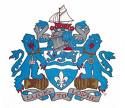

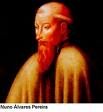

1385 In Apr. John (Joao) I (1357-1433) is chosen king of Portugal in violation of the rights of the Infanta Beatrice, wife of Juan (John) I of Castile; at his accession an uprising occurs, and Queen Leonora calls on Juan I of Castile to help her daughter Beatrice take the throne; Joao I, master of the Order of Avis is supported by John of Gaunt, who wants the crown of Castile; a 300-man Castilian force under seven capts. raids Portugal, and the 200-man Trancoso garrison under Joao Fernandes Pacheco intercepts them, driving them off with heavy losses, only one Castilian capt. surviving; on Aug. 14 Joao I of Portugal, aided by the English defeats an invasion by Juan I of Castile (aided by the French) at the Battle of Aljubarrota, killing 4K-5K French and Castilians vs. less than 1K of his own, and securing his throne; Dom Nuno (Nuño) Alvares (Álvares) Pereira (1360-1431) becomes Portugal's hero, and a shoe-in for saint; Juan I supporter Don Pero Lopez de Ayala (1332-1407) is captured, and ransomed in 1398 for 30K doubloons, using his prison time to become a writer and churn out some cool works. In June 1.2K French troops led by John de Vienne land in Scotland, hook up with Scottish leaders Robert Stewart et al. and invade N England; out-of-the-way king Robert II has "red-bleared eyes, of the colour of sandalwood, which clearly showed that he was no valiant man, but one who would rather remain at home than march to the field", and stays out of the military action; meanwhile Edward III's son Edmund of Langley is made Duke of York in N England, founding the future ruling white rose House of York, which develops bad blood with the blood red rose House of Lancaster. The Ottomans conquer Sofia. A 50K-man Mongol army under Kahan Tokhtamysh invades Persia and takes Tabriz, then returns with 200K slaves from the Caucasus, incl. tens of thousands of Armenians, allowing Tamerlane to annex Persia and Azerbaijan, pissing Tokhtamysh off and causing him to declare war, then finally giving up and withdrawing to the steppes by next year. Duke Philip II the Bold of Burgundy completes the pacification of Flanders. Sigismund of Luxembourg tries to to horn his way into the throne of Hungary by marrying queen (since 1382) Mary of Hungary, but Charles III of Naples is too fast for him and deposes her, becoming Charles II of Hungary, but not fast enough, as Mary's mother queen Elizabeth have him assassinated next year. Olav, son of Queen Margreta of Denmark and Norway is acknowledged as future king of those countries. Duke Gian Galeazzo Visconti (1351-1402) has his uncle Bernabo murdered, becoming sole ruler of Milan (until 1402), going on to create a kingdom in N Italy, adding Verona (1387), Vicenza (1387), Padua (1388), Pisa (1399), Siena (1399), Assisi (1400), Perugia (1400), and almost but not quite Florence; he marries Isabelle of Valois (1348-72), daughter of King John II of France, then marries his daughter Valentina Visconti (-1408) to Louis of Orleans, giving Louis XII a later claim on Milan. Sir Henry Percy (Hotspur) (1364-1403) becomes gov. of Berwick. The original gay eye for the straight guy? 18-y.-o. Richard II refuses to change his ministers at the request of Parliament, signaling his intention to throw off their superintendence as he reaches the age of majority; he institutes the title "your majesty" for himself; his favorite Robert de Vere, 9th Earl of Oxford (1362-92) is created marquess of Dublin, becoming the first hereditary English marquess; it now goes prince/princess, duke/duchess, marquess/marchioness, earl/countess, baron/baroness, until 1440 when viscount/viscountess (first used in 1387) is officially added for a discount entry into the peerage between earl and baron - PDMEVB - princes don't marry every vain body? English troops of the Duke of Lancaster take the town of Ribadavia in Galicia and sack the Jewish quarter. German king Wenceslaus IV the Drunkard arrests Jews in the Swabian League free cities in S Germany after a quarrel with the archbishop of Salzburg, causing them to declare war (ends 1389). The first-ever French court ball is held at the wedding of Charles VI and Isabella of Bavaria - let's have a what? Plays: Geoffrey Chaucer (1343-1400), Troilus and Criseyde; in Apr. Saturn and Jupiter meet in Gemini and move into Cancer for the first time in over 600 years; the Moon joins them in mid-May, the time of the dinner party thrown by Criseyde's uncle Pandarus while Troilus hides in a closet? Births: Spanish princess Yolande of Aragon (Violant d'Arago) (d. 1442) on Aug. 11 in Saragosa; daughter of John I of Aragon (1350-96) and Yolande of Bar (1365-1431); sister of Countess Joanna of Foix; niece of Martin the Elder of Aragon (1356-1410); wife of Louis II of Anjou (1377-1417); mother of Louis III of Anjou (1403-34), Marie of Anjou (1404-63), and Rene I of Naples (1409-80). Welsh soldier-courtier (founder of the Tudor Dynasty) Sir Owen Tudor (Owain ap Maredudd ap Tydir) (d. 1461); son of a brewer descended from Welsh prince Rhys ap Gruffudd ("Lord Rhys") (1132-97); anglicizes his name Owain ap Maredudd (Meredith) Tudor (Theodore) by taking his grandfather's name Owain then anglicizing it to Owen, but keeping the Welsh name Tudor; secret hubby (1428-) of Henry V's widow Catherine of Valois (1401-37); father of Owen Tudor (1429-1501) (a Westminster monk), Edmund Tudor, 1st earl of Richmond (1430-56) (father of Henry VII), Jasper Tudor, 1st duke of Bedford (1431-95) (husband of Katherine Woodville), Tacina Tudor (1433-69), Daughter Tudor (1435-) (nun); also has bastard son Sir David Owen (1459-1528). Greek humanist metropolitan of Kiev cardinal Isidore of Kiev (Thessalonica) (d. 1463 in Peloponnesus. Births: English bishop of Lincoln (1419-31) (founder of Lincoln College, Oxford U.) Richard Fleming (d. 1431) in Crofton, Wakefield, Yorkshire. Italian Franciscan "athlete of Christ" St. John Capistran (d. 1456). Tibetan Buddist saint Thangtong Gyalpo (Chakzampa") (the Iron Chain Maker) (Tsondru Zangpo) (Excellent Persistence) (King of the Empty Plain) (Madman of the Empty Valley) (d. 1485); inventor of the iron chain suspension bridge; most traveled Tibetan person in history. Deaths: Russian Orthodox metropolitan (1384-5) St. Dionysius I (b. 1300) in Kiev; dies in prison.




1386 In Jan. Charles II of Hungary (Charles III of Naples) is assassinated by Queen Mary of Hungary's mother Elizabeth, and Mary is restored, causing a new revolt in Croatia; too bad, Elizabeth and Mary are captured by the Horvat brothers Paul and Ladislaus on the orders of Mary's mean hubby Sigismund of Luxembourg. On May 9 the Treaty of Windsor, sealed by the promised marriage of John I of Portugal and Philippa of Lancaster (duke of John of Gaunt, 1st Duke of Lancaster) establishes a mutual support pact and recognizes John I as the undisputed king of Portugal; it is not rescinded until ?. On July 9 Hapsburg Duke Leopold III of Austria (b. 1351) is defeated and killed by the Swiss confederation supported by the Swabian League at the Battle of Sempach 10 mi. N of Lucerne (he has 3K-4K men, vs 6K-8K for them); the Swiss prove they're a force despite the bloody Black Death. In July John of Gaunt departs England with his wife to invade Castile and make good the claims of his son-in-law Joao I of Portugal against Juan I of Castile, and captures Santiago de Compostela; meanwhile Richard II's power is weakened when the nobles force themselves on him as a governing council, and John of Gaunt loses control of the govt. and supports the king to prop him up. The Scots and French quarrel, and the English invade Scotland, burning most of Lothian incl. Edinburgh, forcing the Scots to accept a truce (until 1388). Under my thumb, the girl who once had me down? 11-y.-o. Roman Catholic Queen Jadwiga, heiress of the Polish throne marries grand duke Jagiello (Jogaila) of still-pagan Lithuania after he converts to Roman Catholicism, and he becomes Polish king Wladyslaw II Jagiello (1362-1434) AKA Jogaila, founding the Jagiellon Dynasty in Poland, and ramping up Poland's Golden Age; the grand duchy of Lithuania is annexed by the Polish kingdom, causing the Teutonic Knights to declare war on Poland to attempt to help Ladislaus' pagan cousin Witowt get it back (in 1392). Mircea I (the Elder) (the Old) (the Great) (-1418), son of Radu I becomes ruler of Wallachia (until 1418), going on to increase the principality's borders from the Olt River in the N to the Danube River in the S, and the Iron Gates of the Danube River in the W to the Black Sea in the E. At the Royal Council of Nyborg, Queen Margreta enfeoffs the dukes of Holstein with Schleswig. Tamerlane begins seizing Greater Armenia and massacring its Christian pop. (ends 1394), allowing Tokhtamysh to invade Transoxiania, until heavy snow forces him back to the steppes. The Ottomans conquer Nish in S Serbia. The Genovese Embassy introduces aqua vitae (water of life) to the Moscow Grand Duchy, acquainting them with the "pernicious drink" (good antifreeze for the blood?) Vodka - so the Italians did to the Russkies what the Euros did to the American Indians? Richard II's favorite Robert de Vere is created duke of Ireland. Chinese emperor Ming Taizu orders his officials to buy back children sold into slavery in Hainan Province by their parents during a famine. German king Wenceslaus IV expels the Jews of Strassburg and confiscates their property. The town council of Frankfurt, Germany forbids the employment of Christians by Jews, and restricts the number of Jewish servants in a household; in 1412 there are only 27 Jewish households in the city, which drops to four in 1416. The town of Stryi in W Ukraine is first mentioned as part of the kingdom of Poland; in 1387 Polish king Jogaila gives it to his pro-Russian brother Svitrigaila. A judge in Falaise, France orders a pig mutilated and hanged for killing a little girl, dressed up in the child's jacket; the executioner wears gloves so that he can kill with clean hands, and charges 6 sous. Heidelberg U. (Ruprecht-Karl U. of Heidelberg) is founded in Heidelberg, Baden-Wurttemberg, Germany by Palatinate elector Rupert I, becoming Germany's first univ., and the 3rd univ. in the Holy Roman Empire after the U. of Prague (1348) and U. of Vienna (1365); the first rector is religious scholar Marsilius von Inghen (1330-96). Architecture: Bad Doberan Minster in Munich, Germany (begun 1294) is completed. The Gothic Milan Duomo (Cathedral) in Milan, Italy NE of the Basilica di Sant'Ambrogio (built in 386) is begun (finished in 1887/1965), becoming the largest cathedral in Italy and the #2 in Europe after St. Peter's in Rome. Births: Italian Franciscan preacher-Crusader ("the Soldier Saint") St. John (San Juan) of Capistrano (Capistran) (d. 1456) on June 24 in Capistrano, Abruzzi, Naples. Italian condottiero Niccolo Piccinino (d. 1444) in Perugia; son of a butcher. Italian early Renaissance sculptor Donatello (Donato di Niccolo di Betto Bardi) (d. 1466) in Florence. Deaths: Austrian duke Leopold III (b. 1351) on July 9 (KIA in the Battle of Stembach).

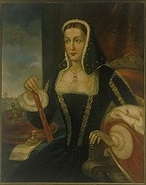
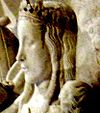




1387 On Jan. 5 Peter IV the Ceremonious of Aragon (b. 1319) dies, and on Jan. 6 his eldest son (by 3rd wife Eleanor, daughter of Peter II of Sicily) John I (the Hunter) (the Lover of Elegance) (the Abandoned) (1350-96) becomes king of Aragon (until May 19, 1396), abandoning his father's pro-English policy for an alliance with France and continuing support for the Avignon popes; his wife is Violante (Yolande) (Yolanda) of Bar (1365-1431), who next year is accused of trying to murder her son via witchcraft but ends up with a lot of power because of his frequent illnesses, bringing French Provencal troubadours to the court; after conquering most of Sicily, a revolt centered in the independent principality of Arborea led by judge (since 1383) Eleanor de Bas-Serra (Arborea) (Arbaree) (1347-1404) drives them out by the end of his reign. In Jan. Sigismund of Luxembourg celebrates the anniv. of Charles II's assassination by having his assassin Elizabeth strangled before her daughter Mary's eyes; after she is rescued from captivity in July by troops sent by Trvtko I of Bosnia (cousin of Elizabeth) and the croatian Frangipani family, she abandons her hubby and reconciles with the Horvats, granting them estates in Slavonia and N Bosnia, and lets Sigismund rule Hungary alone until her 1395 death. On Feb. 11 after defeating an invasion, a reluctant Juan I of Castile (b. 1357) makes peace with John of Gaunt and marries Philippa Plantagenet of Lancaster (1360-1415) in return for Gaunt giving up his claim to Castile, becoming the final step in the Anglo-Portuguese alliance against the French-Castile axis; after an icy initial period she bears him 9 sons and 3 daughters, becoming known as the Illustrious or Marvelous Generation they came out so well, incl. Edward (Duarte) I "the Philosopher" "the Eloquent" (1391-1438) Duke Peter (Pedro) of Coimbra (1392-1449), Prince Henry the Navigator (1394-1460), Isabella of Portugal, Duchess of Burgundy (1397-1471), John the Constable Prince (1400-42), and Ferdinand the Holy Prince (1402-43), becoming virtual ruler of Portugal (until July 19, 1415). In Mar. the Earl of Arundel captures a Flemish wine fleet and sells the wine in England, making him very popular. On Aug. 3 Danish king (since May 3, 1376) and Norwegian king (since July 29, 1380) Olaf II/IV (b. 1370) dies unexpectedly, and his mother is proclaimed "all-powerful lady and mistress and the Kingdom of Denmark's regent", followed next year by Norway's "reigning queen", going on to unite all three Scandinavian kingdoms under one crown for her successor Eric of Pomerania by the Kalmar Union in 1397-1523. On Dec. 19 after a coterie of five Lords Appellant, English noblemen led by Richard II's uncle Thomas of Woodstock, Duke of Gloucester (1355-97) (youngest of Edward III's seven sons), incl. Henry Bolingbroke, earl of Derby (future Henry IV) get in a power struggle with Richard II, accusing his favorite Richard de Vere, Duke of Ireland, Marquess of Dublin, 9th Earl of Oxford (136292) et al. of treason, and de Vere gathers an army and marches on London, he is defeated by the Lords Appellant at the Battle of Radcot Bridge over the Thames River in Oxfordshire at its boundary with Berkshire, but escapes to the Continent. The Ottomans capture the Byzantine port of Salonika (Thessalonica). Pope Urban VI starts an abortive war against his hometown of Naples for supporting the Avignon popes. HRE Charles IV's son Sigismund of Luxembourg (Brandenburg) (1368-1437) becomes King Sigismund I of Hungary after marrying Queen Mary of Anjou, or rather he becomes guardian of her kingdom; since he has ambitions to become HRE and thinks big thoughts, he ends up practically abandoning Hungary and letting the little kings keep on keeping on, ending up granting greater rights to the lesser nobles to counter them? The Empire of Scandinavia forms under an Ice Queen? Olaf II/IV of Denmark/Norway dies, ending the Norwegian line, and his mother Queen Margreta (Margaret) is elected regent of the realm (until 1412), introducing the Denmark-Sweden system of election into Norway; by winter she is acknowledged as regent of Denmark, and Sweden too, after the magnates depose and defeat Albert of Mecklenburg; Norway becomes united with Denmark, taking Iceland along with it. Milan conquers Verona and Vicenza. Emperor Ming Taizu completes the liberation of China from the Mongols. Richard II's tutor Sir Simon de Burley (-1388), constable of Dover Castle (1384-88) is recorded to have borrowed money from six Londoners this year and the next, leaving his clothes and bed as security, since clothing was quite expensive in those days. Nonfiction: The Forme of Cury (Forms of Cooking) is written in Sept. by "the chief master cooks of King Richard II [1367-1400]", containing Medieval recipes incl. yummy goose stuffed with sage, parsley, quinces, pears, grapes, and garlic; the grocery list for his 300 cooks incl. "Fourteen salted oxen, two fresh oxen, one hundred and twenty sheep, twelve boars, fourteen calves, one hundred forty pigs, three hundred kegs of lard and grease, three tons of salted venison, fifty swans, two hundred forty geese, fifty high-fat capons, eight dozen capons, sixty dozen hens, four hundred large rabbits, four pheasants, five herons, six young goats, five dozen pullets for jelly, twelve dozen pullets for roasting, one hundred dozen pigeons, twelve dozen partridges, eight dozen rabbits, twelve dozen curlews, twelve cranes, wild fowl, one hundred twenty gallons of milk, twelve gallons of cream, twelve gallons of curds, twelve bushels of apples, and eleven thousand eggs." Poetry: English brain man Geoffrey Chaucer (1343-1400) begins writing The Canterbury Tales, about a band of pilgrims traveling on horseback 65 mi. SE from the Tabard Inn in Southwark across the Thames River from London, down to Canterbury and back, telling stories; it contains the phrase, "busy as a bee"; it is unfinished at his untimely death in 1400, but it finally makes English an accepted lit. language. Novels: Jean d'Arras, L'Histoire de Lusignan (prose romance). Births: Spanish queen of Navarre (1425-41) Blanche I of Navarre (d. 1441)on July 6; daughter of Charles II of Navarre (1361-1425) and Eleanor of Castile (-1416). English Lancastrian king (1413-22) Henry V (d. 1422) on Sept. 16 in Monmouth, Wales; son of Henry IV (1367-1413); father of Henry VI (1421-71). Italian painter Fra Angelico (Guido di Pietro) (d. 1455) in Tuscany. Hungarian Turkish-butt-kicking nat. hero ("the White Knight") John (Janos) (János) Hunyadi (Hunyady) (Huniades) (d. 1456) (pr. JAH-nosh HOO-nyah-dee); son of Wallachian boyar Vojk and Erzsebet Morzsinay of Hungary; in 1409 HRE Sigismund I gives them Hunyad Castle, causing Vojk to become count of Hunyad; husband of Erzsebet Szilagyi (1410-83); father of Laszlo Hunyadi (1433-57) and Matthias Corvinus (1443-90). Deaths: Scottish queen Euphemia Ross (b. 1325). English poet William Langland (b. 1330). Spanish (Navarre) king Charles II the Bad (b. 1332). Danish king (1376-87) and Norwegian king (1380-87) Olaf II/IV on Aug. 3 in Faisterbo Castle, Faisterbo, Sweden; last Norwegian king to be born on Norwegian soil until Harald in 1937.

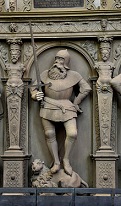

1388 In Feb. the five Lords Appellant secure the conviction of five of the king's counselors for treason for supporting his personal rule in the Merciless Parliament; Robert de Vere is one of the accused, but luckily he's abroad; Queen Anne goes down on her knees to Thomas Woodstock, duke of Gloucester to beg for the life of Richard II's tutor Sir Simon de Burley (b. 1336), warden of the Cinque Ports (since 1384) but is refused, and he is executed - who kept his clothes and bed? On July 1 Lithuanian grand duke (since 1392) Vaytautas the Great grants a charter of privileges to the Jews of Brest, followed by Trakai, Grodno (1389), Lutsk, Vladimir et al. On Aug. 5 (19?) after the Scottish-French army invades Berwick, it defeats the English at the Battle of Otterbourne (Chevy Chase); too bad, Berwick gov. Sir Henry Percy leads a counterattack, killing Scottish leader James, 2nd earl of Douglas (b. 1328), who is succeeded by his dark-complected son Sir Archibald of Galloway, who becomes "Black" Archibald "the Grim", 3rd Earl of Douglas (1328-1400) with the help of Robert Stewart, earl of Fife, who then combine to cause lame John Stewart, earl of Carrick (who was kicked last year by a horse ridden by Sir James Douglas of Dalkeith) to be forced on Dec. 1 to resign as lt. in favor of his younger bro' Robert, who then decides to forget the English and go after his haughty younger brother Alexander Stewart, lt. and justiciar N of Forth in the highlands to satisfy the lowlanders by stripping him of Moray and Ross, bringing peace to the Scottish-English frontier; even though he is captured and ransomed back, and the English side lost, Percy earns the nickname Hotspur. On Aug. 24 the Battle of Doffingen sees the Swabian League defeated by an imperial army under Count (since 1344) Eberhard II of Wurttemberg (1316-92), after which each of its free cities are taken and devastated. On Aug. 27 the Battle of Bileca sees a 7K-man Bosnian force under Grand Duke Vlatko Vukovic Kosaca (-1392) defeat an 18K-man Ottoman raiding party under Lala Shahin Pasha (1330-89) (ruler of Sofia) that invaded Hum, using heavy cavalry to break the Ottoman ranks and pursue them as they retreat, with Shahin barely managing to save himself with a small band of soldiers, and dying soon after. Charles VI assumes active rule in France, and regent Philip the Bold, duke of Burgundy retires to his duchy. King Albrecht is driven from Sweden. Galeazzoland, er, Milan conquers Padua with the help of Venice. A Florentine army defeats the Catalan Duchy of Athens at the Battle of Kaledes (Peritheorion) (Anastasioupolis), and the duchy is dissolved, along with the Catalan Co. The Aragon-Navarre Treaty fixes their mutual borders. Delhi Sultan (since 1351) Firoz Shah of Delhi dies, his kingdom in near anarchy, just in time for Tamerlane (1398); Mahmud Tughlak (Tughluq) (d. 1398) becomes sultan of Delhi (until 1398). John de Neville, 3rd baron Neville dies, and his son Ralph Neville, 4th Baron Neville de Raby, 1st Earl of Westmorland (1364-1425) becomes English warden of the Scottish border. The U. of Cologne in Cologne, Germany is founded with a charter signed by Pope (1378-89) Urban VI (1318-89); classes open on Jan. 6, 1389; it is closed by the French in 1789 and reopened in 1919. Architecture: The new Gothic Oviedo Cathedral (founded in 781) in Spain is begun by Toledo bishop Gutierre, with the original 802 chapel kept as the Camara Santa; it is filled with royal Asturian tombs, relics, and mss. Births: English soldier Thomas Montacute (Montagu), 4th Earl of Salisbury (d. 1428) on June 13; eldest son of John Montacute, 3rd earl of Salisbury (1350-1400); father of Alice Neville (1407-), wife (1425-) of Richard Neville, 5th earl of Salisbury (1400-60). Italian duke of Milan #2 (1402-12) Giovanni (Gian) Maria Visconti (d. 1412) on Sept. 7; son of Gian Galeazzo Visconti (1351-1402) and Caterina Viconti. Italian poet Leonardo Giustiniani (d. 1446). Deaths: Italian poet Antonio Pucci (b. 1301). Scottish military leader James, 2nd earl of Douglas (b. 1358) on Aug. 15 in Berwick (KIA). English warden of the Scottish border John de Neville, 3rd baron Neville (b. ?).




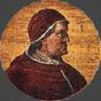




1389 On Feb. 24 king Albrecht's forces are defeated by Queen Margreta's in the Battle of Falkoping in Asle, and the king and his son Erik are taken captive; Mecklenburg rule in Sweden ends. He finally came? On May 2 23-y.-o. Richard II declares himself of age, takes control of his kingdom from his royal council, and on July 18 signs a 3-year Scottish-French Truce in Leulingham; England is now enjoying prosperous and peaceful times, and Richard is on good terms with Parliament, so he accepts constitutional rule for eight years before his despotic tendencies get the better of him and he spoils it all. On May 19 grand duke (since 1363) Dmitri II Donskoi (b. 1350) dies after becoming the first Russian grand duke to bequeath his titles without consulting the Mongol khan, and his son Vasilii (Basil) I (1371-1425) becomes grand duke of vodka-chugging Moskva (Moscow) (until 1425); Dmitri II's death allows exile metropolitan Cyprian to return next year after a near-fatal storm on the Black Sea. Ser-bi-a, and so are we, bye bye blackbird? On June 15 (June 28 New Style) (St. Vitus' Day) the Battle of Kosovo Field (Field of the Blackbirds) (First Battle of Kosovo) sees 27K-40K Muslim Turks under sultan (since 1359) Murad I (b. 1326) defeat 12K-30K Orthodox Christian Serbs under Prince Lazar allied with a Bosnian force of 5K-10 under Vuk Brankovic (1345-97), and another 5K-10K under his son Vlatko Vukovic Kosaca, Grand Duke of Hum (-1392) , both sent by Bosnian king Tvrtko I, along with a continent of Knights Hospitallers led by Croatian knight John of Palisna (-1389) from Vrana, incl. several thousand cavalry, becoming the first Ottoman V against a major European allied army, establishing Turkish rule S of the Danube until 1913; Lazar is captured in battle and killed; on June 16 Murad I is killed in his tent, allegedly by a Serb posing as a deserter, although it's more probable that he dies in battle, becoming the only Ottoman sultan to die in battle; Murad I is succeeded by his partly-Greek son Beyazid (Beyezid) (Bajazet) I (Yildirim) (the Thunderbolt) (1360-1403) as Ottoman sultan #4 (until 1403), beginning the conquest of W and C Anatolia (Saruhan, Aydin, Menteshe, Hamideli, Germiyan, E Karaman) (1389-90); Prince Lazar's son Stefan Lazarevic (1374-1427) becomes ruler of Ottoman vassal Serbia, with his mother princess Milica ("gracious") Hrebeljanovic (-1405) as regent; his sister PrincessOlivera Despina (1372-1444) marries sultan Bayezid I; Stefan goes on to modernize Serbia, introducing modern battle tactics, knight tournaments, and firearms; some Serbs hold out in the mountainous Montenegro (It. "black mountain") (Serb. "Crna Gora") region of the province of Zeta between Yugoslavia and Albania, named after 5,771-ft. Mt. Lovcen ("black mountain"), which becomes an independent principality (until 1910); the Germiyan Turkoman principality in W Anatolia (founded 1283) is annexed by the Ottomans (1389-90), along with the Aydin principality in W Anatolia (founded 1308) and the Saruhan principality in W Anatolia (founded 1313); Murad I begins the large-scale practice of Devshirme (Devsirme), the levying of Christian children for conversion to Islam and work in the Janissaries, palace, and admin.; from henceforth all Turkish sultans are sons of concubines - if not bitches? On Oct. 15 after changing the period between Holy Years to 33 to coincide with the length of Christ's life, and executing five cardinals for conspiring against him, headstrong quarrel-prone Pope (since 1378) Urban VI (b. 1318) dies (poisoned by the Romans for being older than 33?), and on Nov. 2 Naples-born Piero Tomacelli is elected Pope (#202) Boniface IX (-1404), ruling the city of Rome like an autocrat, bringing his hometown of Naples (which had supported the Avignon popes) back into his jurisdiction, and strengthening the papal states; he forbids Christians to harm Jews, destroy their cemeteries, or forcibly baptize them. In Oct. Margreta becomes official ruler of Sweden; Eric (Erik) of Pomerania (1381-1450) is acknowledged as king of Norway (until 1442); he is not coronated until 1392 (June 17, 1397?). Richard III of Scotland is injured by a horse, and hands control over to Richard Stuart, 1st Duke of Albany and Earl of Fife and Monteith (1341-1420). John of Gaunt returns to England, is made duke of Aquitaine, and helps Richard II of England regain power and assert his authority over the hostile barons led by Thomas of Woodstock, duke of Gloucester; William of Wykeham becomes Lord Chancellor of England. French king Charles VI restores his father's old advisers the Marmousets; meanwhile spendthrift Duke Louis of Orleans becomes unpopular in Paris, allowing his rival Duke Philip the Bold of Burgundy, supported by Queen Isabelle to pose as a reformer and lead the opposition. Wenceslaus IV eagerly proclaims an arrangement in Eger in N Hungary prohibiting all leagues between cities in the empire while confirming their political autonomy, dissolving the Swabian League. Count John III of Armagnac invades Aragon-controlled Majorca (until 1390). An ancient granite obelisk is retrieved from the Rhone River near Arles, France (45 mi. NW of Marseille), and housed there. French bishop of Troyes Pierre d'Arcis writes a letter expressing doubts about the authenticity of the Shroud of Turin and claiming he has exposed an unnamed artist as the forger. Inventions: The first Standard Paper Sizes, starting with imperial (22 in. x 30 in.), down to chancery are established in Bologna, Italy. Nonfiction: Giovanni da Prato, Paradiso degli Alberti; sings the praises of blind Florentine organist-singer-composer Francesco Landini (Landino) (1325-97), the Mozart of his day. Births: English soldier John of Lancaster, 1st Duke of Bedford (d. 1435) on June 20; 3rd surviving son of Henry IV (1366-1413) by 1st wife Mary de Bohun (1368-94); brother of Henry V (1386-1422); uncle of Henry VI (1421-71). Italian Godfather #1 Cosimo I de' Medici (the Elder) (Vecchio) (d. 1464) on Sept. 27 in Florence; son of Giovanni di Bicci de' Medici (1360-1429). Ottoman sultan #5 (1413-21) Mehmed (Mehmet) (Muhammad) I (the Restorer) (Celebi) (d. 1421); son of Beyazid I (1347-1403); father of Murad II (1403-51). Deaths: Uzbekistani Naqshbandi Order foundre Baha-ud-Din Naqshband Bukhari (b. 1318) in Bukhara. Persian poet Shams-ud-din Muhammed Hafiz (b. 1320). Russian prince St. Dmitri II Donskoi (b. 1350) on May 19 in Moscow. Ottoman sultan #3 (1362-89) Murad I (b. 1326) on June 15 in Prishtina District, Kosovo (KIA in the Battle of Kosovo). Ottoman bey Lala Shahin Pasha (b. 1330) in Plovdiv.



1390 Another plague outbreak occurs in Europe (next 1400). In Jan. Scottish Stewart king #1 (since 1371) Robert II (b. 1316) makes a farewell tour of NE Scotland to show support for the actions of his son Robert Stewart, earl of Fife in reining-in his other son Alexander Stewart, then dies in Dundonald Castle in Ayrshire on Apr. 19, and on Aug. 14 after a 4-mo. delay, during which Alexander destroys Elgin Cathedral, his eldest son John Stewart of Kyle, earl of Carrick is crowned Robert III (1337-1406) of Scotland at Scone (until Apr. 4, 1406), changing his name to avoid any assoc. with the unpopular John de Baliol or John II of France; meanwhile Robert II's mistake in giving too much power to his sons after working like hell to get it for them ends up in them joining the pro-David II crowd in painting the old man as a poor king?; "I cannot hold this aged king... to have been a skilful warrior or wise in counsel" (John Mair, 1521). On Oct. 9 king (since May 29, 1379) Juan I of Castile (b. 1358) dies after a fall from a horse, and his son Henry III (the Sufferer) (the Mourner) (the Infirm) (1379-1406) becomes Trastamara king of Castile and Leon #3 (until Dec. 25, 1406), going on to trim the power of the aristocracy, repealing the alcabala sales tax, and ending their right to attend the royal council; after a crescendo of violence against the Jews next year, he passes laws protecting them. On July 1 the Mahdian (Barbary) Crusade sees 6K French and Genoese Crusaders on 60 ships siege Mahdia, Tunisia, held by 40K men under Abu al-Abbas Ahmad for 10 weeks until a relief army arrives in Oct. and a trade treaty is negotiated. Queen Margreta get her grandnephew Erik of Pomerania (b. 1382) elected as heir to the Swedish throne. Aragonese troops led by Infante Marin, brother of John I of Aragon defeat and expel Count John III of Armagnac from Majorca; meanwhile John I loses the duchies of Athens and Neopatras in Greece. Gian Galeazzo Visconti (1351-1402) of Milan begins a campaign to take Tuscany (ends 1392). In his decade the Kingdom of Kongo in WC Africa is founded, growing to incl. the territory from the Atlantic Ocean E to the Kwango River, and from the Congo River S to the Kwanza River; the kings of Kongo are called the Manikongo; in 1891 it becomes a vassal state of Portugal, and in 1914 it is abolished and incorporated into the Portuguese colony of Angola. A census of the Jews in Castile shows only 3.6K family heads remaining; the archdeacon of Ecija assumes control of the diocese after the death of the archbishop of Seville, and orders the destruction of all synagogues and Hebrew books; chief rabbi of Castile Solomon Halevi (Pablo de Santa Maria) and his entire family allegedly convert to Roman Catholicism. John Wycliffe's writings reach Bohemia - oh, 25 miles from home, girl, my feet are hurting mighty bad? In the late 14th cent. hopped beer begins to be imported to England from the Netherlands; too bad, English ale drinkers resist its bitter taste until its greater shelf life (months instead of days), smaller amount of grain required, and marketability cause it to win drinkers over, dominating London brewing by the 17th cent. Architecture: Sir William Drummond builds Balmoral Estate in Aberdeenshire, Scotland after buying the land from Robert II. Nonfiction: In this decade Thomas Walsingham of St. Albans (-1422) writes Chronicle, a Latin history of England. Poetry: Pearl Poet (anon.), Sir Gawain and the Green Knight; by the anon. Pearl (Gawain) Poet (John Massey?); about King Arthur's nephew, who is challenged to a beheading game by the mysterious Green Knight, and is tested by Lady Bertilak. Anon., Pearl; Patience; Cleanness. Births: Flemish painter (Northern Renaissance leader) Jan van Eyck (Johannes de Eyck) (d. 1441); brother of Hubert van Eyck (1366-1426). English prince Humphrey of Gloucester (d. 1447) on Oct. 3; 4th son of Henry IV and 1st wife Mary de Bohun; named after maternal grandfather Humphrey de Bohun, 7th earl of Hereford (1342-73); created duke in 1414. French poet Alain Chartier (d. 1430) in Bayeux, Normandy. Scottish gen. Archibald Douglas (d. 1439); son of Archibald Douglas, 4th earl of Douglas and Margaret Stewart, eldest daughter of Robert III. French officer La Hire (Fr. "Herisson" = hedgehog) (Etienne de Vignolles) (d. 1443) AKA "Hire-God" (Lat. "Ire Dei" = wrath of God) in Prehacq-les-Bains, Landes; friend of Joan of Arc. Wallachian prince (1436-42, 1443-7) Vlad II Dracul ("the Dragon") (d. 1447); son of Mircea I (1386-1418); father of Mircea II (1427-47), Vlad III Dracula the Impaler (1431-76), and Radu the Handsome (1437-75). Portuguese military hero Alvaro Vaz de Almada, 1st Count of Avranches (d. 1449); knighted on Aug. 4, 1444 by Henry VI of England. Spanish (Galician) poet Juan Rodriguez de la Camara (del Padron) (d. 1450) in Padron; last poet of the Galician School. English clergyman William Byngham (Bingham) (d. 1451). English composer-mathematician John Dunstable (Dunstaple) (d. 1453) in Dunstable, Bedfordshire; leading English composer of the early 15th cent.; first composer to write instrumental accompaniments to church music, and to write elaborate music about a cantus firmus; forgotten until the end of the 19th cent., when German church musicologist Franz Xaver Haberl discovers his work in Trento Cathedral in Italy. Portuguese explorer Joao Goncalves Zarco (d. 1471). Deaths: Scottish (1371-90) king Robert II (b. 1316) on Apr. 19 in Dundonald Castle in Ayrshire; buried in Scone Abbey beside Queen Euphemia. Spanish king of Castile (1379-90) Juan (John) I (b. 1358) on Oct. 9 in Alcala de Henares (fall from a horse); same fate as his cousin John I of Aragon (1350-96).
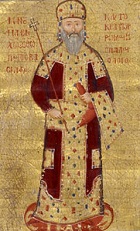
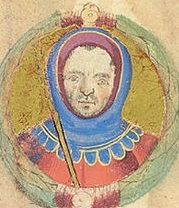
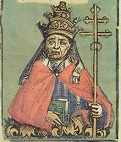

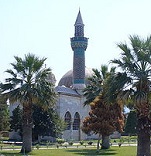
1391 On Feb. 16 Byzantine emperor (since 1341) John V Palaeologus (b. 1332) dies, and the Byzantines lose their last possession in Asia Minor to the Turks; his grandson John VII Palaeologus seizes power for a short time; meanwhile on Feb. 16 John V Palaeologus's son Manuel II Palaeologus (Manuel II Palaiologos) (1350-1425) becomes Byzantine emperor (until July 21, 1425); trouble is, he's a hostage of Ottoman Sultan Beyazid (Bajazet) I?; in the winter he writes Dialogue Held with a Certain Persian, the Worthy Mouterizes, in Ankara of Galatia, on Christianity vs. Islam, containing the immortal soundbyte: "Show me just what Muhammad brought that was new, and there you will find things only evil and inhuman, such as his command to spread by the sword the faith he preached", which is quoted by Pope Benedict XVI on Sept. 12, 2006; it concludes "God is not pleased by blood, and not acting reasonably is contrary to God's nature. Faith is born of the soul, not the body. Whoever would lead someone to faith needs the ability to speak well and to reason properly, without violence and threats. To convince a reasonable soul, one does not need a strong arm, or weapons of any kind, or any other means of threatening a person with death", to which the Muslim replies that God isn't bound even by his own word, and that nothing can make him reveal the truth to us, and that he could even make us practise idolatry if he wants. On Mar. 4 the U. of Ferrara in Ferrara, Emilia-Romagna, Italy is founded by Marquis Alberto V D'Este (1347-93) with permission from Pope Boniface X; on Oct. 18 the Studium Generale opens, offering courses in law and theology; in 1871 after Italian unification it becomes a free univ., teaching law, mathematics, medicine, and veterinary medicine (until 1876); in 1946 after WWII it becomes state-supported, growing from 500 students in 1914 to 16K students. On June 6 (Tammuz 1) taking advantage of the death of weak king John (Juan) I last Oct. 9, who barely held Jew-hatred back, and the appointment of a weak regent council, a huge Jewish pogrom begins in Seville, Spain, killing 4K Jews out of 7K families, followed by Cordoba, Toledo, Majorca, Barcelona, and Valencia, causing many Jews to fake conversion to Roman Catholicism, beginning the phenomenon of mass Crypto-Judaism, which later backfires as nobody but their hairdressers know for sure? On June 18 Tamerlane wins the Battle of Kanduzcha in India. On Oct. 7 St. Birgitta (1303-73) (Nor. "splendid") is canonized by Pope Boniface IX, becoming Sweden's first saint - a Viking saint? On Nov. 11 a group of four pissed-off Franciscans demand an audience with the qadi at the al-Aqsa Mosque in Jerusalem, and tell him that Muhammad was "a libertine, a murderer, a glutton, a despoiler who thought that the purpose of human life was eating, whoring, and wearing expensive clothes", refusing conversion to Islam before being executed and joyfully becoming martyrs for Christ, enduring beating and torture before being hacked into pieces by a mad mob and and burned. Bosnian king (since 1353) Tvrtko I dies, and his sons Stjepan (Stephen) Tvrtko II (-1443) and Stjepan Ostoja fight for the succession, causing the kingdom to begin to disintegrate. Amadeus VII dies, and his son Amadeus VIII the Peaceful (1383-1451) becomes count of Savoy, scheming to turn it into a duchy. Leopold IV (1371-1411), 2nd son of Leopold III is made ruler of Further Austria by his older brother Duke William the Ambitious, followed by Tirol in 1396 (until 1411). The Ottomans under Yigit Bey capture Skopje in Macedonia, and annex the Janarid principality in Kastmonu; Wallachia is forced to pay tribute. A revolt in Sicily proclaims Louis of Durazzo (1324-62) (vicar of Albania since 1337) as king, and John I of Aragon quashes it. Architecture: The Green (Yesil) Mosque of Iznik in Iznik, Turkey (begun 1378) is completed, with a cool green prayer tower. Births: Portuguese Aviz king #11 (1433-8) Duarte (Edward) (the Philosopher) (the Eloquent) (d. 1438) on Oct. 31 in Tomar; son of John I (1357-1433) and Philippa of Lancaster (1360-1415) (daughter of John of Gaunt); brother of Prince Pedro (1392-1449) and Henry the Navigator (1394-1460). English heir (last of the Mortimer line) Edmund de Mortimer, 5th Earl of March, 7th Earl of Ulster (d. 1425); son of Roger Mortimer, 4th earl of March; nephew of Harry Hotspur's wife; grandnephew of Richard II. Scottish leader Archibald, 5th Earl of Douglas (d. 1439). Greek Orthodox hesychast theologian (St.) Mark of Ephesus (Manuel Eugenicus) (Eugenikos) (d. 1444 in Constantinople; feast day: Jan. 19. Italian architect-sculptor Michelozzo di Bartolommeo Michelozzi (d. 1472) in Florence; pupil of Ghiberti.
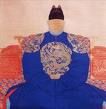




1392 In Aug. en route to Brittany with his army, French king (since 1380) Charles VI the Beloved (1368-1422) goes mad and kills four knights in the forest of Le Mans, and almost kills his brother Louis of Orleans, going on to become more and more mad, leading to his brothers stripping him of political power, which results in a power struggle between Louis of Orleans and John the Fearless, duke of Burgundy that makes it ripe for takeover by the English. On Oct. 21 S Japanese Yamato emperor Go-Kameyama finally turns over the three sacred treasures to N emperor Go-Komatsu, making him sole Japanese Yamato emperor #100 of Japan (until 1412), and ending the Ashikaga Revolt (begun 1331). Muhammad VII (1370-1408) becomes Nasrid sultan #12 of Granada (until 1408); Yussuf ben-Serragh, head of the Abencerrages (Arab. "saddler's son") tribe helps him restore his crown 3x; when one of them is caught climing up to the window of a lady of the royal family, the whole Abencerrages family is shut up in the Alhambra in the Hall of the Abencerrages before being murdered. Yi Songgye, with the aid of the Ming rulers of China seizes the Korean throne from the Korean Koryo (Goryeo) Dynasty, making Keijo (modern-day Seoul) their capital; on Aug. 5 Taejo (1335-1408) (Ni Seong-gye) (Ni Dani) becomes king of Korea (until Oct. 14, 1398); the Wang Dynasty ends, and the Yi (Choson) (Chosen) (Joseon) Dynasty begins (ends 1910); the Annals of the Choson Dynasty, detailing everyday court life begin to be compiled (until 1863), becoming the longest continuous historical record on Earth (until ?). Charles VI of France (1368-1422) suffers the first of his 44 bouts of madness (fever and convulsions), causing him to tear his clothing and break furniture, and get the idea that he is made of glass and about to break; in a flash of lucidity he prohibits the playing of chess before going completely insane, causing brothers Philip the Bold, Duke of Burgundy (1342-1404) and Jean of Valois, Duke of Berry (1340-1416) to be appointed regent and resume control while vying for power with Charles VI's dissolute brother Louis, whom he makes Louis, Duke of Orleans (Orléans) (1372-1407), and his own son John the Fearless (1371-1419). Byzantine emperor Manuel II Palaeologus escapes from the court of Beyazid I, causing him to seige Constantinople for almost 10 years (1394-1402). Florence blocks Milan's advance on Tuscany, aided by the rebellion of Padua. Witowt is recognized as master of Lithuania by Ladislaus II of Poland. The Malwa Sultanate is founded in Malwa in WC India (until 1562), wich capital in Mandu. After recognizing the rot that has set in, the Russian Orthodox Church stops all mention of the existence of a Roman emperor - it's survival in the city when you're living day by day? The Ashikagas becomes shoguns of Muromachi. Foreigners in England are forbidden to retail goods. A law in Venice orders horses and mules to carry bells while crossing the bridges, and prohibits horses in the crowded Merceria. Births: Italian duke of Milan #2 (1412-47) Filippo (Philippo) Maria Visconti (d. 1447) on Sept. 23 in Milan; son of Gian Galeazzo Visconti (1351-1402). Byzantine emperor (1425-48) John VIII Palaeologus (Palaiologos) (d. 1448) on Dec. 18; eldest son of Manuel II and Helena Dragas (daughter of Prince Constantine Dragas). Burmese Hanthawaddy king #10 (1421-4) Binnya Dhammaraza (d. 1424) in Pegu; son of Razadarit (1368-1421); brother of Binnya Ran I (1395-1446). Portuguese Aviz infante prince ("of the Seven Parts of the World") Pedro (Peter), Duke of Coimbra (das Sete Partidas do Mundo) (of the Seven Parts of the World) (d. 1449); son of Joao I (1357-1433) and Philippa of Lancaster (1360-1415) (daughter of John of Gaunt); brother of Edward I (1391-1438) and prince Henry the Navigator (1394-1460). Deaths: Russian Orthodox monk St. Sergius of Radonezh (b. 1314) on Sept. 25 in Trinity Lavra of St. Sergius. English court favorite (of Richard II) Robert de Vere, earl of Oxford (b. 1362) in Louvain, France (exile); killed by a wild boar; Richard II has the body brought back to England, and opens the coffin and kisses his hand. Bosnian duke (1388-92) Vlatko Vukovic Kosaca (b. ?); buried in Boljuni near Stolac.




1393 On Mar. 20 German king (since June 10, 1376) and Bohemian king (since Nov. 29, 1378) Wenceslaus (Wenceslas) (Wenzel) IV (the Drunkard) (the Lazy) of Luxembourg (1361-1419) has Prague vicar-gen. (St.) John of Nepomuk (b. 1345) tortured then murdered in Prague by being thrown over the Charles Bridge into the Moldau River for backing the Roman pope against the Avignon pope and confirming a candidate for abbot of Kladrau without the king's permission - snakes, why did it have to be snakes? On July 17 after a 3-mo. siege, taking advantage of the absence of tsar (since Feb. 17, 1371) Ivan Shishman (1350-95), who is holed-up in Nikopol, and helped by treason, the city of Veliko Tarnovo (Trnovo) (Tarnovgrad) (City of the Tsars), capital of Bulgaria falls to the Ottomans, who go on to annex most of the vassal state of Bulgaria by 1396, and retain control for the next 515 years (until 1908), although Christian pockets in the mountains hold out; the Ottomans begin the conquest of Albania (ends 1395) - the original Big Gulp, of Slavic and Turkish Christians? After knocking off the Alberti family, Maso degli Albizzi (1382-1417) comes to power in Florence as gonfaloniere. Robert III makes his teenie son David Stewart, Duke of Rothesay (1378-1402) the new earl of Carrick as a step towards succession, and gets his wannabe brother Earl Robert of Fife discontinued as lt. of Scotland, though he remains chamberlain in control of finances, presiding over a drastic devaluation of Scottish money; meanwhile Robert III allies with the Red Douglases in Angus (SE Scotland), while Fife allies with the Black Douglases (whose emblem is the red heart), who about this time build Threave Castle on an island in the River Dee; Fife and David, along with Earl Lindsay of Crawford begin more campaigns against pesky Alexander Stewart and his sons in the highlands (until 1399). The English Parliament passes the Statute of Praemunire, continuing the freeing process begun in 1279 by the Statute of Mortmain by restricting the judicial authority of the Church. Richard II passes a law requiring inns to display a sign, causing England to grow more colorful. New College in Oxford, founded by Winchester bishop William of Wykeham (1320-1404) opens. John I of Aragon founds the Consistori de la Gaya Sciencia de Barcelona (Academy of the Gay Science of Barcelona), a lit. academy imitating the Consistori del Gay Saber of Toulouse (founded 1323). Nonfiction: Anon., Le Menagier (Ménagier) de Paris; guidebook for married women in running a household, incl. sex, cooking, and gardening, written by an elderly husband for his younger wife. Births: Persian Mongol Timurid sultan (1447-9) and astronomer-mathematician (Sunni Muslim) Ulugh Beg ("Great Ruler") (Mirza Mohammad Taregh bin Shahrokh) (d. 1449) in Sultaniyeh, Persia; grandson of Tamerlane (1336-1405); turns Samarkand into a center of science and learning. Deaths: Bohemian priest St. John of Nepomuk (b. 1345) on Mar. 20 in Prague (thrown over the Charles Bridge into the Moldau River); canonized on Mar. 19, 1719. Italian lord of Ferrara and Modena (1388-93) Alberto V d'Este, marquis of Ferrara (b. 1347) on July 30. Japanese Ashikaga pretender emperor #5 (1371-82) Go-En'yu (b. 1359) on June 6.


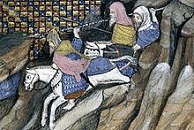

1394 On Sept. 16 Antipope (since 1378) Clement VII (b. 1342) dies of mushroom poisoning, and on Sept. 28 cardinal (since 1375) Pedro de Luna of the diocese of Tortosa in Aragon is elected antipope #2 of the Great Schism Antipope Benedict XIII (1328-1423) (until 1417) by the cardinals in Avignon on his promise of supporting the ending of the schism, which he reneges on. A 4-year English-French Truce in their Hundred Years' War of Fun and Delight is signed in Calais. On Oct. 2 after formidable Leinster king (since 1375) Art Óg Mac Murchadha Caomhánach (Art MacMurrough-Kavanagh) (Art M'Morrough O'Cavanagh) (Art MacMorrough) (Art MacMorrow-Kavanagh) (Art MacMorrow) (1357-1417) erodes the authority of the young earl of Ulster, English king Richard II invades Ireland (until May 1395) with 7K men to enforce his rule (first expedition to Ireland since King John in 1210), accompanied by Thomas Woodstock, duke of Gloucester; Edmund of Langley, duke of York acts as regent in his absence; too bad, the Battle of Ros-Mhic-Thriuin (Thriúin) near New Ross in County Wexford is a V for Macmurrough; on Dec. 25 Richard II defines the borders of English rule in Ireland AKA the English Pale. The Battle of Egea sees the Granadans become the first troops in Iberia to use handguns? King Wenceslaus IV is taken prisoner by his cousin Jobst of Moravia. The Ottomans under Sultan Bayezid I conquer Thessaly, and begin the First Ottoman Siege of Constantinople (ends 1402), blockading it to starve it out, causing it to be devastated by famine and plague, and a large part of the pop. to flee. Abd al-Aziz II (-1434) becomes emir of the Hafsid Dynasty in Tunisia (until 1434), pirating Christian shipping and using the profits for bldgs., art and culture, drawing retaliatory strikes against Tunisian cities by Aragon and Venice. Jaunpur and Awadh in India become independent under the Sharki (Sharqi) Dynasty (ends 1479), founded by eunuch Malik Sarvar (Khwaja Jahan) (-1402), who adopts sons of black African descent. A free-roaming pig is tried like a person and hanged in Normandy for eating a child - shanks for nothing? Winchester (St. Mary's) College at Oxford, founded by William of Wykeham opens on Mar. 28 - let's sit back and get lost in a word of Alice? Architecture: William Wynford begins remodelling the Norman nave of Winchester Cathedral in the new Perpendicular Gothic style. Nonfiction: Trouvere Jean d'Arras of N France writes The Noble History of the Lusignans, dedicated to Marie of Valois, duchess of Bar, which incl. Roman (Chronique) de Melusine, about Crusader King Elynas of Albany (Alba or Scotland) and his daughter Melusine by fairy Pressyne, who is condemned to be a mermaid - I wish I could be like Superman Births: Portuguese Aviz prince (father of the caravel) Henry the Navigator (the Seafarer), Duke of Viseu (d. 1460) on Mar. 4 in Porto; 5th child of John I and Philippa of Lancaster (daughter of John of Gaunt); brother of Duarte I (1391-1438) and Prince Pedro (1392-1449). French Valois duke-poet Charles of Valois, Duke of Orleans (Orléans) (d. 1465) on Nov. 24 in Paris; son of Duke Louis of Orleans (1372-1407) and Valentina Visconti, duchess of Orleans (1371-1408); father of Louis XII (1462-1515). Scottish king (1406-37) James I (d. 1437) on Dec. 10 in Edinburgh Castle; son of Robert III (1340-1406) and Annabella Drummond (1350-1401). English chief justice of the king's bench Sir John Fortescue (d. 1476) in Norris (near South Brent), Somerset; 2nd son of Sir John Fortescue; educated at Exeter College, Oxford U. Italian countess Margaret de Baux (Margherita del Balzo), Countess of St.-Pol, Brienne, and Conversano (d. 1469); wife of Peter of Luxembourg (1390-1433); grandmother of Elizabeth Woodville (1437-92); ancestor of Henry IV of France, Mary Queen of Scots, and all English monarchs after 1509. Italian poet-scholar Antonio Beccadelli "Il Panormita" (The Palmeritan) (d. 1471) in Palermo; student of Gasparino de Bergamo (1360-1431). Deaths: Azerbaijani Hurifiya Sect leader Fadlallah Astarabadi (b. 1340). Korean Goryeo king #34 (last) (1389-92) Gongyang (b. 1345) on May 17. English queen Anne of Bohemia (b. 1366) (wife of Richard II) on June 7.



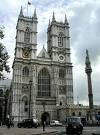
1395 In Feb. the Twelve Conclusions of the Lollards is nailed to the doors of Westminster Abbey and St. Paul's Cathedral, and presented to Parliament by the Lollards (Dutch "lollaerd" = singer of psalms) (loller = lazy fellow), criticizing the wealth of the clergy, disputing the real presence of Christ's body and blood in the Eucharist, dissing the worship of images of Christ suffering on the cross, and calling for a form of separation of Church and State, calling for a universal non-celibate priesthood sans confessions to priests and their feigned forgiveness of sins; "If the cross of Christ, the nails, spear, and crown of thorns be honored, then why not honor Judas' lips, if only they could be found?" On Apr. 14 Tamerlane defeats his arch-rival Tokhtamysh at the Battle of the Terek River in N Caucasus, then sacks his capital of Sarai Berke and places a puppet on the throne, ending central control of the Mongol Golden Horde; Tokhtamysh escapes to the Ukrainian steppes and requests aid from Lithuanian grand duke Wytowt (Vytautas). In Apr. Sardinian judge (since 1383) Eleanor de Bas-Serra (Arborea) (Arbaree) (1347-1404) gets the Carta de Logu passed, a civil-penal law code for Sardinia substituting fines for imprisonment for most crimes, preserving the property rights of women, and granting legal protection to falcons, which is not superseded until Apr. 1827 by the code of Charles Felix. On May 17 the Battle of Rovine near the Arges River (Craiova?) in Wallachia sees the heavily-outnumbered Wallachians led by Mircea the Elder defeat the Ottomans led by Sultan Bayezid I after the Wallachian archers decimate their intial wave; both sides suffer heavy losses; Serbian Prince Marko Mrnjavcevic (b. 1335) vassal of the sultan is KIA. On June 3 Bulgarian tsar (since 1371) Ivan Shishman (b. 1350) is beheaded in Nikopol by Sultan Bayezid I, and his territory is annexed by the Ottomans; Bulgarian emperors continue to rule in Vidin until 1422. The Ottomans occupy the Dobruja (between the Black Sea and Danube River), and invade Wallachia and Hungary. Richard II secures a propaganda V when four Irish kings swear fealty and accept knighthood from him, the royal houses of O'Neill, O'Connor, O'Brien, and Macmurrough. Gian Galeazzo Visconti (1351-1402) is made the first hereditary duke of Milan by Wenceslaus IV, becoming the first such title among Italian regional rulers; asking himself "Why stop there?", he plots to unite N Italy into a revived Lombard empire with him driving the boat. Jelena Gruba becomes the first and only female ruler of Bosnia (until 1398). Architecture: Gonzaga Fortress in Mantua, Italy is begun (finished 1406). The rebldg. of Westminster Hall in London, England is begun (finished 1399), featuring a hammer-beam roof. Nonfiction: Pero Lopez de Ayala (1332-1407), History of the Kings of Castile (vol. 1); written in prison; the complete work is printed in 1779-80. Births: Lithuanian Hussite duke Sigismund Korybut (d. 1435) in Novgorod-Seversky; nephew of Wladyslaw II Jagiello (1362-1434) and Wotila (1350-1430). Burmese Hanthawaddy king #11 (1424-46) Binnya Ran I (d. 1446); brother of Binnya Dhammaraza (1392-1424). Italian painter Pisanello (Antonio di Puccio Pisano (da Cereto)) (d. 1455) in Pisa. French merchant Jacques Coeur (d. 1456) in Bourges. Greek Orthodox-Roman Catholic scholar Cardinal Johannes (John) (Basilius) Bessarion (d. 1472) in Trebizond; pupil of Gemistus Pletho (1355-1452); attempts to reconcile Plato and Aristotle and reunite the Greek and Roman churches. Deaths: French chef Taillevent (b. 1310); leaves Le Viandier, the first French cookbook, founding French cuisine incl. its love of strong red wines from S France and Burgundy. Scottish "The Brus" poet John Barbour (b. 1316) on Mar. 13 in Aberdeen. Italian painter Altichiero da Zevio (b. 1330). Serbian king (1371-95) Prince Marko (b. 1335) on May 17 in Rovine, Wallachia (KIA). Austrian duke Albert III the Pigtail (b. 1349) on Aug. 29 in Schloss Laxenburg. Hungarian queen (1382-95) Mary (b. 1371) on May 17 in Buda.


1396 In Jan. 14-y.-o. Erik of Pomerania is declared of age, and becomes king of Denmark; in July he becomes king of Sweden; Margreta (Margaret), Queen (since 1387) of Denmark maintains the real power (until 1412), working to recover the Danish royal domain while keeping the nobles down, and working Danes and Germans into positions of power in Sweden and Norway - that guy's surfing in snow and ice? On May 19 John I the Hunter of Aragon (b. 1350) dies without an heir after a fall from a horse, leaving his kingdom bankrupt, and his younger brother Martin I (the Elder) (the Humane) (the Ecclesiastic) (1356-1410) becomes king of Aragon (until 1410), becoming the last ruler of the House of Barcelona founded in 870 by Wilfred the Hairy, and continuing the support the Avignon popes; he sends his son King Martin the Young of Sicily to reconquer Sardinia from pesky Eleanor of Arborea. On Sept. 25 lord chancellor (since 1391) Thomas Arundel (1353-1414) is appoined by Richard II as archbishop of Canterbury. On Sept. 25 after king Sigismund I of Hungary leads an army of 20K Crusaders drawn from many European countries (incl. a bunch of French knights) against the Turkish Ottomans under Sultan Beyazid (Bajazet) I along the Danube, they are crushingly defeated at the Battle of Nicopolis (Nicopol) (Nikopol) after an initial V causes them to recklessly pursue the survivors, only to run into a fresh corps of Turkish sipahis being kept in reserve, followed by another Serbian army, causing a rout, with thousands of Crusaders KIA incl. nearly all of the knights in command, with the leading nobles taken POW incl. Enguerrand (Ingelram) VII de Coucy, 1st Earl of Bedford (1340-97), who are forced to watch a day-long mass beheading of up to 3K soldiers, after which they are marched naked 350km to Gallipoli then shipped to Turkey and held for ransom, only to run into an epidemic of the bubonic plague; the big V consolidates Ottoman hold of the Balkans and Bulgaria; Duke Philip the Bold's son John (b. 1371) is taken POW for a year until he is ransomed with an enormous boodle, earning the nickname Fearless for his bravery. On Sept. 28 Robert III of Scotland officiates at a clan combat to the death in Perth between the Kay and Chattan clans. To stave off a Portuguese invasion, Henry III of Castile stages a surprise attack on Badajoz on the Guadiana River on the Spanish-Portuguese border. The Muslim Rajput Dynasty is founded in Gujarat, W India (until 1572). Richard II of England dumps Anne of Bohemia, and marries his 2nd wife, 7-y.-o. French princess Isabella (Isabelle) of France (1389-1409) (daughter of Charles VI and Isabelle of Bavaria) in Calais, and secures a 20-year truce with France, which is unpopular but helps his finances; England is left with a strip of the Gascony coast from Bordeaux to Bayonne, plus Calais, which is much less than they controlled at the war's start in 1337. The red zone rule: never go behind, always go in front? John of Gaunt (b. 1340) marries his mistress Catherine Swynford (1350-1403) (his 3rd wife); his four children by her under the name of Beaufort are declared legitimate by Parliament in 1397, and begin successfully struggling for the English throne. Learned Czech dingaling John Huss delivers a series of lectures at the U. of Prague based upon the doctrines of John Wycliffe - you know I'm such a fool for you, you got me wrapped around your finger, do you have to let it linger? Births: Italian clergyman-writer Antonio Bettini (d. 1487) on June 13 in Siena. French Valois duke of Burgundy (1419-67) Philip III the Good (Philippe le Bon) (d. 1467) on July 31 in Dijon; son of John the Fearless (1371-1419) and Margaret of Bavaria (1363-1423); grandson of Philip the Bold (1342-1404); father of Charles the Bold (1433-77). English military cmdr.-statesman (foyal councilor of Henry VI) William de la Pole, 1st Duke of Suffolk, 1st Marquess of Suffolk, 4th Earl of Suffolk (AKA Jack Napes) (d. 1450); 2nd son of Michael de la Pole, 2nd earl of Suffolk (1367-1415); created marquess in 1444, earl in 1447, and duke in 1448; derisively nicknamed "jackanapes" because after rising from the merchant class to become a nouveau riche noble, he adopted a coat of arms featuring a collar and chain, associated with monkeys. Spanish king of Aragon, Valencia, Majorca, Sardinia, and Corsica (1416-58), count of Barcelona (1416-58), and king of Naples (1442-58) Alfonso V (the Magnanimous) of Aragon (Alfonso I of Naples) (d. 1458); son of Ferdinand I (1380-1416) and Eleanor of Albuquerque (1374-1435); brother of John II (1397-1479); father is from the House of Trastamara, mother from the the House of Barcelona. Czech Hussite Ultraquist theologian John of Rokycany (Jan Rokycana) (d. 1471) in Rokycany, Bohemia; educated at the U. of Prague. Deaths: German theologian Marsilius of Inghen (b. 1330). Spanish king of Aragon (1387-96) John I the Hunter (b. 1350) on May 19 near Foixa (fall from a horse); same fate as his cousin John I of Castile (1358-90). English mystic Walter Hylton (b. ?); leaves Ladder of Perfection. English Augustinian monk-historian Henry Knighton (Knyghton) (b. ?) in the St. Mary of the Meadows Abbey in Leicester; leaves Knighton's Chronicle (Chronicon) (5 vols.); English history from 959-1366; vol. 5 covers 1377-95; first pub. in 1652.

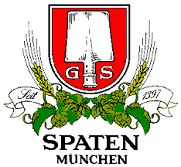
1397 Norway's 400-Year Night begins (ends 1814). Haxey escapes the axey, but Arundel doesn't fare as well? In Jan. Richard II is criticized by a parliamentary petition for the exorbitant expenses of his household, causing him to throw a hissy fit and get the petition's author Thomas Haxey tried and convicted of treason, but not executed; after Richard II packs both houses and calls a parliament, the counter-coup of 1397 see them strike back against the Lords Appellant, accusing them of treason for their acts back in 1388, the whole case establishing the right to free speech in Parliament; on Sept. 17 after tricking Archbishop Thomas Arundel into tricking his brother out of hiding under a false promise of royal safe conduct, they imprison Richard RitzAlan, 4th (11th?) Earl of Arundel, 9th Earl of Surrey (b. 1346) (arrested on July 12 and beheaded on Sept. 21, along with Thomas de Beauchamp, 12th Earl of Warwick (1338-1401) (imprisoned for life on the Isle of Man with his heirs disinherited in perpetuity), and Thomas of Woodstock, 1st Duke of Gloucester (b. 1355) (murdered on Sept. 8/9 in prison in Calais by Thomas de Mowbray, 1st Duke of Norfolk and Sir Nicholas Colfox on Richard's orders, turning the nobles more against him), and exile John of Gaunt's son (Richard II's cousin) Henry Bolingbroke, Duke of Hereford (1367-1413) (future Henry IV); Gloucester is murdered in prison under mysterious circumstances before he can be tried, and later becomes the subject of a disputed play by Shakespeare; on Sept. 21 the earl of Arundel is executed. On Feb. 2 brain man Manuel Chrysoloras (1350-1415) arrives in Florence to teach ancient Greek lit., launching the Greek revival in Italy before leaving in Mar. 1400, with students incl. Leonardo Bruni (1370-1444), Poggio Bracciolini (1380-1459), Niccolo Niccoli (1364-1437), Pier Paulo Vergerio the Elder (1370-1444), and Roberto Rossi (1355-1417) (teacher of Cosimo de Medici). On June 17 the ruling Council of the North meeting in Kalmar (Calmar) approves the Kalmar (Calmar) Union, crowning Queen Margreta's grandnephew Erik of Pomerania as king of Sweden, Denmark and Norway (incl. Iceland); the three countries are united under one king, but have separate laws, and Margaret's vague plan for permanent union is never ratified. On Sept. 29 Thomas Percy (1344-1403), young brother of Henry Percy is created Earl of Worcester by Richard II, reviving a title that has been extinct since 1145. The Ottomans occupy Karaman. The siege of Constantinople by the Ottomans is abandoned after a distraction caused by Tamerlane, but the blockade continues until 1402. The Ottomans abolish the Bulgarian Orthodox Church, subordinating it to the partriachate of Constantinople (until 1870), causing Bulgarian patriarch (since 1375) St. Euthymius of Tarnovo (1325-1404) (who unsuccessfully defended Veliko Tarnovo) to flee to Bachkovo Monastery on the Chepelare River 6 mi. S of Asenovgrad (founded 1083); after his death the Turks destroy the monastery except for the ossuary. Spaten Brewery (Spade or Malt Shovel Brewery) in Munich, Bavaria, Germany is first mentioned as making Weiser Prew; in 1841 it introduces Marzenbier (Märzenbier), brewed in icy Mar., becoming a favorite for Oktoberfest, becoming the largest brewery in Munich in 1867; in 1894 it introduces Munchner (Münchner) Hell (Pale) lager, developed since 1872 by Gabriel Sedlmayer Jr. and his brother Josef Sedlmayer, who adopted pale ale techniques to create pale lager, beginning exports to North Am. in 1909; in 1922 it merges with Franziskaner-Leist-Brau; in 1924 it launches the ad slogan "Let yourself be advised, drink Spaten"; in 1997 it merges with Lowenbrau; in 2003 it is acquired by Interbrew; in 2010 it produces 2M barrels. Births: Franco-Flemish priest composer (founder of the Burgundian School of Music) Guillaume Dufay (Du Fay) (d. 1474) on Aug. 5 in Chimay, Hainault; master of counterpoint, esp. 4-part. Austrian duke (1404-39), Bohemian king (1438-9), Hungarian-Croatian king (1437-9), and German king and uncrowned HRE (1438-9) Albert (Albrecht) II (the Magnanimous) of Hapsburg (Duke Albert V of Austria) (d. 1439) on Aug. 10 in Vienna; son of Albert IV (1377-1404) and Beatrix of Nuremberg; descendant of Bela IV of Hungary; founder of the Imperial Hapsburg Dynasty. Korean king Sejong (Yi Won-chong) (d. 1450). Italian Renaissance painter Francesco Squarcione (d. 1468) in Padua; teacher of Andrea Mantegna. Aztec emperor (1440-69) Montezuma (Moctezuma) I (d. 1469). Italian Florentine painter Paolo Uccello (Paolo di Dono) (d. 1475) in Florence; big stickler on proper perspective. Italian mapmaker Paolo Toscanelli (d. 1482). Deaths: German philosopher Henry of Hesse (b. 1325) on Feb. 11 in Vienna. Italian composer-organist Francesco Landini (b. 1325) on Sept. 2 in Florence. English nobleman Enguerrand VII de Coucy (b. 1340) in Feb. 18 in Bursa, Anatolia (Turkey). English noble Richard, earl of Arundel on Sept. 21 (executed).
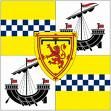

1398 On Apr. 28 Robert III of Scotland gives his son and heir David Stewart, earl of Carrick the honorary title of Duke of Rothesay (the Stewart ancestral home on the Isle of Bute) to signify the heir apparent of Scotland, and his brother Robert, earl of Fife the honorary title of Duke of Albany (Gaelic for Scotland) preparatory to beginning a summer campaign against Donald MacDonald, lord of the Isles; meanwhile after his brother Robert dies, Walter de Danielston (Danyelston) (-1402) takes over Dumbarton Castle, and keeps it despite a long siege by the king's men, and fresh prince David shows off at a tournament organized by Queen Annabella in Edinburgh. On June 24 emperor (since 1368) Ming Tai Tzu (b. 1328) dies, leaving 24 sons, all princes; too bad, inept son Jianwen becomes Ming emperor #2 Ming Hui Di (-1403) (until 1403). Timur the Lame isn't timid about dining in Delhi, becoming the original Soup Nazi? On Sept. 24 after invading unresisting anarchic India, bad-to-the-bone Tamerlane crosses the Indus River, marches 80 mi. a day for two days (Nov. 6-7) to overtake fugitives at Bhatnair, massacres 100K Hindu POWs (like cows?) before Delhi on Dec. 12 for smiling when an Indian army appears in sight, then on Dec. 17 sacks Delhi and kills Dehli sultan Mahmud Tughlak, destroying the 2-cent.-old Delhi Sultanate (begun 1192); in his own words: "In a short space of time all the people in the Delhi fort were put to the sword, and in the course of one hours the heads of 10,000 infidels were cut off, the sword of Islam was washed in the blood of the infidels, and all the goods and effects, the treasure and the grain which for many a long year had been stored in the fort became the spoil of my soldiers... Their women and children and their property and goods became the spoil of the victors. I proclaimed throughout the camp that every man who had infidel prisoners should put them to death, and whoever neglected to do so should himself be executed and his property given to the informer. When this order became known to the ghazis of Islam, they drew their swords and put their prisoners to death. One hundred thousand infidels, impious idolaters, were on that day slain. Maulana Nasiruddin Umar, a counselor and man of learning, who in all his life had never killed a sparrow, now, in execution of my order, slew with his sword fifteen idolatrous Hindus, who were his captives.... On the great day of battle these 100,000 prisoners could not be left with the baggage, and that it would be entirely opposed to the rules of war to set these idolaters and enemies of Islam at liberty... No other course remained but that of making them all food for the sword"; Tamerlane then pulls out of India, leaving Mahmud's son Big Mac, er, Mahmud Tughlak II (d. 1414) as chief undertaker of a ghost Delhi, which takes a cent. to recover; after they realize that there are too many to slaughter, the Muslim clergy devise the fiction that Hindus are People of the Book? On Oct. 14 Jeongjong (Yi Bang-gwa) (1357-1419), 2nd son of Taejo becomes king #2 of the Joseon (Chosun) Dynasty (until Nov. 28, 1400). The English Parliament votes Richard II a revenue for life and delegates its most important powers to a small committee packed by him, thus freeing him from control by Parliament and barons alike and allowing him to become an arbitrary despot, making such an ass of himself that he soon foments revolt?; on cue, on July 20 Roger Mortimer, 4th earl of March (b. 1374) (heir presumptive to his cousin Richard II) dies, and is succeeded by his 7-y.-o. son Edmund de Mortimer, 5th Earl of March, 3rd Earl of Ulster (1391-1425), who becomes heir presumptive to the childless Richard II, with a better hereditary title (through Lionel, duke of Clarence, 3rd son of Edward III) than Henry IV; after Henry IV's accession, Edmund sits in the court of Scotland plotting his overthrow with any and all English factions fed up with him? Wenceslaus IV and Charles VI of France agree that the rival popes should both resign and a new one be elected. John VII Palaeologus (1360-1412) becomes co-regent with his uncle Manuel II. Martin I of Aragon crusades against the Moors of N Africa (until 1399). The Turks begin the first of a long series of attacks on Bosnia. The Ottomans occupy and annex Kadi Burhaneddin's principality of Eretna in Sivas (NE Anatolia). Janus of Cyprus (1375-1432) becomes king of Jerusalem (until 1432). T'aejo II dies, and Chongjong III (-1400) becomes Yi king of Korea; a puppet of the Chinese? Henry I Sinclair (St. Clair), Earl of Orkney, Baron of Roslin, and Lord of Shetland (1345-1401) (builder of Roslin Castle in Midlothian, near which Rosslyn Chapel is later built by his grandson William) sails W and explores Greenland, then discovers Nova Scotia, whose coastline looks a lot like the Highlands of guess what?; he actually dies in battle against the English? Jan Hus lectures on theology at Prague U. The Confrerie de la Passion begins performing religious plays in Paris (ends 1551). Nicolas Flamel (1330-1418) succeeds Blanche d'Evreux as grandmaster of the Priory of Sion (until 1418), becoming the first not in a blood relationship with the preceding :). Inventions: Paper sizes are standardized for the first time in Bologna, Italy - how far can we be from toilet paper? Nonfiction: Don Pero Lopez de Ayala (1332-1407), Book on Hunting with Birds of Prey; written in prison. Poetry: Don Pero Lopez de Ayala (1332-1407), Rimado de Palacio (Rhymes of the Court); one of the earliest references to chivalric tales of Amadis and Lancelot. Births: Spanish king of Aragon (1458-79) and Navarre (1425-79) Juan (John) II (the Great) (the Faithless) (d. 1479) on June 29 in Medina del Campo; son of Ferdinand I of Aragon (1380-1416) and Eleanor of Albuquerque (1374-1435); brother of Alfonso V of Aragon (1396-1458); husband (1420-41) of Blanche I of Navarre (1387-1441), and (1444-58) Juana Enriquez de Cordoba (1425-68); father of Ferdinand II the Catholic (1452-1516); father-in-law of Isabella I the Catholic of Castile (1451-1504). Italian Renaissance humanist scholar Francesco Filelfo (d. 1481) on July 25 in Tolentino, Ancona. Spanish (Castilian) humanistic poet Inigo Lopez (Íñigo López) de Mendoza y de la Vega, Marquis de Santillana (d. 1458) on Aug. 19 in Carrion de los Condes; son of adm. Diego de Mendoza and Dona Leonor de la Vega. Indian mystic poet and religious leader (St.) Kabir Das (d. 1448); leader of the Bhakti movement in N India; raised by Muslim weavers Niru and Nimma. German Man of the Millennium (mechanical printing press inventor) Johannes Gutenberg (Johannes Gensfleisch zur Laden zum Gutenberg) (d. 1468) in Mainz - nerds and geeks have their first Bill Gatesenberg? Spanish (Castilian) poet Alfonso Martinez de Toledo (d. 1470) in Toledo; archpriest of Talavera. Italian Florentine banker Luca Pitti (d. 1472). English lord chancellor (1456-60) and bishop of Winchester (1447-86) William Waynflete (Patten) (d. 1486) in Wainfleet, Lincolnshire; educated at Winchester College, and New College, Oxford U.?; founder of Magdalen College, Oxford. Deaths: Greek Byzantine statesman Demetrius Cydones (b. 1324). Chinese Ming emperor (1368-98) Ming Tai Tzu (b. 1328) on June 24; leaves 24 sons, all princes. English heir presumptive (to Richard II) Roger de Mortimer, 4th earl of March (b. 1374) on July 20 in County Carlow (County Meath?), Ireland; KIA while riding unattended wearing Irish garb.


1399 You thought this song wasn't about you? Everybody alive in the year 2000 C.E. had 1M ancestors alive this year? - I told you I'd show you where you, me, everybody came from, haha? On Jan. 9 Tamerlane storms Meerut, then fights his way back along the Himalayas to the Indus River by Mar. 19, and returns to Samarkand with loads of loot and builds a great mosque to thank Allah; at the end of the year he sets out for Egypt on his last great conquest. In Jan. using his father's infirmity as a pretext, Prince David Stewart, duke of Rothesay gets a council in Perth to name him lt. of Scotland for three years, reporting to a council of 21 nobles led by his uncle Duke Robert of Albany, and Archibald, 3rd earl of Douglas. On Feb. 4 Edward III's son Old John of Gaunt, duke of Lancaster (b. 1349) dies, "ever a threat to England"; in Mar. the inheritance of his exiled son Henry Bolingbroke of Lancaster is confiscated by Richard II for his Irish war, causing grumbling among his nobles, and Henry to raise an army ("You pluck a thousand dangers on your head/ You lose a thousand well-disposed hearts" - Shakespeare, Richard II, 2.1.205-6); in June Duke Louis I of Orleans gains control of insane Charles VI, causing it to be covenient to allow Henry to leave, and after Richard II invades Ireland for a 2nd time in June to quell a revolt, giving Henry his chance, in July he lands at Ravenspur, after which Richard II returns from Ireland in Aug. to find Henry supported by Harry Hotspur and regent Edmund of Langley, duke of York (brother of John of Gaunt); on Aug. 19 Richard II (king since 1377) is captured and forced to abdicate on Sept. 29 ("For I must nothing be" - Shakespeare, Richard II, 4.1.201), then thrown into the Tower of London; Parliament asserts its ancient right of election to get around his faulty hereditary claim, and on Oct. 13 Bolingbroke (is bowling that expensive?) is crowned Henry IV (1367-1413) (England's 33rd monarch) (until Mar. 20, 1413), founding the red rose Lancastrian Dynasty (ends 1461) (descended from Edward III's 3rd son John of Gaunt), briefly adopting an eerily U.S. politician's style and promising "to be advised and governed by the honourable, wise and discreet people of his realm, and to do what is best for the government of himself and of the realm by their common counsel and assent; he does not desire to be govered by his own will, nor by his arbitrary purpose or singular opinion, but by common advice, counsel and assent"; the English Parliament is opened with a speech in English for the first time; Bay trees throughout England wither then grow green again?; Henry's rival Edmund de Mortimer, 5th earl of March is imprisoned, although allowed to inherit his vast estates; the French king (father of Richard II's wife) refuses to acknowledge Henry, and nullifies their long truce; exiled archbishop of Canterbury Thomas Arundel returns, and works with never-merry ultra-orthodox Henry IV to suppress the Lollards and burn heretics at the stake for the first time in English history, bringing the Dark Ages back, causing Lollard supporters incl. Geoffrey Chaucer to lie low?; meanwhile under Henry IV the misery in Ireland starts to peak, and eventually half of the English colony ends up returning home. In late May Richard II makes his 2nd (last) invasion of Ireland, landing on June 1 in Waterford with only 3K troops, but a retinue of three dukes, three earls, and all five captains of the king's bodyguard; too bad, his results are muddled, and after receiving news of the landing of Henry of Lancaster in July, he scraps plans to have his nephew Thomas Holland crowned as king of Ireland in Dublin on Oct. 13, and returns to take him on; as soon as he departs, war breaks out, and his viceroy is murdered; the Battle of Tragh-Bhaile in Dundalk is a V for the Anglo-Irish over the O'Neills led by Domhall mac Enri of Tyrone, who is captured and sent to England. On Aug. 12 the combined armies of Lithuanian grand duke Witowt (Vytautas) and Mongol Khan Tokhtamysh are defeated by Tamerlane's army under gens. Temur Qutlugh and Edigu at the super-bloody Battle of the Vorskla River near the Dnieper River, after which Tokhtamysh makes a run for it, and is chased down and KIA Edigu's troops in Siberia in 1406. In Dec. the Epiphany Rising against Henry IV by supporters of Richard II in an attempt to put him back on the throne begins, fizzling out by early Jan., sealing Richard II's fate along with that of his top supporters. Byzantine Emperor Manuel II goes on a 4-year tour of Europe, seeking help against the Turks, becoming the first Roman emperor since Constans in 343 to visit England; he appoints former usurper John VII regent in his absence. The Ottomans occupy Elbistan and Malatya W of the Euphrates River, giving them control of most of Anatolia. Duke Gian Galeazzo Visconti of Milan purchases Pisa, and seizes Siena - purchases the pizza and steals the seasoning? French king (since 1380) Charles VI the Well-Beloved (1368-1422) lapses into madness 6x this year, always during a new or full moon, causing the Well-Beloved part to be replaced by the Mad - a true lunatic? Richard II of allows two Venetian galleys moored in London to sell glassware - as long as they don't have booty acne? Poetry: Anon., Richard the Redeless (Richard, Devoid of Counsel); Richard II was really just suffering from poor advisers? Births: Dutch painter Rogier van der Weyden (Rogelet de le Pasture) (Roger of the Pasture) (d. 1464) (b. 1400?) in Tournai. Ethiopian emperor (1434-68) Zara Yaqob (d. 1468) (Amharic "seed of Jacob") in Tilq, Fatagar (near the Awash River); youngest son of Dawit I. Italian Renaissance sculptor Luca della Robbia (d. 1482) (b. 1400?) in Florence; uncle of Andrea della Robbia (1435-1525); known for glazed terra cottas. Deaths: French duke of Brittany (1345-99) John V the Conqueror (b. 1339) on Nov. 1. English kingmaker John of Gaunt (b. 1340) on Feb. 4. Polish queen Jadwiga (b. 1374) on July 17. Mamluk sultan #1 (1382-9, 1390-9) Barkuk (Al-Malik az-Zahir Sayf ad-Din Barquq (Arab. "plum") (b. ?).